

Students ovember 2022
Augustine Coronado, my uncle, is a forty-nine-year-old coach at Fenwick High School. He grew up with immigrant parents and two siblings, so he never had time to go out and play outside because he always had to take care of his siblings. Coronado did not have any experience in sports except for playing kickball at recess.
RUNNING TO SUCCESS
BY FIORELLA CATALANO
At fourteen, Coronado was on his way to Saint Joseph's all boy’s high school. He was wearing a gray hoodie and black sweatpants, nothing to make him stand out. He was biting his nails nervously while walking on school grounds for the first time. As he was about to open the school doors, he was easily distracted by the track team that running so fast but still looked graceful. At that moment he knew he was meant to do track, but he never knew how much track would affect his life.
me a lot of confidence. Who would know that a little self-confidence could push yourself a lot. That medal was a big reason I kept doing track.” If Coronado never got a medal, then he would have never grown into the amazing track star he is today. It’s incredible how much a medal can affect a persons’ whole life.
had when I ran track.” It's outstanding how a sport can change your whole life. Coronado admired track so much that he knew he wanted to do track for the rest of his life.
My Uncle started track the first year of high school at Saint Joseph’s. He had no experience with track, but he still wanted to compete at a high school level. Coronado states, “Growing up I was fast and wanted to see if I could compete at a high school level. I never knew that it was going to be a sport I love forever.” Even though my Uncle did not have as much much experience as everyone on the track team he kept going and worked just as hard.
Coronado had to train long hours running on hills, streets, short runs, long runs just to catch up to his teammates' level. Because he did not have as much experience, he had to work twice as much as everyone else to become the best runner he could be. All that hard work and persistence paid off because even though others were bigger, stronger, and did track longer, he still won state because of all his hard work.
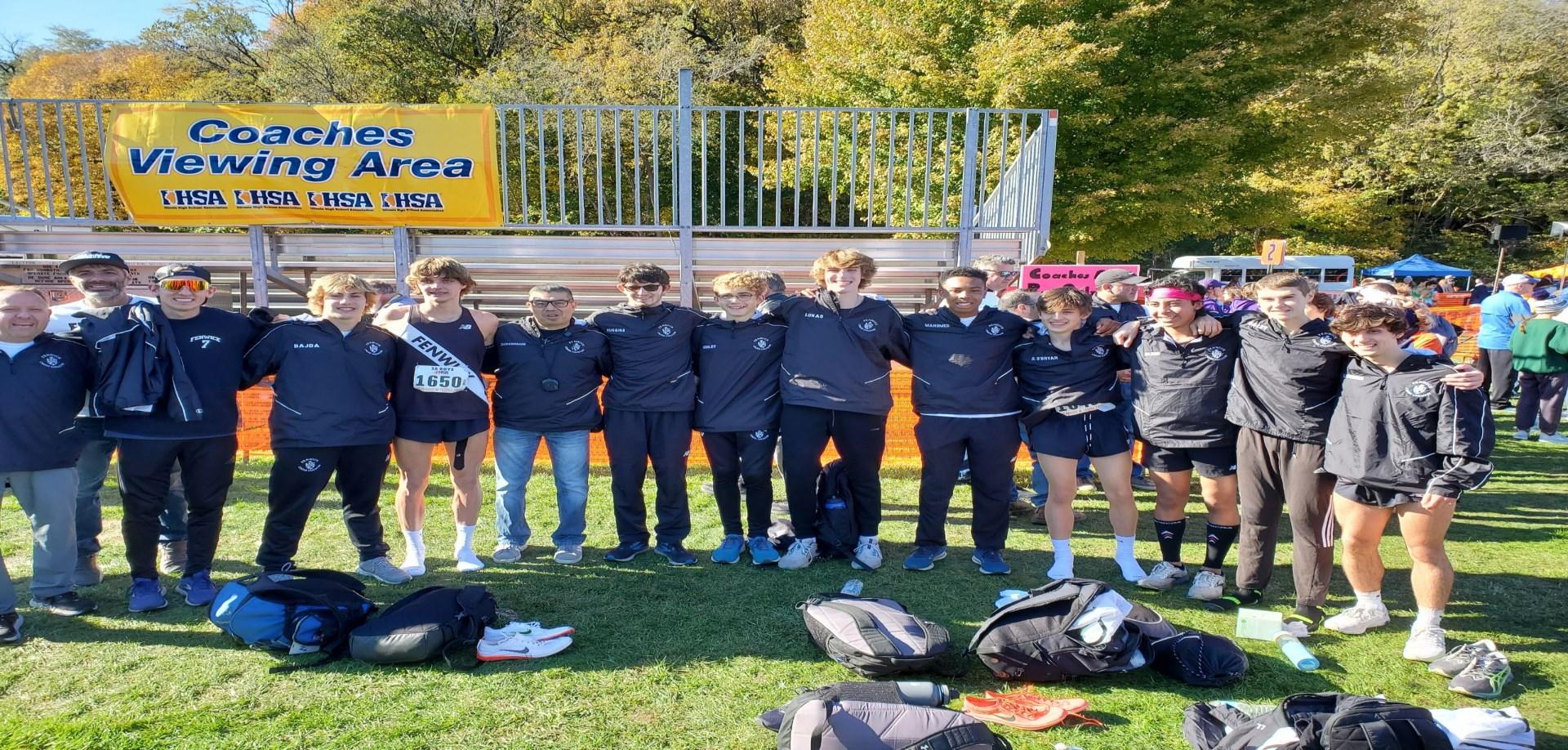
“
My biggest accomplishment was when I obtained third place in the state meet. Coming as a little freshman not knowing I was going to be any good but then getting third in the state championship was like a fairytale dream knowing all my hard work paid off.”
Every time he went to track, he tried to compete just as well as everyone else. He did not let the fact that he was new stop him from doing his best. When he found track, he finally found something he was good at. Because of track he accomplished many things he would not have.
Many times, Coronado thought about quitting track because he was not as experienced as everyone else on the team; because of this he did not go to the first few meetings because he was scared that he would not be as good as everyone else. When he finally went to his first track meet, he was astonished by how amazing he did. His success gave him the confidence to keep going. Coronado admitted, “Winning a medal gave
It’s surprising how even though he did not have as much experience as everyone else, he still won states. If you work hard enough, you can achieve whatever you want.
Coronado did not always want to be a teacher, he always thought he would not be good enough. When Coronado won state, at that moment, it was that moment when he realized he wanted to do track for the rest of his life. He wanted to teach kids because he wanted them to love track just as much as he did. He explains, “I just want to make track fun so those kids could find their sport they love and have the same feelings I
You should never be afraid to try something new. Coronado was scared of trying something new but if he never tried track, he would not have accomplished all the things he has done. Coronado claims, “I don’t know what I would have done if I never tried track.” If Coronado never did track, he would have never won states, became a coach, and won states as a coach.
Coronado’s life would be so different if he never did track. You should always try your best to be your best self. Coronado wanted to give up because he was not as good, but then he practiced every day and now not only does he have a title but his students who won third at nationals.
had
TheoriginstoryonhowAugustineCoronado,FenwickTrackCoach,foundtheirlovefortrack
Fenwick High school wins third in nationals thanks to their Coach, Coronado.
ErikaDiaz’sJourney
 By Aubrey Gowder
By Aubrey Gowder
I was getting anxious worrying about the connection of the call hoping it would not glitch out. Even though i could not see her; I could hear her smile through the phone. I was looking out the window as I listened to Erika Diaz, my grandmas, even toned voice; it made me think of all the things we’ve done together. My Grandma, Erika Diaz, is 78 years old she is a grandma of 4. My Grandma was an immigrant from Germany, and she came to the United States during World War 2. She was only seven. Now my grandma loves playing tennis, spending time with family and friends, cooking, shopping, and telling stories. She immigrated to the United States and kept her German culture with her. She says, “If there’s struggles in your life always try focus on the good.”
she did not speak English like all the other kids did. Diaz explained to me, “I sat in the front row and the other kids would ask me my name, but I didn’t know any English, so I didn’t know what to say. That night I went home and asked my uncle what, what’s your name means. He told me that it means what’s your name. So, the next day I went to school and the other kids asked me again what is my name and I told them my name is Erika.”
As Diaz explained, she did not know how to speak any English. Diaz had struggles when she came to America. Not everything was easy when she came to the U.S. Diaz has had struggles in her past but always kept going and never gave up. Like Diaz I have had struggles in my life but kept trying.
Germany was Diaz’s home country. Diaz lived there until she was seven years old. During World War 2 her dad was lost in the war and became a prisoner of war, but because of this they were given the opportunity to come to the U.S. Diaz was exited to go to a new place and meet new people. Diaz told me, “My mother and I had the privilege to come to the United States.”
As Diaz said she “had the privilege of coming to the U.S” She was grateful for coming to the U.S. It was a big opportunity for her and her mom. Despite the challenges that would coming with moving to a new country and not knowing how to speak English, Diaz was still excited for the opportunity. Diaz was nervous in this moment but took her fear and it and used it to succeed. Diaz inspires me to think about the good things in you are in a bad moment. Just like Diaz, when I get nervous I like to think about things that make me happy.
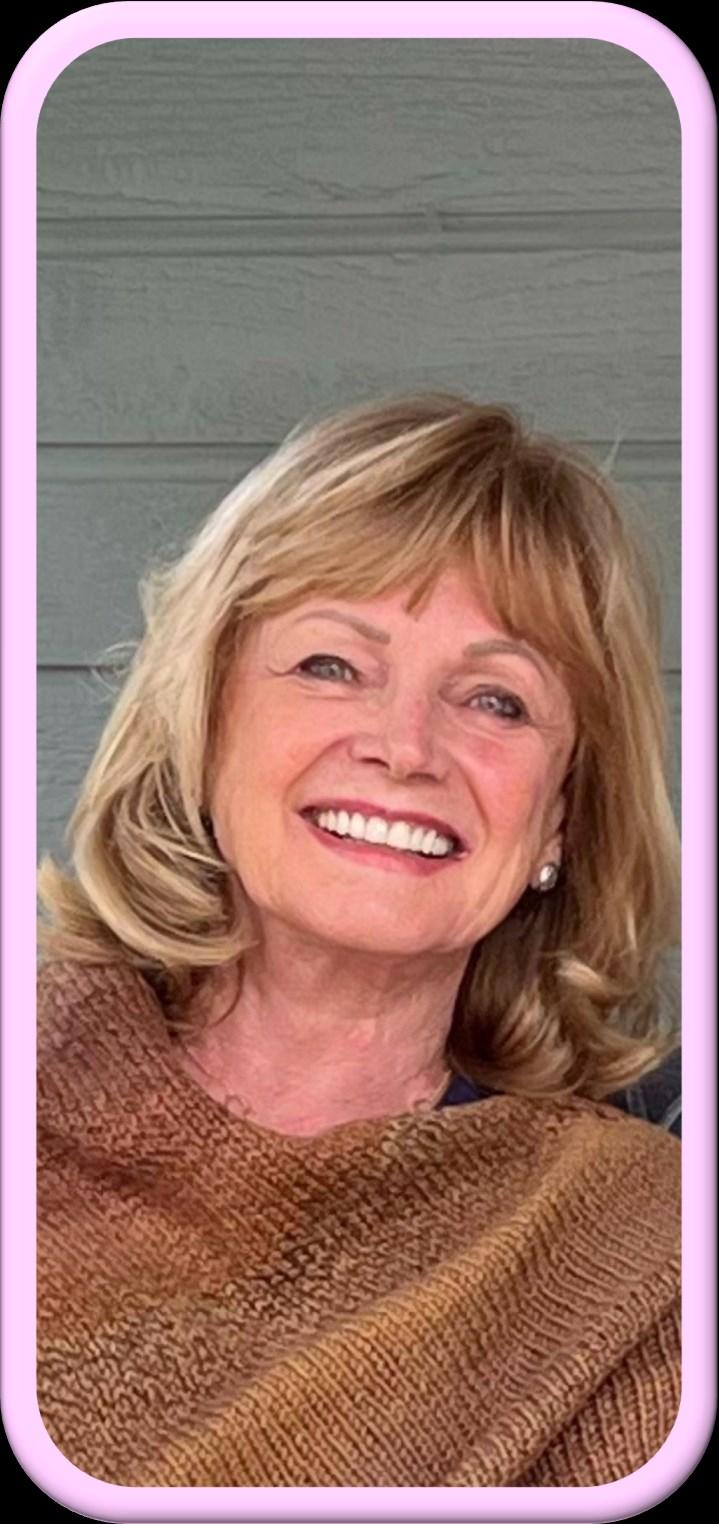
I try to focus on the good in things. Diaz had many struggles in her life, but she kept trying to think about good things. I think a lot of people should learn from her because; even if your life is not going the way you may be wanting it to go you should still think about the things that are hap-
For Diaz, her biggest struggle was when she came to America. Diaz came to the U.S during the end of World War 2; she came on a ship with her mom. She told me how she was very happy because there were new foods on the ship she had not tried before, and she had fun playing games with other kids. She was excited to live in a new place and make new friends. Diaz was sent to a new school. Diaz realized that
Diaz and her mom were sponsored by Diaz’s aunt to come to the U.S and live with them. Diaz took a ship with other immigrants from Germany to the U.S. I wondered if she was sad coming to the U.S, but Diaz explained “I didn’t find myself sad because I was 7 and there were many more things in the U.S and I was excited to try new things.”
Diaz inspires me to stay focused on the good even though you might be nervous about something. Just like Diaz
pening in your life that you are happy about. As Diaz explained, “Even though I no longer lived in Germany, I was still able to speak German and I was with my family, and I met new, friends which were the things I cared about most.” Even though Diaz no longer lived in Germany, she did many things to keep remembering her culture. She joined a German choir, as well as meet new friends that immigrated from Germany as well. To this day my grandma still talks about how grateful she was to get to come to the U.S.
“If there's struggles in your life always try to focus on the good”
By: Talin Bisla
BUSINESS=LIFE
thelessonsoflifethroughbusiness
A12 year old Jay Verma wanted to make some money, he did not have an allowance, so he made a business. T “his is what set off the many decades of success in Verma’s life, “I caught the bug” he says, “once you catch the bug its terminal.” Verma is in his late 50s, a tall man with an average build. He is an entrepreneur. He caught the bug; others catch it too; this is what you need to be successful.
to pass out flyers; to compensate for his growing clientele. “The most important thing in business… I would have to say it’s patients” Verma says. These words encompass his first business because he grew slowly getting rejected by businesses to finding businesses who wanted to use his service.
A lot of people would have given up after the first couple of years, but not Verma; He was confident in his business and soon gained a reputation and a bigger clientele and made a legitimate business.
These rejections began to make Verma determent to refine his craft and make ideas that wowed investors; he soon began to make numerous connections and build his business. The constant rejection made Verma realize that he needed to make better ideas. he built his business bigger and better than before and became very successful, only because of the rejection he faced from investors.
popular you are among others that know who you are.
The advice given isn't merely advice to entrepreneurship, it's advice to make you the best person you can be. Verma shows and tells us the laws of entrepreneurship isn't just that, it's the laws of life. This is what he means, this is what life is all about. The best thing you can do isn't to beat it, or loathe about it being hard, it's to live it.
As I said His first business was around when he was 12 years old; Verma started off making a little bit of money from his job as a promoter for a pizza place (he passed out flyers). Verma soon realized he could try his service on other businesses. After rejection and rejection, he finally found a couple of clients that wanted him to promote their business through his service.
He soon began to have a larger clientele; this forced Verma to hire different kids from his neighborhood
In his senior year of high school, he was accepted to Harvard, his mother didn't want him to be so far from home, so he ended up going to IIT for college with a major in engineering. After attending IIT for college, Verma began to create many businesses “I knew at the start that I wanted to be an entrepreneur.”
He says, after refining his craft and creating businesses he began to pitch to investors. He got rejected many times for many different business ideas, but he stood tall. “Life doesn't happen to you; it happens for you.” Life isn't against you it only makes you better, Life is for you.
During our Interview Verma gives an analogy about the famous NFL quarterback Tom Brady, He says “Did Tom Brady win the Super Bowl because he was Tom Brady, or did He become Tom Brady because he won the Super Bowl? … If you think that the 2nd option is correct, then you are wrong.” Verma means that you are the person you are already, not because of what you do or what you've accomplished.
“In business you start to do things to become someone” what you need to do is realize that you are that person the whole time, you weren’t you because you did anything. The only thing different about you is your experience level and how
Adapting in the Industry
By:
The type setting industry never died; it just moved to a new place. That place is all around us; it consumes us every day. Robert W. Benson lived during the death and re birth of the industry into the computer. His old but strong voice cracked as he said, “Ready when you are, sweetheart.” Talking to my Grandpa, I hear my Grandma cooking dinner in the background, as Bob would occasionally speak to her in the interview about his long, unique career. Benson, born 80 years ago, was a typesetter, doing handset, machine, photosetting and digital type adjusting his positions with the changes in the world, and being able to adapt to the world's changes even if you like it or not.
Robert W. Benson is of the generation when handset the typesetting died. The history all started when the Chinese invented the movable type of set blocks from wood, which was then developed into the printing press until the 19th century when the letterpress was made and done by hand. Benson explained to me, saying, “I am fortunate to have been old and experienced enough to participate in this before it ended.” As Benson expressed his emotion of how lucky he was to have experienced something so great in his lifetime, I noticed how proud, but even a bit of sadness was in his voice when discussing the death of something he loved so dearly for so long.
The changes in the typesetting industry, major and invasive, were over the short years after the MacIntosh computer was released, impacting the world. Almost every day, people work on their computers.
That may be writing or just working on other personal things, the computer automatically typesets and has the page all ready for you, without having to do all the work, which is what Benson did.
The Apple Company put all the manual typesetting out businesses within a year. The typesetting industry, long lived and respected, with many years of service and hard work, was just gone within a blink of an eye.
Benson worked in this industry doing handset, machine photosetting, and digital type set and printing from 1962 until 2010, until he retired, shifting his job positions and what he did while accommodating the world changes.
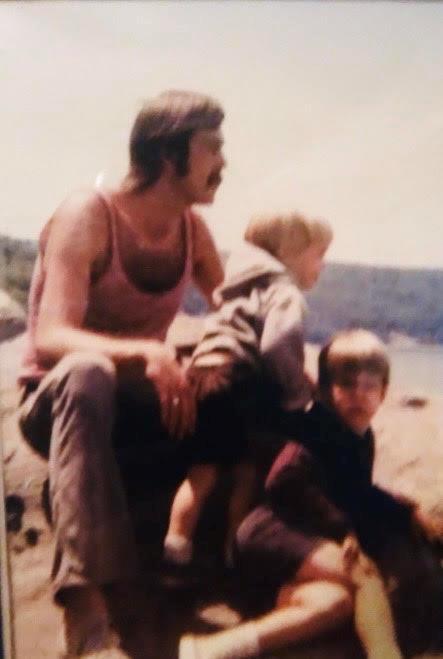
Benson said, “Apple and Mr. Steve Jobs put all of the typesetting businesses out of company…the typesetting industry did not go away; it just transitioned to a new place”.
The typesetting industry offers multiple opportunities and jobs for many people in the nation. After High School, Benson worked for five years type setting at John B. Anderson inc., then joined a union, and soon after, he got a Journey Men Card. This card allowed any person, often in trades, to show that they were experienced and qualified.
While in the union, Benson worked for Ryder Type for 23 years, becoming very successful and rising the ranks. Benson states, “Working for Anderson and starting at Ryder benefited me greatly.”
Benson also says his favorite job ever was his first working with Anderson. Talking about his path, he mentioned how grateful he was to be working hard at something he was passionate about. He will always love his first job, which will have a special place in his heart. This connects to so many people because you will never forget your first job or some of your first values.
While still working through all these changes, Benson’s work was difficult. There were thousands of people in the industry, and it changed so rapidly that you had to quit and go somewhere else, or you had to adapt. I detected no anger when Benson was discussing this topic, but it would be understandable if he held a grudge against Apple or technology.
In today’s world, writing a document, invitation, letter, or anything of pleasure is more challenging; however, the world takes the computer and automatic corrections for granted because it is not easy. It may be because people need to be aware of this lost industry and all the hard work that came with the early life of typing.
Benson with his sons on vacation in 1973
“I am fortunate to have been old and experienced enough to participate in this before it ended.”
To be able to adapt to the world’s changes even if you like it or not, is the most important quality to have.
Annie Benson
BROADCASTINGTOHR DIRECTOR
ByMorganCulbreath
The story of family, change, and hard work
In August 1980 a baby girl was born named LaToya bibbs. In the future she will become a great HR director, a great friend, mother, and aunt. Latoya Bibbs had 3 other siblings and grew up in Chicago. She grew up in a hard working family form her mother to all her sibling.
“I think the reason why our family still lives in Tennessee is because our family still owns land”.
LaToya Bibbs really cares about her friends and family but however she mostly cares about her family. Linda Bibbs was born in Ripley Tennessee in 1949 at that time Tennessee was really segregated. LaToya Bibbs has heard many stories from her mom. A story that LaToya bibbs has told me is that her family was the first black family to own farmland in Ripley, Tennessee; her mom went down there every summer and was scared to ride the horse. LaToya Bibbs said that “I think the reason why our family still lives in Tennessee is because our family still owns land”. Even though segregation was happening her family had land and is still striving to keep the land and this is important to her family because this is a legacy to her family, and it was rare for black people to be owning land in early 1900s
Later Linda Bibbs moved from Ripley to Chicago because the steel mill industry was popular in Chicago at that time and her father got a job in the steel mill and it
was a great paying job at the time and at the time the industry was really booming. “So, you had a lot of people move from the south that move here to Chicago for better job opportunities” This is an example of the great migration (1910 1970) when black families moved out the south. The families moved to the north and Midwest, The bibbs family moved to the bronzeville in Chicago aka black metropolis. Then Linda bibbs had got married and had Latoya bibbs and her 3 other siblings.
In LaToya first year in college, she decides to go into journalism she really wanted to do broadcasting. When she was Columbia, she went to ABC 7 and Fox news to she went behind the scene to see everything. Latoya learned many things about broadcasting. Latoya had got offered a job in Memphis, Tennessee but she want to stay in Chicago So, she went to get a masters in Human Resources. After working hard in 2012 she graduated and got her masters.
Latoya story shows that even though she change her career she worked hard to get her masters and become an HR director.
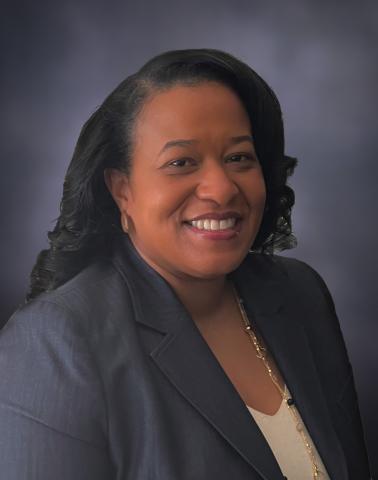
Bill Daley was in the basement of his home. Sitting on a big blue couch, he had cup of water on a white and gold table. It was a Saturday night; he was happy to see me walk down the dark wood stairs. Daley was ready to be interviewed and excited to work. I stacked my papers, “Let’s begin” I say. Daley, my dad, is 50 years old; he has worked in many places and loves to travel. He has been through lots of hardships and has many regrets, but he is also very fortunate.
Daley has faced many conflicts, learned many lessons, and has worked harder than ever. He demonstrates how even when you face many challenges you can overcome them and become a better person. Daley explains, “This isn’t a dress rehearsal life.” This is powerful because it shows how he regrets not trying hard enough and has learned from that. Daley acknowledged that, especially in school, its always important to be giving 110%. He explains how school is more important than he realized in grammar school, and even high school. Some FXW 8th graders may realize that they wish they did more throughout grammar school whether it’s just volunteering for school Masses or doing more extra credit. They’ve realized that they will never be able to go back to their past years at FXW. Now they will do more moving forward and will now know that they should try their best the first time around. It is very important to not only Daley, but his whole family that they always know to try their best now because they won’t get second chances in the future.
Daley has many values in life that he chooses to follow and tell other people about. One thing he stated many times throughout the interview was, “What you don’t like may be just as important as what you do like.” A value to not only Daley, but his whole family that they always know what they want to do. He makes sure that they are not just going along with what others say.
“This isn’t a dress rehearsal life”
My dad always makes sure we are doing what we like and want to do. Daley states that what you do now will impact you for the rest of your life so you might as well try your best now, so you don’t live with regrets in the future. Many people learn that what sports we like and want to continue doing is way more important than what sports others are doing. You can learn to do what you truly want to do even when nobody you know is doing them.
Daley has many values he always teaches his kids. Two of which I’ve already, stated but there are many more. Daley explains, “Don’t hesitate to try new things, don’t think you can’t do it whether it’s a class or a sport, always try.” Daley realized that he should’ve figured out what he likes and wants to do earlier in life so when you go to college, you know what you like and what you don’t. Many kids can relate to this because when they were younger, they may not have known what sport they liked or what their favorite class in school was, they would just do what everyone else was doing. I played soccer and basketball and neither one was a good fit for me, I only did it because I knew kids who did it so I wouldn’t be alone. As I got older, I realized that I enjoyed volleyball, so I joined a club. Now, I love it and have met so many new people doing it.
Daley regrets not being more prepared for life ahead and wishes he had done more throughout elementary school, “Especially in grammar school and high school its about getting involved in clubs, taking different classes, and seeing what you want to pursue.” Daley thinks it is important to know what you like to do especially considering the future.
Hardships: No Way Out
Bill Daley, my dad, is a very lucky person, even though he has gone through of the hardest things one can go through
By: Brynn Daley
He talks a lot about regretting not realizing how important the things you do as a kid is for your future. Many kids wish they participated in certain clubs and sports throughout the years, so they may be learning about the same things growing up. Now that Daley is older, he feels that he has not missed out at all and has seen many things and traveled many places. Daley has been to many places but regrets not living in London at one point in his life.
Daley talked a lot about many exciting and fun experiences he has had but sadly with those fun experiences and memories also have come some bitter and somber experiences; “One thing that happened in my childhood which is unfortunately kinda sad is my brother, Richie, died when I was in 7th grade.” Daley explains that even though it is a very sad experience, that he and his family grew closer together and he explains that it really put things into perspective for him and made family more important to him. Daley reinforces how close you can get as a family when difficult experiences happen; “You know it also makes me appreciate everything even more and you know what
we went through, and it makes me appreciate you guys and knowing he was so young when he passed away.” Daley now feels more grateful than ever considering what his family went through.
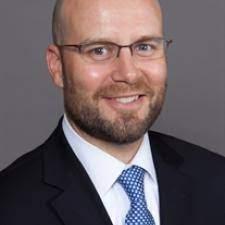
Daley feels that family is the most important thing in life and feels that spending time with them can be one of the most important things you can do, “My sisters, Lauren and Maura, are super important people in my life, they’ve been there always no matter what.” Living with regrets about anything is tough but you should never live with the regret of not being with family more often. Family is the most important thing in life to him and he never wants to waste valuable time. Growing up, many people realize that time is easily lost, and we should appreciate the time we have with loved ones.
You often only get one chance to do well so you shouldn’t waste it. If you waste your time not trying your hardest or always doing your best, you will have many regrets. One may learn throughout life that it is important to do everything you can and be the best version of yourself.
Photographed atop a green roof in the city of Chicago after filming a video segment on light and buildings for Discovery Kids.
KARENWEIGERT
FROM AN INVESTMENT BANKER TO AN ENVIRONMENTAL EXPERT
BY:KATEGIBBLE
Karen Weigert is known as a hardworking, professional person at work, but at home she is fun and caring. While interviewing her, these two sides collided. Sitting in a cozy room smelling of herbs, her posture was relaxed from the hundreds of interviews she has experienced. Despite wearing flannel pajamas, she conducted herself in a calm and professional manner. Weigert chose her words carefully, and the silence between her thoughts was filled with sounds from the living room TV and my dog’s paws clicking on the floor as he walked.
Weigert was born in 1971 in South Bend, Indiana to Kathleen Maas Weigert and Andrew Weigert, both of whom were professors at Notre Dame. As a result, Weigert attended Notre Dame for college, but later went to Harvard for business school. While growing up, her parents were involved in many peaceful protests for women’s rights, peace, and preserving the environment. This impacted Weigert because she fostered an appreciation for the environment at a young age that stayed with her throughout her life. Even though she worked in many different fields, she was always drawn back to climate and the impact it had on her.
While in her senior year at Notre Dame, Weigert applied for a job at a prestigious investment bank. Even though she had no experience with investing, the bank was willing to interview her. Weigert recalls, “I applied to that job, got an interview, and I literally called Grandpa and I was like ‘I just got an interview at Goldman Sachs, it’s an investment bank, can you please tell me the difference between stocks and bonds?’”
After she talked with my grandpa, her dad, she knew enough about finance that she was well prepared for her interview. Not only that, but she made it through each round of interviews that followed and got the job. Weigert’s quick thinking, problem solving attitude, and ability to ask for help has taken her a long way.
The road to a successful career is not always a smooth or easy one. While in one of the final rounds of interviews at Goldman Sachs, Weigert hit a rough patch. One woman who had just been interviewed came out into the common waiting room, where Weigert was, looking flustered and stressed. She told Weigert that the interviewers asked her a really difficult question about taxes, and she had barely managed to calculate it. Luckily, she had gotten the correct answer: ten. Weigert had no idea how to solve a problem like that, so she was very worried. While in her interview, she realized that the question she received sounded familiar. It was the same question that the woman from earlier had gotten. Because she had no idea how to solve the problem, she told the interviewers that the answer was ten.
The two men interviewing her were stunned; no one had solved the problem that fast before. When asked how she did it, Weigert confessed to hearing the answer from another person. In another stroke of fortune, the interviewers did not have a backup question, so she went on to the next round.
When reflecting on this experience Weigert said “Being good on your feet helps, being honest helps, but also being brave certainly helps.” These are all traits that Weigert possesses in great quantities, and that other self-advocators should try to mimic.
Despite having a more traditional start to her career, Weigert has always been interested in nature and sustainability. From growing up with access to a 13 acre piece of prairie land to having parents who loved everything to do with plant and animal life, nature and sustainability have always been embedded in Weigert’s life. Therefore, it came as no surprise when she said, “I ended up in the climate space because I was really interested in it and then I built a career by taking chances, using my free time to get involved in topics and then being lucky enough to meet people who helped me grow a career in the space.” In other words, she took a topic that she was passionate about and built a career for herself.
At the time, there were very few jobs focused on climate. By working more traditional jobs, focusing on climate in her free time, serving as producer and writer on a documentary film called Carbon Nation, and taking risks when necessary, she was able to work in climate focused jobs when they became available.
Once Weigert ended up in the climate space, she knew that was what she wanted to focus on. She had been involved in climate sectors of many organizations, but her first completely climate focused job was as the first Chief Sustainability Officer of Chicago. In this role, she was able to dedicate one hundred percent of her time and energy to climate and environmental issues affecting us today.
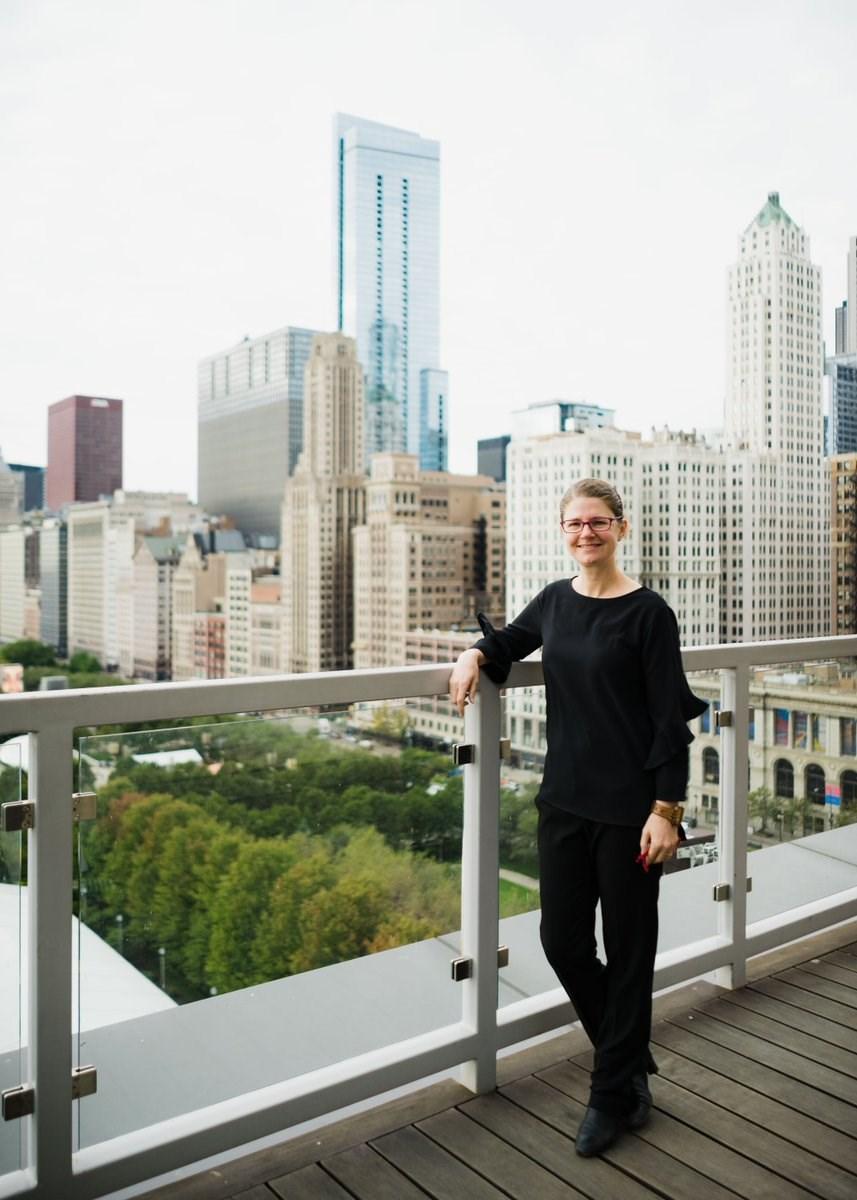
While I was interviewing her, she remarked, “I like the idea that if you’re helping to address climate, you’re helping everyone. You’re helping people today, you’re helping people tomorrow, you’re helping people in your community and you’re helping people all around the world.” Weigert is very passionate about her field, and helping people around the world is partially why she is so set on preserving the environment. Not only is learning about climate interesting to her, but the impact of her work is a driving factor for why she does it.
Weigert advises, “In the job that you have, do a great job in that role…in your free time or even in your company find new ways to advance your skill set so that over time you can build the career that you want.” Additionally, Weigert has said “I’m not big on thinking ‘oh, I wish I had done things differently’, I’m very much about ‘okay, here I am today, what can I do going forward?’” Weigert has applied this belief throughout her career. She has worked in for profit, non profit, government, and education. Despite this, she has never defined herself by her past professions. She simply followed her interests and was willing to try new things. Overall, you should try your best in any role you are given in order to achieve the positions you truly want and love.
“I’m not big on thinking ‘oh, I wish I had done things differently’, I’m very much about ‘okay, here I am today, what can I do going forward?’”
Becoming a Teacher
By: Meredith Higgins
It was a Sunday night; Mackenzie Higgins was snuggled up with a blanket on her big white chair in the corner of her room reading a book. You could hear the wind whistling like a piping hot teapot ready to be drunk. The only light in the dark room was a small lamp next to Higgins. When I walked into the room, she was in her pajamas almost ready to go to bed. I threw the door open and walked in with a mission; that I needed to interview her. Frowning, she ties up her short blond hair, I sit next to her, and tell her what we must do. She asks me how long it was going to take and I tell her it has to be at least 30 min long. She lets out a groan and says “Alright, let’s get this done.” I ask her the first question; she yawns as she answers the question with a sleepy tone.
Mackenzie Higgins is a mother of four and is married to my father John Higgins. Her oldest child Jack is twenty one then Maura 17 years old, Jimmy 14 years old and her youngest, me, being thirteen years old. She has worked at many different schools but finally settled down at the Frances Xavier Warde school. She has been there for thirteen years now and loves it. During this interview, I learn the story of how Higgins knew from a young age that she wanted to become a teacher.
Higgins was born in a small, idyllic town in New Jersey that seemed so perfect, it would remind you of the movies. Kids on bikes, swimming in the mudhole. A place where everyone knew everybody. She went to a very small Catholic grade school near her house. This little school impacted her more than she thought. It was one of the reasons she became a teacher.
“There was one teacher, Mrs. Shilakes, she taught me in 5th grade and again in 8th grade. One time we had our final Science exam, and I wasn’t always the best student. She inspired me to study extra hard and made me believe as long as I studied hard I would do fine. I studied the hardest I had ever studied, and I aced the test with a 99%. Her inspiration made me want to do that for others, so that started the path to me wanting to become a teacher.” Sometimes the smallest things can be the most important things and shape your future.
High school is a big part in everyone’s life, and Higgins was impacted by teachers there too. A lot of high schoolers think that in high school all that matters is being cool and hanging out with your friends, but Higgins had one teacher who made learning, cool and interesting.
“Most high schoolers think that class is boring, but this teacher made it so fun. Instead of using textbooks we used US News and World Report (a weekly magazine about current events), and we summarized articles and had class conversations about what was happening in the world and connected these current events to past historical events. She also taught us real world things like how to do taxes and how to invest our money.” This unique class showed Higgins that you can think outside of the box and make any subject fun and interesting
After high school, Higgins went to the University of Dayton to pursue her dream of being a teacher, as an Education Major. She found that these classes were more about learning how to actually teach classes like math and ELA instead of learning math and ELA.
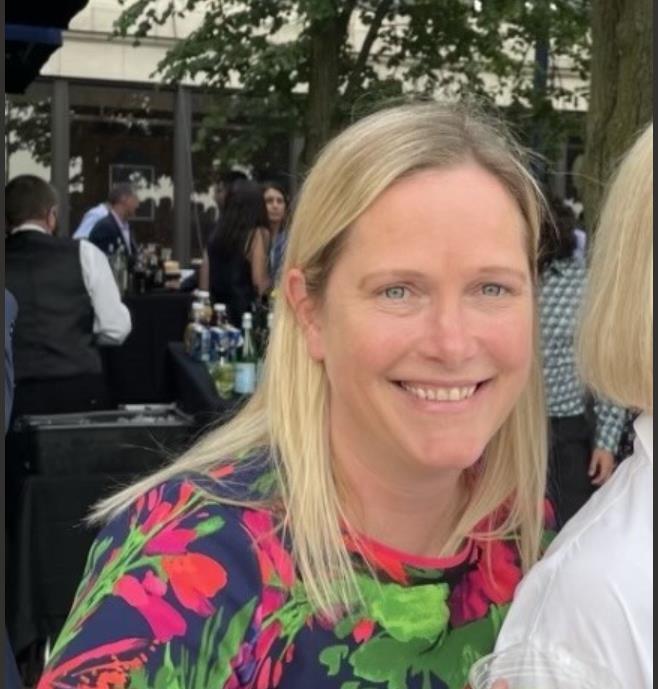

“I had all different types of classes like ‘Children’s Literature’ where I learned about classic and new kids’ books and made lesson plans using that literature.” Higgins also loved that they put you in the classroom every semester to make sure that teaching was really a path that you wanted to continue to go down.
After college, she knew 100% she wanted to be a teacher and live in a city but knew she could only afford a few cities. Higgins says, “I fell in love with Chicago. I instantly knew it was the place I wanted to live. It checked all my boxes on the perfect place to live. I moved there after college, and I got a job at the South Loop Elementary School and just like I fell in love with Chicago I fell in love with teaching.” Higgins still teaches to this day.
Higgins knew from a young age that she wanted to be a teacher. I appreciate all the different stories and lessons she told me about why she became a teacher. I have learned that teachers were a big part of why Higgins became a teacher. Learn from all your experiences because it might lead you to what you want to do and who you become. Truly any experience can make the biggest difference in who you become.
“Her inspiration made me want to do that for others, so that started the path to me wanting to become a teacher.”
“Just like I fell in love with Chicago I fell in love with teaching.”
How one person made a childhood dream a reality.
This is Mackenzie Higgins currently.
He was apprehensive about what he was about to do, but knew he had to do it. After gaining courage, he told his sister he forgave her for wronging him, and she forgave him as well. When she said that, a weight was lifted off his shoulders. From that moment on, he realized: forgiveness is the is the best way to end a conflict. Roger Franklin is a man in his late fifties who is an engineer and a tumbling coach. He was born in Chicago and has lived there his whole life. He believes that forgiving others can bring positive relationships and relief in some people’s lives.
Franklin has always believed in forgiveness no matter what. Franklin’s family had wronged him for a great period of his life. They accused him of doing voodoo on his late mother and forbid him from attending her funeral. Before Franklin got mad, he thought back to his grandmother’s funeral. At the funeral, all her sons caused a disruption by fist fighting at her funeral; the attention was on them instead of his grandma. He decided to not act like them and chose not to attend the funeral. Then, about three years later, they wronged him again. His sister had passed away; no one told him about her death or the funeral date. He cut off contact with all his family for eight years as a result.
His sixteen year old niece began to sneak out of the house, get bad grades, and hang out with the wrong crowd. Franklins’ sister was at a loss, but Franklin knew what to do. He invited his niece to live with him over the summer. He made sure she met teens who could understand her situation and aid her. His niece’s behavior quickly improved, and she went back to her old self.
Franklin has believed in being confident and not letting others tear you down. Franklin and his stepmom, who he called Mom, were very close. He would talk to her on the phone and go over to her house to eat her cooking. Then, weeks went by without a phone call. His mother called him suddenly one day: he found out that she couldn’t walk, eat, or use the bathroom on her own. She had developed cancer. Franklin wanted to go to her house and pray over her with his pastor and cousin, but they were both unavailable. The pastor taught Franklin how to bless oil and where to use it. Franklin then went to her house and began praying. Slowly, she started to regain feeling in her feet, then legs, and soon she could move most of her body. For the next three weeks, she could live like she used to.
After all those years, he learned his niece, who was turning sixteen, was having a party. He decided to go to the party, even though his family was there. At that same party, he decided it was time to forgive all his family. Despite the previous circumstances, he still forgave them: “Even though I knew I was wrongly hurt, I still forgave.” Franklin knew his family was in the wrong, but still forgave them. Through this, Franklin also realized that it is ok to forgive someone even if you don’t have to. I have also been wronged by people, and I now know to that forgiving someone is better than resenting that person forever.
For Franklin, forgiveness improved the relationships in his life. Shortly after Franklin forgave his family, a crisis arose.
After the summer was over and his niece went home, Franklins sister noticed that her daughter was her old self. She was extremely thankful of what Franklin had done. Because of his good deed, he now has healthy and strong relationships with three of his nieces and his sister. Franklin thought, “I would have missed all those relationships had I not made the decision that it doesn’t matter I was hurt.” Through this experience, Franklin learned the power of forgiveness. Franklin realized this because he his family now talk frequently, and he is no longer alone. I learned that forgiving will benefit you greatly.
Despite what he has been through, Franklin is an upbeat, confident, and joyful whose goal in life is to aid others. Through him, many others and I have learned what it means to love and forgive. This is because of the lesson he learned: forgiving others can bring positive relationships and relief in some people’s lives.
On a trip in Jamaica, his father called him. The phone call was about his mother passing away. Franklin was in shock from this news because before he left, she was doing better. His father told him he performed voodoo on her instead of praying. Franklin knew all he did was pray, but a priest thought otherwise. Because the priest prayers did not work like Franklins, he thought he performed voodoo. Franklin thought, “You can just let anyone tell you anything. Even if they have power or authority, you got to be able to control what you think.” He knows he did not perform voodoo, so there was no point to argue. I learned to be confident in my thoughts and abilities, and not let others tear me down.
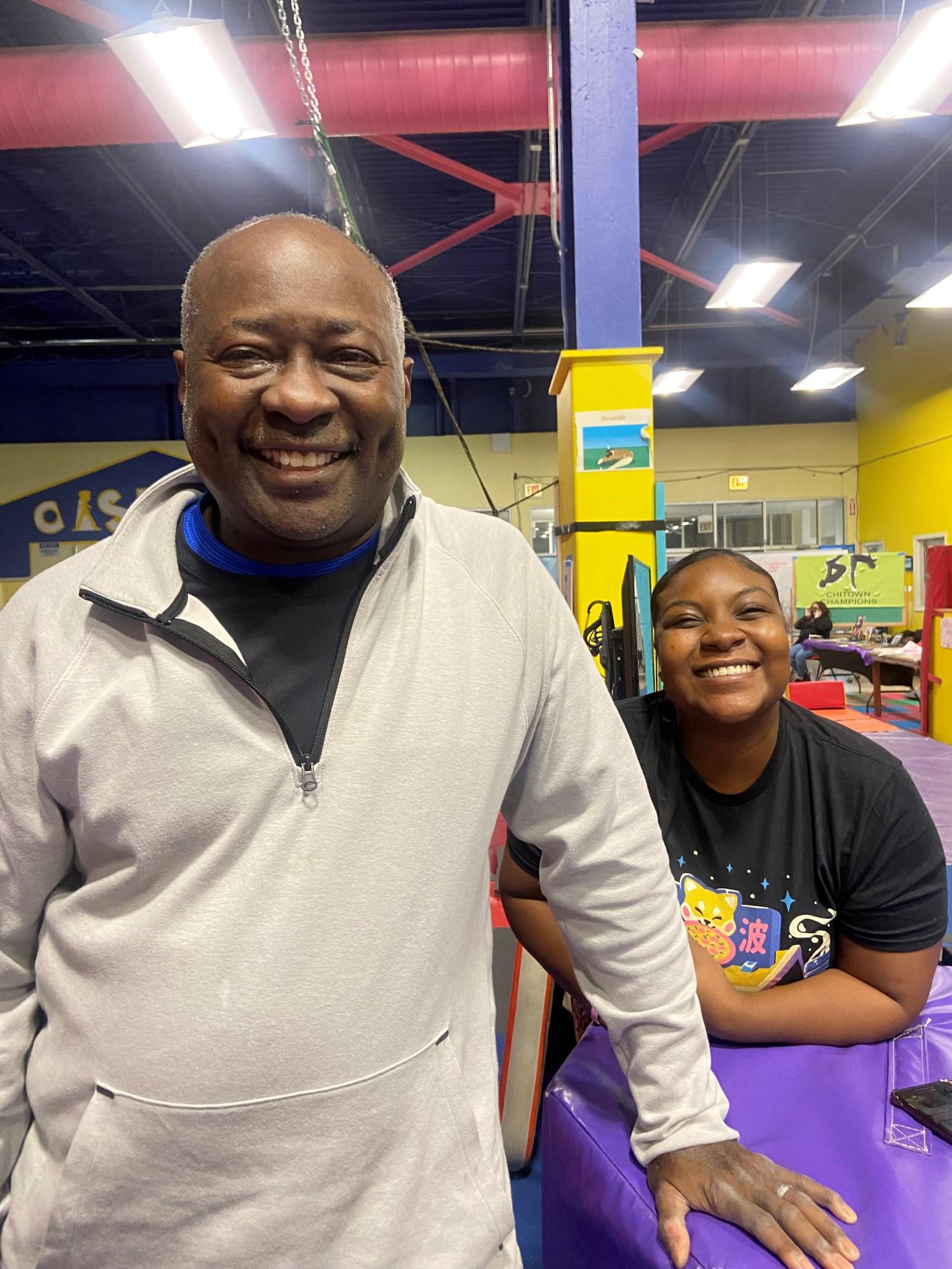 By: Simone Honore
By: Simone Honore
« It was just a few months later when the forgivness led to a breakthrough for her daughter, »—Roger Franklin.
Roger Franklin, Left, and tumbling coach Tiffany, right
THE KEYS TOAGOOD LIFE
Family values and hard work Sheldon Lo’s life, his values, and motivations
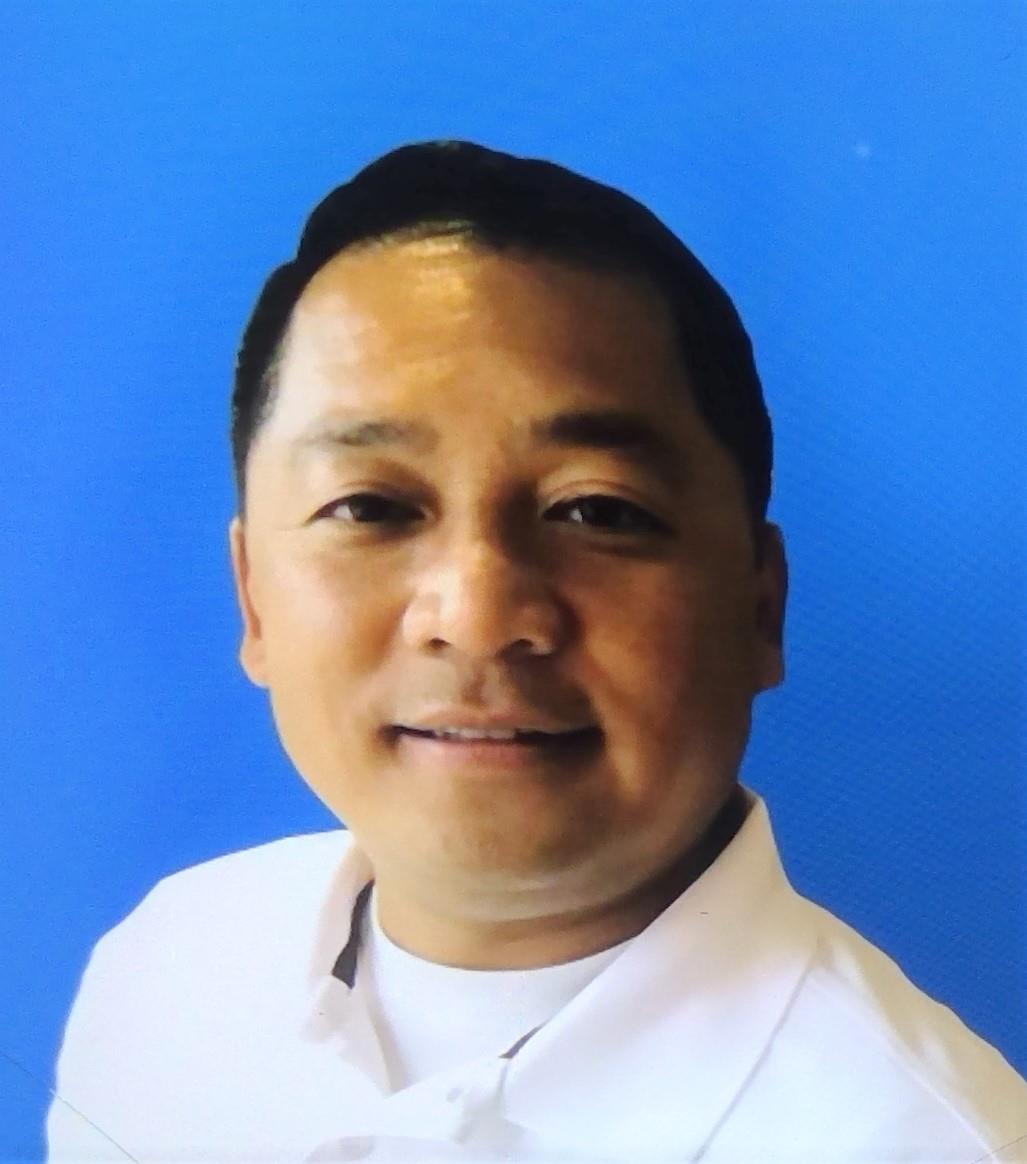 By: Carson Lo
By: Carson Lo
Sheldon Lo sat comfortably on the couch with his legs spread out and his hands folded in his lap. The warm light hit his face as he nodded, and I knew I was ready to begin the interview. Sheldon lo was an immigrant born in Hong Kong but grew up in the United States. He came over toAmerica only a month old and his parents had little money and spoke little English, yet his parents worked extremely hard to support their family. Lo is now a 49-year-old man and father of three kids. In life, Lo had to work very hard throughout school and even now to help his children and repay his parents for their hard work and dedication. Working hard and having strong values is the recipe for a successful life.
Lo had a lot of tough moments in his life, but one of the toughest moments was when he was in high school. Growing up, Lo did not have many Asian friends and since he spoke little English, this allowed other kids to pick on him and call him names. Throughout high school, Lo had a lot of Non Asian friends who would try to ‘Americanize’him and tell him that ‘he wasn’t Chinese.’
Lo recalls, “I think those were the tough parts and not growing up with a self-identity at the time.” Now I know that words like this are micro aggressions and relate directly to racism but at the time Lo did not realize that is what was being said and did not know that it was racism. Even though these comments were made and at the time Lo did not know what they truly meant then, today Lo embraces many parts of his Chinese culture and language.
Lo’s parents inspired and drove a lot of his motivations and values. Many of Lo’s motivations come from watching his parents push through their own challenges as immigrants, non English speakers, and having little money. His parents opened up a Chinese restaurant and every day after school even if he could not help, he went in the back to study and do his homework. When Lo would go there, he would see how hard his parents worked to run the restaurant.
Lo remembers, “Growing up, having nothing. Coming over to
America from Hong Kong when I was just a month old and having my mom and dad just having $100, didn’t know English, becoming waiters and chefs… Just seeing how hard my parents worked so hard.” This is important to Lo because seeing the way his parents worked to support themselves and him and his brother really affected how he would continue his life. I can relate to this because I always see how hard my parents work and they push me to do my best all the time.
One of Lo’s values is also being hard working and not to dwell on the past. He believes that working hard “will make our do’s” or will let people to be successful in life. Lo’s values allow him to lead himself into a good job and helping others. His values drive him to be who he is and has affected his life and motivations.
Lo claims, “Good work ethic is important, trying your best, making sure you do your best, and not looking in the past and saying, ‘I wish I could have done more,’‘I wish I could have studied harder,’or ‘I wish I could have worked harder.’” This is significant because his values can be shown or influenced on others. Lo does not focus on the past and only focuses on the future and working hard. This illustrates that in Lo’s life because he did not have much growing up; he focused on the future for the better, working hard to get a better life, and helping others. I can learn from this because I look at the past and my failures when really, I should focus on working hard doing my best, and not focusing on small mistakes I have made.
Lo wants his kids to have good values, be hard working, and be proud of themselves or believe in themselves even when they do not do well. He wants his kids to have a better future and to learn a lot from him and his childhood: “I hope that my work ethic has been instilled upon them [his kids] to work hard and not be lazy, and even if you study hard, you work hard, and you might not get the A… just believe in yourself. Have good values, work ethic, and hard work. In the long run it will pay off.” Lo wants his kids to grow up to be successful and be proud of themselves. He watched his parents work hard for a better life inAmerica, and just like his parents, he works hard for his family and tries to teach his kids the same lessons and values. We learn from Lo that working hard and having great values can drive you to have a successful life. Throughout his life, Lo learned by example of his parents, and he continues to
demonstrate and pass down what he has learned from them to his children. By being highly motivated, always giving your best effort, and by looking to the future, you are certain to be a success. Hard work and strong family values are the recipes for a successful life.
“…just believe in yourself. Have good values, work ethic, and hard work. In the long run it will pay off.”
Sheldon Lo PT, DPT, ATC, FAOMPT, Center Therapy Director at Concentra
Katie Mikulaninec and I sat down on the little orange couch, a couch she had never really liked. Mikulaninec set down her drink and folded her hands in her lap. “Let’s get this done,” she told me. I gave her a nod of approval, shushed my dog, and started the video. Mikulaninec had a unique childhood. She was born in Chicago but grew up in several places from Nashville to California. Mikulaninec’s parents had four children; she was the second youngest. However, the two older siblings were adopted, and her parents had her and her brother. Despite moving all over the country as a child, she found her way back to Chicago. Mikulaninec is married with three children, I am the oldest of the three. Mikulaninec had an interesting life, with lots of different places she called home. With every move, she always knew to go with her gut.
While working at a family friend’s restaurant, Mikulaninec realized she wanted to make a big change. Mikulaninec had been to Ireland three times before moving. Each time she went, she fell more in love with the people, and way of life; mentioning how much slower pace it was over there than in America. When she broke the news to the owners and employees of the restaurant she worked at, three different people, including the owner, told her to call a girl by the name of Rachel Scanlon. Scanlon, a former employee of the restaurant, lived in Ireland and supposedly had a lot in common with Mikulaninec.
When the big move finally happened, Mikulaninec decided to give this girl a call. They ended up being very good friends and visit each other frequently. Mikulaninec reflected: “It is now almost 22 years later; Rachel and I are still best friends… so aren’t I glad I made that phone call.” One small action can make a tremendous change in your life. I have been to Ireland three times because of this friendship. Mikulaninec learned that sometimes you should just be optimistic in life; one spontaneous decision Mikulaninec made changed not only her life, but also many others.
Even though Mikulaninec lived on a whole different continent than anyone she had ever known until this point, she never truly felt homesick. When Mikulaninec was living in Ireland, she did not have any family over there, so it was strange that she never felt that homesick feeling. The lack of


homesickness is probably because she had multiple friends she could consider her family. Another explanation could be that she did have family and very good friends who visited frequently. Mikulaninec also made some visits of her own like weddings, God-sons baptism, summer visits, and other occasions.
“

One small action can make a
tremendous change in your life.
Ireland and Back
Mikulaninec explained, “ away for some reason.” Mikulaninec loved her time in Ireland, and not feeling homesick was a big part of it. If Mikulaninec did miss home, she would have likely moved home a lot sooner than she did. This would affect her a lot because she would not have gotten as close to Rachel, which would have changed her and her family's life greatly.
Although Mikulaninec loved living in Ireland, she knew that she was not going to stay there forever. At that time in Mikulaninec’s life, she had been living in Ireland for about 3 years. Mikulaninec had a couple of reasons for moving back. Mikulaninec’s father had just bought a dry and needed help running it. Mikulaninec had also wanted to move on from her current job, which did not pay great.
Mikulaninec says, “I was ready, I was feeling ready I wanted to move on from my job. she was not opposed to living in Ireland and liked it a lot, but she had to make a big change because she was needed back home. Even though she liked Ireland, she knew moving back to America was what was best for her family, and in the end, her. This shows that sometimes you can do something great and love it, but it is not always what you are meant to do.
Mikulaninec had the experience of a lifetime while living in Ireland. She learned the importance of branching out and trying something new. Life is short, do not be afraid to make a spontaneous decision.
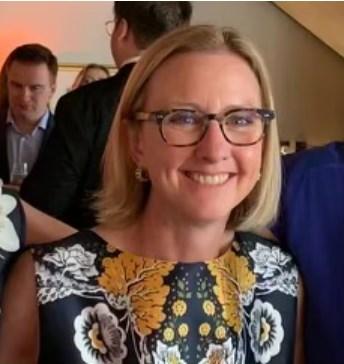 By:Anna Mikulaninec
By:Anna Mikulaninec
With each move, Katie Mikulaninec learned to always trust her intuition.
Moving from Chicago to Dublin, Katie Mikulaninec built her new life form the ground up.
Laying the Foundation for Success
She approached me at the airport, dressed in comfortable clothing, a gray sweater with gray pants. Her plane had been delayed nine hours. She sat down next to me, a table in between us. The smell of coffee filled the air, as I looked around to see many people working in their seats. A smile stretched across her face, as she folded her hands in her lap and cleared her throat. I prepared my questions, and then it started. Leanne Metzcus, a 53 year old mother of twins, lives in Chicago, Illinois, and works as a lawyer. She is an attorney who specializes in helping people buy and sell their businesses. Metzcus has been working since the age of ten when she helped her father set up a computer lab; it was the first of its kind in her community. She attributes her success to establishing a good foundation, working hard, continually learning, and following structured steps.
Computers were huge when they were first invented. Metzcus explains that computers took up a whole floors of buildings and could have different rooms for each component. There would be rooms for cooling, sound insulation, generators, and more. These computers were not very accessible because they were so large, and few people could use them. Eventually, technology improved, the size of computers shrank, and the personal computer was born.
Metzcus’ dad, a professor at a local university, designed a lab to teach people to use this powerful new tool. Metzcus was the lab’s first student and was only ten years old. Being the first student meant that Metzcus was the first to learn about the word processing, spreadsheet, and publishing capabilities of personal computers. She, therefore, had information that no one else did. By teaching in this lab, Metzcus and her dad were: “trying to bring personal computing to the community…we wanted to teach people how to use different software programs.” Even though Metzcus was young, she was driven a to educate others on how to use computers as they evolved and became more accessible. By working in this lab, she was starting to lay the foundation for her future success and the success of her community.
Metzcus believes that having a good foundation helps with problem solving: “It’s important to focus on issues and try to solve them. I think that having a good foundation is the key because you can build upon that foundation.” In other words, if you know the basics, you can apply them to different situations. For example, if Metzcus has trouble using a new software program, she can apply her knowledge of other programs to determine how to use unfamiliar software. She can go back to her foundation to help her logically solve problems.
Once the lab was established, Metzcus and her dad began to provide their classes at other locations in order to reach more people. By going to different universities and businesses, they brought personal computing to more communities. Metzcus details that it was a lot of hard work, but it paid off. She gained even more knowledge and skills that she could use for college, job interviews, applications, and education. Not only that, but she was earning money and had a job at just ten years old. She was also able to get college credits for her teaching. Earning college credits meant Metzcus ended up not having to take three courses in college and she had much more time for homework, extracurriculars, or other things that she wanted to do. She pushed and strived for the best and it showed in her achievements.
Wanting to learn everything she could, Metzcus developed a thirst for knowledge. She was always up to date on the latest developments in personal computing. She then shared what she learned with her students. Being on the cutting edge of personal computing meant Metzcus had to constantly challenge herself and put in the work to keep her course materials relevant. Personal computers were constantly evolving, so Metzcus had to continually learn new things. There was no shortcut that would keep her classes relevant. She states, “you always need to keep learning because everything is evolving all the time…especially now in technology,” and that “education enriches your life.” She is passionate about her education and has a love for learning and expanding her thinking.
Metzcus believes in following good, structured steps. She stresses the importance of thoroughly completing each step rather than jumping to the end. Metzcus shares, “An important thing to remember is that you don’t want to skip steps. You want to take a path that is going to get you where you need to go, but you want to learn the steps along the way.” She believes that working through the various steps of a problem allows her to fully understand and solve it. Knowing all the steps from start to finish helps Metzcus troubleshoot any difficulties that arise.
Leanne Metzcus has learned many things through her computing experiences. She is very hardworking and always pushes to do her best. I appreciate how motivated and determined she was to make her community a better place. This interview helped me to gain more information about how teaching can help enrich a community. Leanne states, “This story is important for others to know because it tells you there really aren’t shortcuts. You need to do the work, lay the foundation, and spend time understanding a subject without jumping right to the end result.” Metzcus improved her community by teaching others about personal computing. She improved her own life by applying the skills she learned at a young age to achieve her goal of becoming a lawyer. She had a vision and worked hard to turn that vision into a reality by making sure she was up to date, had a good foundation, followed structured steps, and didn’t take shortcuts.
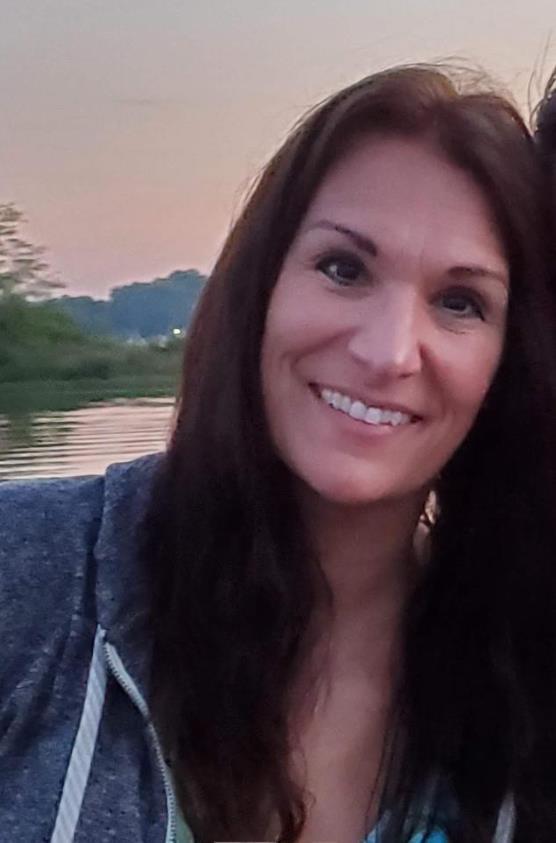 By:
By:


 From a young age, Metzcus wanted to improve her community by teaching computer skills.
Leanne Metzcus: A successful woman who learned at an early age that the keys to success are working hard and having a good foundation.
From a young age, Metzcus wanted to improve her community by teaching computer skills.
Leanne Metzcus: A successful woman who learned at an early age that the keys to success are working hard and having a good foundation.
Lyla Murphy
“This story is important for others to know because it tells you there really aren’t shortcuts. You need to do the work, lay the foundation, and spend time understanding a subject without jumping right to the end result.”
AninterviewwithCyrusRabandhowdifferentpeopleshapedhislife.
By: Jonah Rab
viewer, realize that the most important person in my life right now will eventually change later as I continue to grow up and
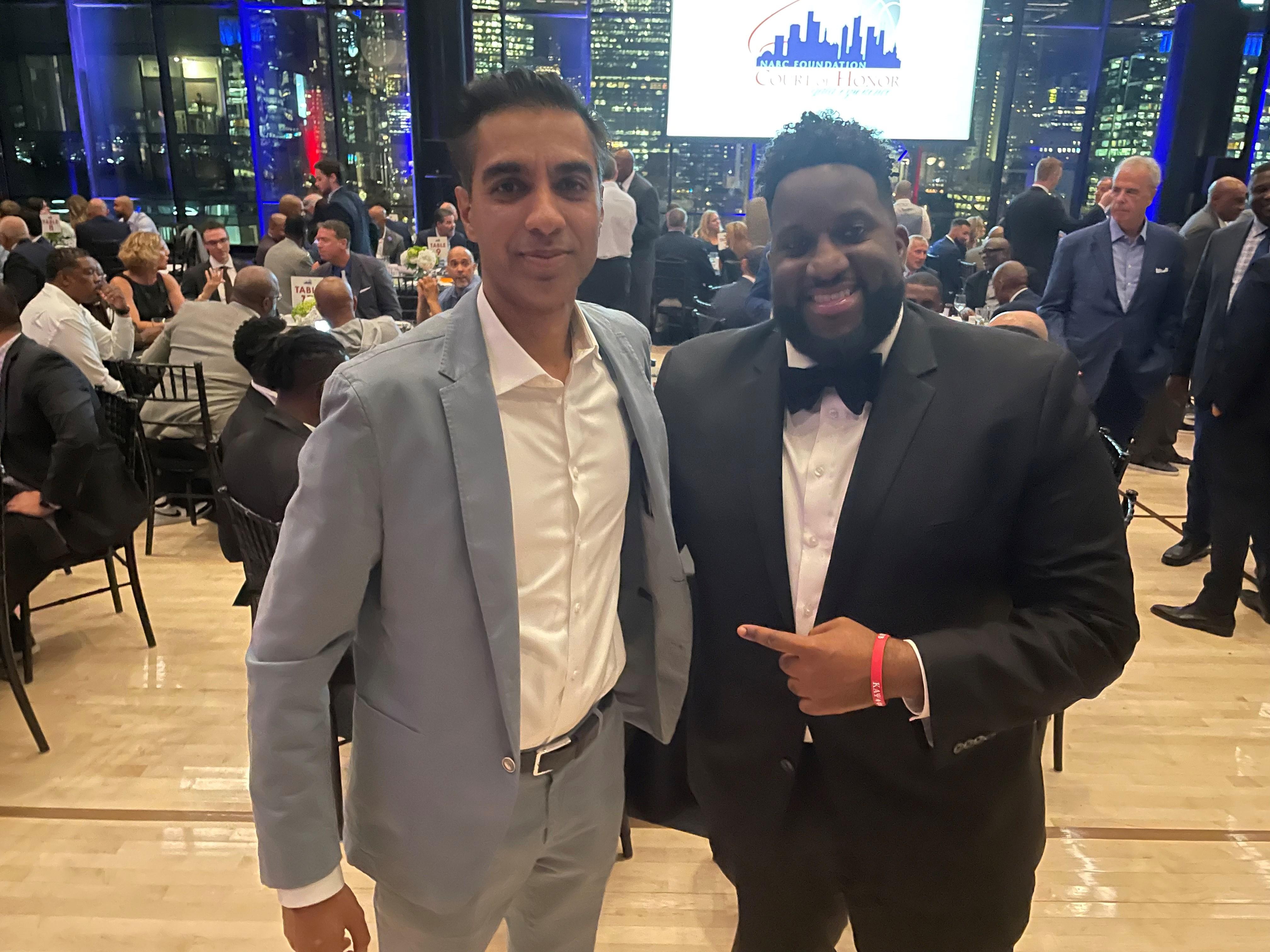
Growing up Rab looked up to many people, whether it be a family member or a celebrity. One person was the 39th president of the United States Jimmy Carter. “He taught me that you have to be concerned about your fellow beings and you have to ” s thoughts during his youth have still stuck with him to this day. Since Rab was 14, he has been doing community work and helping other people. A big spark in that work was due to him looking up to Jimmy Carter.
Rab has had many different people in his life that he looks up to and people that he has to look after. These people have played a major role in his work and how he treats other people. Rab throughout the interview helps you reflect on important people in your life and how they have shaped your own life. No matter what you do in your lifetime, you can always go back to the important people that raised you.
THEPEOPLETHATMAKEYOU
“Probably having you (his son) … it changes the responsibility from your own self to worrying about your child.”
Cyrus Rab at an event for basketball coaches:
A True City
The best things about Chicago
One day, interviewer Caesar Drings took a trip on the architecture tour of Chicago, and took some time to marvel at the patterns of the buildings that lined the skies. As he enjoyed the sights, he met with Craig Sanders II: a lawyer, formerly an airforce pilot, and a man with an eye for city life.

If you live in America, the first thing you'd think of when you hear the word "city" would probably be New York City. The second city, though, might sound something like L.A., San Francisco, or maybe even Chicago. Chicago is one of the most known cities in the U.S., but it's not quite as infamous as what it's worth it's a very architecturally rich city, and has an aesthetic that's a challenge to match. Fortunately, Mr. Sanders, a resident of Chicago, has some intriguing insights about it and its architecture.
Mr. Sanders went into great deal about his history with Chicago the more time he spent in the city, the greater he grew attached to the unique styles and atmosphere. When prompted with questions about it, a couple documented responses caught the ears of the interviewer: “The architecture in Chicago has its own unique midwestern look it doesn’t have quite the eclectic mix that you’d find in New York City, and it’s definitely not a city in Europe, but it’s got a quintessential American feel” “It’s something about the combination of elevated terrain, old buildings, and the concentrated downtown”.
Eclectic: deriving ideas, style, or taste from a broad and diverse range of sources (Definition by Oxford Languages)
While Mr. Sanders is a very astute and insightful individual, but there was always something about the unnatural, yet admiral pattern of the buildings surrounding him that he struggled to put into words. However, his description elaborates on the impressive “balance” between classic and modern styles that others might recognize. Caesar also took an opportunity to ask where Mr. Sanders would travel to if he could travel anywhere with no monetary restraints; he explained that he would go to Paris, because he remembered from his first visit how glamourous the city was. The people were nice, the buildings were finely built, and the entire place was beautiful it gave him some ideas of what to look for in a city.
Living in a city has its perks. As someone who served in the Air Force, he moved often. As a child, however, he moved often too. He enjoyed moving more than less, because he got used to it, and he enjoyed touring new places and meeting new people. He got to compare places to others, and he developed a liking for downtown city life. He mentioned how, by just living in a large city like Chicago, you can be so (physically) close to oodles of different cultures, stores, restaurants, and interesting info. Mr. Sanders clarified that he had gone on Chicago’s architecture tour in the past, so the interviewer brought up that exact topic.
Sanders emphasized what it was like in great detail, explaining how, “It’s simple, it’s a simple tour, but the tour guides are so versed in a lot of Chicago lore a lot of lore behind the architecture of Chicago. It’s… it’s awesome.” One might say that he was mesmerized by the countless stories of random buildings that, and first glance, might not even warrant a thought.
Caesar himself even commented how one need not even
search for “fun facts” or read up on Chicago history since you can find out about it just by living in Chicago. You might pick up an eye catching magazine in a lobby and stumble upon a fact about the Merchandise Mart, or maybe a friend will drop a random thing they knew about a hotel they stayed at. Not to mention, if you visit downtown Chicago, the planetarium, the aquarium, the museum, and multiple art museums are not far away.
Needless to say, anyone could guess that living in Chicago is not just “Cloud Gates and Willis Towers.” After Caesar inquired about Chicago’s downsides, Mr. Sanders responded jovially with, “Yes! …People can’t drive in this city especially if three drops of rain strike the ground. At that point, all bets are off”. While a fun response, it is important to keep in mind that cities like Chicago are very busy places. Therefore, it goes without saying that you should be very vigilant and attentive on the road; not just to keep others safe (and not violently honking at you), but to keep yourself safe too. There are always bad apples behind steering wheels.
Sanders II saw something in Chicago that others might not even consider. He saw an inspiring city with rich history and a considerably rare atmosphere. Between all the info discussed, what didn’t change was the notion that you can never truly take something for granted, regardless of it being the merit that went into every detail on the dozens of buildings that line the old streets, or the person behind every windshield that’s just trying to travel unscathed. It’s easy to forget how there’s countless notes you could take on any place you stand, but that’s because there’s so many things that it’s pointless to take notes. That fact is quite something to think about.
Article by Craig Sanders III
John Sparby’s College Experience
By: James Sinclair
When John Sparby finishes college, he realizes what he really wants to do with his life.
Walking into the living room, I saw him there, sitting on the couch. He was wearing your average sweatpants and shirt while watching football. I sat down next to him, and it began. Finding something you love can take you very far.
When John Sparby was in his senior year of college, his professor pulled him aside to talk about law schools. At this point in college, Sparby was preparing to apply to law schools while he was wrapping up his year. Sparby had always loved his law classes and said they were always super intresting. His professor recommended to Sparby to try and go into business, for a short amount of time, to see if he prefers that over being a lawyer: “One of my constitutional law professors, was super cool, uh, popular professor, sat me down and was talking to me about law schools and said, you know hey, if you want to go to law school, which you can, but just so you know, the average student starting law school was 25 years old, you will be 21. You are kind of at a disadvantage because they have life experience and things to talk about, and write about, and so maybe you go get a job for a couple years in business then apply to law school if you are still ready to do it.”
This little chat with his professor led Sparby to a new path of his life which he later recounted of being one of his best decisions he has made. Sparby took a job in consulting at Stockamp & Associates which, despite coming right out of college, he got into relatively fast. After years of working hard he climbed the ladder and changed jobs to Accretive Health, now R1, in 2004. He is now the President of the company.
Sparby never regretted not going to law school and just staying in business. Over the years he has worked with many lawyers and realized that it was not all the fun that they make it look like in TV. He learned that lawyers spend weeks researching and writing out things before taking it to court which, itself, does not last very long. In the end, Sparby looks back and is so grateful that he never went to law school where he would have regreted everything. He states, “I remember sitting back thinking I’m so glad my
professor pulled me aside.” If his professor had not had a chat with him, Sparby would probably have a different life that he would not enjoy anywhere near as much as today. This teaches us that, mostly when deciding on your life’s work, it is important to make educated decisions that are not only based on your experience but others’ too.
After Sparby left college, he went into business for years. Sparby had a minor in business that allowed him to get into his first company, Stockamp & Associates. He worked at Stockamp & Associates until 2004 when he went to R1. Sparby’s boss offered to pay for a master’s in business so he could better help the company, but Sparby did not have the time. He mentions, “I was able to, kinda, get a master’s in business on the job,” If you really think about it, it does make sense that someone could be educated from the job. Experience in a job can be better than a school, in some cases, because it gives you life experience, experience on the job, and money. Sparby has never gone back to college after Concordia.
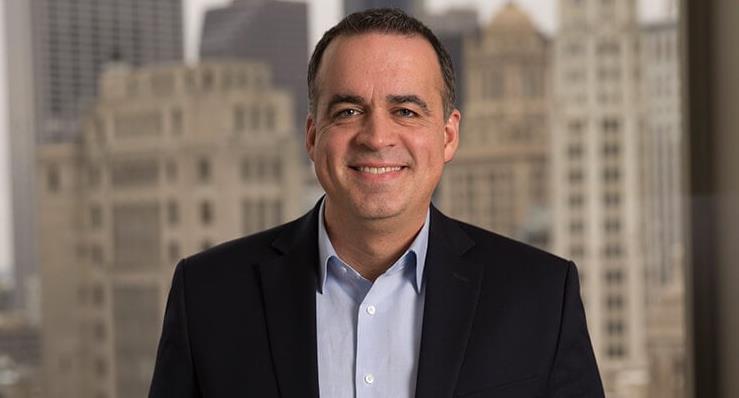
Getting into his first job was not too easy for Sparby. Sparby got out of college with his new advice and starts looking for a job. Then one day, somebody from the college Sparby went to, came up to him and started a general conversation. One thing turned into another, and they start talking about jobs. This man told Sparby about the company he works at and brings up how he would be great at it; he puts in a good word for Sparby and that pushes Sparby into getting hired. This leads up to Sparby giving us a great quote, “It’s not just what you know, it’s who you know,”
Someone that Sparby went to school with, mostly got him his first job. This tells us that along with academics, you should also focus on building relationships with other people like Sparby did. This could help us later in life because one day you may work for someone you grew up with.
Sparby, a 47 year old male from Minnesota, went to Concordia College where he majored in preface law and health administration.
After coming out of college and currently working, I asked Sparby what advice he would give to kids applying or preparing to go to college. I already asked him what he would tell his younger self and he said, “Learning how to learn is more important than accumulating content knowledge,”
To those who are confused, he means that even if you know everything about a topic, you will still need to learn about other things outside of college and you need to learn how to learn that. That is the main message he has for his younger self, but everyone can listen to that as well.
He says this for others, “I would tell them not to worry as much about the college, what college it is… you will get as good as an education, out of that school, as you want to put into it,” What he means here is that to have the best experience in school, you need to put in the best amount of effort. Sparby is telling that even if you go to a great school, if you do not push yourself or invest in it, you will not learn much.
After talking to John Sparby, we have learned many things relating to his college and a little about his business career. Sparby has given
us great advice for those in college or going to college, and one can probably use this advice for high school as well. We also learned about Sparby’s major and how he came about using it for his job leading him to be the President of R1, which is a large company. We can all tell how finding something you love can take you very far.
John
“Learning how to learn is more important than content knowledge.”
The Challenges Of Vujasin
By Felix Vujasin
Vujasin overcomes three challenges in her life
“Come on…we have to leave for school soon,” my mother said as we went into the quiet basement. I had forgotten to interview my mother, Jamie Vujasin, so we were rushing to get it done in the morning. I was so comfortable in my soft, plush pajama pants that I was having a hard time staying awake for the interview. As I sat on the couch talking with my mother, I realized for the first time that she has experienced some challenges in her life. I’ve always had a close relationship with my mom, and it was interesting to hear her talk about some things I never knew about her. Vujasin is a married mother of two boys. She grew up in a Dutch Christian community in the southwest suburbs of Chicago and has lived in the Chicago area most of her life. Vujasin has faced many challenges in her life including being told she was not allowed to attend college, having a difficult job, and raising kids in this age of technology. She overcame these challenges by sticking to her values and working hard.
One of Vujasin’s challenges in her life was being told by her parents that she was not allowed to go to college. Her parents felt that only boys should go to college and that she should focus on getting married and starting a family. Vujasin disagreed with her parents. She was a good student and wanted to have a career. Vujasin told her parents she was going to college in Florida regardless of their help. Vujasin told me, “Don’t let other people tell you who you are or what you are able to do with your life. You can accomplish anything if you really want it.” In the end, her parents
changed their minds and let Vujasin go to college. They were very proud of their daughter since she was the first family member to attend college. Vujasin showed her family that she was capable of more than what they expected of her. This makes me feel that I can do anything I want, including if I wanted to become an astrophysicist, as long as I really want to do it.
Another challenge Vujasin has faced was having a difficult job. In her job as a clinical research associate, her manger always demanded strict due dates that were sometimes barely possible. Work was also always far away and it was hard for Vujasin to get up at 5:00 am to go to work. In addition, she sometimes had to fly on a plane and be away from home four days a week. Because she loved her job, Vujasin was able to work hard and get through the tough challenges in her career. She did not stop or give up. She has said, “You can do anything you want if you work as hard as you need to.” Vujasin prevailed though every hardship in her career. From being tired of traveling, to her difficult work, she prevailed. My mother’s story shows me that through hard work, you can accomplish anything that comes your way. I think about this when I’m having a hard time at school.
Lastly, Vujasin feels that raising kids in this day of technology has been her biggest challenge. Vujasin bore a son in 2008 named Felix. She was very happy about it and had fun teaching him how to talk and walk. Her love for Felix only increased as he grew up and she was very happy. She was very proud of him as she says, “The thing that I’m most proud of is you.” Vujasin explained that her kids are the most important thing to her in her life. But it has not been an easy job raising kids, especially because of the technology today. Vujasin says that kids have too much technology in their lives and finds it difficult to watch her kids have a different childhood than what she had. She feels very strongly that social media should be a lot more restricting. She says this because she feels like everyone is always on their phones. She also feels this way because kids might be exposed to bad and inappropriate things. She says, “I always see everyone taking their phone out all the
time.” Vujasin thinks that people should put their phones away and enjoy nature more. Being in nature calms the mind and it’s just better than seeing things on TikTok, YouTube, etc. It’s more peaceful and calm out in nature, which is healthier for you. Vujasin is working hard to understand the technology available to kids today and is doing her best to keep her children safe and healthy.
Vujasin has made a life for herself by working through the struggles, not running away from them. She has gone through being told she couldn’t go to college, having a difficult career, and raising kids in this day of technology. She leaves us with one more quote, “Do your best and enjoy your life.”
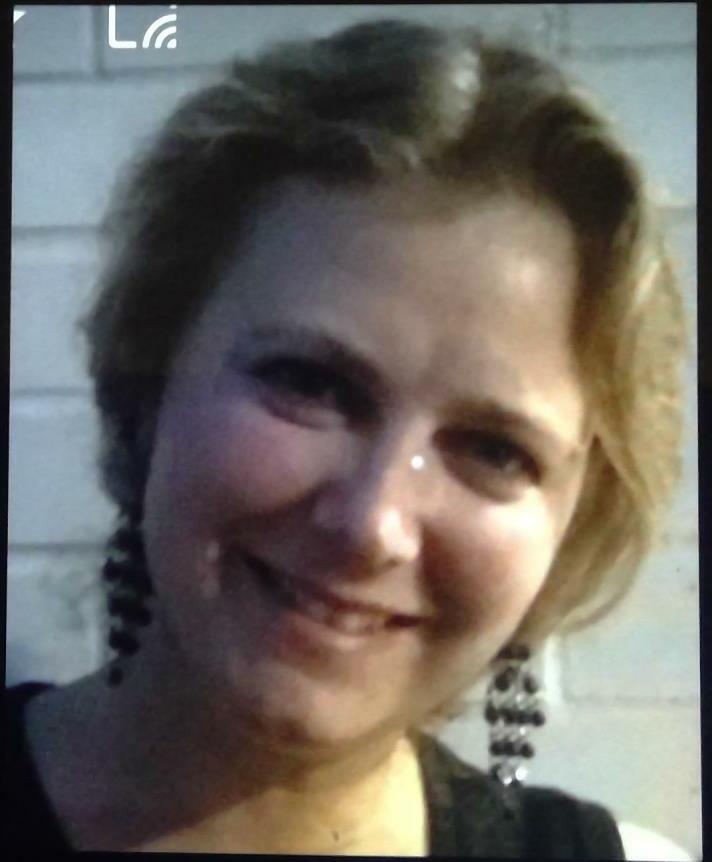
“You can do anything you want if you work as hard as you need to”
Vujasin on her 14th wedding anniversary
It was early on a Monday morning; we were sitting in his room. went on for over 30 minutes as Bob Wilhelm told me everything that I needed to teach the world all about him.
As a CEO, Wilhelm realized that finding the good in people is very valuable. He realized there are a lot of pressures we all face in our day to day lives; and that we can all get caught in a lot of our own worries and things we stress about. But he notes that even if there is that person being not particularly nice to you or they get in your way on something, try to find that thing that brings a smile to you. Whether they say something nice to you, or they say something funny, just try to find that one thing that you like about them. Wilhelm states, “I would say to find the good in people. It’s easy to be stressed out, it’s easy to focus on yourself and how your feelings are, it’s easy to focus on your own agenda, but I think generally speaking, if you can find the good in others and stay positive, you’ll come out with a pretty good view on life and it’s a good way to live.” In the end, you are not going to like everything about everyone, but Wilhelm believes that understanding how to work with people is a skill that will carry on with you for your whole life.
As a tennis player at Georgetown University, Wilhelm learned that you are often not going to get what you want. He learned this when working to make the tennis team as a freshman and he blew out his arm. When this happened, he learned a valuable lesson. Life is not perfect, and things will often be very hard. Wilhelm claims, “You can’t control their decision, but you can control your reaction to their decision.”
HARDWORKISKEY
BY: JACK WILHELM
BOB WILHELM
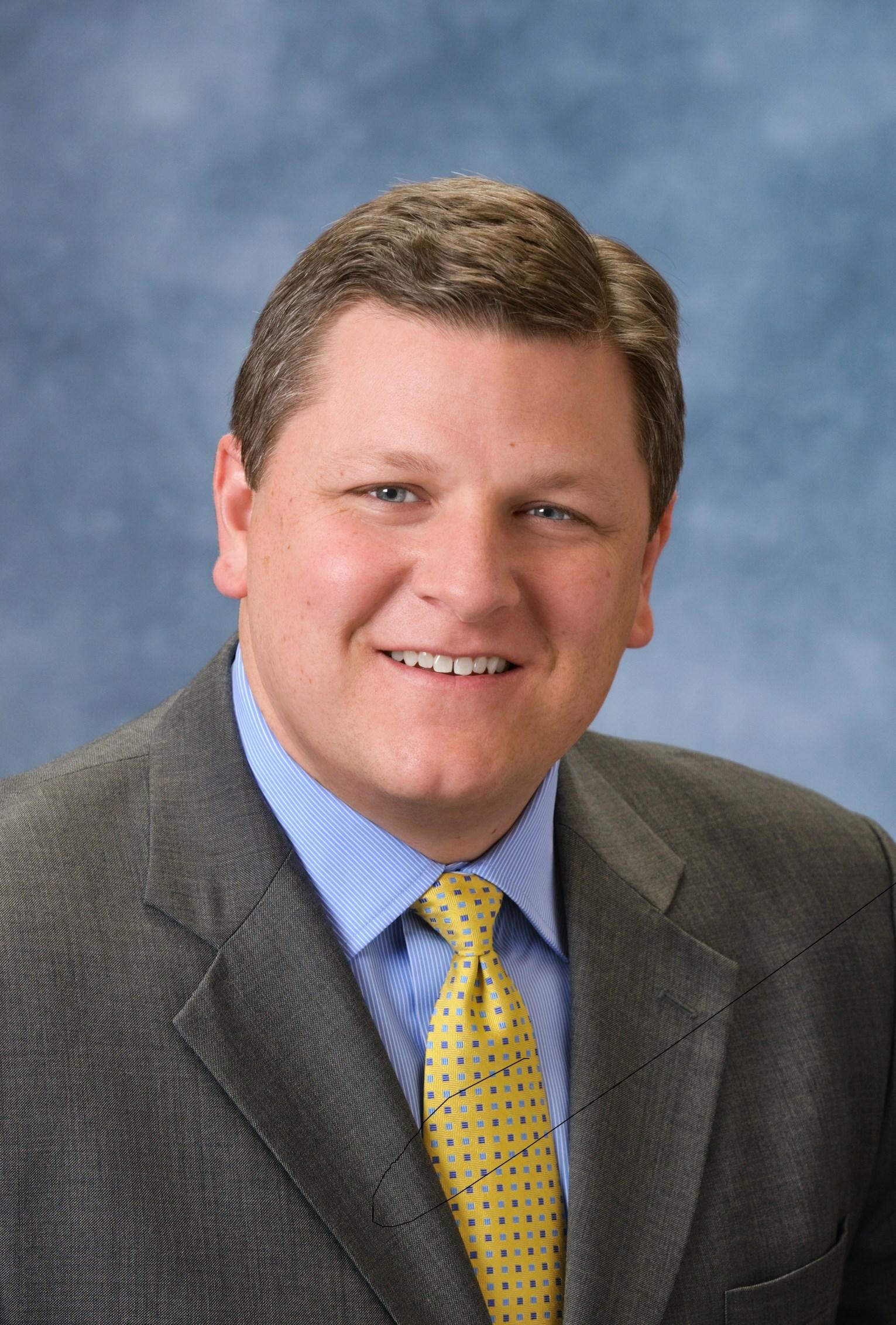
Learning that you cannot get what you want, but you can try to find silver linings in things is a lesson worth learning. Another lesson worth learning is to work hard because sometimes you will not always hit the goal you were aiming for but if you keep persevering, eventually you will get to where you want to be. Learning this lesson helped him prepare to be a CEO where he learned to find the good in people.

As a high school student at Olathe South, a school in suburban Kansas City, Kansas, Wilhelm learned to not care as much about what others thought. He believed that worrying about what others thought was only a distraction to what is important in life. Wilhelm suggests, “Worry a lot less about what other people are thinking.”
Wilhelm believes that if you are kind to everyone, you do not need to worry beyond that. He thinks that doing the right thing is what matters and that all these people who are worried about acting and looking cool are just adding on extra pressure to themselves that they do not need to have. Learning this helped Wilhelm realize that you are not always going to get what you want; so, caring about what others think is just one more unnecessary worry to have.
Using all the lessons he has learned in life; Wilhelm lives an admirable life built off the work he has put in since day one. He has always gone out of his way for others, and it has led to an accomplished life starting all the way back as a little boy in Olathe, Kansas. Wilhelm’s life is all about always doing the right thing and it has led to an amazing life for him.
BOB WILHELM LEARNED TO APPRECIATE PEOPLE FOR WHO THEY ARE
This is Bob Wilhelm, a CEO of multiple companies in his career.
“I would say to find the good in people. It’s easy to be stressed out, it’s easy to focus on yourself and how your feelings are, it’s easy to focus on your own agenda, but I think generally speaking, if you can find the good in others and stay positive, you’ll come out with a pretty good view on life and it’s a good way to live.”
The Life of Heneghan
By: Rosemary Wirtz
It is autumn in Chicago leaves fall slowly as the water hits my mouth. I am about to begin. As the sparkling water sizzles, Marissa adjusts her shirt. Her face is blank yet excited and anticipatory begin. As I stack my papers, ready to dive deeply into Marissa's life, I take a deep breath. For Marissa, education was the most important thing for many years. When having life struggles and things taken away, education is something that no one can take away from you.
When talking about education or being a teacher, she always has a story to tell about her journey and the students. Marissa has gone through many different teaching positions, getting many perspectives.
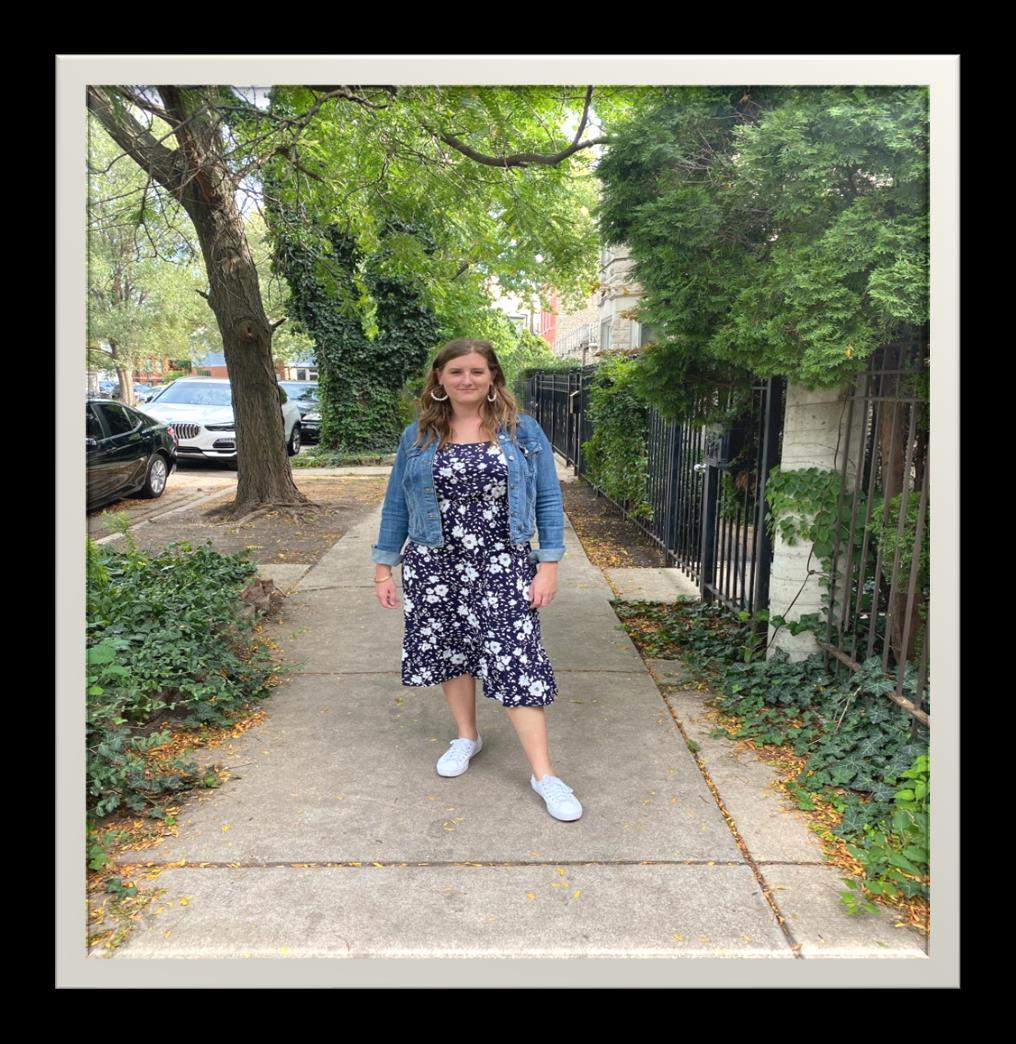
You can tell that Marissa is connected to teaching because when exploring other jobs, such as being an intern at Ruder Finn Public Relations, she states that she "hated it and was so bored just like at the computer doing the stuff I had to research while I was even looking around at other people in the higher up positions; because it is common for an internship not to like what they are doing. When I would look around at other people, I would look around, and this job seems so boring to me; even the most exciting days from other people seemed like I do not care." As Marissa explains her time at this internship, it compares to when she is teaching. Tutoring is where Marissa started, and even that, she seems much more joyful, "I just liked that way better, so that is when I started taking education classes."
She seems ten times more passionate when talking about this small tutoring job at a school. Marissa embraces teaching and will continue to teach and impact students. Marissa speaks fondly of her grandfather "John Liberatore" who helped her through her childhood whenever she was not ok. Marissa had huge age gaps with her sisters in her
childhood which slowly came closer, but, in those times, she did not have a related person to talk to. Since Liberatore had a extravagate age gap with many years behind him, he was able to help Marissa through her hard times and push her education wise where she is today. Considering Marissa was the first person in her family to attend college, her grandpa significantly impacted that. John said some wise words to Marissa in the time he was alive, one of them being that" education is something nobody can ever take away from you…he was really big on getting an education," This shows that Marissa, a young child in this case, and her grandpa, with many years behind him, she was able to take away what he said and take away from that going into the future. John Liberatore, shown throughout Marissa's life, significantly impacted how she is today as a person, as well as education and the boost it gave her.
"Last year, I wanted to open a moving coffee trailer specifically to employ High School kids to create a loving work environment," From the past coming to the future, Marissa's ideas are coming to life not only to fulfill her needs of a teacher but to help those around her and "create a loving work environment." Throughout the interview, she talks of her students and students and honestly wants to help them. As a young child, Marissa was encouraged to become a teacher or educator by her peers, her grandpa, and the teachers she had through the years. Nevertheless, as an educator, every day, no matter the role she partakes, she gives it her all, considers her students, and learns from them too! Marissa and education go way back. Marissa often explains how she has been a tutor, a junior High School English teacher, a High school English and physical education teacher basketball, and a substitute at many places. Of course, she had wins and losses, but in the interview, I asked when she struggled the most and what quote or saying she went to for support. When saying this, she had to think, but later in the interview, she gave her best answer: "There is no equality in education," this quote not only stuck with her but ran as a family motive to keep trying hard. Considering that she is now an English tutor and teacher and was the first person in her family to go to college, this quote helped her along her education journey and life.
When Marissa would not be who she is today without her struggle from her past. During her
childhood, she "was not a vulnerable person" and would try and fit in and not stand out, but with time, education, and experience, she learned, and she would not care what other people thought of her and not think about the "normal person" as much. With good valuable friends, however, she was able to overcome this.
She states that she says to herself every day that to keep being the excellent educator she is now is to "be your best self" and to "think about what you are working toward and what do I have to do to get there" and finally" thinking about not wasting time and not doing something now when will you do it and will you ever do it?" A year ago, her mom died from cancer unexpectedly, which was the saddest moment of her life. However, she overcame it with the help of her motives and her sisters, now close by her side in those times of suffering and sadness.
Marissa, with her struggles, has had a life that she has learned from and a life that she will affect other people with her greatness through education and kindness in educating future minds.
Outside the classroom, life is different than in the class; this is the case for teachers and students. Marissa, throughout her life, was constantly experiencing that; when teaching and being the student, she got a first hand perspective of all views. Something we can all think about in life is, not only in a classroom environment for different people but in life, it is important to value what other people are going through before making assumptions, judging, or being contemptible toward a person.


Outside classroom events drag into behavior in the classroom; kids deal with trauma and different effects unknown to the eye because they are shown inside.
Others can learn and approach with kindness with their perspective but shown with Marissa, her perspective of them to give them more grace and have patience with not only kids but in the real world could benefit, "especially because you do not know what is going on in somebodies' life," she states. Beyond Marissa, the world needs more love, and to give love, you must consider where the root of the anger is coming from of the non loving.
Marissa teaches how she got into teaching and how it is beyond influential to her and her students and the lessons she learned along the way!
“People who need love ask for it in most unloving ways.”
Chasing Fear
The journey of how Melissa Ferguson breaks a pattern and makes a choice for herself, she overcomes her greatest fear, knowing the consequences and discovers a love greater than life.
Melissa Ferguson sat down in the large caramel colored chair beside me, her messy hair and old grey sweatpants somehow still looking elegant. She smiled softly and glanced at the falling leaves outside. Light from the large window poured into the room, filling it with a glow that reflected off her dirty blonde hair. Outside the soft noise of the lawn mower wandered through the half open door, and the warm breeze floated across the living room where we sat. The warm smell of coffee and toasted biscuits filled my nose, “Ok I m ready.”
Melissa was born in Buffalo, New York, but grew up on a farm in Connecticut. Her house was always full of screaming kids as she had six siblings and often more at times. Melissa is thought of as a loving and strong independent person, mother, aunt, sister, and wife. But Melissa had to work to reach that place, being this strong willed was not always the case for her.
Ferguson highly valued and appreciated family for all it was worth with all its benefits and negatives. Ferguson lived in a household of seven siblings including herself, as well as foster kids her family took in for periods at a time. Her mother, Elaine, was a stay at home mom, while her dad had a vigorous job at IBM. Colleen, Ferguson’s sister, is seven years younger than her, and her other siblings are all two years apart in age.
With seven kids in the house, and often more at times, it would be easy to feel unloved and forgotten. However, Ferguson explained, “I definitely never felt unloved, it was hard to get quality time with my mom, but I never once felt unloved.” Her father always made quality time for Ferguson to make her feel special; he took her on dinner dates and vacations, despite his demanding job. Ferguson’s mom, Elaine, was always on the go with so many children, but through the chaos she always made sure her kids felt needed. Throughout the struggles of a large household Ferguson still always felt valued by her family.
Ferguson s sister, Krissy, was closest to her although they often fought. Once a locker room fight even broke out resulting in the coach breaking it up. But through the moments of anger, they also valued each other greatly and had a tremendously close bond. Ferguson was not only close with Krissy, but her youngest sister Colleen. “When I turned seven and she came along, she was like my little baby doll.” Ferguson genuinely cared for her little sister and wanted to be a favorable role model to her. She appreciated her connections with her family more than anything else.
Later in Ferguson s life family was still a priority for her, she loved them greatly as they loved her even through decisions they did not support. As a child Ferguson was raised by her parents on two main beliefs, God first, and family over everything. Elaine was a deeply religious Christian, and as a result, helped to drive that mindset onto her children, even if she did not intend to. She learned many beliefs from her religion, many good but some bad, some of which stuck with her through the decades.
Ferguson s mother taught those beliefs to her children without her knowing the outcome; she believed the only right way to live was religious and defying those values was wrong. In the mornings before school, Melissa and her siblings would have to recite bible verses perfectly, or they could not go. Every Sunday, her whole family would be dressed up, and at 8:00 am church.
Years later Ferguson married, and her family supported this decision, but in the end the relationship failed. “It’s really important to really know yourself and what you want in life.” Ferguson now lives by this value, and it is a pillar in her decision making and life today.
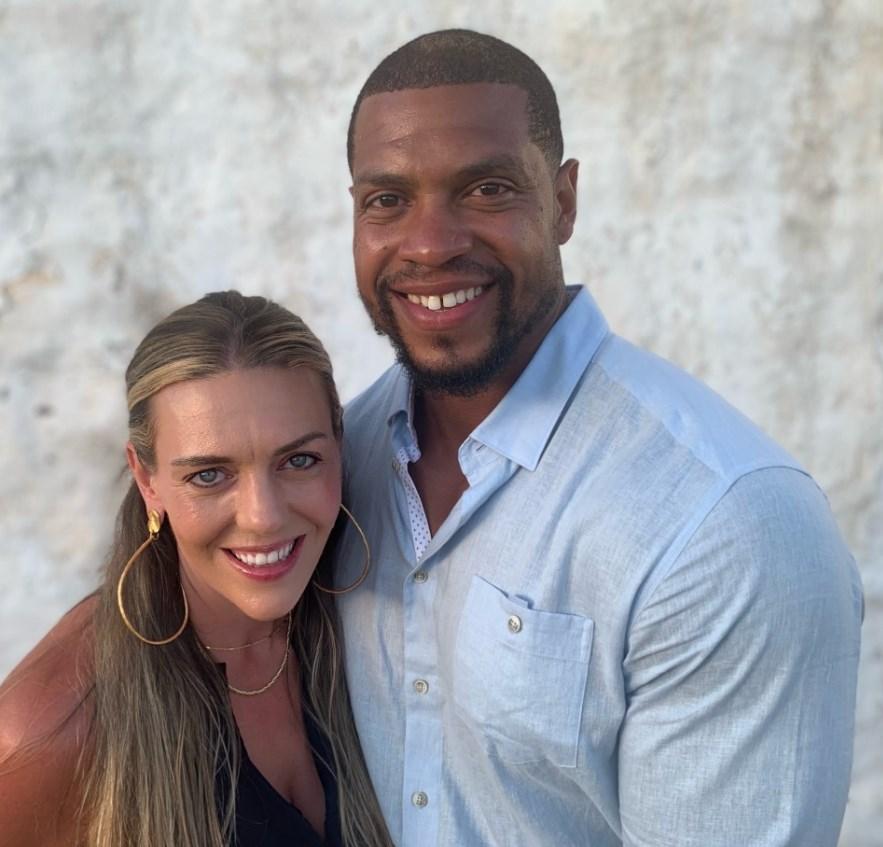
In Ferguson’s family of seven kids, none had been through a divorce, due to it not being the “Christian way.” Her parents believed in making things work and living through the tougher times, because you were not supposed to divorce in Christianity. Ferguson struggled with deciding between a divorce or not, but either way she knew it was not right to live unhappily. Going through her divorce, Ferguson was afraid of her family who she once valued and trusted so much.
Ferguson knew that her parents would not approve of her decision, and she was so afraid of losing that bond, that she kept that large apart of her life from her family for a long time. Ferguson sniffled, “ felt
like I was going to be like an outcast to my family.” The divorce was extremely hard on her, and not being able to talk to the people she loved most, was just adding to the challenge. Ferguson never wanted to feel like a disappointment to her family, so she chose to keep a descion from them, that her parents would ultimately support in the end. Having the terrifying thought of being an issue to your family is one of the hardest things to overcome, but Ferguson conquered her doubts and fears.
Choosing her own path was one of Ferguson’s hardest lessons to learn and to this day she still struggles with it. As a senior in high school with older siblings, she followed her sisters to Wheaton College. In Ferguson’s family, all the girls were forced to attend a Christian college, while the boys were granted a choice of any college they wished. Now, later in life, Ferguson wished she had chosen her own path to a different college where her life may have turned out differently in certain areas. Growing up Ferguson had trailed what her siblings had done, and she desires for her kids today to have a different mindset. “Whether you go to work every day not making a lot of money, but it makes you happy. I think that is what is really important.” Ferguson is now able to have learned a valuable lesson that following in others footprints may not fit your own needs.
Ferguson had learned to be independent, but it took her years to reach that place. Ferguson learned that being her own leader was the best path to follow. “ learned to carve my own path, and that’s still hard at forty four years old, I think you always want to make your parents proud; you never want to feel like you’re disappointing them.” Ferguson still struggles today to be her own person, but whenever things get hard, she remembers how loving and understanding her parents where during a descion they disagreed with.
Ferguson was so afraid of losing the people that she so deeply valued, she hid a life altering moment from them. While divorcing, a shoulder to lean on would have greatly benefited Ferguson, but she had no one to lean on, because she thought her family would disown her for her unholy actions. But what Ferguson did not know, was no matter the descion she made; her family would love her. Her family s love for her, overcame Ferguson’s fears of getting neglected.
Although the divorce was hard on her parents, Ferguson stood up to them and proved it was the right decision for her own well being. Today, Ferguson is extremely close to her parents and siblings who supported her in her divorce and continue to support her in every other descion she makes. Ferguson s kids and her siblings’ kids are all close and know the strength of family. Ferguson’s decision to divorce was not a hinderance to her or her family, but a guide, to prove that making your own choices is good, and broadening her parents once narrow way of thinking.
feeling afraid of choosing your own way is a hard thing to endure, but overcoming that mindset is even harder. She now immeasurably appreciates the strength of family, but she knows she could not have reached that place without breaking the cycle and finally making a choice for herself. She chose to be happy in life instead of the bare minimum. Life is about making your own decisions whether it is mistakes or perfection, not what others want you to do.
By: Selah Abiodun
Constantly
“It’s really important to really know yourself and what you want in life.”
“ I learned to carve my own path, and that’s still hard at forty four years old, I think you always want to make your parents proud; you never want to feel like you’re disappointing them.”
THECHILDHOOD
was from Jordan and his name is Rami Jumean and he is my uncle.
Jumean, had 1 childhood dream, to meet the King Hassan. King Hassan was the king of Jordan. Wanted to meet him, King Hassan was his idol. The King inspired him, and this helped him to become a better man and person.
This also helped him through tough times. Jumean says,
“
ByAlexAwad
Through the phone I could see him sitting down in his car waiting for his daughter to be done with basketball. It was black outside, and he was sitting in his car with black leather behind him. He was wearing a white polo shirt that stood out and some jeans. I could see a light behind him flickering and every time I looked at him, I could see the light flickering on and off. I could also see buildings all around him some were big, and some were small but there was one that really stood out to me the most. The first time I looked at it I couldn’t really see anything but then I saw people playing basketball. They were passing the ball around and playing scrimmage. I could tell they were all tired with sweat dripping down their face. Their cloth drenched with sweat. They were dragging their feet against the floor like they are tired and don’t want to play. I remembered I needed to focus so I did. Then I asked him my first question. What is you name? And where are you from? He
My childhood dream was to meet King Hassan the king of Jordan while I was growing up.” This displays how much he cared for his king and how much this pushed him in many ways. This quote is powerful because it tells what he had in mind his whole childhood. Something that I can I learn from this is how much love he had for his nation and ruler.
Jumean had loving and supportive parents that inspired him and always took care of him. He wasn’t amazing in school when he was a kid and needed help from his parents even when he was in high school and college. Over time his parents started to inspire him, and he wanted to be as helpful as them to his children: “Yes both of my parents inspired me. My parents always pushed me and encouraged me.” This is essential because it shows who pushed him to become better and smarter while he was a kid to show he became successful. What is powerful about this is that it shows how much he was inspired by his parents and how much they made him stronger. I can relate to this because I am also inspired by my parents because of how hard they work to put a roof over my head and food on the table.
Jumean had parents who would do anything for him even if they barely could afford it. Jumean and his parents didn’t have a lot of money though that did not stop his par-
ents from buying stuff that their kids wanted. This dedication to their kids shows how much love and care his parents show to him. One example of this is, “I wanted a bicycle a specific bicycle and they have said no but then they surprised me on my birthday.” This is essential because it shows how much his parents would do for him and shows that they would work hard for their kids because they love them. This is also powerful because of all the love the parents have and the love they like to spread around. In the beginning, they probably did not have the money to buy it since they worked in the war but later worked harder and saved money to buy him a bike. This is how much dedication he has to his parents. I can relate to this because my parents said once that I cannot get the PS5 but for Christmas, they surprised me with it, and I realized that they love me a lot. Planning how to get it for me, so they made a list for where they could buy it.
Jumean’s parents were hard workers and did all they did to put a roof off their heads and food on the table but at the same time, they helped their kids with
howhisparentsgavehimtimeandhelp
RamiJumeantalksabouthischildhoodand
“Ifeltveryhappybecause someofmyfriend’s parentscouldnotafford
homework and gave them time so they could talk. They also gave him stuff that was hard to afford but still did it for their kids’ sake. One quote that supports my claim is, “I felt very happy because some of my friend’s parents could not afford these things.” This quote is important because it shows all the work his parents did for him. his friends and his parents did not make much money, so Jumean’s parents worked harder, and they were able to buy Jumean what he wanted with all that hard work. This has power because of all the work that Jumean’s parents did for him just to make him smile and have a good birthday. I can relate to this because some of my friends’ parents were not able to find a place to buy a PS5.
Jumean had hard working parents that gave him the best childhood he could ever have and without them, he wouldn’t be where he was today. I appreciate how he put in all the work to become as good a parent and person as his parents were and how he gives time to his kids and helps with their homework as his parents did therefore, I appreciate him. I have learned a lot about such as his childhood and more about how he was treated by his parents and how he and his sister were back then. Some Advice I can give from this is that your parents work hard for you every day to get what you want so don’t get mad at them if they get all new stuff just know that they love you with all their heart and you should too.
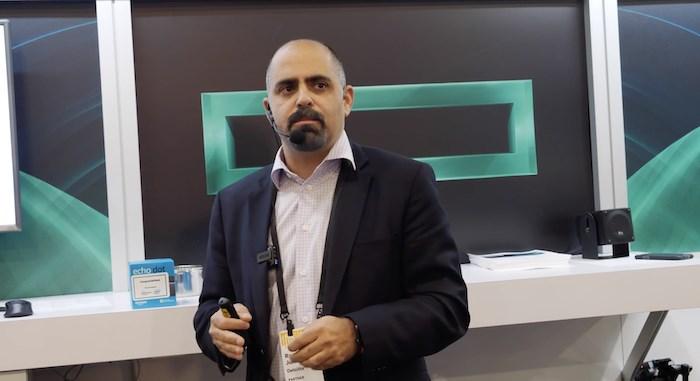 Rami Jumean talks about his childhood and how he didn’t have a lot of money but he didn’t care and studied hard. He also talks about how much his parents did for him and how hard they worked.
Rami Jumean talks about his childhood and how he didn’t have a lot of money but he didn’t care and studied hard. He also talks about how much his parents did for him and how hard they worked.
Anthony Carey is a great athlete, and he has been playing football since he was born. Starting football at a young age, Mr. Carey was able to accomplish so much. For example, Mr. Carey received 10 offers to play Division 1 football. After playing four years at Mount Carmel high school he went on to play division 1 football at Notre Dame. Next, he went on to sign with two NFL teams, The Chicago Bears and the Saint Louis Cardinals. As a 79-year-old man he is now a lawyer.
When Mr. Carey was a young boy, he played many sports, like boxing, handball, alley basketball, soccer, and football. These sports taught him many different skills for his main sport, football. He explains how soccer helps with footwork for football, boxing helps with awareness, and handball improves quickness and agility. He recommends “Playing lots of sports to with your main sport.” It is important for people to hear Mr. Careys advice because his tips and strategies helped him to be a successful athlete. I learned a lot from my Mr. Carey, considering I am a multisport athlete and relate to the benefits of playing multiple sports.
Anthony Carey:
a Athlete’s Road to Success
Anthony Carey is a successful athlete who has a great story to tell with tips along the way.
By: Hugh Carey
Mr. Carey, a football cornerback, has made many mistakes playing with Mount Carmel High School, University of Notre Dame, and NFL football. After making these mistakes, Mr. Carey realized what he did wrong. He adjusted, got right back on his feet, and kept playing football no matter how hard it was. Carey advises, “Not to dwell too much on your mistakes and move on.”
Carey’s experiences show what a professional athlete will do when making a mistake, and that affects so many people who are playing and watching the game. Mr. Carey has a special skill because it is not easy to move on from a mistake that effects so much. This is important to me because it is hard not to dwell on mistakes in sports and in life, but this shows me it is better to move on.
It was certainly not easy to be a Starting D1 athlete. It was a lot of hard work having classes, homework, and working to become a lawyer. On top of all that, he had multiple several hour practices a day. If he did poorly, he couldn’t play football. Carey states, “it was a lot of hard work, but it paid off.” This is important because it shows he was hard working and that is how he got to that level. This means that hard work is important. This shows me that working hard and not giving up will lead me to succeed.
“It was a lot of hard work, but it paid off.”
Mr. Carey was the youngest of seven kids. The oldest in the family was Carey’s brother, Tom, who was ten years older. Tom also played football at Mount Carmel and Notre Dame. After Tom’s college career he went back to Mount Carmel to coach their football team, Mr. Carey’s team. Since Carey looked up to Tom his whole life, it was really special for him to be able to be coached by Tom. Carey comments, “Tom was inspiring and a very good coach.” Carey and his brother had a strong connection through football their whole life. Carey learned it is important to have inspiration to keep you going. This is significant to me because I also have an older brother who plays high school football who I want to follow. My brother Clem will be a role model to me just like Tom was to Mr. Carey.
Mr. Carey was motivated to succeed. Mr. Carey is a hard worker and gives good advice. I learned that other sports will help with my main sport and that I always should have an inspiration. He also taught me not to dwell on my mistakes and to always work hard. I think everyone should follow Carey’s advice.
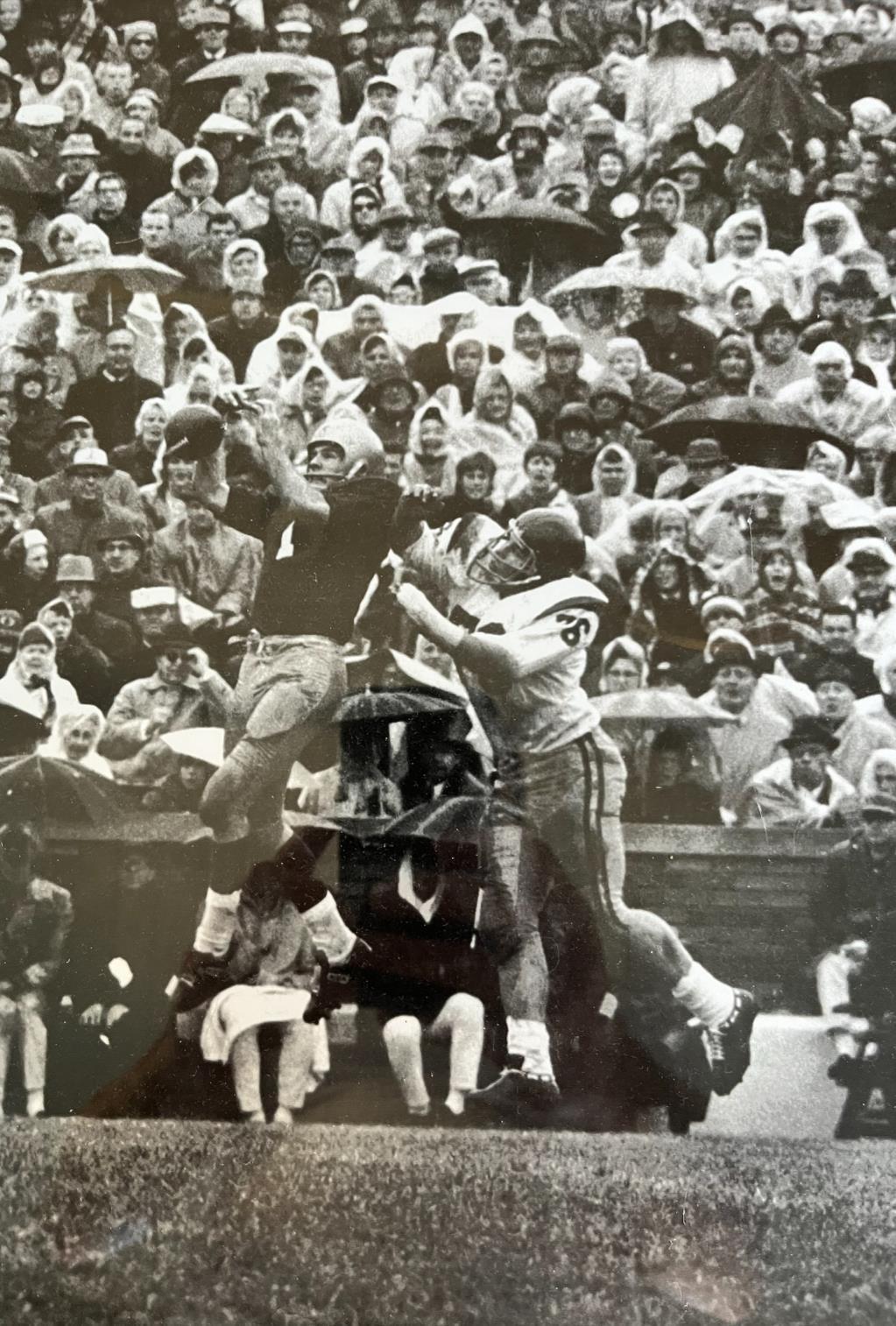 Anthony Carey getting a pick on a rainyday against a college rival in 1964.
By:BeauCunningham
Anthony Carey getting a pick on a rainyday against a college rival in 1964.
By:BeauCunningham
Everydaylifeatthisboardingschoolwasdifferentfrom Cunninghams’regulardailylife.Sheneededtoadapttothesenew rulesandcustoms,butitdidnothappeninaday.Cunninghamhadto perceiverthroughtoughchallengesthroughoutherstay;whichbuilt characterandbroughtdifferentvalues.“Boardingschoolchanged whoIwasthenandwhoIamnow,”exclaimedCunningham.
Cunninghamdidnotveerofffromthechallengeofbeingfaraway fromhomewithrelativesthousandsofmilesawaybutovercame thesethings,furtherstrengtheninghercharacter.Ioftenthinkabout thiswhenIamstrugglingatsomethingandrealizethatIgettogo homeeverynightandsaygoodnighttomyfamilyandthatgivesme motivationtokeeppushing.
Cunninghamfacedmanychallengesatboardingschool,butthe biggestchallengestoovercomewerethosewhereshehadnosay over.Oneofthesewerethefactthatherparentswereboth immigrantsandshewasapartofthefewpeoplethatwerefrom Asiandescent.Cunninghamhadtodealwiththefactthatpeople couldmakefunofherwithherhavingnosayinanything.
Thewindwasblowingagainstathin14-year-oldgirl.Shesatinthe school’swaitingroom,onetearslowlyfallinguntilitfeltlikeatsunami wentacrossherface.Shefeltstuckintimelikenoonenoticedherin thisbigpoolofpeople.Eversincetheteachercameoutthethin woodendoorintothebrightlylightluminescentroomtodeliverthe news;sheknewshewasintherightschoolforher.Jennifer
Cunningham,anursewithfivechildren,whohappenstobemymom, alwayswantedtotrynewthingstoliveabetterlife,alifewhereshe couldexperiencenewthings.Cunninghamalwayswantedtogoto boardingschoolbutknewthiswouldposechallenges,whichiswhy sheopenedupasakidthroughoutherlife.
Cunningham,anurse,hadveryfewchancestoescapeher restrictedtown,asakid,sowhentheopportunitycame,shetookit. Cunninghamwasgiventheopportunitytoescapeherlimitedtown whenshewasgiventheopportunitytogotoboardingschool. Knowingthatthisexperiencewasgoingtocomewithmany challenges,shetookthatriskandforfouryearsstayedatthisschool.
Overtimethoughshestartedtoappreciateandacceptthefactthat herfamilies’cultureandtraditionanddidn’tmindpeoplemakingfun ofheranymore.“Goingtothisnewschoolknowingofmypastculture wasintimidating,andonceIgotthere,Ifeltdifferent.Astheschool timestarted,Ifeltthekidsgoawayfromme,andmakefunofme.But overtimethisallowedmetoreallyunderstandandappreciatewhoI comefrom.Thisalsoallowedmetofindwhomyrealfriendswere,” Cunninghamstated.Themessageofthisquotereallyshowshow othersshouldnotdeterminewhoyouare,andyoushouldappreciate yourcultureandyourbackground.
ForCunninghamperseveranceandeducationheldoneofthe biggestplacesinherheart.Evenifshewashelpingsomeonefinda bookatthelibraryorhavingaone-on-onemomentwithherbest friend,Cunninghamalwayswantedtofindalearningmomentfrom everyexperience.Cunninghamwasalwaysdeterminedtomakethe bestoutofsomethingevenintheworstsituationsandlearnfrom themtotrynottorepeatamistakeshemayhavemadeinthepast.
T
“Humansdonot understandthe beautyofsomething untilthatthingis gone,” Faraway fromhome
“Ifeltthekidsgoawayfrom meandmakefunofme.But overtimethisallowedmeto reallyunderstandand appreciatewhoIcomefrom. Thisalsoallowedmetofind whomyrealfriendswere,”
“Thiseventallowedmetotrulythinkandreflect aboutmymistakesandmakethebestoutofthat momentevenifitwastheworstmomentofmylife, becausehumansdonotunderstandthebeautyof somethinguntilthatthingisgone,”Cunningham mentioned.Youshouldmakethebestoutofevery momentevenifittakesasacrifice.Ioftenthink aboutthisquote,andItrulytrytoenjoyevery momentbecauseIdonotknowwhenthatmoment willbethelast,Ieverfeelthatagain.
WithoutthiseventCunninghammaynothave beenwheresheistoday.Throughoutherstayatthis boardingschool,shedevelopedmanytraitsthat showherwayoflifeandvalues.Oneofthesetraits thatwasdevelopedandstrengthenedatthisschool wasdetermination.Theworddeterminationcan havemanymeaningsbuttoCunninghamthisword means,“strivingforgreatnessandnotstopping alongtheway,”Cunninghamexpressed.
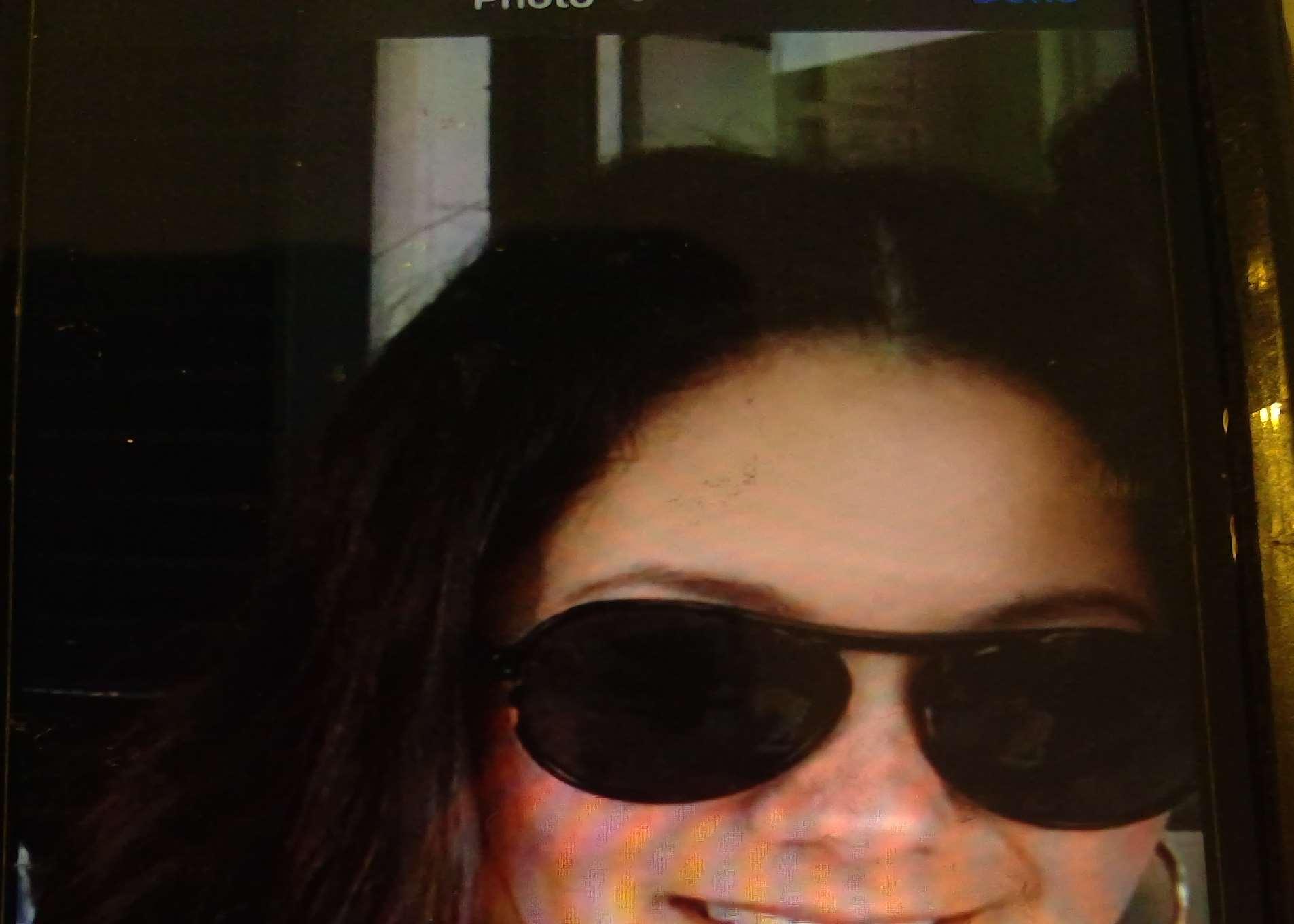
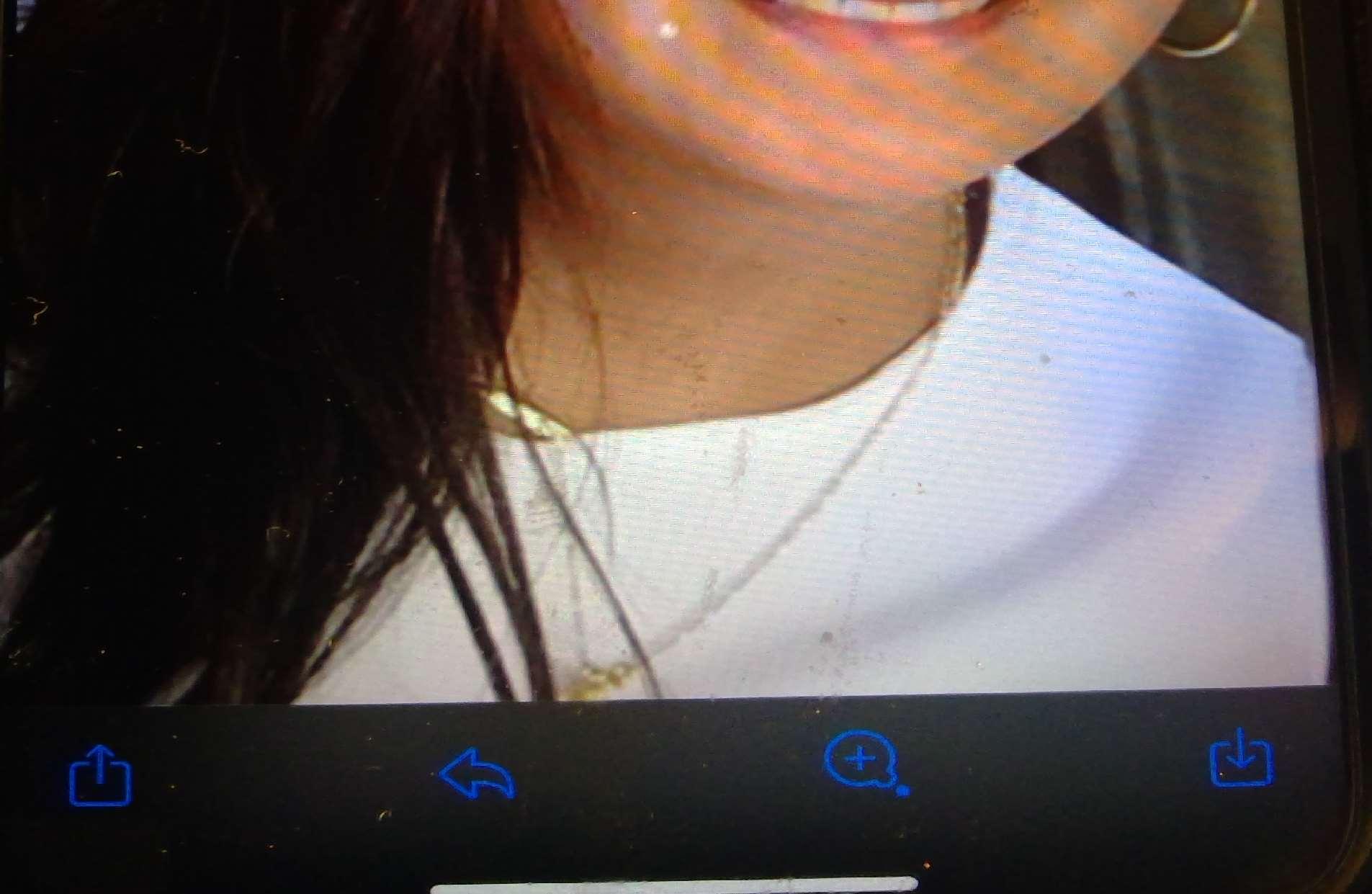
Cunninghammayhavestruggledmanytimesat herschool,butrealcharacterisshownwhenthis happens,Cunninghammotivatedherselfmaking sureherdreamofbecominganursecametrue. “Throughcountlesshoursofsleepdepriveddays,I finallygotacceptedtomydreamschool,StMary’s.I didn’tbelieveinmyselfatallinthestart,butone thingIbelievedinwasattheendworkpaysoff,andI foundthattobetrueintheend,”Cunningham revealed.Thesequotesmeantthemosttomeoutof everythingshesaid.IthoughtthisbecauseIbelieve
inhardworkanddetermination,Ithinkthat anythingispossiblewithenoughworkputintoit.
Peoplewouldsaythattheyhaveexperienced momentsthatchangedtheirlifeforeverinabador goodwayandIthinkthatthereshouldbean outcomeforeveryexperience.Thisinterviewhas openedmyeyesuptotakeinnewopportunitiesno mattertheoutcomepositiveornegative.Ibelieve thatyoushouldtrynewthingsbecauseas Cunninghamsaid,“youcannotkeepdodgingthings youjustneedtochangethosethingsandopen yourselfup.”
JenniferCunninghamlearnsthat youwillneverlearnanything unlessyouopenyourselfupto differentsituations.
THE CHALLENGES OF MOVING
GregGunderson’schallengesthroughmovingandhow hedeltwiththem
By Connor Gunderson
Sitting down in pastel yellow chairs, we could hear faint car honks. It was a late night and we sat in the front room of the house. Gunderson was wearing comfy sweats in dark colors. It was a calm quiet night, okay he said, and I started the interview. Greg Gunderson grew up in Bethalto which is a small town in southern Illinois by St Louis. He did not have any big moves, so he stayed in the same house until he left for college. When he left for college, it was his first time moving away permanently. He was nervous but also excited, and it was hard for him to adjust from a small town to a big college campus. Big changes in life can be hard but eventually it will settle in.
out who you are.” Moving can be hard, but through experience and perseverance you will eventually succeed.
When you move you have to get used to your environment which can be hard. But you will eventually learn to adapt and have fun. Throughout moving you will forget who you are in these new places, but you will learn to change and adapt to your environment and really find out who you are.
“
with change, and you learn how to change and adapt to your environments and figure out who you are.”
Gunderson had to move a lot throughout his life, through those moves he learned a lot. Gunderson grew up in Bethalto IL then moved to Illinois state university for college. He then moved to Edwardsville IL for grad school and lived in St. Louis. He then got a job in St. Louis and got offered to go to Milwaukee Wisconsin. After that he moved back to St. Louis, and now he is in Chicago.
During moves he needed to learn a lot, he needed to learn to adapt and get used to his environment. Gunderson has learned a lot while moving, he states, “You learn how to deal with change, and you learn how to change and adapt to your environments and figure
Gunderson has faced many challenges while moving, but those challenges made him a better person. When you are moving your entire life resets, you face many challenges and have to do things that you might not want to do. When those challenges come up you will be scared but you need to try your best and do it.
Gunderson states, “Sometimes you might be afraid to take an opportunity, but you should always give it a shot.” A lot of new opportunities come up when you have a big move. Some might be new events, new restaurants, or new people and you might be afraid to experience these. If you have met new people but you always say no to hanging out with them, then you should try it and see what it is like. When you do not take up opportunities like this then you will stay inside of your bubble and not get to experience life to the fullest.
When Gunderson moved, he had to leave behind friends and family. With moving comes many sacrifices, and you will need to find ways to get those things back. Gunderson moved to a lot of places so when he moved, he had to leave behind old friends and make new ones. He moved a lot, so he had to find new friends every time and still maintain friendships with old friends.
You learn how to deal
When Gunderson moved, he had to leave behind friends and family. With moving comes many sacrifices, and you will need to find ways to get those things back. Gunderson moved to a lot of places so when he moved, he had to leave behind old friends and make new ones. He moved a lot, so he had to find new friends every time and still maintain friendships with old friends. There are some advantages, he states, “You learn to come out of your shell and talk to people you do not know.” When Gunderson moved away from his family for the first time it was hard for him to adjust to new people. He had a hard time meeting new people and making friends because he stayed in a small town. But he did not let that stop him, he went to talk to new people and expand his horizons. Moving taught him how to be more social and to be more open minded.
Moving to new places can be hard, but you will eventually learn to be comfortable. Gunderson had a hard time while moving but today he is an amazing person. What he has learned throughout those challenges has helped him become a better person today. Gunderson is now a great person even though he had many challenges.
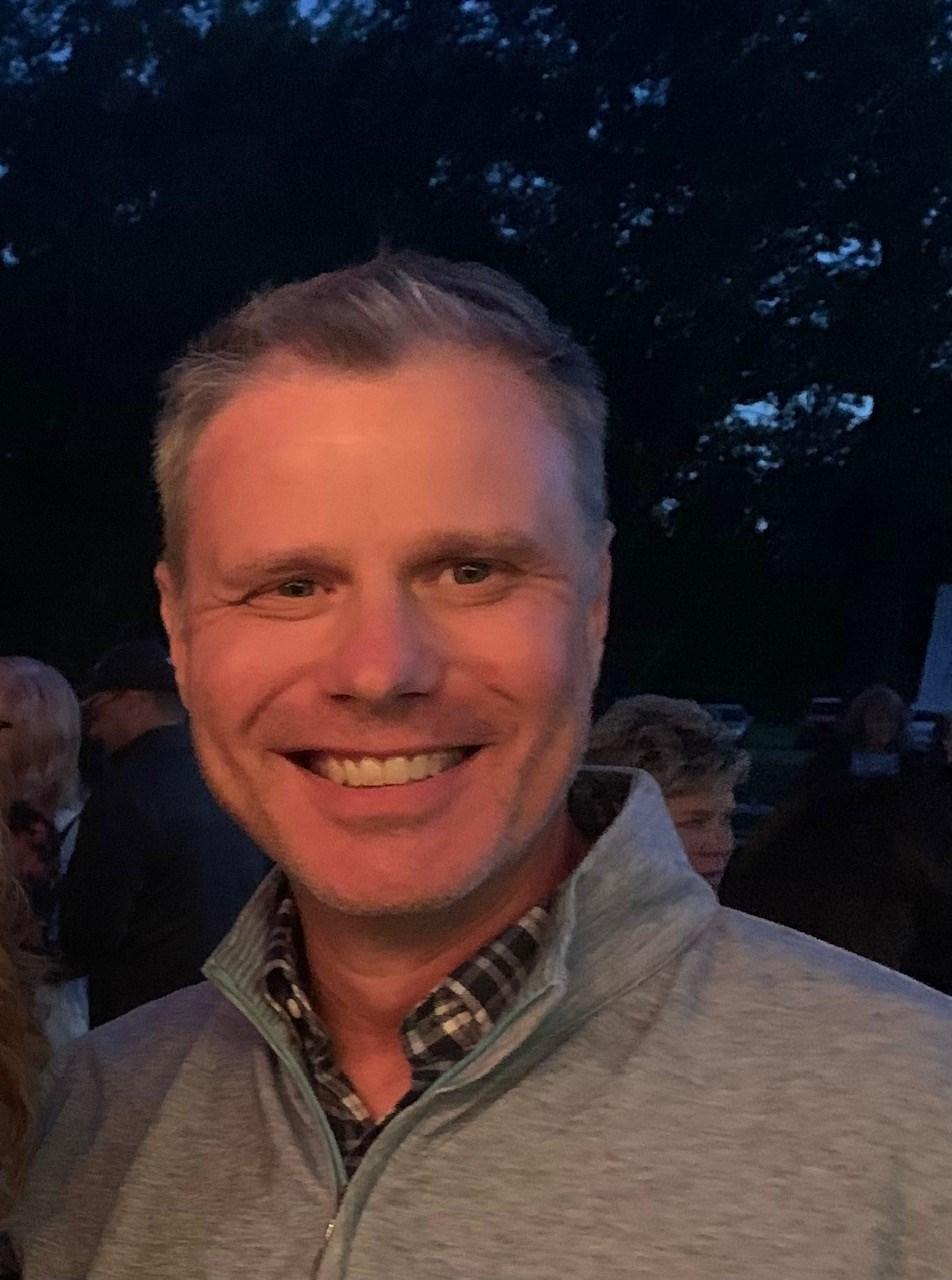
Hard Work Pays Off
Kerri Johnson learns to use her lesson that she learned when a kid like to be humble and hardworking to move forward and succeed in life.
By: Sarah Johnson
The lights were dimmed, and Kerri Johnson was sitting on the couch in her room, about to fall asleep. I walked in and she perked up as I asked her to answer some questions. Johnson sat up yawning and said, “Okay.” Johnson was born in 1973, and now a successful preschool teacher and a mom of 4. She works at Frances Xavier Warde School in Chicago, Illinois. She has lived in Chicago all of her life. She works everyday to work for her family and herself. Despite difficult times, Johnson has worked as hard as she could possibly work to move forward in life.
While attending college, Johnson had to work extra hard in college by working at a job and attending school. Johnson always wanted to go to college but had to work a little harder than
others to get there. She grew up with many siblings and college was not her families first priority. This was because in a family so big simple necessities like food could be a lot of money, so the family couldn’t really think about paying for a college tuition. The only way she was able to attend college was for her to pay the tuition. So, this led for Johnson to explain, “It was hard to imagen staying or going to college for more than 4 years.” This is showing that Johnson had to work extra hard to pay for tuition. As Johnson explained you could tell that she was hardworking and had determination. And being hardworking and determined can get you through challenges.
Johnson attended University of Loyola Chicago and DePaul University. While attending these colleges she worked at this company called CCC and she did anything they told her to do. By hearing what Johnson has done in her life it has taught me to be grateful for what I have because others do not always have it as easy as others. This has also taught me to be hardworking because you are never going to get to your dreams without working hard for them. But one big lesson I can learn is that you should not take money for granted because just in a snap it could all be gone.
These skills of being hardworking and being determined had come even before college for Johnson. She had attended Saint Ignatius College Prep. She absolutely loved it there.
Johnson, a high school basketball player, was a part of the 1991 Women’s Varsity Basketball team, now in the Ignatius Hall of Fame. She learned many things from this team. Johnson explained, “Basketball taught me discipline, the importance of teamwork and supporting others, and to be humble.”
Johnson told a story saying that during her years in high school she had to fight for her starting spot on the team. Everyday in the summer she would go and practice outside to work towards the starting five. Her coaches saw her determination and in her senior year she got one of the starting five spots. This is showing she was so determined to get the starting spot that she didn’t stop working. Johnson, a hardworking basketball player whose story can help people do the same or relate to her. People believe that just because something is hard and difficult means that it is impossible to accomplish, Johnson has a story that people that think this could hear and learn. Johnson can teach people that something that is that important to you can come true if you really put in work and are determined.
Johnson, now a teacher at Frances Xavier Warde School, really enjoys her job. This is her 15th year teaching at FXW. 2020 was a crazy year for everyone. Schooling had to be changed online for people all around the world. As Johnson was trying to get used to this new change she recalled, “Teaching preschool online was pretty much impossible.” Johnson talked about how teaching preschool was very hands on and a lot of playing with other kids, and one of their main goals is to limit children’s screentime but covid and zooms only increased it. Johnson worked all day, every day working on making videos for her preschoolers to learn from. She would make videos of her reading books or writing lessons or different counting strategies, to help create a fun and less active time on a device.
Johnson and many teachers from FXW made sure and worked as hard as possible to teach as much as they could online. Covid was a tough year for many, but the only way students were able to learn were from hardworking teachers and Johnson succeeded that box very early into covid.
As we can see Johnson has been working hard her whole life. As Johnson siad, “Basketball taught me discipline, the importance of teamwork and supporting others, and to be humble.” Johnson can teach everyone something not only to be hardworking but to use lesson that you learn when you are younger to succeed in life. She has inspired me to do the same as her. I have learned many lessons in my life, but now I’m going to remember to use them later in life when needed. Overall, 3 main things people can learn from Johnson’s story is to be hardworking, be appreciative, and know that lesson you learn in life can help you succeed in life.
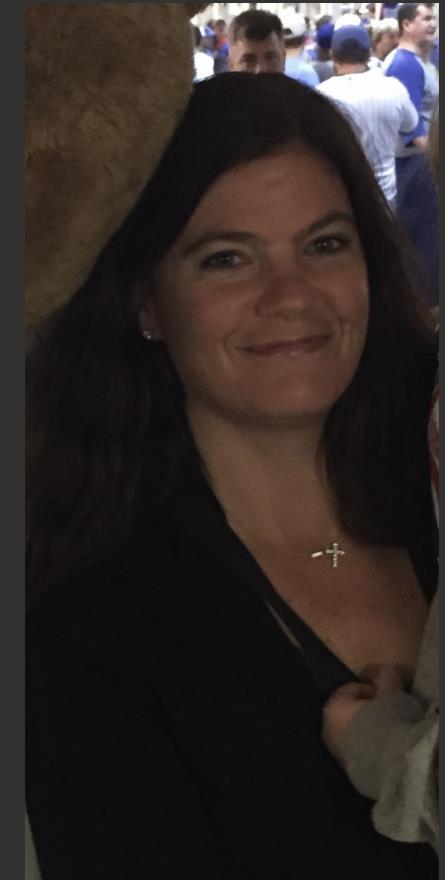
“Basketball taught me discipline, the importance of teamwork and supporting others, and to be humble.” Kerri Johnson
ADIFFERENTPERSPECTIVEON LIFE
By:ChristopherKelley
Diane Kelley sat in her chair in her high-rise apartment. Sun shining through the window, smell of her new furniture ran through my nose. She sat down, and with her soft, calming reassuring voice she asks, “Are you sure you want to hear this?” Diane Kelley is a beloved grandmother, mother, and friend to all. Everybody admired her strength, courage, and love. People always thought that she had acquired these traits from her perfect childhood, but that was not the case.
Diane Kelley, an Italian immigrant, grew up in the city of Chicago, which was already hard enough. Even with those difficulties, Kelley managed to push through theses tuff times. She always spoke kindly about everyone she ever met, and Kelly always valued time with loved ones. But this wasn’t because she had a perfect childhood, this was because of a life altering experience that changed her life forever. It was December of 1945 and she had just gotten home from a regular school day when she discovers her 4 year old sister balling in the living room. Kelly reflected: “I remember her screaming that her school was on fire”. As soon as she heard this she runs to her school. She first sees the school covered in flames, “I was in disbelief, there were children trying to crawl out of the windows to escape the fire. I thought I had lost my brother.” In total 92 kids died in the fire along with 6 teachers. “From that moment on I valued every single moment with my loved ones, because you never know when something like this could happen.” This can teach all of us to value every moment that we have with our loved ones because at any time something like this could happen and we deeply regret not spending time with them.
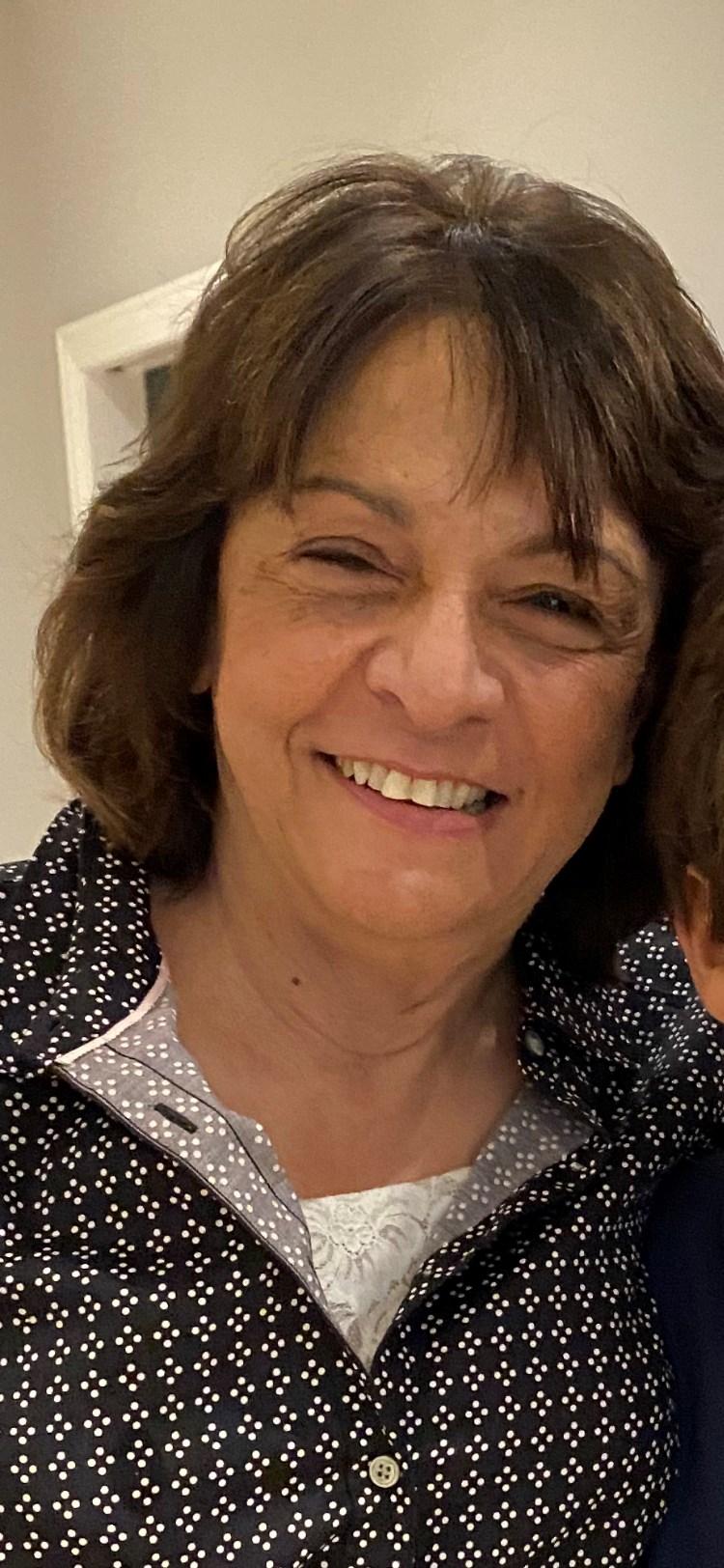
Although this was a life altering experience Kelley always tries to make the best out of things. After the school burned down her whole neighborhood was devastated. Kelley wanted to make things right again. So they started to rebuild the school. “I knew I wanted to do more, I still help out with charity events and fundraisers at the school today.” Kelley’s impact affected the whole neighborhood and potentially the whole country. “After the fire we start-
ed a movement to implement sprinkler systems in every school in the nation. I truly believe that this fire had a worldwide impact.” There were also many charity events to help hospitals to be prepared with this type of thing. Most hospital patients that were affected by the fire died, because the hospital wasn’t prepared for events like this. We can learn from what Kelley has done and use it to try and impact the world today, and to try and make it a better place.
During the fire there was a lot of panic. Parents trying to bust through the crowd to try and find their children. During all of this panic Kelley managed to stay calm, and help other parents in need, even though her brother was still inside of the burning building. “I had truly thought that I had lost my brother that day.” But even with this thought of her brother dying in her head, she still managed to comfort parents and loved ones who were also at the scene of the fire. After minutes of searching, she finally finds her brother. “I finally find my brother. He was covered in soot and ash.” All of us can strive to be like Kelley in this way. Even with her brother inside of a burning building she managed to stay calm and help others before herself.
92 innocent children died that day
— Diane Kelley
Diane Curio Kelley, secretary of Perkin Elmer, one of then largest engineering companies in then world, speaks about a life altering experience that will shape her life forever.
Kelley, a grandmother to 7, always found time to play or hang out with her grandchildren. All of her 7 Grandchildren were divided across the country. With some in Texas and some in Illinois. Regardless, Kelley always found time to spend with her grandchildren. Whether that be helping around the house in Texas or taking her grandchildren for a boat ride on lake Michigan. Kelley was always great with time management because she would never want to miss a moment with any of her family. “I love all of my grandchildren with all of my heart.” This quote demonstrates how she feels about her loved ones and her family. This also demonstrates how hard she is willing to work in order for her to be able to see her grandchildren and her family. This teaches us to all to work hard for who we love, and to do everything we can love each other.
“Always value every moment you have with your loved ones” she spoke. Something that Diane Kelley would say often. She lived by this rule every single day to try and make her become the best person she believes. She lives by this statement; and she tries to incorporate it into every day. From this we can Learn to all be like Kelley in some ways of our lives. Sometimes it can be frustrating to live by this rule, but if we try our best it will all make us better people in the end.
The Journey to the Break
I walked into the dining room on a cool September morning and saw Monisha Lozier sitting at the head of the table next to her computer and a cup of coffee that was no longer hot. The same spot she sits at every day for hours in her computer light. She spends her days with one eye on her work and the other on her Orchids and the birdfeeder on the bay window, waiting for an American Goldfinch or a Black Capped Chickadee to catch her eye. It was early on a Sunday, so naturally, she was still in her pajamas and her navy-blue vest. I sat next to her and placed my recording device on a grey and white floral table runner. Then I pressed play and sleepily said, “So, tell me about yourself.”
Monisha Grace Kaplan (now Lozier) is an only child, a daughter, a Midwesterner, a career woman, an entrepreneur, a wife, a mom, an aunt, a friend, a gardener, a birdwatcher, a world traveler, and a thoughtful, hard worker. She also describes herself as a work in-progress. She has worked hard as a businesswoman for over 25 years and after facing many challenges and watching loved ones around her hurt during the pandemic, she has decided to take a break from work. But so much has led to this decision; every job she has had and every big milestone and challenge she has faced, so she can now take a break and take a breath.
Monisha Grace Kaplan was born in Brighton, England in 1971. Her parents, Jim and Anne, were American, but in England working on their PhDs, and while they were there she arrived. The three of them lived there for about a year until they came home to Illinois to be near family. Unfortunately, Jim died when Monisha was only 3 and so she was raised by her mother who never remarried for most of her childhood.
Monisha was brought up with high expectations from the two adults who mattered the most to her: her mother and her father’s father. Her mother is/was a single hard-working career woman who spent her entire 45 year career in one place: Northern Illinois University where she was a historian and one of the vice presidents. Her grandfather was Jewish and ran from Russia to escape persecution in the early 1900s. He came to America without knowing English, and he put himself through med school. He served as an American doctor in the Korean war and built an American life.
For Monisha, that was a very intimidating life to live up to, and all she wanted to do was impress him. In fact, Monisha almost followed in his footsteps: “For a long time, I said I wanted to be a doctor because my grandfather was a doctor, and he was the most important man in my life until he died when I was 13. I really wanted to impress him. Even though I’m not wired to be a doctor… I wanted to make him happy.” Similarly, Monisha also thought she might be a professional piano player. Her father had been a pianist, and she loved her piano teacher, so she wanted to make her happy.
She says, “This people pleasing was a pattern for me early on, and it took me a really long time to think about what I wanted that had nothing to do with anyone else.” When asked, “If you could tell your childhood-self one thing, what would it be?” she says she would tell herself that…
By Mae Lozier
She grew up in DeKalb, Illinois where she attended Clinton Rosette Middle School and DeKalb High School. She left the Midwest to attend Connecticut College (in New London, CT) where she studied political science, and from there she moved to Washington DC where she spent nearly all of her 20s. She came back to the Midwest and to Chicago specifically, to attend Northwestern University’s Kellogg Graduate School of Business, where she met her future husband, Chris Lozier. They fell in love over a week-long road trip from Evanston, IL to San Francisco, CA. They started the trip as new friends and ended it as a couple and they have lived together since the final day of that trip! Monisha and Chris live in Chicago, IL and have two daughters.
For the last 25 years, Monisha has been an executive recruiter and a career coach. Along the way she was the co founder of two non profits related to these skills. She says she is happy with it and has been very successful, however she says she chose her career, in many ways, because of how it overlaps with her mother’s career.
“although the people pleasing part of you makes you likable and accessible, it has a downside too. You cannot please everyone.”
Monisha is on the path of learning about what she wants to do for herself instead of pleasing others in her life…
During the pandemic, Monisha turned 50 and she started to rethink her work and her relationship to it. At the same time, her oldest daughter was suffering from anxiety and an eating disorder, but Monisha was so busy with work in the pandemic crisis that she says she hadn’t noticed that her daughter was restricting food intake, “Thatfeltpretty bad…”
Monisha started to imagine a new way of being with less work and wondering if she could make it happen. She thought about the non-work experiences in her life that have shaped who she is today, some that stand out are from her travels. She has had a lot of incredible travel experiences and one she mentioned that was really important happened all the way back in 5th grade. “My class went to France and stayed with French families. I got to try new foods and was introduced to so many things that made my small Illinois town seem even smaller. After this trip, the daughter of the family in France came to DeKalb to stay with us.” Monisha made very close and meaningful relationships there and still carries them with her today.
These memories and a hope to reconnect with what makes her happy has led Monisha to a big decision this year: to take a break from her career for a while. She has never not worked, and so this feels really scary to her, especially because she does not have a plan for what she will do next.
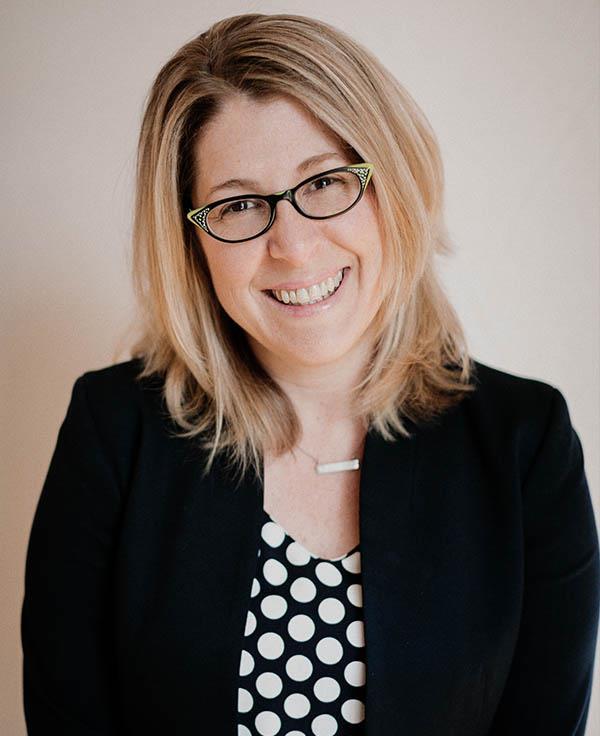
Monisha is nervous about what is next, but she is also hopeful. She says, “I have never not had a plan before, but lots of times
my plans were things I thought other people wanted me to do, and so now I am going to figure out what that is for myself.”
BY: OSCAR MOLLOY
SUZANNEYOON’SPATHTOSUCCESS
We just got back from running errands, only an hour until we have to leave for my football game. Suzanne Yoon, my mom, walks into the house and puts the groceries on the countertop. She grabs a glass of water and tells me, “I am going to the office to get some work done, be ready in an hour for your game.” As she walks away, I remember that I must interview her and realize that this would be my last chance to do it. I ask her, “Can we do the interview now?” She replies, “Sure, let’s go do it in the office.” She sits down in a big grey chair across from where I’m sitting. The lights are dim, and the room is dead silent when I ask her, “Are you ready?” and she says, “Yes, start the recording.” Yoon grew up in Chicago with an immigrant family and had three younger siblings. She was the one who ran the house and was working hard when her parents were not there. From this experience, she always wants people to live a good life and do great things. Growing up in an immigrant family with parents who immigrated from halfway across the world isn’t the most ideal situation for becoming successful. For Yoon, The CEO and founder of Kinzie Capital
Partners, it was exactly like that. Living with three other siblings to take care of, doing chores asked by her parents, and having to deal with all her schoolwork at the same time.
Being the oldest of four, it was her responsibility to run the house and family when her parents weren’t home, especially after her dad died when she was ten years old. Yoon learned how to work at a very young age from all the things she was asked to do: cook for her siblings, help out at her dad’s deli, and clean around the house. “I grew up in Chicago and was born to Korean immigrants who really came here to start a new life. I learned how to work very early. My father was an engineer while my mother was a nurse. . . the first time I started to go to work with my dad was when I was four years old in a deli, and he would give me Twix bars in exchange for stocking the shelves.”
This suggests that Yoon was a hard worker all her life, even before she was in school or had a paying job. As Yoon introduced how her childhood was like and where she was from, I noticed that she was
leading me into the main discussion of the topic: how she manages Kinzie Capital Partners. Chicago is where Yoon learned how to work hard and become someone who takes nothing and turns it into something more than just average. Being her son, I can really see how her childhood affected her and how she became who she is today, but I cannot relate to the struggles she had as a kid.
Yoon worked harder than many kids in her class and grade, getting a full scholarship to the University of Iowa and having a 4.5 GPA in high school. Attempting to find her passion, Yoon fell into private equity through many different jobs in college involving with finance and money. She had supportive people around her that didn’t just teach her how to work hard, but to work smart and learn skills that were needed to become a successful businesswoman. Yoon explained to me, “Through college I had many jobs such as internships every summer at banks, banking institutions and finance. I did this because I was really interested in economics and finance and really just making money so that I had my own finance and stability.”
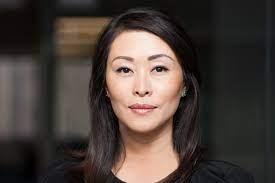 KINZIE CAPITAL PARTNER’S CEO, SUZANNE YOON, IS A ROLE MODEL FOR ALL THE WOMAN OUT THERE THAT WANT TO ACCOMPLISH GREAT THINGS IN THEIR LIFE.
KINZIE CAPITAL PARTNER’S CEO, SUZANNE YOON, IS A ROLE MODEL FOR ALL THE WOMAN OUT THERE THAT WANT TO ACCOMPLISH GREAT THINGS IN THEIR LIFE.
This suggests that Yoon found her passion in college through different hard working jobs and classes. This influences me for my future and college experience because of the way she works hard and tries to be better than everybody else. Yoon’s career took off after college and started to climb the ranks in private equity. I see that Yoon is very passionate about what she did back then and what she does today, showing me dedication that you cannot find in many people.
Being a CEO of a private equity company isn’t easy. Yoon’s responsibilities include dealing with all the team members, all the information that is sent from the team to her, picking the right people to hire and the right companies to invest in, and pretty much everything that has to do with Kinzie. Yoon has been working on her company since 2017 and has been trying to grow and bring success to it ever since. She has and still is investing and growing different companies such as Colony Display, Aero Design Labs, and Chelsea Lighting.
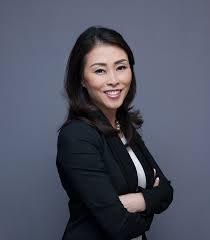
The process of doing her work is a lot harder and more complicated than just saying what she does. She explains to me the long process of what it takes to find, grow, and sell a company but then summarizes it in the end. After I asked Yoon about the process of her work, she smiled and explained, “So first it’s identifying a good company, good product, and good service that we think can grow. Second is developing a process and operational improvement metrics that we think we can implement quickly
so that the company can continue to grow. And then once it gets to a certain size and we can’t do anything anymore, we sell it to a bigger private equity buyer.”
This shows inside detail on the process of private equity and that Yoon perfects the many little details in each part of the process, creating the best result possible. It explains a part of how she runs Kinzie and what she actually does while at the office. This makes me think that I should be more appreciative of what Yoon does for me because I now know how hard she works to make me and my family’s life as best as possible.
Yoon tries to juggle between her company, family, sleep, alone time, and time for enjoyment. Doing things that are not related to your work or the one thing that you do the most is a very important aspect of life. Finding a balance between all these things can be hard for some people, especially for someone like Yoon whose time is mostly spent on work.
Although Yoon struggles with balancing out her time between work and other things in her life, she finds her work to be enjoyable and interesting. This is the reason why she is able to do it at such a high level for a long period of time. She states, “I actually find a lot of enjoyment from my work, so it’s not binary to me, I think you can be happy and work a lot if you love your work. No matter how much you love something, you have to take a step back and find time to do things that are not just related to work. Even though I work a lot, I really try to spend time with the family and focus on that time with the family.”
This shows that Yoon believes in a balance between different things in your life and not just the focus on one singular thing. She enjoys doing what she does and doesn’t feel that she always needs to get away from her job, something that many people can take away from this interview. Obviously, she wants there to be a balance between things, which is why she explains in this interview that many people, including herself, needs to take a break whether the job is enjoyable or not. This is an inspir-
ing part of the interview for me because she shows that everyone needs balance and a break from work, even the people that run the company such as herself.
Yoon is a very successful and inspirational person who I admire and appreciate as a mom and a CEO. She is the best mentor I could have ever asked for and has turned me into the person I am today. After interviewing her, I realized how hard she works and why it is so hard for her to find free time. I think that if there is someone who you can learn from, whether it’s for business or daily life, Yoon is the person to learn from. As she says frequently, “Live a good life and do great things.” Yoon believes that everyone should try to live their lives to their full potential.
“Live a good life and do great things.”
“Don’t be so hard on yourself. You’re human, you’re going to make mistakes, not all people are going to like your decisions, and you shouldn’t be hard on yourself while making a path of your own.”
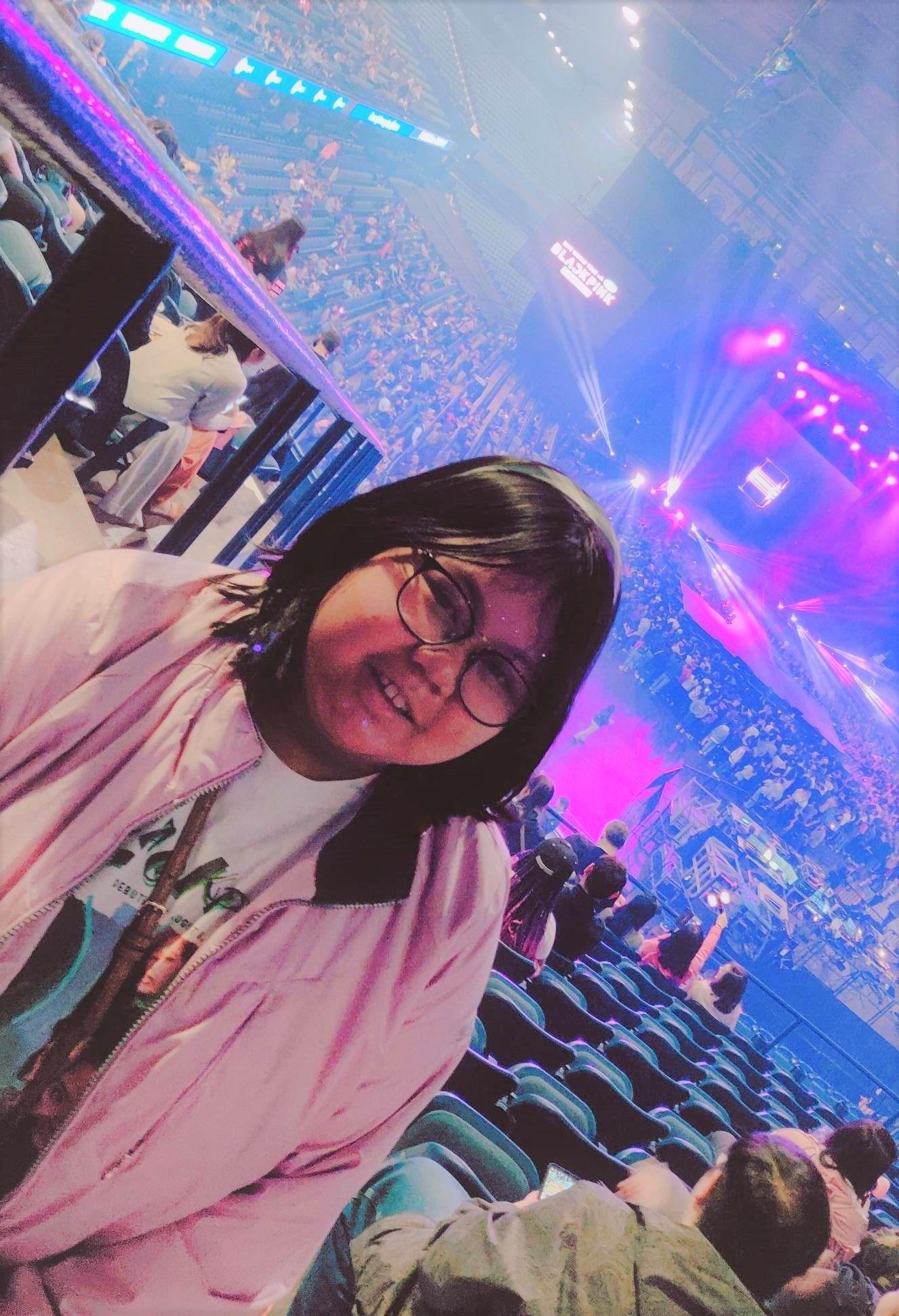
Nostalgia:
It
“I finally figured out what I want to do, where my interests lie, and also realizing these things that I should be doing as a student and person.”
The Value of Family
support and foster everybody’s happiness. Lorena wants to teach everyone the value and importance of family
Silva’s grandparents were a big part of her life. All four of her grandparents were of different nationalities: Portuguese, Italian, Brazilian, and German. Silva explained, “My childhood and my teenage years were amazing. You can imagine that the variety of food was impressive.” She was with her family and the bond they had.
Her Italian grandmother had eleven children, so she had a lot of cousins and family members. When she was young, Silva was taught the importance of family by her grandparents. Family is still important to her as she loves her grandkids and loves to get family together. Being a grandmother, Silva loves to spend her time with family; she is happiest with her grandchildren.
From her family, Silva was taught many values in her life. The two most important values to her are generosity and honesty. These two principals of generosity and honesty were installed in her when she was young. Since Silva grew up in a catholic family, these values were especially important to her and her family as well.
It was October 5th, 2022. I was sitting down at the kitchen table watching the hanging green plants stand majestically. Suddenly, my grandma arrived in the dimly lit space. The sun beam son her wrinkled face. My grandma walks over: a fivefoot, wrinkled, smiling woman. We sit down, and she chuckles, “Recording!” Lorena Malhaes da Silva is a 77-year-old retired teacher. Lorena was raised well by her huge family. As a mother of three and a grandmother of six, she works hard to
Silva’s family was incredibly involved in the catholic church. Silva explains, “Generosity also has examples in our family. Since we are a catholic family, my uncle helped two priests’ study to go learn at the Vatican. So, our family has this tendency of help, generosity, and Catholicism.” This exemplifies her family’s dedication and devotion to the catholic church. From these experiences her family has had with the church, she has been living out this value and installing them in other members of her family including her children and grandchildren.
Lorena Malhaes da Silva learns the importance and value of family
By: Nico Silva
“My childhood and teenage years were amazing! You could imagine that the variety of food was impressive.”
“Nobody is perfect, we always look to do the right thing. But the right thing might not always be perfect.”
Silva has been living out this value of generosity and honesty since she was young. From her family, Silva was taught the importance of service and serving others. Along with generosity, Silva strives to be kind and always wants to help others. To live out these values that were installed in her at a youthful age, she volunteers at various places to serve her community.
In her hometown, Rio de Janeiro, she helps at an orphanage. Silva states, “You sponsor a child, they have parents and a family, but their families are very poor. Sponsoring this child, you give them academic supplies, food, and clothes.” This demonstrates Silva’s dedication to helping and giving back to her community. Silva loves to help her grandchildren with school projects and helping people always puts a smile on her face.
The principle of family, tradition, and helping others has been installed in Silva at an early age. Now, Silva always looks to help others around her, and takes pride in her ability to aid people. As Silva reiterates, “Nobody is perfect, we always look to do the right thing. But the right thing might not always be perfect.” This proves that Silva is always motivated to do what is right and stand up for what is wrong.
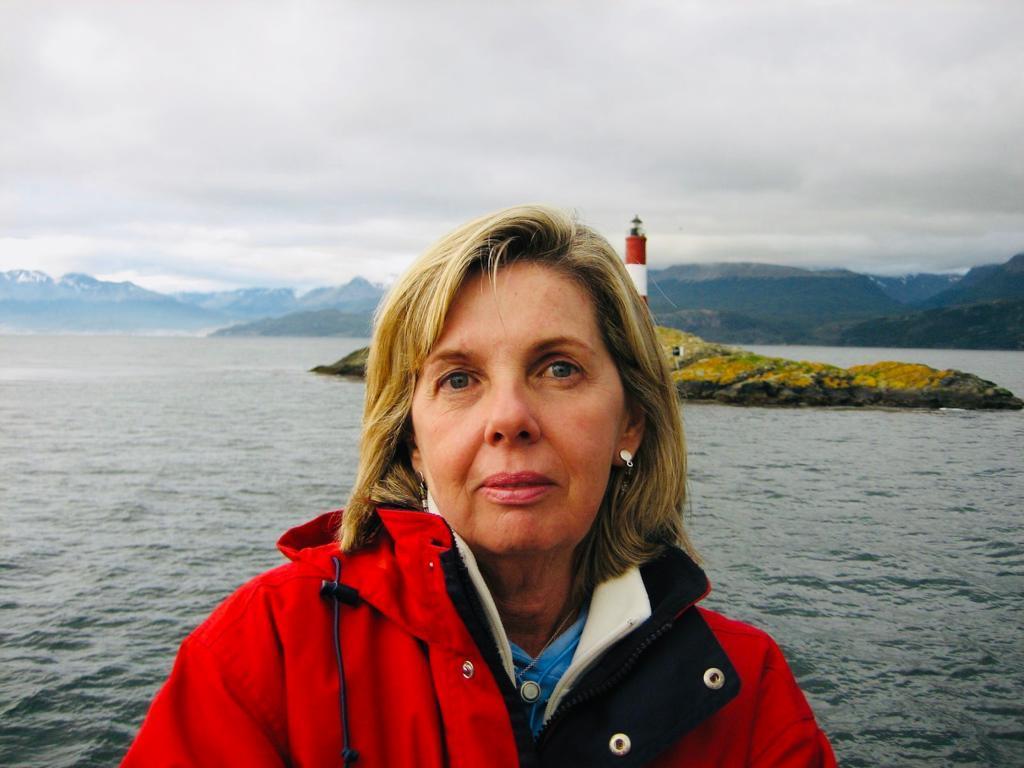 Lorena Malhaes da Silva puts everyone before herself.
Lorena Malhaes da Silva puts everyone before herself.
Working for Non-Violence in Chicago

“I wanted to help try to find solutions to gun violence in Chicago.” Stephens started her work to find solutions to gun violence and violence in general throughout our community. Although she was already making a difference through her criminal justice work, she wanted to make an even bigger difference by saving lives. As a criminal justice worker at state agency, the Criminal Justice Information Agency, Stephens worked for victim services across the state. Although, this was helping our community already, Stephens wanted to make an even bigger impact in the city of Chicago. Which is why Stephens started this organization.
Stephens has incorporated helping and supporting others into her work. If any staff or participants is going through something or having a hard time she will step up and help whenever she gets the chance. She does this because of the huge lesson she has learned from her years in this field, “Being present and showing up for people can make a huge difference. The smallest actions can make the biggest impacts.” Stephens learned through her work that stepping up and helping even when people do not ask, is really important.
Lisa Stephens teaches us that as a community we need to support each other and work together to help our community.
By: Alice Stephens
Lisa Stephens was in her room of her home. Sitting in her big chair, Stephens holds a cup of coffee, anticipation filling the room. Stephens adjusts her glasses with an excited, yet blank look on her face. I was ready to listen and learn. I clicked the audio button, and we were off. Stephens Non-violence prevention work began in 2016. This non profit organization, Institute for Non Violence Chicago, was started by Stephens and the executive director.
Stephens works as a Chief Operating Officer for this institution. Institute For Non Violence Chicago works to prevent non violence, specifically gun violence in the city of Chicago. Stephens believes that as a community we need to support each other and work together to help our community.
Stephens has faced many challenges and learned many lessons from her work. As Stephens learns new lessons day by day, the biggest lesson that Stephens has taken away is, “ We should not be forever judged by our worst decisions.” This was one of her biggest takeaways because she realized that, yeah, people make bad decisions but instead of judging them just from that, help them learn from their decisions and help to prevent others from making bad decisions as well.
Stephens has helped many participants come up from what they did by trusting them and helping along the way. Others and I can learn from this because you never fully know who someone is based off their bad decisions, so changing your perspective or going into something with a new light can make a difference.
“Being present and showing up for people can make a huge difference. The smallest actions can have the biggest impacts. ”
Most times when people are having a hard time, they do not ask for help because they could be embarrassed and do not want to trouble others with their issues, therefore Stephens is observant and helps whenever she can. Many people can learn from is quote because you do not know what people are going through so just a simple, are you okay?, can make a big impact on people.
Stephens’s goal through her work is to, simply stated, save lives throughout our community. She is working every day 9 5 to help our community to overcome the issue that is gun violence.
illustrating a very real issue when the topic of gun-violence gets brought up.
It also holds a lot of important meaning. This is important to Stephens because she works hard every day to prevent gun violence, so for people to treat saving lives as a political issue is truly heartbreaking. This quote holds meaning because if we want to end gun violence, we need everyone to work together and everyone’s help. However, that is not going to happen if people are bringing politics into the matter of saving lives.
I want people to be able to walk on the streets of Chicago feeling safe, even if they are alone.
that she is doing every day to try to accomplish this mission, so it is important for her to share what they are working for. We need people to know this so we can all work together to help our communities.
In conclusion, there is so much being done and so many steps to work at to prevent gun violence throughout our community. As a community we need to support each other and work together to help. Stephens reminds us that we should have hope, “For people that care about the city and care about the issue, there is a lot being done.”
Stephens is very passionate about what she does and has a lot of important things to say, “Saving lives should not be a political issue,” This is
Stephens has been working to prevent gun violence for many years. And in order to keep people safe there are many steps they are working to prevent, “ First we need to keep bullets from flying, then we can work on the issues of poverty and disinvestment that are those drivers of violence.” This is demonstrating the actual first physical steps preventing gun-violence. This is important to Stephens because this is the work
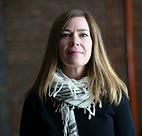
“Saving lives should not be a political issue.”
JOURNEY TO SUCCESS
October 10th, 2022, was the first time I started my interviews with Abbas. Something he said that inspired me was: “The United States has become my home.”
My dad, Samer Abbas has gone through many struggles and obstacles throughout his journey moving to the United States. Even with all the struggles he dealt with, he still achieved many things that no one should forget.
Abbas was born in Syria, which is across the world in the Middle East. He was born on August 28th, 1974.
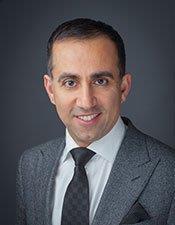
The first place Abbas visited outside of the Middle East was Saint Louis, Missouri. He remembers being so apprehensive, he had butterflies in his stomach. Abbas had no idea what to expect. His flight was at 8 am, and it was a 15 hour journey so when he landed in Saint Louis, he was drained. That night he went to bed dreaming about all the possible things that could happen in his future.
In this piece, I want to express all the obstacles my dad has overcome, and the way he has managed to grow from them.
Abbas states, that while he was living in Syria it was not very developed. Though it was a genuinely nice and peaceful country. Abbas enjoyed living in Syria during his childhood though he would not consider moving back to the Middle East.
Moving to the United States specifically, Chicago has become a dream come true. Abbas first moved to the United States to continue his studies to become a Cardiologist, which is a heart doctor.
He attended college and medical school in Syria. Then moved to Saint Louis, Missouri to finish his residency. Abbas landed in Saint louis on August 12th, 1998; and did residency at Saint Louis University. There were so many challenges ahead of him. He did not speak a word in English, he had extraordinarily little money, and he did not have a visa or a US citizenship.
Abbas once said, “Moving to the United States was a dream but adapting was extremely challenging.” My dad came to the United States with something to accomplish. He managed to do this with all his struggles and disadvantages. Abbas is a very hardworking and determined person. He is very selfless, and always chooses to help people before himself. He works in an environment where he is dedicated to save people’s lives every day. Teaching me the way to care for others before myself, Abbas is the greatest inspiration in my life
The first challenge Abbas dealt with was
getting a visa to come to the United States. The first time my dad applied for a visa from the US Embassy in Syria he was rejected, and he was terribly upset. He applied for a second time and wrote a letter of appeal. This helped him to get an interview. After his second interview he was able to receive the visa! Something my dad quotes is, “when the guy gave me the approval for the visa, he told me to go achieve my dreams.”
This was just the beginning.
Once he arrived in the United States Abbas had to deal with adapting. Abbas’s first language was Arabic, and when he moved to the United States, he did not speak a word in English. Abbas would go to a place called Kaplan, which is a standardized test training center. Though he did not get his work translated, and he would have a tough time understanding assignments throughout school, but he tried his best. Abbas mainly learned English through conversation with other people.
Another disadvantage Abbas had to deal with was not having very much money. When he first moved to the United States, he lived with is older cousin. This was not a permanent move, he stayed with is cousin for the first couple months before finding himself his own apartment.
Even with the many struggles my dad had to deal with, he still overcame them and was able to achieve many things in the future.
Now that I have shown you the struggles Abbas has gone through let’s highlight some accomplishments.
The visa and US citizenship were struggles because of the process. Though they were also accomplishments. Abbas had to work for both, the visa, and US citizenship. With these things he can travel the world which is one of his favorite hobbies.
Another thing Abbas has accomplished was becoming the chief of cardiology at Community Hospital, in Munster Indiana. Where he is serving people who are less fortunate than us. Abbas is also the director of Vacuole service in the community health care system. He established a group of doctors to start a cardiology group at Community Hospital. My dad started as only him working to a whole group of 15 other guys to collaborate with him.
There is one thing my dad shared with me that has stuck in my mid sense I was a little girl is,
Abbas was so brave, powerful, and strong throughout his journey even with all his conflicts. I hope this inspires you, as it does to me to work hard and be determined to achieve your goals every day.
Abbas is now living in Chicago, IL in Lincoln Park with his three kids, wife, and a dog. He is working and saving people lives every day and doing the things he loves for the people he loves.
Abbas has gone through so many hard ships, but he learned, adapted, and ended with an exciting and joyous life. Something I appreciate about my dad is that he always puts people before himself. He is very hardworking and believes that with challenging work comes amazing things. This encourages me to push my boundries in everything I do for the best outcome.
It also shows me the comparison between the way my dad’s childhood was to my childhood. This makes me feel grateful for everything I have, and it also makes me notice how easy this childhood is compared to our parents’ childhood.
If there was one thing, I could give you to take away, it would be that in life you are going to be faced with difficulties, struggles, and accomplishments. If you perseveres and are dedicated to the things you do, you can defeat and overcome the struggles ahead of you for the best future.
“It was a tough journey, but I had a goal, so I achieved it.”
By: LaylaAbbas
The journey my dad took to get where he is today.
By Sofia Alba
From 1st generation college graduate, Oscar Alba has started his own architecture firm from scratch. While not having a great family history for education, Alba yearned to learn and did the best he could do have a good education. He graduated middle school and high school at the top of his class. He applied to University of Illinois in Chicago, which was in the top ten universities in the nation. He majored in architecture and luckily for him, he had much knowledge about construction and design from his childhood experiences with his father, a construction worker Many people in Alba’s family had experience or had a career with building and construction, so he decided to keep the family “tradition” going He enjoyed drawing and building as a child, so he thought, why not put those two together and make a living out of it, and so that’s what he did.
Alba had faced many challenges while in Chicago, but he was motivated to keep achieving his dreams to be an architect. When he moved to Chicago from El Paso, Texas, he knew he had to leave nearly everything behind: his family, his home, and had to start everything from the bottom. Not one person had taught him what to expect while he was in college or how to manage everything all at once. He had to do everything by himself – pay bills, cook, go to class, work, do homework, and in between everything take a rest, which he rarely ever did Sometimes, he’d even go many nights without sleep, but that never stopped him, nothing ever stopped him. He would work, day and night, nonstop just to get the career of his dreams; he wanted something, so he worked for it and got it He said, “I’m the kind of person if you start something, you finish it and if you want something, you have to commit to it.” Maybe he felt like going back home, giving up, or just not end up being an architect but he didn’t let that stop him. He continued to study architecture at the
University of Illinois at Chicago and graduated in 1998 with his architecture license in the state of Illinois.
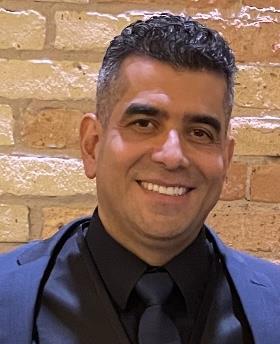
Being an architect means you have to design and draw what houses and other building look like from inside and out. Architecture affects everyone and anyone can do it but the way you make it, makes it a different type of architecture. There’s Greek architecture, modern, industrial, rustic, and many more but Alba claims his favorite type of architecture is vernacular architecture, a very unique and unknown type of architecture He said, “I like vernacular architecture. It’s a type of architecture where you work with what you have so there’s no ‘I'm not able to do it’ because you make anything with what you have.” Alba shows his beliefs here; no excuses to create which he also shows every day. He passes this down to me and my sisters by telling us to work with what he have and shows us how to use what we have. For example, a couple of years ago, I had a project in science where I had to make a rover model, but I did not have what I needed and we couldn’t go to buy anything, as it was the year of the pandemic He helped me look around the house and gather a box and some metal and plastic pieces from extra parts we did not need earlier and helped me make my robot model. He helped me and many others to learn to use what we have.
Although Alba has made it through both high school and college, he needed to start his own business, but he never learned how to become a businessman or an entrepreneur, so he needed to learn on his own. He has not fully accomplished his goals yet, he still needed to work hard. Alba knew he needed to teach himself how to become a businessman, a boss. He says maybe if his family could have told him how to prepare being a business owner and to take a business class, he could have been ready. He stated, “ School didn’t teach me to become a businessman, so I had to teach myself.” Alba had to study independently and learn things no one else in his family had before. He kept himself motivated and never gave up when he felt like he could not do it anymore. After he finished studying, he started up his own business and hired some friends. He gave beginner architects a start to their career and grew his business. Now, he has done over 1000 projects, from the Field Museum to O’Hare Airport here in Chicago.
After this interview, I realized all of the hard work my dad has been through to reach his dream and make a better life for himself I learned that my dad isn’t the type of person I think he is, there is so much more to him that I haven’t realized before. All these qualities he has, everything he learned throughout his life, he has passed down to me and his employees studying and learning architecture. He wants me and my sisters to know that things don’t come to you, you have to work and retry until you get to your dreams.
Alba knew he needed to teach himself how to become a businessman, a boss
From the bottom up
Oscar Alba tells how he worked to success
Oscar
Alba, Owner of Architectonic Solutions Inc.
No Plan
B
when militia approached him about his artwork. They were not asking for a commission, or for a price, but rather for his life. They threw Shaker in their trunk, driving down busy streets to an unknown location. It was there where they beat him, with punches to the face, kicks to the torso, and slashes to the neck. After chopping his hair off, they left him there to die. He had not done anything to anger these men, at least in a rational sense. All he had done were his sketches, his practice for admission to art school. The militia had found them and had become infuriated. Nothing else could have been more absurd.
world. He earned his Master of Fine Arts at the School of the Art Institute of Chicago. He has also expanded and even changed his painting style. He is doing what he has always wanted to do in a place that he has always loved. “I believe when you have something in your head you will do it and you will have it.” This is what Al Shaker has done in his life, chased his dreams and achieved them.
By Pilar Alexander
In the hospital for weeks on end recuperating, Al Shaker decided to leave Iraq for good. He had lived in Iraq for his whole life up until then, so leaving was difficult. But he knew that “If I stayed… absolutely they will kill me.” I could see tears flooding his eyes. He said, “If they want to stop me, that mean they need to kill me.” Al Shaker is persistent in the pursuit of his dreams, which is something to be admired. He wanted to devote his life to painting, not to living under the opinions of others. He was willing to pay the ultimate price, death, for his dreams.
“If they want to stop me, that mean they need to kill me.”
He is still advancing, and I cannot wait to see what’s next. He notes that, “[t]hese bad things happen in my life is all they come out when I paint, which is good because paintings is my therapy… My therapy is my art.” Al Shaker’s trauma is visible in his work, and every viewer has a personal experience. Painting is not only a form of self-expression for him, but a spiritual connection. Al Shaker feels as if he is in a whole new mindset when he paints, and he never plans out his artwork beforehand.
It was a chilly Sunday morning when I heard a quiet knock at my door. My dogs pursued the noise, the sound of their paws scratching the wooden floor like an old chair. “Answer the door please!” I exclaimed to my family. My mom approached the door and opened it, guiding my dogs aside. Bassim Al Shaker walked in beaming, wearing a flat tweed hat and a black turtleneck. With him, he carried a heavy paper bag. We showed him to the dining room, and the dogs settled down near his feet. He set the brown paper bag on the table with a large thump, then pulled out the gift and handed it to me. In my grasp, I held a large glass jar of green olives. They were not just any olives, but Kuwaiti ones. The jar was bigger than my head, so I supported it with two hands.
We told Al Shaker thank you many times before my mom and I devoured the olives. Pouring spoonful after spoonful of fragrant olives on our plates, we rejoiced. Between bites, we began to talk.
The conversation was casual, but not unimportant. The three of us discussed the art world, and I was baffled by how much insight he had. He seemed much older than his real age, in a good way. I felt as if he had a story to tell, and I wanted to help him deliver it in writing. It was then that I knew for sure that I was going to interview Al Shaker.
I gathered my materials one by one and invited him to sit down in the living room. I began asking him questions, and soon learned much more than I ever could have imagined.
It was a regular day for Bassim Al Shaker, a barber in Baghdad, Iraq,
I wish to have dreams as strong as his and to stay as strong as he did in the quest to reach them.
Yet another tragedy impacted Al Shaker after his arrival to the US. He had just presented his art in his first art opening in the US at the 720 Gallery in Phoenix, Arizona. Several of his pieces were bought by collectors. He had finally made it, finally being able to share his ideas and experiences with others. But this was not the end to the story. Usually in art sales, money is not given to the artist until the piece is physically in the buyer’s hands, meaning that Al Shaker didn’t have the money on the quiet morning of August 18th, 2014. It was around 7:00am when his studio was broken into, his art snatched from the walls. Every piece was taken, an estimated value of $50,000, not to mention the emotional value.
When Al Shaker first received the call, he just thought that the studio had been damaged, not pillaged. It was then when he realized what had happened. He recalls that, “At that moment, I didn’t feel anything.” He says, “I was walking to the gallery and just crying. I don’t know why.” Helicopters, FBI agents, and police cars swarmed the block. Al Shaker was traumatized. It was Phoenix’s first art robbery in years. The search was extensive, and photos were sent to international airports and borders, yet the paintings were never found.
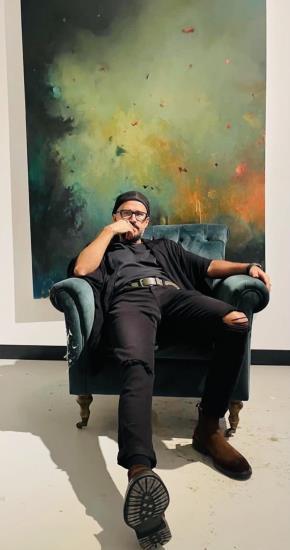
Al Shaker isn’t angry though, just saddened by the fact that his first breakthrough in America was snatched from his grasp.
But now, Al Shaker is a blossoming artist in shows all throughout the
Bassim Al Shaker is a man worth meeting, and I appreciate him taking the time to share his personal yet extremely powerful narrative of his transition to America with me. The hardships in his life only fueled him to become what he wanted to be, an artist. Al Shaker has not yet returned to Iraq, for the trip would put his life in jeopardy once again. He keeps his home in his heart and in his artwork, though. One must be willing to endure a great number of hardships to properly pursue and achieve one’s own goals. Al Shaker left me with one final thought. He told me, “When you have a dream and when you have a goal, you want to do it. You need to do it. It doesn’t matter what’s around you, what’s making you stop this dream… there is no plan B.”
“When you have a dream and when you have a goal, you want to do it. You need to do it. It doesn’t matter what’s around you, what’s making you stop this dream… there is no plan B.”
Bassim Al Shaker, an Iraqi painter, shares his story of loss and triumph with the FXW community.
Top Left Photo: Al Shaker poses in front of his artwork at a recent opening. (2022)
Richard Price
Use your voice
By Dylan Caudill
Richard Price, executive chairman of Mesirow Financial has been a very important and influential person since I was little. Therefore, when my ELA teacher had told us in class, we would be interviewing someone and writing an investigative article about their experience, I knew I was going to interview Richard Price, a previous council member on the United States Holocaust Memorial Museum.
As I prepared for my interview with Price on his experience while on the council, I researched topics for my interview, read the United States Holocaust Memorial Museum’s website and found some information about the museum.
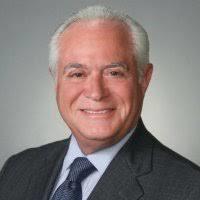
On a brisk Monday morning I found myself sitting in front of a computer screen about to discuss a meaningful and important topic over Zoom. Price’s image popped up on the screen, he was wearing a blue button down shirt, sitting in what looked like the comfiest office chair as I was sitting on my hard wood chair. Price’s voice came out intensely on the computer. I had not spoken with him in a while since I would see him when I went to the office with my mom; I had not been to the office since the start of the Covid 19 pandemic in 2020. As I began to talk my voice became a bit shaky however, as I heard his understanding voice and saw his bright smile, my voice leveled out. We sat there for about ten seconds in silence just looking at each other; this reminded me of my zoom classes when pandemic had started, and I had been moved to online classes. However, I quickly learned this interview would not only be informational but come with many impactful things as well. Price, a proud Jewish man has always fought against hate and genocide. Price has done many things to speak out against hate and genocide, one of those being on the council of the United States Holocaust Memorial Museum. Price was appointed to the council by former President Barack Obama and served on the council for two, four year terms. While on the council, he flew to Washington to meet with all 55 members who were on the council, a total of 16 times. The first time Price interacted with the museum was more than 30 years ago before the museum was a museum.
While in Washington D.C., where the museum is currently located, he had the opportunity to preview the curriculum along with a model of the museum before it was built. He also spoke with museum staff. Price explained, “I took a trip to Washington in its earliest stages and went to an office building where the museum staff was, there was no building and previewed a model of what the museum was going to look like and at the time what the content would look like.”
After the trip, Price not only continued working with the museum but also continued to spread the message to speak out against hate and genocide.
With Price being so passionate about speaking out against hate, he has continued to support the museum and spread the message.
Price has always tried to lead by example. When he was being appointed to the council, they had to do research to make sure that he was a truthful person and someone who truly cares about the museum and the message; this doesn’t mean you have to be perfect but someone who leads an honest life.
on every level, wherever it is at, any place in the world.” Price is stating on how it’s not just one person, one group, or one organization spreading hate. There are many levels and ways that hate is being spread. There are people who will say things, there are people going to commit hateful actions, and there are simply people who will turn a blind eye to issues.
All of this is causing problems and not bettering our society but hurting it. Right now, hate is at a very high level and still growing, and if there are not people who step up and speak up against it things will get worse and escalate. The United States Holocaust Memorial Museum is not just about the Holocaust and what happened it is bigger than that. It is speaking out against hate and genocide to help make sure something like the Holocaust never happens again.
Throughout the interview, I realized that Price’s involvement with the museum is so much more than just speaking out about the Holocaust. He wants to better the world and the museum provides an outlet that he can use to spread his ideas and thoughts with other people.
Price not only wants to stop something like the Holocaust from happening again, but also to stop the spread of hate and genocide. He has so much passion for what he has done as he told me, “I’ve tried to live my life doing right, doing the good things through my whole life.” Being on the council of the United States Holocaust Memorial Museum is one of the many positive things he has done in his life.
As Price was talking about his life, he explained, “I do because that feels good to me, not because I’m seeking a response from others. It’s like following your own thoughts, your own heart, and your own voice.” Price’s involvement with the museum was no accident as he has been involved with the museum because he truly cares about change. He does not do it for recognition or praise. He does it because he is passionate, and it feels right to him.
Price has used and is still using his own voice to state what he believes in, not what he’s heard on the news or from someone else. The museum has provided Price with an outlet to use his own voice and present his own thoughts. It also has given resources for people to collaborate on ideas and different ways to make a change.
Price’s biggest message is to speak out against hate and genocide. Price along with the museum has worked to spread the message and to educate the world on hate. Also, on how hate is affecting the world and how to stop it. Price believes that if the whole world is educated on hate, then we will be able to stop it by “just educating the world on how important it is to attack hate
Interviewing Price gave me a deeper understanding of not only how he thinks about hate, but also how the museum has helped share this message. Although the museum holds important information about the Holocaust, it also helps spread the message to stand up to hate and better the world. Price not only wants to stop hate and genocide, he also wants people to understand how hate is affecting us as a society.
The United States Holocaust Memorial Museum is one of many outlets you can use to spread your voice and ideas. Hate is already a central part of our society, and the use of hate will keep continuing if we don’t come together and stop it. If the world comes together and uses their voice against hate it can be stopped.
“I do because that feels good to me, not because I’m seeking a response from others. It’s like following your own thoughts, your own heart, and your own voice.”
I interviewed my aunt, Mami Ana to ask her about what it was like growing up with Mama Chelo and her cooking. I walked over to Mami Anas house and was able to record what I needed for the interview. Mami Ana agreed to meet with me on a Saturday around 10:00am. I walked over to her house along with my dad so he can be a translator. When we walked in, we were immediately greeted with coffee, smoothies, beans, and Menudo. Mami Ana had cooked since she knew we were coming over. While I was growing up id sometimes have the chance to eat breakfast at Mami Ana’s house since we lived right next door to each other. So being greeted with Mami Ana’s type breakfast was always like a treat. When I sat down Mami Ana handed me a smoothie she had just made for me, we chatted a bit before I set up my computer and started asking Mami Ana the questions I have prepared for the interview. On some questions Mami Ana seemed to be a bit emotional, this was understandable since we were talking about a touchy subject. Mami Ana’s Mama had passed in 2011. Mami Ana and the rest of the family had taken Mama Chelo out to
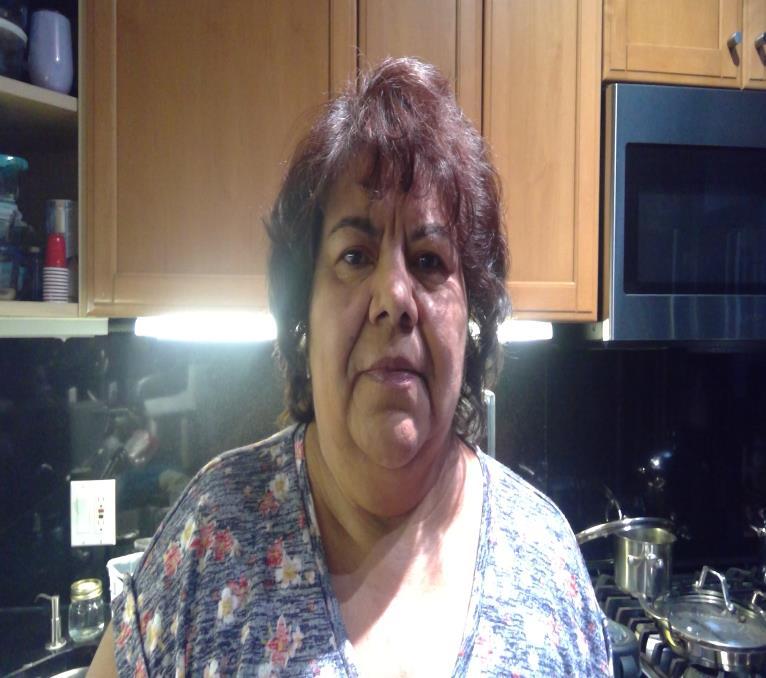
what their usual amount of money they had would cost. Papi tried his best to provide for his family, that is why he worked in Chicago and would only visit. Mama Chelo had to make what little food they had stretched and think of ways to make meals for the whole week. For example, if they had rice Mama Chelo would think of different meals for each day so she could use up all the rice, nothing went to waste in the household because everything they had would get eaten. Back then when Mami Ana and her siblings were growing up there wasn’t any pick and choosing what you wanted to eat it was either eat what’s on the table or you don’t get to eat that day. Sometimes it would be long days of cooking, and other times it was all day just playing outside. But whatever day it was, or whatever had happened that day Tio Tonio, Mami Ana, Chika, Mami Rachel, Tio Cuoco, and Oscar would always eat toghther as a family.
By: Olivia Chavarin. Mami Ana.
Learning the deeper side of Mami Ana and what it was like growing up for her was a chance I didn’t get all that often. When Mami Ana said yes to being interviewed I immediately took the chance to be able to learn more about her and my dad’s side of the family. Mami Ana is part of my dad’s side of the family, because I am not too close to my dad’s side, I do not know much about Mami Ana. What I know is limited but the information I do have is that she cooks in memory of her mother. Mami Ana is the one who carries on the tradition of her mother by cooking. She is one of the few in her family that knows how to make the recipes from her mother, so she can pass it on. Mami Ana is the one who cooks for the family each holiday we get toghther, each birthday. Mami Ana learned how to cook from her mother at the age of 22 because that is when she was first married. She needed to learn how to cook so she was able to provide for her husband and her future family. Since there were little ways to learn how to cook because she did not have things like internet or YouTube growing up, she went to her mother to learn how to cook. Mami Ana learned fast from her mother since the recipes she was taught were very simple and you could learn by watching. Once she was able to learn the recipes all she had to do was start working in the kitchen along with her mother.
The hard part was getting groceries. Since Mami Ana did not live around a grocery store like she does now and wasn’t able to just get up and drive there it was quite hard to get groceries. When Mami Ana needed groceries, she would have to ask her brother Oscar, my dad. My dad would go along with Mama Chelo to the market and take two big baskets and fill them up till they were jam packed with groceries. When My dad and Mama Chelo would go to the market, they would make sure the trip would count. Since it would be a little while before they would make another trip, because not only was it a hassle to go, but money also played a role in how often they went to the market. “Chelo made what little food we had stretched since Papi was off in Chicago.” What Mami Ana meant by this is since Papi, her dad lived in Chicago it was quite hard to get food, manage the house and everything in between without a man of the house. Papi was off in Chicago because he had a job here to make money. Whenever he got paid a portion of it would get sent back to Mexico, where Mama Chelo, Tio Tonio, Mami Ana, Chika, Mami Rachel, Tio Cuoco, And Oscar lived. Because Papi lived in Chicago, Mami Ana and all her siblings only got to see their Papi every two years. They saw him on Christmas and no other holiday because it was too hard to travel back and forth. Because Mami Ana only saw Papi on Christmas it was always a treat to see him, but never enough to buy meat or anything that cost
Mami Ana never used to help Chelo in the kitchen, she would always want to go outside and play. So, when Mami Ana was a little girl her memories of Chelo in the kitchen went in and out, because she mainly played outside, she didn’t really pay attention to her mom in the kitchen, Mami Ana preferred to go outside and play, sometimes with her friends or her family. Despite the 2 10 year age gap with some family she always played with her family, rather than cooking. But as she got older, she played attention to her mom in the kitchen more often, she never offered to help when she was about teen, but Chelo never asked for help also. It was only when Mami Ana got married she needed to learn how to cook. It didn’t take long for Mami Ana to learn how to cook, Mama Chelo didn’t have difficult recipes, so it was easy to learn. Mami Ana spent time in the kitchen with Chelo learning to make food, and once she learned she was expected to now help in the kitchen during birthdays or holidays. Mami Ana also went out of her way and went to the cooking classes in her town, there she picked up a few more tips on how to cook so she was able to have more skills than just what her mom was able to provide her. So, with the help of the cooking classes and Chelo Mami Ana was able to make pozole, menudo, fajitas, chiles, arroz con leche, chilaquiles, tostada, tinga, ceviche, tinga de pollo, and many other traditional dishes.
Mami Ana enjoyed cooking with her mom. It was always a pleasure just cooking and talking about chisme. “Chelo was always cooking; a day didn’t go by that she didn’t have to cook for all 6 of us.” Although Chelo spent most of her day in the kitchen it was always meaningful by the end of the day because when all 6 siblings went to go sit down for mealtime, they knew their mom had put the time to make this for them. And sometimes when Mami Ana would cook with her mom she explained it as it was the most bonding time she got with her mother since Chelo had to tend to 5 other children sometimes it was hard to get one on one time with their mom. Mami Ana got married and still lived with her family for about a year, but once she moved out Chelo was left with all the cooking after that. Since she still had to tend to 5 children, Tio Tonio, Chika, Mami Rachel, Tio Cuoco, and Oscar. Mami Ana didn’t stop visiting but since she was moving on in her life, she didn’t cook with her mom every day. So, the holidays mattered more. Once Mami Ana was getting her family started they started to visit her family often because soon they would need the help of them to raise a child. At this point most of the family was off on their own. But since most of them where years apart about 2 6 Oscar was still left.
cooks in her Maims memory because she doesn’t want to forget the memories of her in the kitchen although it’s getting harder to remember it’s still something she treasures. Mami Ana is the one who cooks every holiday, and birthday. She cooks because she is the oldest that is alive but also because she is the one who knows the recipes the best. Mami Ana wants to make sure she can leave this world knowing the recipes of Chelo are passed down the next generation. This would include me, and my cousins. For right now since we are still in school Mami Ana has held off on teaching us but one day if we just ask, she will teach us. Mami Ana also cooks because she is one of the few who still has the recipes memorized. She doesn’t use the internet or YouTube. “The people now is very different then when I was young, now the people can see the recipes by YouTube. And don’t want to cook they only use internet and not recipes from family.” So, because she has them memorized its easier for her to cook instead of completely changing the recipe because it’s from the internet. Mami Ana doesn’t mind, and she likes cooking t brings back memories of having her first baby or of her mom, or when she was first married and just started to learn how to cook. She enjoys making the food because she liked to bring a smile to people’s faces when they taste her food and say, “it’s good!” she likes to know that her family is well feed. Since her family didn’t have lots to eat when they were young and had to make what food they had stretch she likes to know her family now will never have to go through the same thing she went through as a kid.
Mami Ana cooks in her mother’s memories because not only is she trying to carry on her legacy, but she also enjoys cooking and it is one of her hobbies. Mami Ana grew up knowing there wasn’t tons of food to go around but it was enough to fill you, so when she came to Chicago, she wanted to make sure her family would never have to grow up like that. She wanted to make sure they would get to see their Papi every single day and not just every two years on Christmas. So, she promised herself that her children would never have to grow up the way she grew up when she went to Chicago to start her family. It wasn’t just her that went to Chicago after Mami Ana got married it was her whole family, Tio Tonio, Mami Ana, Chika, Mami Rachel, Tio Cuoco, and My dad, Oscar. They went to Chicago toghther, they still owned land in Mexico but now lived in the United States. Once Mami Ana got to Chicago she settled in and each of her family members split off. They moved on with theirs when she started hers. Years passed to the point where I was born. Mama Chelo passed about 2 years later, but Mami Ana still had her memories of Chelo she treasured then knowing that her mom was gone. But since she had her family, Pepe, Kori, and Jasmine Mami Ana knew she had fulfilled her goal, her goal of being able to cook for everyone and not having her kids grow up like she did. She did what she said what she was going to do and more. Mami Ana knew there were going to be bumps but she would keep going.
Mami Anas passion is cooking, she cooks in memory of Chelo, but she also coos because it’s something she enjoys Mami Ana now
TheRealityofMedicine
Dr.KarenWusharesherexperiencesandthoughtsonstudyingmedicine inapredominatelymaleenvironment.
By:AnnieChen
Onabright,cloudlessFridayafternoon,mymomandIsatdownontwo fuzzy,whitechairs.Thesunlightsoakedintomyroomthroughtheopenwindows, creatingawarmeffectonmylightbluewalls.Mymomwaswearingasimpleblack andwhitestripedshirt,andherstraightblackhairwastiedbackintoaneatponytail. Shehadawarmsmileonherfaceaswepreparedfortheinterview.“Whenever you’reready,”shesaid,asIgotmyquestionsoutandpreparedthevoicerecording.
Dr.KarenWu,mymom,wasbornin1975,inNewJersey.Herparents,Jeff andNanWu,werebothdoctors;JeffwasacardiologistandNanwasapediatrician. TheycametotheAmericasfromAsiatopursuetheirdreamsinmedicine.Growing upinahappyfamilyoffour,Dr.Wuhadenoughresourcesandprivilegestoattend school,activities,andotherevents.Sheworkedhardinheracademicstoeventually achieveherdreamofstudyingmedicine.
Dr.Wu,afemaleorthopaedicsurgeon,hashadmuchsuccessinhercareer, buthasalsofacedmanystrugglessincesheisadifferentgenderthanmostofher peers.

Dr.Wuhasmademanychangestohistorythroughamedicalperspective. Shedecidedshewantedtobecomeadoctorbecausesheenjoysworkingwithher handsandfeelsitisimportantthatpeoplestayhealthyandactive.Onlywhenshe startedhercareerdidshetrulyrealizehowuniformmedicineis.Completingher fellowshipattheNewEnglandBaptistHospitalinBoston,Massachusetts,she explains,“EventhoughIdidmyfellowshipatoneoftheoldestandmostrespected schools,whenIwasafellowintheyear2004,Iwastheveryfirstwomantoeverdo afellowshipthere.”
Orthopaedicswasandstillispredominantlymale.Evenataknownand
respectedschool,Dr.Wuwastheveryfirstfemaledoctortoparticipateintheir fellowshipprogram.2004isnottoolongago,soforDr.Wutobethefirstfemale doctorstudyingthereatthattimeiscrazy.
Despitethestrugglesoflookingdifferentthanthemajority,shepushed throughwithhardworkandperseverancetocompleteherfellowship.
Ifinditinspiringthatmymomputinallherhardworktomakeadifference forherselfandoursociety.Knowingthatsheishelpingmakeachangeinherown fieldwillpushmetostanduptothethingsIthinkarewrong.
Althoughshehasworkedhardtomakeachangeindiversitywithfellow doctors,shealsostruggleswithpatientacceptance.ManypatientsappreciateDr.Wu andthehardworksheperformsforthem.Havingmuchexperience,herknowledge succeedswhenputtothetest.However,becausethereisstillsomuchbiasinthis worldtoday,manypatientsletthestereotypethatmenarebetterdoctorsthanwomen overcomethem.
“Iknowforafact,”Dr.Wusays,“thatsomepatientschoosenottocome seemeasadoctorbecauseI’mawoman.”
Tothisday,womenarestilllookeddownon.AlthoughDr.Wuisoneofthe mostsuccessfulandhard-workingdoctorsoutthere,somepatientsprefertoseea malebecauseofthisinjustice.Dr.Wuexplainsthatshefeelssorryforthosepatients becausetheyletthestereotypesandbiaseschangethewaytheythink.
Icanrelatetothisthroughmysport,icehockey,whichisanother predominatelymaleenvironment.WhenIwas9yearsold,Iplayedonaco-edteam. Duringthattime,somecoachespurposelydidnotplaymeduringgamesbecause theythoughtthatIwasnotgoodenough.EventhoughIwasoneofthebestplayers onmyteam,thestereotypethatboysarestrongerthangirlsstuckwiththem.
Overall,medicineisgaininggenderdiversity.However,orthopaedics,Dr. Wu’ssubspecialty,stillrequiresmuchmorechange.Startinghercareer,Dr.Wu attendedacourseinhipandkneereplacement.Walkingintothecourse,shelooked aroundandquicklyrealizedthatshewastheonlyfemalethere.Theothermale doctorsstartedturning,whisperingtoeachother.Shewassuretheyweretalking abouther.Later,sheconfirmedwithoneofhermalepartnersthatsomedoctorswere talkingabouther.“Somepeopleatthecourseactuallyapproachedhimandasked aboutmebecauseIwasawoman,”shestates,“andtheyasked‘ifIwasanygood.’”
Itisridiculoushowsimilarthisexperienceistoateenagedramamovie.A newpersonwalksin,andinstantlypeoplestartstaringandwhispering.Thenew personfeelsveryself-conscioussincetheyarenewanddonotfitinyet.Likewise, Dr.Wufeltveryself-conscioussinceshewastheonlyfemaleatthenewcourse.This comparisonshouldnotbehappeninginreallife.
fieldtobebasically100%maleshowsthattheyneedmorediversity.Also,creatinga placewherepeoplecanfitineasilymakesitabetterexperience.
Iknoworthopaedicsurgeryisextremelydifficult,mentallyandphysically, anditmakesmewonderiftherearesofewwomenbecauseitissohard.Theymay nothavetheinspirationordrivetoachievethisgoal;femaleorthopaedicsurgeonsare notcommonlyheardof.Leadingoffthat,therearenotmanyrolemodelsorpeopleto lookuptointhisfield,sowomenmostlikelydonothavetheencouragementtocome throughwithorthopaedics.
Orthopaedicsurgeryisatenseandchallengingsubspecialtytobeginwith. However,Dr.Wu,beingawoman,facesmanymorechallengesthanmen.Again,the biasthatwomenarenotfitforbeingorthopaedicsurgeonsisstillhere.Dr.Wufeelsa tremendousamountofpressuretoworkharderandproveherself;workingasa femaleinamostlymaleenvironmentcanbeintimidating.
“Ifeltalotofpressure,”Dr.Wuexplains,“becauseIknewthatnotonly wasIgoingtobejudgedbywhetherornotIwassuccessfulwiththeprocedure,but thatjudgmentwasgoingtobeappliedtoallwomenjustbecauseofmygender.”
Ifamalemadeamistakeinaprocedure,peoplewouldjustshakeitoff. However,ifafemalemadeanerrorinanoperation,societywouldapplythatone mistaketoallfemales.Knowingthat,Dr.Wuconstantlyhasthepressuretowork hardandproveherselfthatsheisasgood,ifnotbetterthanmostmaledoctors.
Alongwithallthismentalpressure,Dr.Wufeltveryself-conscioussince shelookeddifferentthanmostothersinherfield.Shefeltlikealleyesweregoingto beonhersinceshewasawoman.
“Iwasn’tjustprovingmyself;Iwasasymbolforallwomen,”Dr.Wuadds, “IfeltthepressurethatIwasrepresentingallwomen.”
Ifinditinspiringthatmymom,facingsomuchpressure,wasstillthinking ofothersfirst.Shewasbeingthoughtfulandselflessinmakingachangeforall women,notjustherself.
Mymomhashadachallengingjourneythroughouthermedicalcareer,as explainedintheinterview.Ihavecometorealizehowhardmymomhasworkedto pushthroughthehardshipsinheroccupationtomakehospitalsmorediverse.Even thoughmymomhadveryfewrolemodelstolookuptogrowingup,sheachievedher goalandisnowarolemodeltomeandmanyothers.Iseeherasahardworking, caring,andpowerfulleader,doctor,andmom.Itisstillalongwayfromequality,but Icannoweducateothersonwhatchangesmymomhasmade.Listeningtothosewho havehadrealexperiencesinthehospitalallowsustorespectthehardworktheydo, notonlyforpatients,butalsoforsocietalchange.“Ifgirlsfindsomethingthatthey’re interestedinorpassionateabout,”Dr.Wuconcludes,“itdoesn’tmatterthatthey’re female,theycandoit.”
Furthermore,toaddtohownon-diverseDr.Wu’ssubspecialtyis,she confirmsthat“orthopaedicsurgeryistheleastdiversesubspecialtyinmedicine… lessthan10%oforthopaedicsurgeonspracticingcurrentlyintheUnitedStatesare female.”
Therealityoforthopaedicsisthatthereisjustnotalotofwomen.Forthis
“Orthopaedicsurgeryisthe leastdiversesubspecialtyin medicine…lessthan10%of orthopaedicsurgeons practicingcurrentlyinthe UnitedStatesarefemale.” Dr.KarenWuisafemale orthopaedicsurgeonpracticing atLoyolaMedicine.
The Road for Animal Rights
Sitting at my dining room table in the middle of the day, Mrs. Peggy Cunniff began to tell a story. Mrs. Cunniff, a short, brunette, and well dressed American woman is well accomplished in both matters of family and work. Wearing a blue blouse and tan pants, Mrs. Cunniff sits down in the wooden chair across from me.
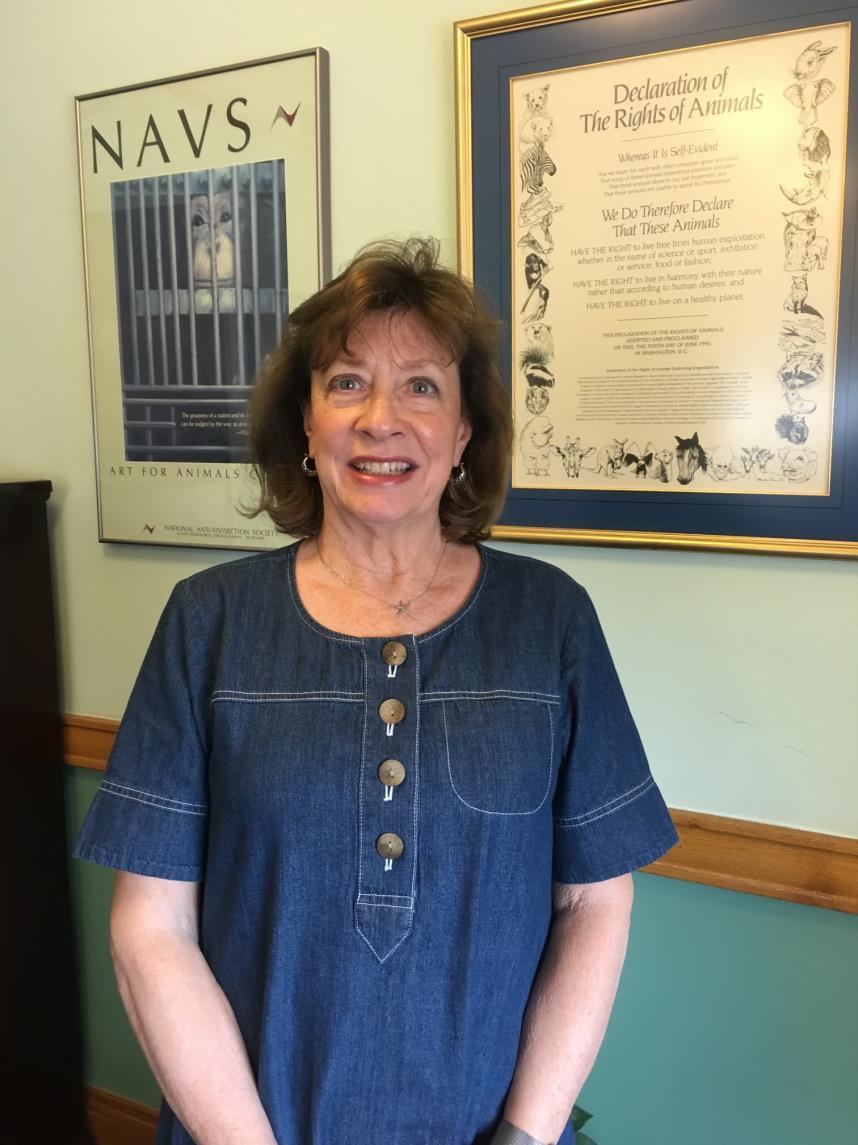
Given that Mrs. Cunniff is my grandma, I would say I know her well. The love, kindness, and determination are always apparent, somehow radiating outward to everyone within eyesight. These attributes were especially clear as she sat across the wooden table with me. Even before the interview started, she gave hugs and kisses to my siblings and me.
Sitting in my chair, the leather cushioning was chilly despite the cheery sunlight filtering in through the windows, as my grandma noticed with a smile when I shifted in my seat. With five children and 12 grandchildren, Cunniff has always been a central figure in my family and I’s lives. From Christmas to the odd weekend, Cunniff has always been there for my family, and she does so much for my family. Whether it is babysitting my trouble making younger cousins or cooking the turkey for Thanksgiving despite being a vegetarian, Cunniff always seems to know what everyone needs help with.
However, the interview was not about what Cunniff had done for her family it was about what Cunniff worked towards and did for animal rights on the hot summer day of June 10, 1990.
After attending a few of the meetings called the Summit for the Animals, a march was starting to be planned to show that there were many people in the nation who cared about animals and wanted to help them. It felt like progress for Cunniff, until people started to respond.
Big newspapers and magazines had pictures of animal rights activists to show how crazy and radical they were. Even the American Medical Association (AMA), the biggest healthcare association in the United States, had a plan to discredit animal advocates by saying that they wanted to do without any use of animals for any purpose. This hindered animal activists, especially considering how much influence all these organizations had, but Cunniff pushed back.
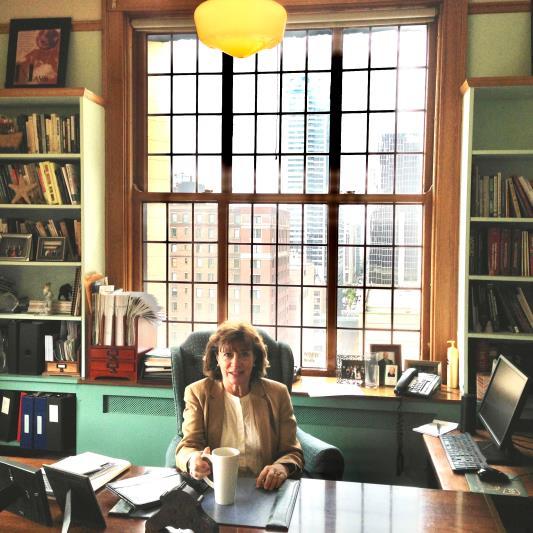
her cause be hindered by exaggerated views and opinions. She persevered even when it was hard. Cunniff knew that not every organization would completely agree with a common definition but the different organizations could then branch from it, creating their own unique definition that matched the work the organization did.
This was the first “real” step in the journey that followed. Cunniff did not get upset or angry instead, she decided to listen to what people were saying, and show them why she disagreed with them. I often connect to this when debating with someone; rather than ignoring the person’s points, I listen and adjust my argument as necessary.
Although Cunniff’s proposal was instrumental in beginning the process of the journey to more ethical rights for animals, it still took a bit of time before the march happened. However, the march itself was a momentous success for the cause.
Before giving a speech at the march, Cunniff met several important people like Christopher Reeve, the original “Superman”, several congresspeople, and more all of whom were there to support animal rights. Cunniff described it as an immensely powerful moment in that story because there had been so many people who were against animal rights, who thought that people who supported animal rights were crazy.
Even on the actual march day, people came out to still discredit the activists. Also telling me how nervous she was to speak in front of so many people on the steps of the capitol that day, Cunniff also remembered being strong because she knew that her family was there supporting her, which she said helped her in the moment.
After taking three pictures of the huge crowd, Cunniff gave her speech. Cunniff remarked that at the end of the speech, “We felt, at that moment, that we were all participating in a historical moment.” Cunniff knew that many people may still not agree with her cause or the animal rights activists in general, but she knew that in order to make a change, she had to stand up for her cause. This was a historical moment in the journey because the march was what really affected the positive and ethical change that followed.
been fighting for a law.
Eventually, she got into contact with Democratic Senator Durbin of Illinois and Republican Senator Stevens of Alaska. Senator Durbin not only gave his endorsement of the bill he gave his sponsorship. Once Cunniff had Senator Durbin, Senator Stevens, and more on board with the bill, it passed unanimously in both Houses of Congress a feat that is nearly impossible to achieve today.
After the bill passed, Cunniff detailed that, “Eventually the NIH passed a policy that no more federal money would be used to spend on invasive research on chimpanzees.” Not only did Cunniff succeed in her goals to bring animal rights the attention it deserved and make change in the world of animal rights but she was instrumental in the entire process. The bill passed and the chimps were rescued and put into a sanctuary in Kentucky.
The sanctuary is the “final” step in the long journey that Cunniff and others went through to ensure that animals would never be treated poorly and abused again. Cunniff was resilient and continued to push for her cause even though it took years for the bill to be passed. I often find myself thinking and connecting to this in school when I have to draft essays or analysis paragraphs. Even though it will take me a while to complete, I push through and put my best effort in to get the best grade I can.
Throughout her life, my grandma has always tried her best to improve animal rights. She is a vegetarian, worked at the National Anti Vivisection Society (NAVS) as an Executive Director, and did so much more. Throughout the interview, I began to truly understand how and why my grandma went to such great lengths to help animals.
My grandma, or Grammy as I call her, has always been one of my biggest role models, in her morals, kindness, and attitude towards life, but I can now fully appreciate the wisdom and advice she has given me throughout my time with her through our bond as grandmother/granddaughter. She has showed me what it truly means to make change, that it takes both effort and time, all while encouraging me to use my opportunities to create positive change in the world.
My grandma left me with this piece of advice when it comes to making change, “Even when you’re opposed to someone, you can still applaud why they are doing what they are doing.” Even though you may not agree, you can still see how much effort and time that person is putting in to prove their point.
Not all people have to agree with each other to create positive change in the world.
By: Maeve
At the third Summit for the Animals, Cunniff spoke up. She remembered, “So I got up and made a proposal: that we declare what we mean by animal rights.” Cunniff refused to let
By drafting legislation, Cunniff helped to create a sanctuary for chimpanzees that had been used as test subjects for things like cosmetic products to medicine all of which is for humans. Cunniff received criticism and death threats for daring to make what she had
“It’s hard to go back that far in terms of all the issues facing our country, but how we treat animals was always lowest on the totem pole.”
Mrs. Peggy Cunniff tells the story
of her hard work to create better and more ethical rights for animals.
Church
Peggy Cunniff, standing in front of the Declaration of the Rights of Animals, which she helped to write.
Peggy Cunniff sitting in her office at NAVS.
The True Meaning of Success
While telling me about her experience working at Green Logic, Whitney Dolan taught me some valuable life lessons.
By Kathryn Dolan
Recently, I spoke to my aunt Whitney Dolan. Sitting in my grandma’s guest room in Midland, Michigan, I called Dolan on FaceTime. She was sitting in her house in Washington, DC. She has brown hair and was wearing AirPods and a dark green sweatshirt. It was really special to see her, even if it wasn’t in person. She has always been a person I look up to.
When I was younger and we went on a family vacation to the UK, my sister and I always wanted to be right next to her. We liked shouting, “I’m a bin, put your litter in!” which was written on the city trash cans in Edinburgh, Scotland. Finally, my parents had to tell us to either stop shouting or leave her alone.
As I get older, I can better appreciate how special of a person she is. She is very smart, with a PhD in biochemistry, and a great aunt to my sister and me. She has also had a lot of neat experiences throughout the years, like when she worked at a startup called Green Logic. Through hearing about that story, I learned that she is a persevering person, and that she never gives up.
In March 2019, the startup Green Logic, which focused on innovative biochemistry, hired Dolan. Green Logic was not very established at the time, and it was only a warehouse with plastic sheeting separating the different rooms and only the CEO working there at the time.
The CEO’s idea was to make plants that changed color to detect water contaminants. The plants would normally be green, but if the water used to water them had lead in it, they would turn bright red. These would be an easy, cheap way for people to detect toxic water and avoid getting sick from it. However, they had to figure out a way for it to work.
Since it was a new business that had to work to make a product, Dolan, the CEO, and eventually two other employees had to pitch the idea to investors and try to get money for their business.
Dolan had never had to pitch an idea before, so she recalls this and the experience of working at the startup in general as a mix of emotions.
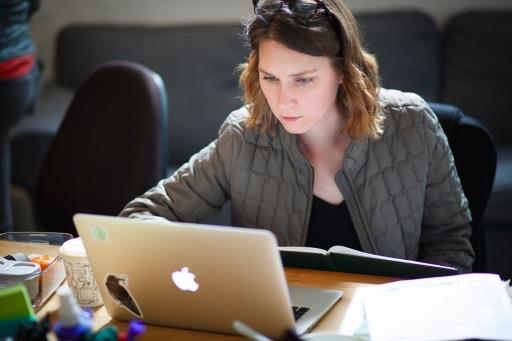
She remembers, “There was a lot of different feelings, I think the main one was probably excitement. It was really exciting to be working on something, creating something that no one had done before. It was very stressful, but it was also exciting, and very rewarding.”
Dolan is not a person to give up easily or to let difficulty control her. If something is hard, she does not give up or give in to difficulty. This is something that I struggle with often, and it is something that I and everyone can learn from.
Also, it proves that even if an experience was not only fun and easy, you can still find it rewarding and exciting by learning something and getting through it. This connects to the idea of looking under the iceberg, because something can be only difficult above the iceberg but rewarding if you dig deeper.
While at Green Logic, Dolan’s main job was the science of making the plants change from green to red when they detected lead in their water supply. They decided to use bacteria in the soil of the plants that could detect lead. When the bacteria sensed the lead, they would send a signal to the plants to make the red pigment.
Since the plants could not naturally make a red pigment, they had to put the genes into the plant. There were two kinds of red pigments they were considering: anthocyanins and betalains. Dolan engineered ‘bacterial circuits’ for both types of pigment.

Anthocyanins, the kind of red pigment found in berries, are a lot more genetically complicated than betalains, the red pigment found in beets, so for betalains, they had the genes synthesized by another company, and put them into the plant via bacteria, but for the anthocyanins, they put a gene into the plant that would turn on the genes required to produce anthocyanins. In the end, they went with betalains because they were simpler and easier.
Dolan learned many important things while at Green Logic, but she told me, “I think the biggest thing that I learned was that I have a lot to offer, more than I think I assume sometimes of myself, but I realized that I have ideas that are worthwhile, and that I should speak up when I think I have a good idea.”
Sometimes, we think we know less than we do, or that other people do not care what we think, but it is important to be confident in yourself and if you know something, contribute it. This connects to when she was working on the science, because she had never done anything like this before and it was difficult, but she still knew that she could do it and kept going instead of giving up, which connects to the last quote, and is an important lesson for everyone to learn.
Because it became difficult to convince investors that they had a profitable idea, Green Logic became harder to keep open. They thought of some possible other applications like agriculture or detecting other toxins in water, but they still had financial problems. At one point, all four employees took a 50% salary cut so the business would have more money. Finally, the business closed.
Even though Green Logic eventually closed, she said, “I hope that people will be inspired to try something that’s maybe not obvious or straightforward, to try something that’s a little bit out there, even though we didn’t ultimately succeed, I think we showed that it was possible, and I would hope that someone with an even bigger imagination and resources could take that to the next level and actually make it something that benefits people.”
She does not believe that ultimate success is the ultimate goal, and that there are still lessons to be learned by having challenges. Sometimes, I become fixated on perfection and never making any mistakes, but perfection is not the only way to learn something and have a valuable experience. The world tends to set a lot of store in being perfect and succeeding, so it is important to learn that the opposite of success is not failure or imperfection, it is not trying in the first place.
Talking to my aunt, I realized that Dolan is not only a very smart person academically, but that she also has many valuable insights into life. I learned some invaluable lessons talking to her, such as doing difficult things and not giving up when you have trouble.
Also, I learned that success is not only defined by the amount of money you make or the end state of something you work on, but also by what you learn and do along the way. Finally, I learned that trying something difficult will help you learn and develop new skills.
“I should speak up when I think I have a good idea.”
Whitney Dolan
One of Green Logic’s plants turning from green to red.
Carrie Egan: School photo 2022
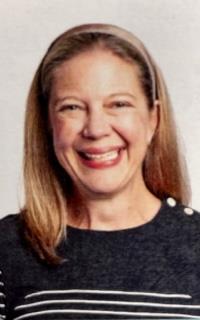
Dealing with MS
I was sitting in the squishy tall brown bar stool in my kitchen at home. Across the room, my mom stood eagerly waiting for the interview to start. She was wearing a bright pink shirt and black yoga pants. Her short blond hair was tied up in a ponytail and her bright blue eyes were focused on the pot in front of her, as if her started could urge the water to biol faster. I could smell the cheese being poured into the pot as she gently stirred the pasta around in circular motions. “Ok, I’m ready,” she said, eying the mac and cheese confidently. “we can start.”
As the interview began, we eased more into a rhythm. She told me that her full name is Carrie Louise Egan and that she was born in Traverse City, Michigan, in 1977. Then we proceeded to talk more about her diagnosis of MS, and what that means. As she told me her story, I realized how admirable she is because she always stayed positive and selfless.
Although Egan has lived a normal life, she faced one very big struggle. In the early fall of 2019 Egan was diagnosed with Multiple Sclerosis or MS. MS is an auto immune disorder whitch effects the pathways between your brain and your muscles. Your brain sends signals through pathways to your muscles telling them to move, but in people with MS, your body thinks there’s something attacking those pathways when there is not. This means your muscles don’t get the signals, so they cannot move. Over time, the more those pathways get disrupted, the less they will work. In most people, that means they will at some point no longer be able to walk, eat, or function on their own.
mild symptoms so far. Her doctors think this is because she has a form of MS called Tumo Factive whitch less than 1,000 people worldwide have. There is very little known about this form of MS, except that it tends to have milder symptoms. Egan does suffer form vertigo as a side effect of MS.
The first clue that Egan could have MS was in 2014 when she went completely color blind in one eye. Egan was hospitalized for a week so the doctors could run tests on her. When she was in the hospital, she had to get an MRI, where you go into a machine that takes pictures of your brain and spine. When Egan had this MRI done, she was in the machine for three hours. This was extremely claustrophobics because doctors must put a metal cage over your head. The MRI machine is also extremely loud like hundreds of metal weights being dropped around you. On the MRI they did not find anything abnormal, so she wasn’t officially diagnosed yet. Later, in 2019 she got an MRI, which she gets normally, and they found a white mark or lesion on her brain. This was the second symptom and what led her to get officially diagnosed.
By:Abby Egan
perseveres
In 2019, when Covid first started, was when Egan got diagnosed. This was a very scary time to be diagnosed . As MS is an auto immune disorder, a disorder where your body thinks something is always attacking it when there is not, Egan’s odds of being hospitalized or dying from Covid increased drastically. Egan describes this as, “pretty scary working in a school…because at all times I could be thinking I’m getting sick and I didn’t know if it was Covid, if I’d end up in a hospital or worse dead.” Even though this was hard for Egan, she did not stop pursuing her passion of helping kids. She kept teaching in order to help others, even though it put herself at a higher risk. This also makes me reflect more upon my experience with Covid. I am very grateful that I didn’t have to worry about if I’d end up very sick whenever I got a cold. I am very grateful for my health, and that my mom never got hospitalized when she inevitably caught Covid.
Being diagnosed with MS is a long process; in order to be officially diagnosed, you need two prominent symptoms of MS. If you only have one, it might be that you have it, but it is not the only diagnosis you could have. The symptoms of MS vary a lot and look very different for different people. Fortunately, Egan has very
When Egan got diagnosed, she was very shocked because that is a terrible thing to hear from your doctor. She describes this as, “a blow to your system at first because no one wants to hear the words, ‘Hey there might be a day where you can’t walk or feed yourself or any of those things.’” I can not imagine how terrifying this was for her to hear that. It would be especially hard in her case because she was first told she could have MS five years before the actual diagnosis, so actually hearing the words you have MS must have made it so much more real and much more intense for her. I cannot imagine it would be incredibly hard to stay positive in that situation, especially when you also find out that the form of this disease is researched very little, and we know very little about it. I admire how brave Egan is because she faced this diagnosis head on, and never once doubted her doctors and the people she loved.
Throughout Egan’s entire process of being diagnosed, she never lost faith. Staying positive and thinking about her kids and her family is just one example among many to show how she always put others before herself. During my interview with Egan, she said that when she got diagnosed, she instantly thought, “will my kids get this.” There is a low chance that either of her children will get MS because in order to get it, both parents must carry the recessive jean. The doctors know Egan’s mom does not have any symptoms, but she could carry the jean because you cannot test for that. However, Egan’s father died when she was 17, so he could have developed symptoms later in his life.
Besides being selfless, Egan stayed incredibly positive throughout this whole process. She explains, “Me getting upset is not going to get rid of the MS, I can maybe have a bad day here or there and be upset, but I’m not going to let it ruin my whole life. I’m going to keep finding other ways to live as much as I want to.” This is incredibly admirable on many levels. Most people wouldn’t be able to stay so positive and selfless through out this entire process. Egan has every reason to get upset, not to think about herself, but she doesn’t. She continues to put others before herself and to look on the bright side, despite all the hardships she has had to face. Throughout the interview, my mom stayed optimistic and positive as ever. Her demonstrating this teaches us all a very valuable lesson you can choose to be negative or positive. During this interview I learned a lot more about MS and the effects it can have one people in general but especially the effects it has had on my mom. This information is very valuable because it can help me understand mt mom better and help her on her journey. She believes that there are things you cannot control, like MS, and instead of wasting energy on worrying about those things, people should stay optimistic and be grateful for the things they can control a
She continues to put others before herself and to look on the bright side, despite all hardships she has had to face.
How Carrie Egan
while dealing with this disease daily
A 9/11 experience
By Deven Emerson
the World Trade Center or not but thankfully, he did not, and Emerson was so grateful for that. She described, “I was really worried because your dad and I had friends and family living in New York.” This situation is overall very important since Emerson had friends, family, and people who were important to her living in the state of New York as the destruction was happening at the time. And you should always put family first because you never know that you will never see them again if something like this happens, and you should always remember that family is the most important thing that you should value.
The story of the Twin Towers getting destroyed and blown up was a very traumatizing and chaotic event to occur and for my mom to hear about, but something that was also extremely important was the aftermath of the 9/11 attack. After the destruction of the towers Emerson mentioned that this affected every American out there, but she even mentioned that there was a delay in many kinds of transportation. Many airlines and flights were all delayed for a few days possibly a few months which Emerson predicted. She mentioned that this was due to people thinking that there could possibly be another attack just like the one that happened with the Twin Towers and not only that but the Pentagon and almost the Capitol Building got blown up so the government wanted everyone to stay out of the air just in case another attack will occur.
Another thing that was mentioned during the aftermath was that the city of New York was a “ghost town” because Emerson mentioned that the city was almost empty meaning no one was driving their cars, walking on the sidewalk, or in restaurants too. This was due to people being traumatized from the attack. Another thing that was mentioned is Emerson said that there was a man who put an explosive in his shoe which shows the kind of bad people that are out there and the reason you need to take your shoes off at airports.
good in people even if we don’t always agree with their opinions. Emerson responded, “Everybody matters, our community matters and we always have to try to see the best in people even if we don’t always agree with what they believe.” Emerson also mentioned, “You never want to forget, sacrifice what happened but you always have to learn from that.” This can be really important for others to learn because you should not try to forget about a bad event that happened in the past but even though it can be disturbing, you might still want to learn about it because it could be something to learn about in the present.
On an early October morning just about 3 days until Columbus Day, Priya Emerson settles on a comfy bed in our hotel room wearing a white and gray sweater with black sweatpants and gets ready to think about an experience that happened back in the early 2000s. Emerson is a smart person having graduated from University of Chicago Illinois, getting a bachelors and master’s degree, and becoming Vice President of her company. However, she is always so busy from working all week as wells as being the mother in the family, so it took a little bit of time to answer when I asked her an important question. While we live in a world where people focus on their lives, that does not mean we can’t appreciate and understand people’s experiences.
Priya Emerson had faced many challenges but one of the hardest challenges was the destruction of the Twin Towers. On September 11, 2001, Emerson started out by going to her job early in the morning at around 7am. She was listening to music in the car when something unexpected started to happen. Hundreds of cars on the highway were all of a sudden pulling off to the side of the road because the drivers were listening to something on the news. Curious about what was going on, Emerson turned on the radio. It turned out that one of the twin towers had been hit by a plane and is now starting to crumble like a sandcastle starting to fall apart. She couldn’t believe that this had happened, and this really affected her.

It also turned out that my mom had friends and family living in New York at the time this chaotic event occurred. She even had a brother who she was worried about the most because she didn’t know if he worked at
Emerson shared, “There was a guy who put a bomb inside of his shoe.” What’s crazy is this shows part of the aftermath after the 9/11 attack meaning that there can be bad people out there who tried to take advantage of the airports. It can also show us that we should always be careful in all directions, always stay safe, and to always stay positive because you never know what things could happen.
It was very crazy in the city of New York during the aftermath of the 9/11 attack but something that can be really important is how Emerson overcame this moment as well as how can young people learn from this. One thing that Emerson mentioned was she said that she slowly started to overcome this moment even though she though it was a traumatizing encounter. Another thing was she tried to do something very important by overcoming which was trying to forget the moment and start to focus on more happy things. An example of this was Emerson started praying to stay serene which was and to help overcome from the 9/11 attack. Something that Emerson did, a helpful strategy, was she spent time with some family which would be really helpful for overcoming a thing that was terrible. Other things that Emerson also mentioned were things that young people could learn from this event. 1 example Emerson said that young people could learn was that there are bad people out there who don’t believe in freedom and always be careful.
Another example was that you should learn that everyone matters such as our community, family, and friends and we should always try our best to see the
Throughout this entire interview, my mom as someone who overcame this event, was very understanding as she was speaking in our conversation, we had talking about her experience during the 9/11 attack. I then started more understanding to her experiences and learned new things such as to always appreciate things that you have such as family and friends. I truly believe that my mom is an awesome and loving person as well as a good person that I look up to. But the most important thing is I started to really appreciate learning about her experiences because it could be an imperative thing that could happen in the coming years. Learning about people’s experiences back in history can allow others to understand them and try to make the future a better place.
My mom reflects on what 9/11 was like and how she overcame this event
“Always try to see the best in people even if we don’t always agree with what they believe”
TRUAMA CAN BE A POWERFUL THING TO MESS WITH YOU
Traumas come in many forms, small or big, what is unexpecting is how powerful they can be. Does not matter if it is small or big, they are both scary, and painful it lives through
BY VALENTINA FERNANDEZ
Coco Delgadillo, a woman with the most traumatic life. She is a young woman, Mexican, 5’3ft tall, 39 years old, she lived in Mexico, Guadalajara, before she moved to Chicago. Delgadillo had many things going on in her young life that made her become so different from what she is now then from a long time ago. When Delgadillo was 27 years old her life went from perfect to completely wrong in a snap. She is a Nani for a family living in Chicago, my family. She had been working for us for more than 15 years now. Her biggest trauma was her grandparents dying, but what made it worse she couldn’t be there to help her grandparents. She believes that they would have been alive if she was there to help. Delgadillo realized that trauma can be one of the most powerful things in the mindset, changes everything about you.
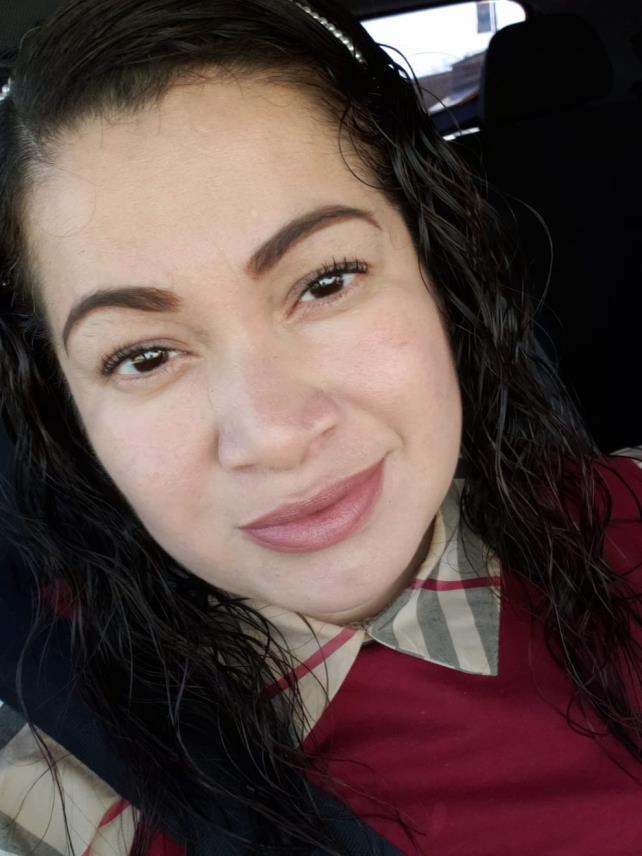
Delgadillo, an independent and strong woman, had many traumas in her life. The hardest part of that for her was surviving it all alone. She did not tell anyone what she was going through, so all that pain and hurt just started building up inside of her without anyone knowing or noticing.
Delgadillo became an independent, strong women after all that pain, did not need anyone anymore. She did at some point, but no one cared to realize what was going on, no one cared to ask if she was okay.
It was difficult to put on a smile every day, to make people happy when you are not. How was she able to talk about what happened without crying, how she was able to go to work every day.
She was Always putting on a smile, even though she was not happy inside. Delgadillo was trying her best to make the kids laugh, when she could not do both. Showing that she was hurt without anyone knowing or asking why.
She had her ways to survive her traumas. One of her ways was going alone to her grandparents’ grave when she had the chance, saying her last goodbyes, when she did not have the chance to do it.
“I survived this trauma all alone, no one helped, I did not want help. Every time I had the chance to go to Mexico, I would visit my grandparents grave, talk to them, tell them what I was going through, my grandparents were the only people that knew. I didn’t just go to their grave to talk to them, I did that because it was the only thing that helped me surpass the trauma I had.”
Delgadillo did not stop going to the grave, still trying to forget, but as time passes, she feels better and better, forgetting about what happened slowly throughout time. She was expected to still go to work.
Putting on a smile for the kids and finishing all the tasks she was given. Working helped take her mind off her grandparents and forget about it for a split second. This could also happen to other people’s life not only Delgadillo’s. What they are going through or how they feel could be the same situation as Delgadillo’s situation.
Delgadillo always tried to forget about what happened, but the smallest things reminded her of what happened. It is hard to forget something so big that happened in your life, especially something painful.
Since her grandparents died, all she could remember when she saw old age people was her grandparents, trying so hard to forget, so hard to not cry.
When she went out, she always saw grandparents with their grandchildren, walking, playing or doing anything. Watching that reminded her of when she was little, living with her grandparents, always being with them no matter what, trusting them with her whole life. The problem was not there in their last moments, she was miles and miles away.
“I have had a lot of traumas, but the smallest ones are always the unexpected one’s. I knew my grandparent were going to die soon, but it still hut, a lot.”
That guilt lived with her for the rest of her life, and old grown people reminded her of that. This affected her life so hard; she did not want to go out anymore. She did not want to be social, talking with her family was the only thing that kept her going.
Every time the grandparents of the kids came over; she did not work, because it was too hard for her to be there. After a while she was done crying, still suffering, crying on the inside, but did not show any emotions at all knowing it would just hurt her more.
“Every time I saw old, aged people walking around or just doing nothing affected me so hard, it hurt so hard I could feel the beating in my heart was different, like I couldn’t breathe. I have no idea why, but all I could do was cry, I felt so guilty, I could not forgive myself knowing my grandparents were sick and I was not there to help.”
Yes, it did affect her, but that did not mean she was going to be locked inside her whole entire life. Even though it was hard for her to go outside, she still went out, she still went to work to help her family’s taxes, even though it meant for her to see a happy family every day.
Yes, she did cry a lot for a while, but at some point, that pain left her alone, slowly disappearing to the point where she does not cry about it anymore.
Almost everyone had\has regrets, they can either be small regrets that you can forget, or big ones that can affect your life so much. Delgadillo had the biggest regret of her life, not being there for her grandparent’s death.
When she realized she has made the wrong decision, all she wanted to do was go back to Mexico. The problem was she was miles and miles away from her family, knowing well they were sick.
When she realized she could not do anything to fix or change it the only way to make it better was to try hard to forget or live with it for the rest of her life. What if she had the chance to go to the past, and change the decision she made and maybe make the right one? She wanted to, but once u do something u ca not go back and make it better in some situations, like hers.
“I regret the decision I made once I got the news. At that time all I wanted to do, and if I was able to do it, I would go to the past. Go to the past to take care of my grandparents, always be beside them. Work as hard as I can in Mexico to pay for the taxes. If I had the chance to restart all over, I’d take that chance with no hesitations, I’d do anything to get them back.”
Something so regrettable could stick with you for a long time, wanting to do something about it. Everyone makes mistakes, some learn from them, others ignore them and keep doing it repeatedly.
Delgadillo learned from just one mistake and won’t ever be far away from her family when she knows something bad might be going on. Trying her best to always visit them all the time, when she has the chance. She Realized, at that moment, that she never wants to be far away from her family.
Coco Delgadillo became very independent after all the troubles, regrets, and struggles she had gone through. No one helped her when she needed it the most, but that did not stop her from helping others, when they are in a bad or good situation. It did not matter to her. Her own trauma taught her that some people do not want to ask or help, when some are in a horrible time. It is hard to tell people what you are going through, but it would be easier to tell someone, because they can help someone to get better in many ways.
“Ihavehadalotoftraumas,butthesmallestones arealwaystheunexpectingone’s.Iknewmygrandparents weregoingtodiesoon,butitstillhurt,alot.”
Trauma can be one of the most powerful things in the mindset, if it is either big or small, it changes everything about you.
Coco Delgadillo A girl known for her terrible traumas
Life with the Famous
Anytime that they are walking down the street, Freshwater would hear people ask Newell questions Due to this recurrence, my mom got embarrassed by everyone knowing who and where her dad was always Freshwater says, “People knew his face, even his voice.” Although at times, this may seem entertaining and maybe even fun, when it happens everywhere you go, you may not think that anymore. When you go into a restaurant, or if you are walking around the street, it can get exhausting with all the stops and go’s that you must deal with. It’s especially worse if you are trying to get to know someone, and they know who your dad is; this can change their whole perspective on who you are as a person. Whether this person likes Mike Newell, or whether they do not No matter what, this would always play a major role on my mom’s childhood if she would want to meet someone or get to know them as a person
“I was on TV the day I was born.” Freshwater’s experience with Newell was a significant part of her life and life choices or opportunities. It even started minutes after she was born.
Newell, a proud dad, rushed in with cameras to film my mom and her mom, Liz Newell. The whole family was featured on the news and shared with the Iowa community.
Freshwater’s whole life had always been in front of cameras. Freshwater was fortunate because she got many opportunities that many teenagers may not have had access to. For instance, my mom states that she got to sit in the front row at many sporting events that her dad was broadcasting.
By Sarah Freshwater
I have heard many stories about my mom, Amy Newell Freshwater, and her childhood. Although on October 11, 2022, I got to know the whole story of her childhood with a “famous” dad named Mike Newell. Newell was a radio sportscaster from 1967 2010. He had many health problems until he died of a heart attack at 66. Freshwater has talked about Newell positively, but no family is perfect.
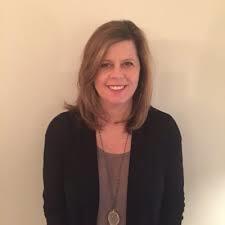
As I talked casually to my mom, I noticed a lot more things she had not told me in the past. Such as negative things that I would not have known. This is because she had only told me exhilarating stories about growing up with a “famous” dad.
Now that I know a more in depth story about her childhood, I realize that people should get to know the negatives, the positives, and the neutrals of living with a famous parent.
When you have a dad that is very popular in the state of Iowa and other states, you can expect them to get the attention that celebrity or famous person gets nowadays. Such as being asked for an autograph, asking for a picture, and taking videos to post on social media. Well, since this was the 80s, things may have been a little bit different, but my mom had to experience embarrassing thing that most teenagers face which is their parents.
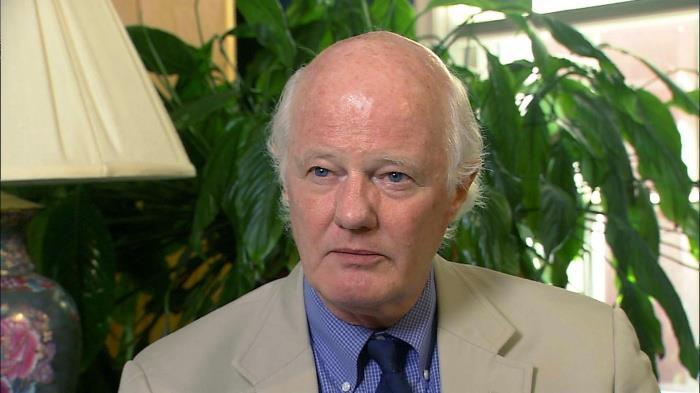
Freshwater says that Newell had many different inside stories about politicians he has met and interviewed. These are inside stories that nobody would have ever guessed, such as presidential candidates, senators, and representatives. Such an (insert story here).
Every day of the year, my mom was affected by the fact that her dad was considered a “celebrity” in Des Moines, Iowa. This caused the number of times she saw her dad throughout the weeks, bringing me into the negatives of having a well known dad.
When someone has a parent in the news and sports broadcasting, this will affect the times you see your dad. Mike Newell had to go to the station many times throughout Freshwater’s childhood. However, that is not the only thing that he has to do. Newell was always traveling and waking up early to go to the station. As a result, there was always some conflict that my mom had to experience to have a dad, Mike Newell. According to my mom, “I saw him Sundays and Mondays, but when he was traveling, it may not have been that often.” Adding on to this, my mom had divorced parents, and having divorced parents also decreased the number of times Freshwater would have to see her dad.
As you heard in the quote, Freshwater saw her dad Mondays and Sundays, those were her required days, but due to Newell’s traveling schedule, he had to broadcast to other states in the U.S to other news networks; this means that she may have seen him less than that.
Freshwater may have gone more than two weeks without seeing her dad due to the amount of travel and wake times. This affects a lot in a kid’s life. For instance, when you have a mom with a full time job and a dad that does not see you often, this will influence a kid’s independence and self efficiency.
Although this event impacted the first 18 years of my mom’s life, some other things happened in my mom’s life that may have caused complex feelings. While my mom was talking during the interview, I realized the how different life can be when everyone knows who you are and even who a family member is.
If there is one thing all of us have in common, it is that people have always thought of “celebrities” family to be the luckiest people in the world. Although things are different now, and Mike Newell is not what society thinks of as a celebrity today, doesn’t make things much different. Which shows that we should always know the backstory to a story.
Amy Newell Freshwater describing the in depth story of living with radio caster; Mike Newell
“I saw him Sundays and Mondays, but when he was traveling, it may not have been that often.”
Radio caster, Mike Newell in 2011
Interviewer, Amy Freshwater
The Rhythm of a Drummer
The drumming career of Terry Ross and how he came to be
By Myles Garcia
It was a cold Monday morning the date was October 10th, 2022, to be exact. I woke up to the sound of breakfast being made and could smell the aroma of pancakes. I had the day off from school but today I wasn’t going to get up and start playing video games, rather I was going to interview my grandfather, Terry Ross.
I went downstairs for a little more peace and quiet. I sat down on the couch getting comfortable knowing I was going to be here for about 30 min. I called him up, the phone ringing a couple times before he answered the phone.
He starts of by saying “Hello?” in a very eager tone, I could tell he was excited to start the interview. “Hello Abuelo, how are you doing this morning?” I said ready to get the actual first impressions of how he was feeling, as I wanted to hear more than just excitement in his voice, but also a sense of calmness and sense that he was ready and for the interview.
I already knew where he would be at, in his chair that he always sat in that was soft as clouds.
“Hello Myles! I’m doing well on the morning and it’s to be a great day, a very good day!” I could tell in his voice not only excited but rather prepared for any question that I asked him. With those words out of his mouth I knew we we’re ready to start the interview and gain more Insite on what it was like for him as a drummer and why he did it and loved it so much.
Ross has done certainly a lot in his life and has for sure has had an interesting one at that. To start in his life, he had an extreme love to play the instruments, first playing the cornet but the dropping it and picking up the drums at age 11 or 12.
Given the time when he played his life could have turned out bad just based on the color of his skin. Luckily, the people he played for did not care about how he looked, how he spoke, or what he liked. They came to hear him, and his other band members play music as an outlet and a source for entertainment for people at the time which was around the 1960s, 70s, 80s, 90s, and 2000s; he couldn’t remember any racial discrimination for when he was doing what he loved the most.
It is extremely fortunate that he did face any racial discrimination because if he had that could majorly affected his career as a drummer as he says, “I don’t remember in terms of the musical performances, racial discrimination.” This has an extreme meaning to me because as a musician myself it really shows and emphasizes what music is supposed to be about and how the musical world is supposed to be. A place of enjoyment, not a place where you are based off your skin color and not your musical skills.
What he says can really connect in another way as in today’s world there is not as much racism in the music industry and how no matter what race or
ethnicity you are you can make it. This is also an example of a real experience on what Ross went through, in his days when he was playing the drums.
Ross saw music as something that was an outlet, something that he could do to escape the real world and to enter his own.
When he was a young boy, he used to play the cornet which is a similar version of a trumpet. He did enjoy doing that as a hobby before he decided to drop it as he was not satisfied with the progress he was making and pick up a new instrument which would be the drums.
Ross flourished as a drummer and really did love doing it as he started at 11 years old. After 2 years of playing the drums, Ross had made a decision that would impact his life forever. He took a lot of time and thought into this one decision and decided that he really did love the drums and wanted to play them for as long as he could, and he wanted to start taking it seriously.
He knew it would take an extreme amount of work, dedication, and practice as Ross was up for the challenge of becoming a drummer as he says, “I switched from playing the cornet which is like a trumpet to the drums… I started playing the drums in an amateur way… At 11 or 12 I started taking the drums more seriously and started to go to school to learn music.” This is an extremely important aspect of Ross life as this is really the part of his life where he knew what he wanted to do and aspire to become.
His words really put’s an emphasis on the beginning and roots of playing the drums for Ross. This has a very big meaning to me as it shows that even at a young age you can stay set on what you want to do and with enough hard work and dedication you can make in what you aspire to be in life.
This major experience really shaped Ross whole life as it would be the thing, he would do for over 60 years, and he even wanted to go to school just to learn music.
Ross was a person who loved to try and thrive in what he did and to do that he needed to play in not just one place. He would play for up to 50 bands in his time playing the drums. It was certainly the experience to say the least but playing in a band.
It was not just something he did because he had to pay the bills, but because he also loved to just play for people as it was his passion. Something he could do where no one could bother him, like an outlet from the real world. When he was on stage it was just him, the drums, and the other members of the band. This is truly what he loved to do.
His father was also a musician who unfortunately died when he was 9 years old, which is one of the reasons playing in a band was such a great experience for him.
Even though his father when he was alive had a big influence on Ross musical career as shown when
he started off with the cornett. This is evident when he says, “Playing in a band was just a tremendously good because my father was a musician.”
This is another very important aspect of Terry’s life as like I said before he didn’t just do this to earn a buck but because it was his passion, even though the bands were paying him very good money, he did it because he loved it. This really emphasizes the character of Ross, as the bands would also help him form different parts of his character like one part being that you can’t stay in the same place forever unless you want to get better. This characteristic was built up through the many bands he would play for in his day. To put it simply, playing the drums was something he did with pride, passion, and joy
Throughout my grandfather’s life all he knew was to play the drums. He has seriously inspired me to play the drums and follow in his footsteps. With all this new information I wanted to share with other I get to show them who Ross is!
This allows me to go to him more and ask more questions about the drums as he already is an expert on it being that he has played for more than half of his life. This is also something me and him can do together and as a result, have a much deeper relationship with him. It was great that he was able to sit down with me and do the interview as I would not have found this much more about my grandfather if it wasn’t for the interview. Music is an interesting place as you may end up in a place with major success or distress. This interview has taught an important lesson. A lesson that is something to really live by. That lesson is that you should keep doing what is most important to you no matter where you end up.
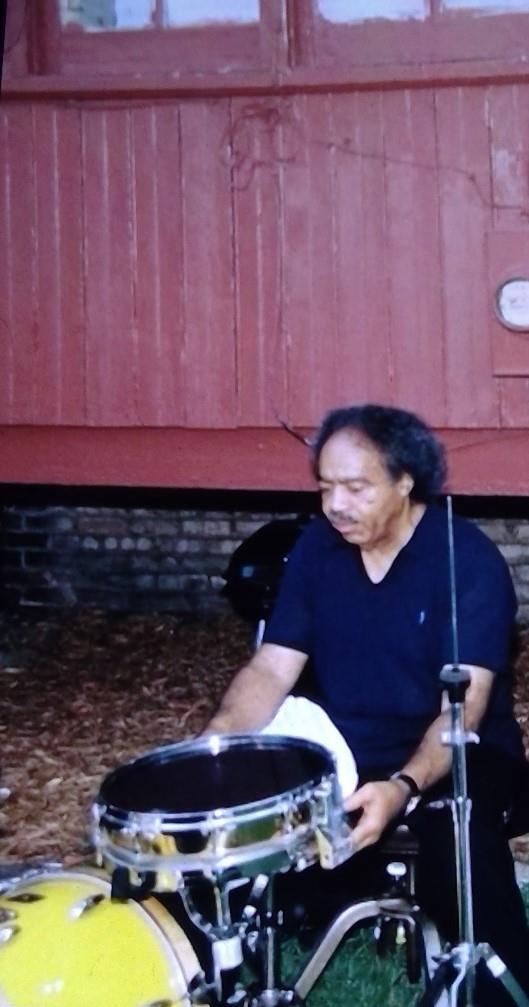
“Playing in a band was just a tremendously good experience because my father was a musician.”
HOOP DREAMS
Told by Khalid Hannah
By: Khalil Hannah
Khalid Hannah is a member of the Chicago community and is a vital part of the professional basketball world.
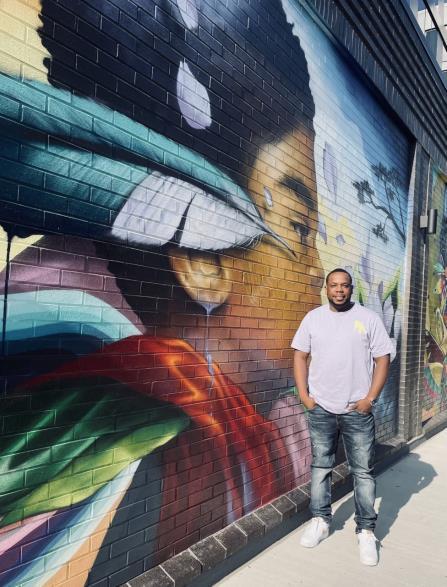
Hannah oversees the partnerships between Wilson Sporting Goods and companies like: FIBA, NBA, WNBA. This is his story about his experiences.
The NBA Draft is one of the most important nights in a basketball player’s life. This night is where you get to see if all your hard work, determination and sacrifices were worth it. To sum it up it is pretty much the beginning of a new chapter.
My father’s dream was to get to this point. To be an NBA superstar. Now he is on the outside looking in but may be closer to the inside than you might think. Khalid Hannah is an employee of Wilson Sporting Goods, the official basketball of the National Basketball Association. In this job he received the privilege of visiting this event firsthand.
He described this experience as a “reassurance that regardless of where you start, when you do the hard work… you can [achieve success].” This statement stretches further than just basketball. Hannah speaks on the fact that success is awarded to those who put in the most work rather than the people who cut corners.
In the 2022 draft there were 283 players who entered. Of those 283 players only 60 were drafted; of those 60 only half receive a guaranteed contract. There are about 450 million basketball players around the world and just 450 in the NBA.
Many players are told to have a backup plan and that everyone has hoop dreams in order to realize that there is a lot of work that you and your family must put in so that you can be apart of the 1% that makes it to the league.
When asked if he felt any jealousy towards, the young players he saw getting drafted Hannah responded, “we all have those aspirations to play professional…A sense of you is like what if I could have went to the NBA.”
The greatest asset a child could possess to have a successful adult life is not money or connections but the experience of playing a team sport in their early life. You
Youth sports take a lot of effort, focus, and perseverance.
These three qualities are used to separate the overachievers in life from the pushovers. A study from AthleteAssesments.com came to the observation that 95% of Fortune 500 executives participated in high school athletics. On the other hand, it was found out that 96% of dropouts in 14 school districts in seven regions of the nation were not participating in an athletic program. As an athlete you seek out competition and always have the desire to be the best at whatever you are doing.
In this society you must have that competitive mindset, that is fostered in an athlete, to be successful. Those who sit back and let the ambitious chose their position are forced to be satisfied with whatever is handed to them. Creating a competitive spirit at a young age makes it second nature to jump at any opportunity available and the subconscious awareness of the people attempting to take your spot.
My dad says “My advice is to start a sport or if you are already participating in a sport continue to work hard and persevere and you will be granted with success.”
In conclusion basketball is a long road that grants success to those who give the most effort and sacrifice time.
journey to Pakistan.
During this long journey Chowdary saw and experienced many terrible things and challenges. He describes the journey by saying, “The journey was terrible, there was a lot of people who fell sick, there was a lot of dieseases. People started dying. People from the surroundings would come and attack the caravan.”
Chowdary’s perspective helps us see and imagine even what a glimpse of this horrifying and grueling journey was like from someone who was actually there
Chowdary expresses how traumatizing this journey was, which is not suprising seeing how a 8 year old child had to experince horrifying things such as sicknesses, death, and violence. Often when I think of this story my grandfather has told me, realize that his experince shows an example of the unfiltered raw part of the other side of humanity. The side where things are not peaceful and jolly, but the opposite with disease, death and violence. Although the perspectives from these sides of humanity are over often looked.
When Chowdary was forced to leave his home, a small village in North India, and flee the violence to go to Pakistan he faced many challenges and hardships. One of the challenges and loses he faced was that when he was fleeing his old home he could not take much with him. He was forced to leave everything behind, both figuratively and literally.
Chowdary states, “We had to leave everything behind… the only things we could take is what we put on the bullet cart.”
The Child That Survived
By: Aadil Hassan
It was an early Monday morning, the sun was rising slowly over Lake Michigan, a beautiful orange color dissolved into the sky. I opened my laptop and facetimed my grandfather, Shumsul Huck Chowdary, it rung a couple of times before he picked up.
My grandfather was wearing his blue and white collar shirt as he always does and was sitting on his favorite tan leather seat in his living room. His face was lit up as it always is when he speaks to me and my cousins, his grandchildren, just happy to see our faces.
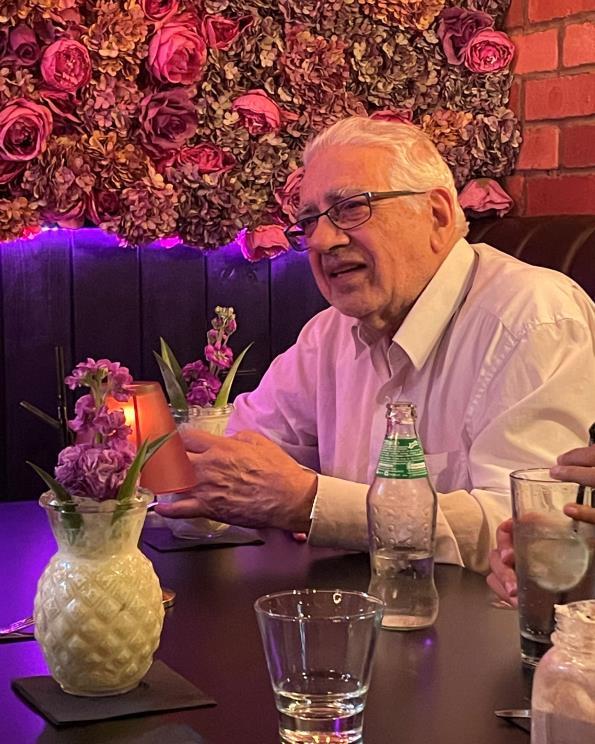
Chowdary, my grandfather, was born in a small village located in the north side of India. He was the one of the many children of his two parents who he loved very dearly.
In his home country India, there was a lot going on at the time, Great Britian who was ruling over India was withdrawing from the nation, but they created a partition dividing India into two different regions. The partition created a new region known as Pakistan, many Muslims had to flee to the new region Pakistan due to the violence agianst them, this included Chowdary. During the time Chowdary was only 8 years old and was staying with his mother’s parents.
Chowdary was forced to leave his home and flee in a caravan with his village along with a few other villages escorted by the Indian Gurku army to Pakistan. Chowdary had to endure a long and grueling journey that took over a month and had to face and overcome many challenges.
Chowdary faced and witnessed many terrible things as a child and had lost everything, but he worked hard to be where he is now and appreciates everything he has, for once he had nothing.
Chowdary faced many hardships and challenges on the journey with his caravan to Pakistan During this journey he was travelling in a caravan with his mother’s parents’ village and other villages in small bullet carts which were pulled by oxen. Escorted to Pakistan by the Indian Gurku army, Chowdary’s caravan endured a long and grueling
Despite facing many challenges one of the most difficult ones for Chowdary was that he had to leave everything behind. Even though he survived this terrible event, a part of him still died. He was forced to leave everything behind, his friends, his home, his toys, but also a part of himself. It was almost as if he has lost a part of his childhood, the things that make Chowdary, Chowdary.
When he lost all these things he lived his whole life with, it is almost as if he also lost a part of his childhood I often reflect on this to help myself appreciate how blessed I am to have everything I have, and to live in a safe shelter and environment. I think Chowdary’s story can be a way for us to appreciate and recognize how much we have and to realize that many people are not us lucky as we are.
One of the biggest challenges Chowdary faced was that nobody knew when the partition was going to happen it and it came out of nowhere to some extent. When the violence started coming towards Chowdary’s village they had no time to prepare and pack things up because of how quickly everything unfolded. Afraid for their lives, they were forced to leave everything behind.
Chowdary expresses this himself, “We didn’t have time to carry anything, because we were afraid for our lives.”
Chowdary’s words go to show how traumatizing and scary the violence was, because you were willing to leave everything behind because you were so afraid that you were going to die. One of Chowdary’s biggest obstacles was that all of the violence and the whole partition unfolded so quickly after the British left India that a lot of people such as my grandfather in rural villages had no time to prepare in advance.
These words from my grandfather are significant to me because it makes me realize how quickly and unexpected things in life can happen and there is not much you can do other then try to survive.
Throughout the interview, my grandfather expressed his experinces in great detail and gave us an insight of the tragic and grueling journey he went through as a child. My grandfather has experienced and witnessed horrifying events as a child that no child or adult should have to go through.
Despite having to rember and recollect about a traumatizing part of his life, my grandfather selflessly shared his story with me so I can share it with others, and so his story can live on.
My grandfather has lost a lot of things in his life, but despite that every time he would pick himself up and continue moving forward. My grandfather is a role model to me because not only has he achieved great things in life that I aspire to achieve, but he never gave up on anything, despite losing his home, his friends, and family he kept moving forward despite the challenges.
My grandfather taught me to be grateful for everything because one person’s trash can be another person’s treasure, as we often overlook the tiny thing’s we have that many people would dream to have.
The journey of Shumsul Huck Chowdary, a survivor of the Indian Partition, on his refuge from India to Pakistan.
“One person’s trash, can be another person’s treasure”
It was a sunny day in Chicago in the neighborhood of Ukrainian Village. I sat on my front porch when out walked my friendly neighbor Tom who waved and stopped to talk. How lucky was I to remember I needed to conduct an interview for a school assignment and there was Tom standing in front of me. Right at that moment we began to talk, and I learned new and interesting facts about Tom. My neighbors and I are remarkably close and because of that I get to hear stories and experiences they have. I knew that Tom was working at a school where a majority the kids had special needs and that made me extremely interested. Tom has worked many jobs places, but he seems so happy to be working at his new job and had lots to tell me. After the interview took place, I learned two lessons; one is to follow your interests until you feel really happy and satisfied and the second one is always occupied time to learn new things from your old friends.
THE OPPORTUNITY
BY RONAN HEALY
Tom started out in Mishawaka, Indiana, a small town around 10 minutes away from South Bend, where he lived through college. He felt like he had better opportunities so after he was done with school he moved to Chicago, Illinois. Tom worked at many jobs after he moved to Chicago, like computer consulting, massage therapy and culinary assistant. He also went back to school to get a masters in spiritual leadership studies at Loyola University. Tom was not just working in Chicago, he found time to get married and have children, twin daughters Chloe and Stella. Sometime in 2017 he began working at Old St. Patrick’s Church as the Director of Liturgy. He enjoyed this position until something changed in 2019, he felt like he wanted to do something different. He describes, “I had worked many jobs as a culinary instructor years before at other restaurants, so that made me want to take the job in 2019 as an instructor.” However, there was a problem. Tom was still working at the church, and he did not want to leave. So, for quite a while he decided to work two jobs at once. He felt pressured doing this and finally he had to leave the church in 2020 because he realized his second job was more important. He also needed to decrease the risk of getting covid which was spreading rapidly at that time. He reflected on his opportunities and realized there were challenges because he had to adapt from a common/normal environment to a different/unique environment.
Some people think teaching kids with special needs may be challenging, but for Tom it is an opportunity to lead them somewhere in the future. Tom liked his old job at Old St. Patrick’s but thought there was more of a challenge and reward working with kids in Chicago. He found his interest as a culinary instructor at Ray Graham Training Center. The Ray Graham Training Center is a Chicago Public school that serves the special needs community from age 18 to 21. The children at this school are older and are not able to go to a regular college. The school gives them a place to learn job skills they might be able to use like cooking. Tom is the main instructor and is in charge of the kitchen at the school. He states that, "It’s different every day, some days can be difficult, and others can be easy.
All the students with special needs continue their education for 4 years after High School so they could get a potential job as a cook." Tom did not or does not want to back down on this job because he thinks these students can go somewhere and be successful in the future. He also realizes the people he works with are great and every day is different. Tom accepts challenge he wants to help and fix problems when they are in front of him.
Most people don’t know what’s going through the head of a special needs kid, but Tom may know what that’s like. He’s worked multiple jobs. Tom knows what students/co worker’s emotions are like when a student/co worker leaves a school/job because of experience. "On Mondays we always go grocery shopping, and the students are allowed to bring their own money and buy what they want. We find what we need for our cooking class ahead of time. This one student did not bring her money and we did not give her money and reminded her to bring her money next Monday. She is a non verbal student so she would not leave the store, and she kept looking back at the Jewel Osco. At the time I did not know what she wanted and then I was told she didn't have money, but she really wanted to buy something. So, we went back to school, and everything was fixed." Tom has been in this situation and knows what it feels like. Tom once had a job at Old Saint Patrick’s Church and at one point, he needed to switch full time to culinary instructor. So, when he quit for full time, he made sure everyone was okay and he made sure to understand their emotions. Tom’s experience with working with many people who have divergent backgrounds, strengths, and weaknesses lead him to really understand how they feel in big situations for him.
In conclusion, I learned that being helpful and understanding emotions will lead you to a dream job that is stable in your life or future. I appreciate how helpful this process was in showing me what my interviewer was like. After I did this interview, I learned what it is like in the mind of a child with special needs. I also learned what to do if I am in that situation or a comparable situation to that. My concluding statement/something I learned is, trust people when they give helpful information because it can help you in the future.
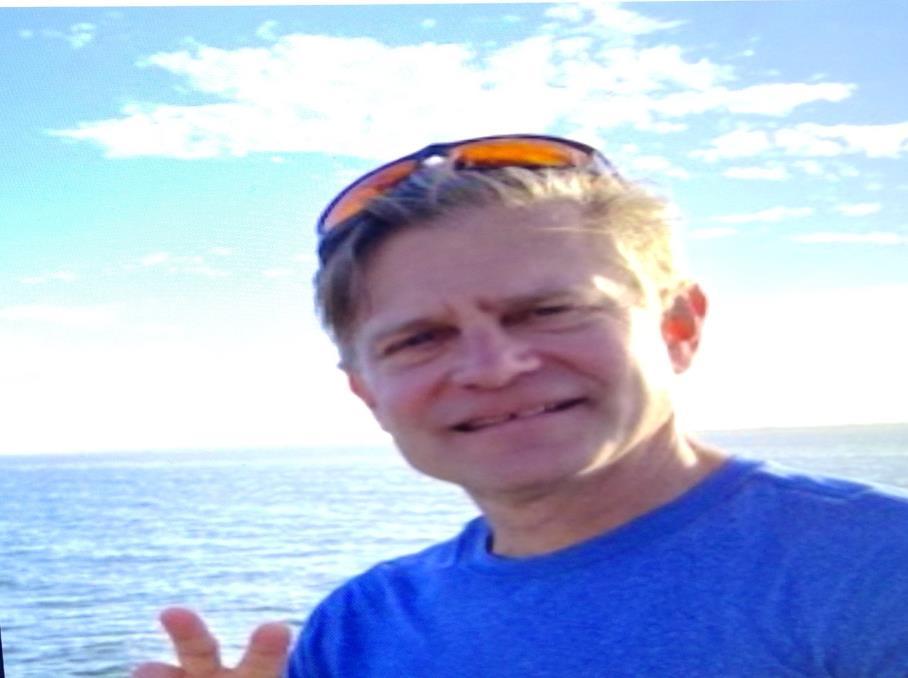
“It’s different every day, some days can be difficult, and others can be easy. All the students with special needs continue their education for 4 years after high school so they could get a potential job as a cook.”
A Plane Scare
John Hiltz shares his experience when he was in college and had a scary plane ride
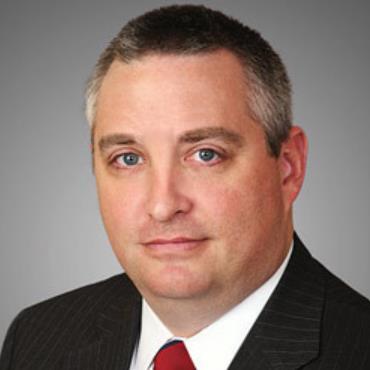 By: Jack Hiltz
By: Jack Hiltz
A loud bang startled the six college kids and two pilots on board. He and his friends knew something was up. The plane sped up and stopped suddenly, many times in a row, and the shaking, flashing lights in the cockpit, made the environment worse. They all looked out the window at the same time squinting their eyes to see nothing but rain, cloud, lighting and even fear. Telling jokes to calm the mood, John Fredrick Hiltz III opened his bright side, even in the worst of circumstances. Sitting frozen in his seat, Hiltz could only hope that he and all his friends would survive. A turn from “am I going to die” to “I’m going to die” really shook his emotions. Many surprises and emotions happen in life, and they do here also.
The plane ride started out smooth; it was a near perfect environment to read, work, talk, or sleep, but a premonition came upon Hiltz. They were coming back from a weekend long trip on a pristine beach in Florida’s Key West, where Hiltz and his friends would relax. They would lay in the warm, soft water, relax in
the hot soft sand, talk, read a good book, or do anything their mind wanted.
Later, when they were boarding the plane, returning to their hometown of Winston Salem NC, Hiltz, his five friends, and two other pilots still had no clue what was to cap their exhilarating weekend adventure.
Around two and a half hours into the flight, they hit a storm over the boarder of North and South Carolina, that jolted them awake. Suddenly, with great mystery, Hiltz realized that himself and the plane were in trouble. They had flown into a tumultuous storm, that should have brutally murdered their relatively tiny charter plane. The tremendous size of this storm was not to be messed with. As the plane started fishtailing, which is when the back of the plane starts to turn horizontally, it tipped the plane with it, carrying Hiltz and his friends into a ninety degree angle.
When he looked outside and the only thing he could see is lightning, rain and thunder, that’s when Hiltz thought that “we were certain we were going to die.” This one moment, of the plane fishtailing, and the tumultuous storm and all the emotions running wild, impacted the general mood of the flight. Hiltz knew he had to do something, but all the drama, shock, noise, and engines making sounds made it hard to react to anything but the extreme amount of fear that was building up inside of Hiltz’s body.
Hiltz and his five friends used the fear to make jokes about death, in a sad attempt to lighten the mood and possibly take a little bit of pressure off the grave situation that they were in. But they all knew one thing, aside from all the jokes and comments, that this situation was serious. He knew they were certain that they were going to die.
When the plane went through the storm, the ride did not get any easier. In fact, it got worse. Worse from being certain that they were going to die. He could feel the plane shaking, moving, turning, and a lot of other things. Along with the feel, he could hear the plane shake, the sound of the engine sputtering, and he could almost hear the screams inside his own head over the noise of the plane. Hiltz could see the storm flying by him and his friends, and the pilots slam the cockpit door shut once used as a gateway to talk to the pilots, serve drinks and even walk through.
All those memories were shut as well as the cockpit door, so the pilots could not hear the screams of the passengers and focus on not dying and killing everyone and everything on the plane. The pilots could have never predicted this level of storm, as on the radar is showed it to be a mild level thunderstorm. All the booms and cracks and noise and upward and downward movement of the plane contributed to the feel, and the understanding of the gravity of the event. Some, including Hiltz chatted that “the plane was like a roller coaster without any safety features.”
To really understand the gravity of the situation, you would need to be able to be in the situation. If you have ever ridden a scary roller coaster, and felt a tiny bit of fear, or even large amounts, raise it exponentially. Think for a second: to be up at least twenty thousand feet in the sky, rolling around in a metal tube hoping that you can possibly, just possibly get out without and injuries, is not what any roller coaster should feel like.
For some, like Hiltz’s friend, they are willing to risk their life for a two percent chance of survival. He sprang into action when he saw his friend acting petulant and trying to jump out of the plane.
Flying through the crazy storm, Hiltz and his friends did not know when they were possibly going to land. They were thrown off course, near the town of Greensborough NC, about an hour and a half North of Charlotte, NC.
Since the cockpit door was closed, there was no possible way to know if they were going to die or survive. Hearing the screeching of the engines, and the friend trying to jump out of the plane, made the thirty minute total seem like an interminable, incomprehensible amount of time that they just had to endure.
When the plane started to levitate towards the ground, landing on the tarmac, they still were all shook up from the experience, crying and grateful that they survived. Since it was still the 1990s, the internet was nonexistent for everyday use, and they had to wait a certain period before they could call their families and get personal comfort. As the plane was inspected for anything wrong, they all sat down in the airport thinking about what they had just been through. An experience that Hiltz could never forget.
While sitting at the airport, Hiltz turned his head to look towards the storm, but from a different perspective. He took the time to look at the trees, listen to the workers talk, and even think thoughts that weren’t scary. Hiltz turned his head back and told his friends something that everyone needed to hear. He told his friends: “I’m extremely happy we survived.” Something simple, but necessary to hear. The conversation enlightens the idea that you should be grateful for every moment you have, because you’ll never know what can happen, and that you can find comfort in a situation that may not be ideal. Also, it uncovers the idea that there are a lot of emotions and feeling in the flight that would lead him to say this, like fear. Fear, as big of a factor in our everyday lives, was magnified making a difficult situation for Hiltz and his friends.
Throughout the thirty minute interview, Hiltz unpacked many difficult topics that involved him and his friends on a boisterous plane ride that almost killed him. Hearing this interview, and the words he said, like “it’s a feeling you’re not supposed to have on an airplane” and the words “I couldn’t fall asleep that night” illuminated me, teaching me that going through a scary plane ride, or any other life threatening experience is inevitable, and life Is short, so enjoy it. Even through this experience, he stayed patient to get to safety. Riding on an airplane is scary enough for most people, and his attitude and even this situation really shows that anyone, even you, can survive, and possibly thrive. He has taught me through his words that experiences are complicated and need unpacking, but the most important thing he’s taught me: life is tough but take time to enjoy the moments given because life is short, long, and a surprising journey.
“We were certain we were going to die.”
Ian Hirt, the man in the middle of the photograph, winning the 2019 Northwest Indiana Partners for Clean Air Industrial Award as well as a 2019 South Shore Clean Cities Sustainability Leadership Award for its work to reduce diesel emissions throughout the port.
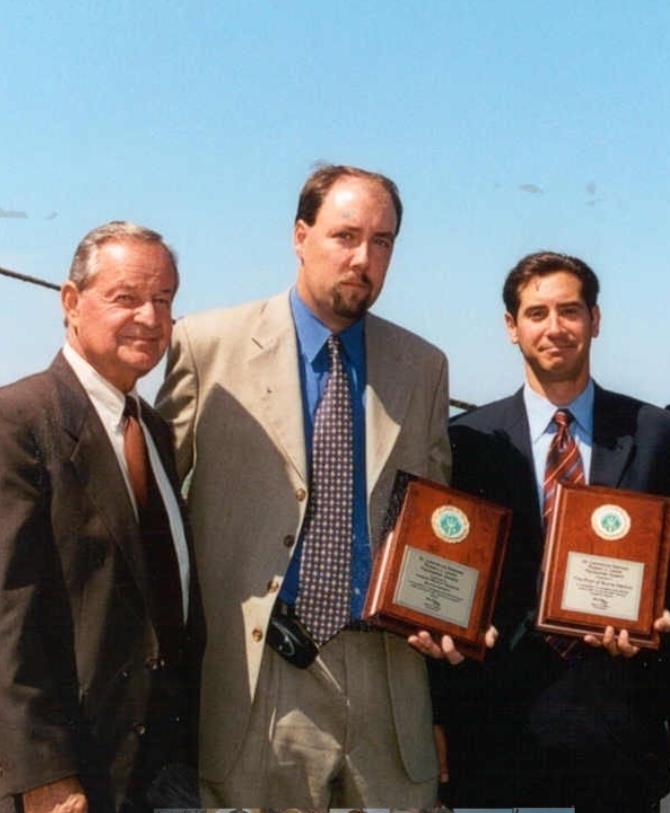
Most people being interviewed often feel a sense of anxiety or stress, it shouldn’t be the other way around. But in this case: my father, Ian R. Hirt, makes the interviewers themselves feel dread. He sat in a dimly lit room, arms crossed, sending a text message to me saying, “I’m waiting…” ominously.
But in reality, there was nothing to feel threatened about. In fact, he is one of the kindest people I know, and he gives some of the greatest advice. But where does said advice come from? In this article, we talk about Hirt’s stories with climbing some of the strangest mountains across the world and how they had such an impact on him, as well as his wisdom.
From many years of experience with mountain climbing, Hirt has had many strange experiences with it, yet have made him realize what should really come first in his life. His experiences started around 2003, starting mountain climbing after growing up in the suburbs of Detroit and really only having access to books and articles about adventurers. Being the youngest of six children, he was never able to do what he wanted when he was younger, either.
He later had much more access to rural areas in high school, and it was during this time that my dad was getting more and more interested in things like climbing and hiking along paths and mountains. He had always enjoyed the scenery, landscape, and especially the challenge, so he decided to make it a hobby of his. He was constantly going on hikes and climbs with friends, leading into college and beyond.
Hirt then met his girlfriend Patricia, who would later become his wife. He began working in the port business as a vessel agent, considering the fact that if he did try and look into the field of climbing and exploring the world, it would be impossible because of his family.
Hirt explains how he has not “thought about a job in this field, because it would take me away from my family and my family is extremely important to me”. Hirt’s family has always been a pivotal factor to him, ever since he was born into one where family comes first. This affected not only his childhood, but his adult life as well. Sticking with his family’s rules and not disappearing for weeks or months on end to climb mountains was something he considered very heavily. Hence, he decided not to climb mountains as a job and follow his own customs. I often think about why and how important it was that he did this, and how it benefits me as a person today as well as how it will benefit me in the future.
Hirt had achieved many great things on the mountains he’s climbed, but there have also been mistakes, and these mistakes have helped him grow as a person. On one of the first mountains he had ever climbed, he drank bad water and got sick. On another occasion, he climbed hastily and carelessly on one of the paths and got extreme mountain sickness when he got too high. Not only things that nature is at fault for, but other things can go wrong like bags and bags full of supplies for the climb being lost. However, this never stopped him; he always persevered. Even though he got sick, he still kept climbing to the top. Even though he lost his things, he still made his way to the top. One of the most challenging was an avalanche of sorts, where everything was almost impossible to climb; regardless of this, he always made it to the top anyways. Hirt explains how “It would’ve been okay if I didn’t make it to the top but I just there was something inside of me that said, I really want to make it to the top”. Perseverance is a crucial skill to have, not only growing up but throughout your life. Even when things get rough, or you make small but consequential mistakes, there is almost always a way to overcome them. Though practicing perseverance is exhausting, it pays off in the end. This is personally important to me as well because my dad often tells me something quite similar: to “try my best”, and to “keep trying even if it’s hard”. Even though things like this may seem tiny, they have large impacts on my mindset (as well as other people’s mindset).
Even though he had learned so many things along the journey, it still opened his eyes in a way he never thought possible after he decided to stop constantly hiking and climbing mountains.
After starting a family and deciding to stay as a full time vessel agent living in Chicago with no available hiking spots, he started to realize how grateful he is for climbing, even though he couldn’t do it much anymore. Though some of the skills he learned seemed like they were strictly used when going to physically challenging places, they can also very easily be applied to the real world as well. Apart from learning the values of family and perseverance, he also learned that trying new things is vital to growth. Hirt explains in great detail after much thought how “It opened up my eyes to the world and… just made me realize that if there’s something you want to do, you can just go for it and get it done; don’t let things stop you”. Not only was Hirt just talking about not letting things get in your way, but he also says to follow your dreams.
Growing up and doing things that everyone else is doing isn’t going to help or benefit you unless you do truly want to do what everyone else is doing. His experiences as a child or a teenager didn’t stop him from doing what he wanted all along. He decided to take those social and physical risks; it just so happened to be one of the best things he’s done.
This shows significance and importance to me because this information is so vital for so many people who decide not to follow their dreams and take risks. Having a father who will let you follow what you want to do and support you through it is one of the most important things for a child.
In conclusion, my father has done so many things in his life that he loves; and so should you.
As his daughter, I feel a personal connection to these stories because he can pass these experiences onto me and I can continue to tell these stories and morals. However, I don’t just see him, his advice, and his stories from a family perspective.
I can see these stories as a lesson, or a teaching of sorts. I appreciate this interview so much because it gives good advice for anyone, not just one specific person. As well as this, his story is also important because it shares how different life is for other people (especially now that urban areas are expanding) and what some people like him grew up with. We are sent off with one final message from him: “You should always do what you want to, even if it has a difficult process and feels impossible at times.”
“You should always do what you want to, even if it has a difficult process and feels impossible at times.”
The story of how a small interest transformed into something eyeopening
‘Justahobby’
Written and published by: Molly Hirt
Hong on ”Through the Decades”, one of the shows that she reports on
The Journey of an AsianAnchor
Ellee Pai Hong is performing on one of the highest platforms in the journalism industry
By Anden Hong
It is late on a Saturday night. A woman sits down across from me at a long wooden brown table, with nothing but a mere glass of ice water and my phone in between us, the smell of pizza wafting through the house from our recent meal. That woman, my mom, is wearing soft cotton pajamas. “Are you ready?” I say, as I sigh and grab my phone off of the table. “Yep,” she says, as I open the voice recording app on my phone and set it in between us, the TV of the football game softly humming from the living room. “Three, two, one,” I count down before I hit the red button on my app to begin recording and to start my interview.
Ellee Pai Hong, my mom, was born in South Korea. Growing up, her and her family bounced around from America and back to Korea. She is a mom of 2 with a husband and is known by many for having the achievement of being the very first Korean reporter in Chicago. Though she may be a petite Asian woman, with shoulder length brown hair and dark black eyes, there are no limits to what she can and cannot do due to one thing, her hard work.
When Hong was a kid, she loved to watch the news. After moving to LA at the age of 6, she watched the news one day and saw Trisha Toyota, an Asian anchor. She claims that that time was “when I first saw someone who looked like me [an Asian person] doing a job like that [anchoring] on TV and I thought huh, that looks interesting.” At that time in the world, it was rare to see an Asian person on TV, so this was a major breakthrough for her and probably for many other Asians.
Moving back to Korea from LA, Hong began to focus on her studies in high school and working to get into a good college, partly due to the fact that there were remotely no extracurriculars in high school in Korea. Then, she got into college and went to Ewha Woman’s University, majoring in English literature, and she started to write for the school newspaper there. When she graduated, she went to Northwestern University for broadcast journalism. From there, she got her first on air job in Rockford, IL, where she covered a variety of new stories, but finally was able to fill in as an anchor, and build up a resume tape, which is a compilation of clips combined into one. Due to her tape, she got her first full time job in Decatur, Illinois and anchored on the 5:00 evening news and reported throughout the day. During her time there, she reported an especially important story about black students getting expelled due to racial injustice and was spotted by someone who referred her to an agent, eventually leading her to sign with another agent which landed her in Connecticut anchoring the morning news for WFSB, a CBS affiliate and the dominant #1 station at the time. Their rival, NBC, wanted to recruit her out of Connecticut into one of their stations. She then interviewed with them and said that she wanted to work in Chicago because her husband was working there. This led her to become an anchor for the morning news of WMAQ TV in Chicago.
Hong claims that there are always stereotypes in the world but felt that she was very lucky that she did not face any challenges because of her gender and race. She does say that she felt there was a fair amount of ignorance in her workplace. One story that she reported on was about a Korean man who killed many people in a mass shooting at Virginia Tech University, and she told her workplace that in Korea, your last name goes first, but they refused and she felt that they thought the American way was the right way, the only way, and she felt very ignored even though that was not how Korean names are displayed.
Hong was inspired by a simple thing, just seeing a morning anchor that was her race, and was inspired to do the same and to achieve a place on one of the highest platforms in her industry, facing many challenges but striving to be better I relate to this when I see successful Asian basketball/Asian baseball players, it is amazing to see someone who looks like me like Shohei Ohtani or Jeremy Lin playing under the big stage and being great at what they do.
Hong grew up moving back and forth between Korea and America, constantly being faced with challenges, but the hardest challenges she faced were the education in Korea and the different language use.
Hong was always a straight A student in America, but the education level in Korea is much higher than in America. At that time, she only knew conversational Korean that she used with her mom at home, but never knew the complex levels of the language that were used during the school day. She was faced with the challenge of learning the complex topics of education that the Koreans were learning, on top of having to learn the language itself!
Reflecting on her experience with the Korean education system, Hong says, “When I got to Korea, I had no idea what they [Koreans in school] were doing. It was like a foreign language to me. So it definitely taught me to grind and have grit and to keep on working until I got something.” Hong never succumbed to the pressure of the challenges that she faced. She vigorously worked to be a better student and to learn the language, and then eventually became completely fluent in Korean. This task was evidently not easy; the Korean language has about 1,100,373 words in the dictionary, with the English language having only
about 171,476 words. That is a huge difference!
This challenge implanted Hong with a mindset that she would use throughout her career, mainly helping her to persist to get a story. In the news, Hong says that you are given a time block and a deadline and that “there is no excuse, you have to fill that time [with the story you’re assigned].” An example of this is what Hong dubs “her most challenging story”, when she was reporting in Rockford, IL, and she had to report on a story about a pilot that saved a kid, but the pilot was nowhere to be found. She persisted through this challenge and went everywhere along the town, asking people if they have seen him around, and leaving her number for them to call if they had seen him. She persevered and kept asking people until finally, right before she was about to go on air, she got a call from the pilot that said he was free for an interview, and she rushed to the scene with her cameraman to get that story.
Hong learned to never complain and to grind until she got something I relate to this when I play sports because you will never get better unless you put hard work and effort into that sport.
Hong has had many connections that have helped her become successful in the news industry. An example of this is when one of her friends from her old news station, NBC, introduced her to the producer of Comcast, which eventually led her to get hired there and become a host at Comcast, a job she still has today on top of her other position as an on air host, writer, and producer for Weigel Productions. Hong expresses that, “It’s not just about your work, it’s about how you manage your relationships with people.” Hong implemented this into how she interviewed others as well.

An example of this is in what Hong claims to be her most rewarding story, a story about two kids who died in a fire. She says that she did not want to interview the parents due to their kids’ recent death, but the director of her current news station at the time told her it was her job to get the story. Hong, instead of asking the parents about their reaction to their kids’ death, decided to ask questions about the life that the children led and how special they were. She connected with them and made the parents realize that this wouldn’t be a one way relationship with Hong getting all the info and reporting it, but a two way relationship in which she would sympathize with them and comfort them and to talk about their children.
Hong always strived to maintain excellent work while making good impressions on others, and she recognized the social aspect of journalism and how good relationships can go a long way I relate with this in that how you present yourself to others is very important and changes the way that people think of you and how they treat you.
My mother was very perceptive of her past experiences as she reflected on her childhood and how it helped her build her career to eventually become a journalist in the news industry. I became aware of the little things that she does in the house that are affected by her mindset to always work hard like always getting her stuff done and never taking a break until it is finished. From this interview, I appreciate that I am able to see my mom in a whole new light and learn of new things that she did before she had me. I now see her not just as a loving and caring person, but a hard worker and a very intellectual person. I am glad that I have the opportunity to share my mother’s experiences to inspire others to work harder in their lives. Learning about others’ past experiences encourages us to follow in their footsteps and inspires us to make our own imprint on the world in the future.
“Hong never succumbed to the pressure of the challenges that she faced.”
Part time pastor, Abiodun Johnson posing for a picture to put on the church website
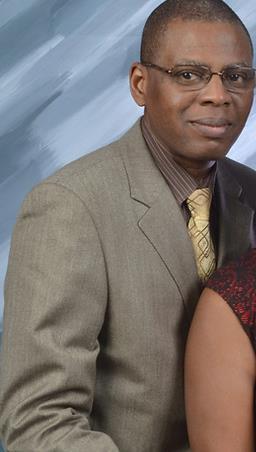
Midafternoon in Chicago, quarter past seven. Sitting at a small desk in the softly lit master bedroom of the Johnson residence, a house on the south side, a teenage boy was curious about his dad’s migration story: his thought process, his experiences, his decisions.
Bomi Johnson, a thirteen year old African American scholar with great curiosity, asked his dad if he could interview him. Dressed like he just came from basketball practice, in a grey Nike shirt and black elite shorts. He was tired but insisted. “Dad can interview you it will only take a little bit,” he reminded him. He started to talk about his journey.
Searching for his best life, Johnson found that the hardest part for him was finding where this better life was. Fortunately, he already knew where he wanted to find his best self, this was in America. There was family in America that could help him settle down and find his way.
Providing for Johnson and his family, his cousin supported with money and shelter until they found their way. When he got his first job it was as an architect, designing buildings, and developing plans. This was not as big of a roll that he wanted to have, but it was sufficient for a 36 year old who could only understand basic english.
Johnson knew that when he migrated, language would be a challenge for him; he could not communicate with his co workers in the way that he wanted.
His solution to this problem was to listen more and talk less. He knew that if he listened to people speak more around him, that he would be able to pick up words and phrases that would help him become more efficient in his work.
This worked because after he did this, Johnson started to get more work done and got a more important role. He states, “…it was a big shock when I realized knowing little english could put me much farther behind.”
Johnson didn’t shy away from the better or worse experiences that he expected out of America. He quickly learned that if you want to get somewhere in life you have to come up with a plan and pave your own path; he expected to have a minor setback but wasn’t so worried at first.
Clearly, he was determined because every day he would go to the office and have the mindset of knowing he will be able to pick up these words. Having this mindset helped Johnson get better at english as well as at his job.
Johnson did not fear the challenges but rather saw them as a way to better himself. I often reflect on this when challenges are thrown at me; to see challenges as just another opportunity to better myself.
Johnson has always been about accountability when it comes to him and his family, relying on them to be there for him and for each other. Luckily, he was able to be accountable when he found out how America would give him better opportunities when it comes to education for his children and jobs for him and my mom.
He knew that the organization as well as the accountability was greater in the United States. Johnson knew that if he came to the United States the jobs would be more organized, meaning that there would be people all focused on their specific part of the tasks and job to have a greater amount of efficiency and a greater amount of work getting done.
Greater efficiency is better because you know that the work is getting done quicker but it is also good quality.
There could also not be better opportunities in the United States if it was not for greater organization. Johnson also admires the accountability that you are held to in the United States.
He knows that if a mistake is made in Nigeria by a fellow worker or anybody inside of the company, it will be able to be brushed under the rug, knowing people will not think much about it and will move pass it.
He thinks in the United States if a person makes a mistake inside of the company it will be brought to the light.
of life seemed to be a lot different than the way of life back in Nigeria.”
Johnson thought that inside of the United States that there was no help for him and his family society wise. He thought that in the Unites States he was on his own and he has to do everything by himself.
In Nigeria, he had house cleaners, drivers/chauffeurs, and more. He thought that none of this was in the United States for him and him and his family were here alone. Luckily, he already knew that moving away from his parents, he would have to become more independent and would have to start being more of a leader, making decisions for himself at this point.
often reflect on this trait when I am faced by any obstacle that is in the way of my path; I see obstacles as a way for me to become more of an independent person and as a way for me to have growth.
Throughout this interview, my father was very meaningful as he spoke about his past obstacles and his thought process while migrating.
began to fully take in his courage and to appreciate his great bravery. My father has gone through a lot and throughout his life he has still always stayed true to one of his major values taking opportunities where opportunities are given.
have always looked to my father as a guidance to my path, but now I have an even deeper understanding to this statement. The relationship between my father and I, allows us to share great memories of joy and laughter but also wisdom and guidance.
have the opportunity to share what have learned about migration and opportunity from my dad with others who may be looking to follow the same steps in coming times.
Learning from those who have gone through obstacles and made decisions that have had to be made, allows us to put into perspective if we are walking along the right path.
The Journey
African American, Abiodun Johnson migrates with his family from Nigeria to America.
BY BOMI JOHNSON
He knows that this will be addressed and the person who made the mistake will be held accountable but will still be encouraged to do better and not make this mistake again. Unlike in Nigeria. Stating, “…decided to migrate taking my children for better opportunities in the United States.” Johnson did not back down from this challenge knowing that there would be a big difference when he came to the United States from Nigeria.
He thought not knowing his way around that he would be lost for good amount of time. Knowing he would have to find a new job as well as his wife, alongside needing to find a new school for his kids them needing to be able to find new friends.
With all these challenges that he was thinking about inside the back of his mind, he did not back down and still went through with the idea of migrating because it would give his children chances at better life when they were grown up, has not been dissatisfied with his choice.
I often reflect on this mindset when thinking about making decisions; going through with them and realizing without accountability and organization, efficiency is not possible.
Johnson had always known that when he came to the United States the life would end up being significantly different for him and his family. Knowing that when he came to the United States, he would have to become more of an independent family man, he still chose to come over.
He thought that moving away from his own parents he would have to become a bigger person. Thought about this process and had to go through many things, such as telling his in laws that he was taking their daughter to another continent, filling out papers, and so many other things.
With all of the minor setbacks he never took is eye off of the prize because he knew what he wanted his end goal to be, and he was determined to achieve it.
When he came to the United States, as he expected, the life was way of living was much more different compared to the way of living that they were used to back in Nigeria. He says, “The way
I decided to migrate taking my children for better opportunities
in the United States.
Family First
By Mary Grace Junkins
Margaret Ann Brennan Harmon discusses what it was like growing up with a sister with Down Syndrome and how she never saw her as someone who was different or strange.
“My name is Margaret Ann Brennan Harmon… I grew up on the West Side of Chicago,” a family of eight in a one bedroom apartment. “It was wonderful,” as well as a sister with Down Syndrome, “I would kind of look out for her.”
I was interviewing Margaret Brennan Harmon, 80 year old women on October 11th, 2022, a crisp October day where the excitement was filling the room. We were in the guest bedroom of my Grandparents’ Garden Apartment, waiting for the interview to begin.
Margaret has faced multiple obstacles in her life, but she always saw having a sister with Down Syndrome as a blessing.
Margaret saw losing half of her siblings due to sickness and both of her parents, Kathleen, and Richard, due to old age but never having a sister with a disability. She always made sure Kathleen was cared for and always put Kathleen before herself.
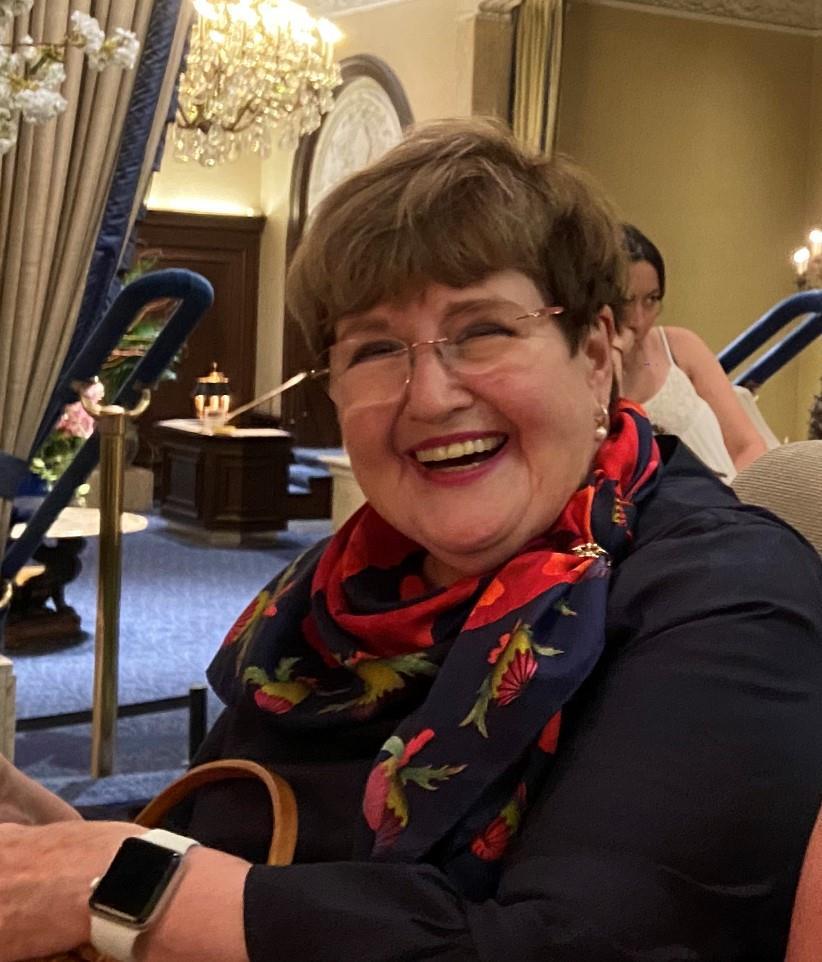
“When she was first born, the doctors told my mother and father, aw she will never amount to anything… your best bet is to put her in a home… the children will be embarrassed to have someone like this in your home… My mother and father thought that was appalling. She was the light of their lives.”
Margaret and her family always took care of Kathleen even though it was hard. They always saw to it that Kathleen received the treatment and teachings she needed and was loved endlessly.
Margaret Harmon has faced multiple challenges in her life but living with a sister with Down Syndrome was one of her greatest. Her sister’s name was Kathleen Brennan, and she was a wonderful person but suffered from a disability called Down Syndrome, so she did not develop like others. This was hard on Margaret’s family.
Her parents were both immigrants from County Mayo, Ireland. She had five other siblings, Richard, Kathleen, herself, Eileen, Michael, and Maureen, and lived in a two bedroom apartment on Polk Street. They were not a wealthy family, so having a member with health and development problems was a big challenge. Even though this was hard on Margaret and her family, she was always optimistic and loved Kathleen for who she was. She always made sure Kathleen was cared for and loved in every way possible. She describes that, “Kathleen was a special child. She was born with Down Syndrome which made her very challenged in many ways but very loveable in every way.”
Margaret always finds the good in challenging situations and always loved and will always love Kathleen even though she was compromised. Margaret loves and accepts anyone and will love them endlessly, she will look past the bad to only see the good. Margaret has taught me to love and accept everybody in my life and I will continue to teach that lesson to my loved ones.
Margaret has learned to find the lesson in any situation. Living with Kathleen was a great challenge, but she always has been able to find the moral and lesson of experiences like the ones she lived through including this one. She has consistently been able to help people by finding what to learn from situations and applies it to her own life. If she were faced with the world ending and it was all up to her to save it, she would find a lesson within and discover what the situation is meant to teach her.
Living with a sister with down syndrome has taught her that, “When you see how someone struggles to learn anything and that life becomes a challenge, it makes you very aware of trying to make other people feel comfortable.”
Margaret always finds a way to help people no matter the circumstance. She took a challenging situation about having a sister with Down Syndrome and learned an important lesson that was hidden inside of it. She found a way to help people when she did not have to. Margaret always wants to help people and find what she can learn. If you see someone in the real world struggling to even find a meal on a frigid winter day, do not assume the worst about them and help them find a meal and a shelter so you can leave a good mark on their life.
That is what Margaret has taught me to do all my life. Margaret learned to look past the bad to only see the good in tough situations and she is now teaching me to live life in her footsteps so I can live a happy life that she is continuing to live today.
Margaret never thought Kathleen was someone who needed help or was not good enough for this world. She thought the opposite; she always saw Kathleen as someone who was too good for this world, and we did not understand the meaning of what it was to be a part of her life.
She was always so kind and thoughtful towards Kathleen because she thought the limits society placed on her and other people with disabilities did not bring out the best in her and other people like her. She always knew that Kathleen deserved something more. Something great. A title different from the one she had. People who have/had Down Syndrome and other disabilities have been looked at like they were not good enough and were weird about it when Margaret never thought of it that way.
Before having friends over, she would say, “You know I want to explain, my sister Kathleen… is really like an angel.”
Margaret never saw Kathleen and someone who needed help; she saw her as someone who was too special for this world. She deserved to be seen as a real person. Not as someone who was weird or strange. Margaret saw people with special needs as someone who was too good for this world and way of life. She adapted to having someone like that living in the same household as her. My grandma has been teaching me this my whole and this is a particularly important lesson that everyone should adapt into their lives.
My grandma, Margaret Brennan Harmon, has always and will always love Kathleen for who she is and is incredibly grateful to have had her in her life. Kathleen taught her multiple lessons that are important to channel to your life. The way my grandma talks about Kathleen shows how much she loves and appreciates her for all that she has done for the world. Especially her family.
I appreciate my grandmother for loving her family, and people everywhere no matter what they looked like, or if they were different that what society has labeled normal. I appreciate her for all that she has taught me and always being there for me. She is my role model and will continue to be throughout my life.
I know Kathleen is up there in heaven somewhere and I want to give her a thank you as well. The best things in life are the most unexpected and Kathleen was the perfect example of that, and my grandma knew that from the start.
My grandmother is teaching me so many lessons each day with her actions, but I think the most important thing that she has taught me to love everybody no matter if they are different and hold them in your heart forever.
“When you see how someone struggles to learn anything and that life becomes a challenge, it makes you very aware of trying to make other people feel comfortable.”
Advocacy
The Māori are fighting against what was done to them in the past. Over the course of history, they were stolen from. Caroline Keenan, who is Māori, and many others are fighting back against this. In the past she has gone to multiple protests. The protests aim to return artifacts and land and utilize many methods such as occupying the land. In an unjust world, equality must be fought for. The protests aim to peacefully find a solution.
signed, creating the modern nation of New Zealand. This treaty was signed by the Māori chiefs; however, they did not know English, therefor did not know what they were signing, resulting in them being duped and land being stolen. This wrongful taking of land, and especially important land is what the Māori activism movement intends to fix. The often involve occupying the land; which the protests aim for to be returned or for a compromise.
them, not just monetarily, but in addition, spiritually. Within the interview Keenan says the artifacts are almost like family to her. The artifacts have not just monetary, but spiritual value to the Māori people are another reason as to why the artifacts should be returned.
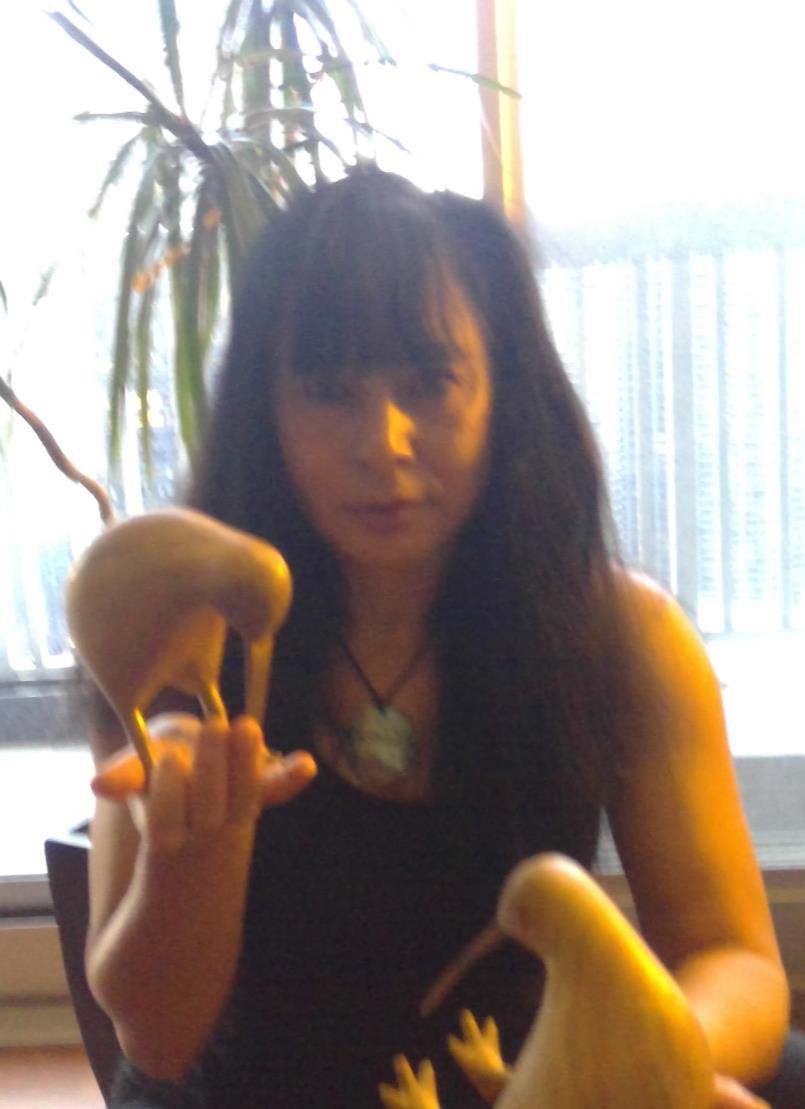 By Kix Keenan
By Kix Keenan
“The Maori youth are uprisi ng again st what was done to their ances tors”
Keen an herself has participated in protests against the wrongful taking of land. Her activism began at an early age and with her Māori mother one notable occurrence was Keenan protesting at Moutoa Gardens with her mother. Keenan went to the protests, the protests aimed to return the land, and were mostly peaceful.
She describes her experience as “I went with my mother to stand again what was happening [at Moutoa Gardens] because they wanted to redevelop the land, [when] really it should have been returned to the Māori people.”
Keenan protested against this wrongful taking, demanding along with others, for it to be, returned. These protests resulted in a compromise being reached where the Māori were allowed on the land.
Keen an is protesting against actions committed against her ancestors along with the Māori people. I appreciate her taking time out of her life to interview me on an interesting subject, throughout the interview she gave me new insight. By protesting, they are making a movement to right the wrongs of history. From this movement, you can interpret many things. One thing you can take away is that often, a peaceful solution can be found as opposed to a violent solution. Another takeaway is that nothing can change the fact that the wrongs of the past happened, but the wrongs of the past can be righted.
“The Māori youth are uprising against what was done to their ancestors” is how Caroline Keenan describes the Māori activism movement. To give some background, on February 6, 1840, the Treaty of Waitangi was
The movement aims to return stolen Māori artifacts. Caroline herself has argued for them to be returned. These include axes, pounamu, heads, and more. She says the artifacts are “Taupo or sacred and should be returned.”
To the Māori the artifacts are valuable to
“The wrong s of the past can be righte d”
Caroline Keenan, her involvement, and the Maori movement in general
Caroline Keenan protests as part of the Maori
Julie Latsko, a real estate agent, had to live during the horrible 9/11 tragedy in New York while she lived in Chicago. It was really hard for her to live in the second largest city with tall buildings. She was thankfully in Chicago when it happened, but it was still scary either way.
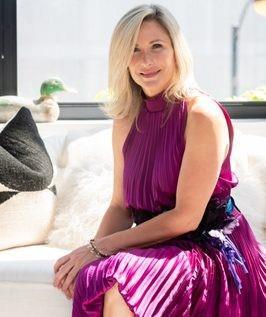
She was getting ready for work when 9/11 was happening. when she arrived at Neiman Marcus, where she worked at the time, people were sent home. When my mom arrived at her house in Chicago, she was watching tv about the tragedy and observing what else was going to happen after the Crashing of the Twin Towers in New York. Were the terrorists going to go destroy other places or was New York the only place they were supposed to damage?
9/11 also taught everyone a lesson. My mom says how 9/11 taught everyone a lesson, “I think it definitely caused people to come together and just everyone come together because it was a very uncertain time, especially within the hours of it happening in New York.” Thinking about how 9/11 made everyone come together whenever something serious or bad was going on and when everyone needed help Latsko tells everyone about it. Latsko will always remember what happened on that very scary and serious day. She also thinks that if another tragedy like 9/11 happened again then most people will try and come together and help everyone live through the hard time. 9/11 also changed how everyone thinks of people from the Middle East since Bin Laden (leader of the terrorists) was from the Middle East.
Facing The 9/11 Tragedy
Julie Latsko discusses facing one of the most tragic problems in the United State.
By: Loulou Latsko
It was Sunday October 9, 2022, a quiet and cold night, me, and my mom were sitting in the kitchen at the table. I was wearing sweatpants and a sweatshirt, and my mom was wearing a black sweater and pants. My mom has blonde/short hair, green eyes as green as the trees during the summer, and tall. I was interviewing her about the 9/11 tragedy and how it affected her for the rest of her life. While I was interviewing my mom for a school assignment, she was smiling and sitting upright in her chair ready for me to interview her about 9/11. My mom is a real estate agent and was able to take time out of her night to let me interview her about 9/11. By interviewing my mom, I was learning that the more you ask your family members or friends about anything the more you will know.
Julie Latsko also was very scared and didn’t know what was happening during 9/11 and really no one else knew what was going on either. Latsko thankfully didn’t have any friends or family in New York when it happened, so she didn’t have to worry about loved ones getting hurt or killed.
Since everyone was very unsure on what was happening, I don’t think anyone wanted to go anywhere they just wanted to stay in their homes safe and sound. My mom says, “It was scary, very scary, it was a time when something like that never happened, never had anything happen like that since, so everyone felt very unsettled, unsure.” In 9/11 just no one knew what was happening and what to do. Everyone were very scared and frightened by what had happened and if the terrorists were going to keep going to other places or just going to New York. Also, all the people that were in New York were definitely the most scared and confused because they were in the city that 9/11 was happening in.
People nowadays are probably still scared of what had happened especially if people are still alive from the 9/11 tragedy. Also, people might think that another terrorist attack is going to happen and keep going on the list of places they were supposed to hit. Latsko also experienced having to worry about if something like that was going to happen again and if its going to happen by where she lived.
My mom describes what 9/11 caused everyone to be, “It caused everyone to be afraid with this terrorist attack and I think figuring out it was a terrorist attack no one knew what was going to happen.” This is all saying that people were confused on what was happening and didn’t know what to do while it was happening and what to do after it happened and everyone was afraid on what was going to happen next, after the towers were gone. Also, its saying that everyone was trying to figure out what just happened and what was going to happen from then on. Last, it’s also showing people will always remember this day and what happened no matter what and will always be scared if it’s going to happen again or not.
Latsko shows what 9/11 caused everyone to act and be.
I appreciate how my mom was able to take time out of her day to let me interview her about the 9/11 tragedy. I learned a lot more about 9/11 that I didn’t know before by interviewing my mom about it.
If I was someone that wanted to learn more about something that happened, I would ask a family member or friend that either lived through it or knows a lot about what happened, then to learn more about 9/11 from google or a searching source. Something I would like to tell everyone is learning helps you understand more than you already know even if you think you know everything.
“9/11 caused everyone to come together and caused everyone to be cautious of what is going on around the world.”
Technology Through theAges
technology affects our day to day life.
As my grandma and I were talking, the smell of dinner being made upstairs filled our noses. But we stayed focused on the interview.
Comparing my school life with my grandma’s work life I can see how the use of technology was/is similar. Communication and organization are both a huge factor in being successful in school and in a work enviorment, and modern technology makes both of those components much easier.
Both my grandma and I were nervous at first, but this interview has taught me a lot about the ups, downs, and in betweens of technological advancement.
Paper was, and still is a huge part in the work enviorment Williamson has had a firsthand experience with the decline of paper and transition to primarily digital. At the start of Williamson’s work career, everything was paper. From communication to organization, there was no digital tools available.
Starting off in Williamson’s career, for every file and every bit of information she had was on paper. To keep track of all the files she had, Williamson says she must fax or scan them. But towards the end of her career, Williamson says it is so much easier to keep track of everything. Whereas before she had to search boxes of file folders, later in her work experience she could just pull something up on her computer in a few minutes, or even a few seconds.
The decline in paper also goes hand in hand with how communication has developed. Before there was no way to immediately communicate with someone or send a direct text and/or email that got to them receiving person in seconds. There were letters, which usually took about a week to deliver, or your coworker could tell you whatever they had to say the next day. These options were both very inefficient compared to the ways we communicate now. Take messages and email; with just a click of a button it arrives immediately to the person you are sending it too. But before these technological advancements, Williamson, and other people in a work setting had to wait a while to deliver a message.
Williamson says, “I used to buy boxes of reems of paper…the last time I bought a case of paper was probably fifteen years ago and I still have two reems left,” the use of paper for Williamson has greatly declined. At the beginning of her work career a case of paper may have lasted a couple of months, or even less. But now Williamson still has two reems left of the last case of paper she bought fifteen years ago.
To me this a crazy transition, but I can also see how it reflects my school life and even personal life. I can remember in second grade we did not have iPads to do our work on. Everything was paper. but now, in eighth grade everything is digital. I use my surface for almost everything. You may think that’s because we got older and are more responsible for our devices, but that’s only part of it. My sister, who is now in second grade, has a school iPad. I did not get an iPad to take home until fifth grade.
handwriting, as well as using dictionaries and encyclopedias are being lost in the newer generations.
Though there are some negatives in the decline of paper, my grandma says she would never go back to the way it was before. The digital world has made things easier and less stressful for all of us.
Williamson says the technological advancement that she was, and still is experiencing is helpful, but in some cases, it has gone a little bit too far.
Because of the advancement in communication, it is super easy to send a message or call someone that you work with, or just anyone in general. But for Williamson, she says it can be stressful for people to have the ability to call or message her at any time. She says that you can’t control if people call you at two or three in the morning and wake you up, just to discuss something about work when you should be sleeping.
Because of phones and computers, Williamson mentions that people expect you to be available 24/7 and it can be overwhelming. Because of the modern technology, it sometimes feels like her work life never leaves her personal life alone.
Williamson states her opinion when she says, “I think the pendulum has swung a little bit too far. In that, because of the technological tools we now have customers, and sometimes the company expects you to be available 24/7,” we sometimes only look at the positives in how technology has advanced from a general point of view, but for someone who has experienced working in a work enviorment without the modern technology we have today, we can look further into how jobs can be stressful with the current technology.
While obviously modern technology is much more useful and easier to work with than it ever was before, it still has some negative aspects.
The analogy that my grandma used that I like a lot is comparing technology to a pendulum. She says that it has swung a little too far. I interpret her words in that some people may take advantage of the technology they have access to and use it against other people. There are many ways that people can do this, but in a work enviorment if someone calls you super late in the middle of the night and you don’t answer, you might be blamed the next day you go to the office. But you aren’t required to take that call. After work hours, you should be able to relax, not worry about even more calls that you get from the office or other coworkers.
For me, it would be a lot of pressure and stress if I got calls in the middle of the night relating to my job, even though I completed my shift and shouldn’t have to worry about those problems. Before there were phones and computers, there was no way to contact your co worker and/or boss, and once you left work you didn’t have to worry about your job till the next day.
When Williamson and I were covering the topic of vaccines, she mentioned the COVID 19 vaccine. Pre COVID, the most common vaccine that scientists would work on would be vaccines for animals to keep our food safe and free of harmful bacteria. But when COVID hit, most of the focus was obviously on the vaccine for COVID. The vaccine came out almost a year after the virus hit hard in the United States. This was incredible given scientists knew little about COVID when it first started to be a global issue. But Williamson says it is because of the technology we have today. She says that if COVID would have hit a few decades ago, or possibly even more recent, it would have taken much longer to make a vaccine safe for humans.
The technology we have today has helped us so much. Williamson says, “It’s just phenomenal the tools that we have at our fingertips,” for someone like a 13 year old such as myself, we have had most of this modern technology all our lives. But for someone like my grandma, she has been able to experience the transition from rarely using technology for her job, to having her job revolve around technology.
By Lucy Lippert
It was October 9, 2022. I was sitting with my grandma in the basement. The lighting was dark as night was approaching.
We were both nervous to get the interview started; my hands were fidgeting, and my grandma was rolling the beads of her bracelets in between her fingers. But once the recording started my grandma’s face relaxed and my hands settled as there was plenty to say.
Kathleen Williamson is from Milwaukee, Wisconsin and was in medical sales dealing with technology a lot during her work career. As we were talking about how technology has changed over time in her experience working, I learned a lot and realized truly how much
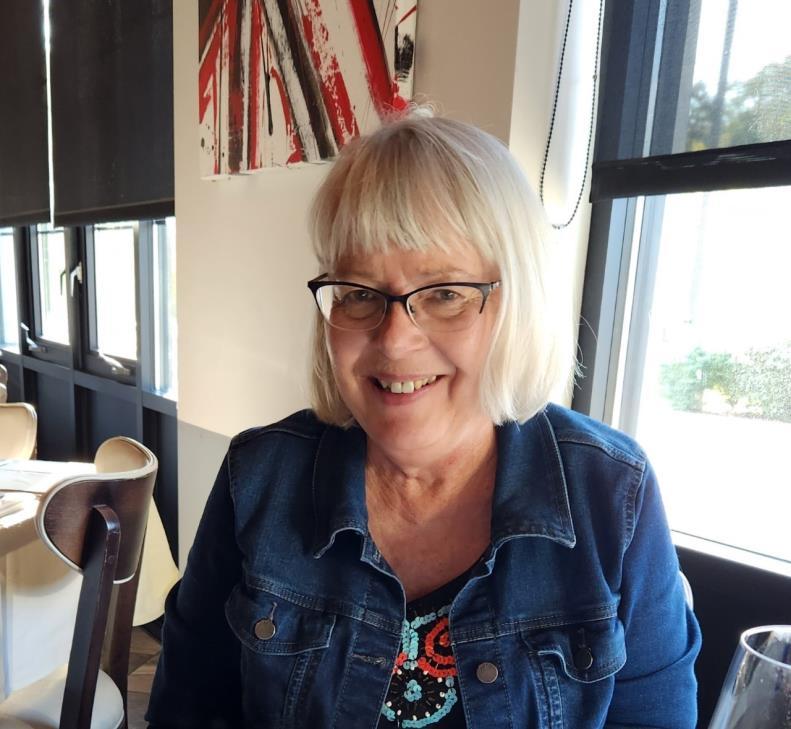
To me, this shows the appearance of digital tools is increasing greatly. But we are only talking about how the decline in paper has affected work and school life, how does it affect our social life, or even our enviorment?
As we know, paper is made from trees. Millions of trees were, and currently are getting cut down to make into paper. But because of rise of use in modern technology, trees aren’t getting cut down for paper as much as in previous years . Paper is not as high in demand as it was a few years ago, hopefully saving more and more trees, and a step in the right direction for the enviorment. My grandma agrees when I say that rise in digital tools is positive for most of the people living on Earth, but also for our natural world.
But we have only talked about the positives of decline in paper. Like every topic there are still some negatives to cover. Basic skills such as writing without spellcheck, formatting a letter,
The pendulum might have swung to far in the sense that people are taking advantage of modern technology, but my grandma believes that at some point it will even out, and the pendulum will be in the middle again.
Imagine in school if you had a question and/or problem with the homework but had no way to contact you teacher. I couldn’t imagine a world without direct communication.
Williamson believes the technology we have acquired is greater than ever before, and all of it is at our fingertips.
Because Williamson works in sales for medical supplies, she needs to monitor what people buy and how people use the product. Before all the information was on paper. Now, she can access every customer’s activity through a website. Williamson said that she can see everything a customer looks at, and even how long they look at that specific product. It is helpful to learn what products the customer takes most interest in, but also helpful in recommending similar products for similar use.
To me what my grandma has said makes me wonder, if it all were to go away, what would we do?
Almost everyone on Earth has and/or is using technology in some sort of way to make some sort of task easier, whether it is communicating, organization, or something else, we can almost all agree that technology has been useful to us in some sort of way. But what if it all went away? We have all these tools accessible to us and we are so used to using them all the time that if they went away right now, I think our world would go into chaos.
We barely think about the technology we use on a day to day basis, but it is probably a bigger part of your life than you realize, and technological advancement has gone so far in helping us humans.
Throughout the interview with my grandma, I have noticed how the technology we are so used to today can have a huge impact on our work life and personal life.
My grandma has lived through the transition from using non digital tools to primarily using digital tools for daily tasks. Through what my grandma has said, I have fully realized and appreciated the technology we have today. Hearing my grandma speak about how work was like many years ago has opened a new realization for me. Essentials we need in our day to day life such as communication and organization were not as easy without the technology we have today.
Listening to my grandma about how the technology has advanced and shifted has made me grateful for this thing use everyday without thinking twice. I realize sometimes take the technology we have access to for granted. But, like everything in life, there are some negative aspects to the change in technology. Change in the things that we use everyday can lead to positive, but also negative consequences in our lives.
grandma reflects on how technology has changed and shifted from the beginning of her work career to the end
My
“It’s just phenomenal the tools that we have at our fingertips.”
Life Againist a Virus
The story of Leonard Marchese’s experience against COVID 19
By: Lenny Marchese
It was January 20th, 2020, where there was breaking news on a new global pandemic, COVID 19, Leonard Marchese did not expect any sort of life changing challenge like this to happen. His life flashed before his eyes; it was like Ebola all over again. He knew he could overcome it but did not know what to expect. This virus would make his life two times more challenging. In a world with no mercy, which could throw anything at anyone, people often get caught off guard, and this new virus, COVID 19, was the perfect example of that.
COVID-19 was just like any other virus, but this time COVID was stronger and more deadly than any other virus that ever existed. Marchese when he heard this was shocked and was caught off guard, and did not know what to do, he
Marchese’s son, Lenny had to do online school for the entire year, and same with Marchese had to do his business online working for hours completing his work every day, but sometimes did not get any done, because it was challenging to balance life, and work trying to keep his family safe.
2 months later it was March 15th, 2020, there was new breaking news on the COVID19 pandemic, that the whole country of the United States went into lockdown, Marchese at first was confused on what this meant, but then understood what the lockdown meant, it meant everybody living in the United States, had to stay inside. Marchese knew this would change the whole look of things not only on his work, but also his family, this lockdown would cause his son to miss a year of hockey, and cause most of the businesses to shut down, but gave the opportunities for some businesses to grow like Zoom. He states, “It was something that set us off guard, a lot of businesses were set back by it, and to some extent some businesses profited by it, because it really opened a lot of opportunities as much as it created sickness, death, confusion, and disagreement.”
Marchese explains that COVID caused some negatives and positives at the same time, even though there were some businesses growing, due to the new opportunities, but it also opened opportunities for sickness, death, confusion, and disagreement.
Marchese was not sure if this pandemic were going to end, he was worried for his family, job, and health, but did know each day COVID would get stronger and stronger, but at the same time a new normal evolved
each day, and Marchese would get a better understanding on the pandemic and COVID. He describes, “What is it going to be like when it’s over, it wasn’t going to go back to normal, it would be a new normal, and I think the new normal evolved every day as we tried to adjust to it.”
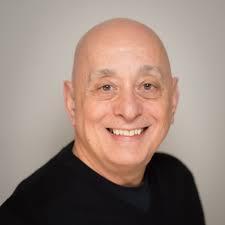
Marchese would try his best to fight against COVID even though he had to go through tough challenges and obstacles, he would fight his way through them. Marchese would make sure his work was done, his family was safe, and that COVID would not cause any problems. Marchese understood that some people did not believe in COVID, but it made him angry that people did not care and would not take the time to be safe, to not get other people sick, and not getting vaccinated, or at least putting on a mask to keep themselves, and other people safe just in case. Getting a vaccine or putting on a mask would not waste that much time, and cause COVID rates to go down, and less people to die. Marchese understood that some people did not want to get vaccinated because of the needle, and some faiths do not want a needle injected into your body.

that this virus was going to take a downfall, and make things back to normal, which it did, but COVID is still around infecting people, but now people barley here it on the news anymore and can see the COVID rates have dropped a ton.
Marchese saw that every day there would be a change in the rates of COVID, if it went down or up, but people were evolving to this virus each day, Marchese could tell with his own eyes. He states, “The more we got used to it and tried to adjust to it, the more normal each day felt.” Marchese knew
Throughout the time interviewing my dad, Leonard Marchese, was a very descriptive, insightful, and honest person. He spoke on his past experiences of COVID, and how COVID still affects him to this day. When I realized how much my dad was going through each day, I decided to help him out more to make his day less stressful. My dad has not only seen a lot in his life, but has experienced a lot, and appreciating every moment he gets to live, even though it might have its challenges. I have always loved my dad and have looked up to him as a role model for me to determined, kind, patience, and collaborative. In this interview, I could clearly see how much time and effort he put into this, showing his patience for me to be able to ask him questions, and use this information he gathered for me to put in this journalism. The pandemic gave my dad and I, a good opportunity to bond; we a stronger relationship together; it allowed us to be happier and more understanding together. Hearing from people with a better understanding, allows us to appreciate their mindfulness, and continue to make a difference in the future.
“The more we got used to it and tried to adjust to it, the more normal each day felt.”
tried the best he could to keep his family safe.
Leonard Marchese
Football Prodigy and Academic Scholar
One reason that football beneficially impacted Metzcus was that it gave him the ability to go to an amazing college. From a young age, Metzcus’s family was very poor. They knew that they may not have enough money to send Metzcus to college. All this changed when Metzcus started playing football. Practicing very often, Metzcus eventually got great at the game but still did not know where he was going to go to college. Even if he got in, his family did not know how they would pay for it.
Time was closing in. It was only a day before college was supposed to start when Metzcus’s dad decided to go behind his back and set up an interview with the football coach at Northern Illinois University. It turned out that the football coach and his dad had been working together for some time now. At the interview, Metzcus’s dad showed the coach a video of his son playing football. The coach was impressed but still did not know if he could give him the scholarship, after all, school started the next day.
While he thought about the decision, the Northern Illinois University football coach gave Metzcus a room in a farmer’s basement that he shared with eight others for one dollar a night. Soon, Metzcus was informed that he had gotten the scholarship; however, it was at a cost. While attending Northern Illinois University, Metzcus’s job was to tutor other players while being a part of the team himself, and still having to do well in classes. Metzcus was able to balance this. In fact, he was an overachieving student.
When asked if football had any negative affect on his learning in college, Metzcus states, “I do not think [football] had any other negative affect on me… normally at Northern Illinois a doctorate on education took from 4 5 years and I finished my doctorate in 3 years.”
Due to Metzcus’s dedication to football, he had many opportunities that he would not have any other way. After all, the only reason that he got to go to a college with amazing people, open opportunities, and extraordinary experiences was because of the game. For Metzcus, football is not just a game, without it, he would not have achieved all his amazing accomplishments.
I always thought that if you are so serious about a sport, you may have to be mainly committed to just that. Metzcus’s story proves that football can be a gateway to many opportunities and can create various advantages.
By: Aidan Murphy
“Hello, so great to see you, Aidan!” my grandpa said with extreme excitement.
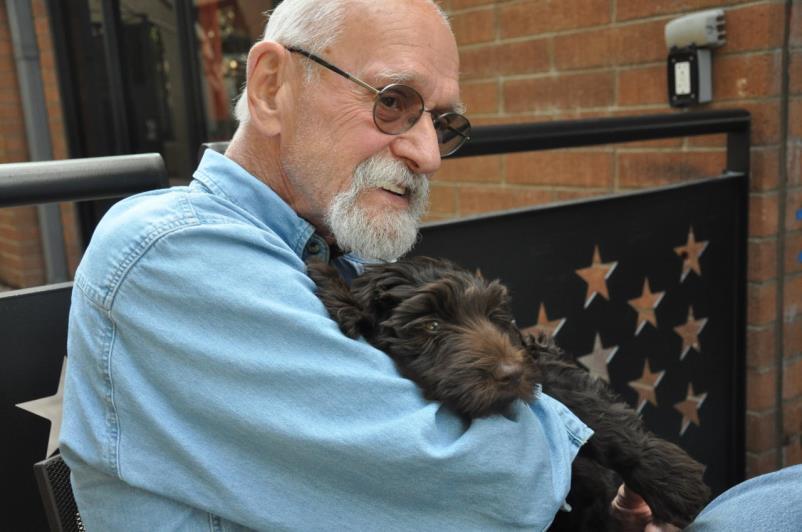
It had been a rough morning. Our family had woken up to an abrupt message that stated our flight had been delayed by nine hours. At that point, the realization set in that we were not going to be in Chicago until very late at night, when I had to attend school the next day. More importantly, I would not be able to do the investigative journalism interview of my grandpa that was due in less than a day. Despite my worry, I had woken up, brushed my teeth, packed up in a rush, and hurried out the door of our Marriot hotel in Los Ang eles California. I was hoping that somehow, I would get my interview done despite being over 2000 miles away from my home.
It took a long ride to the airport and typical Las Angeles traffic for us to arrive at LAX in over an hour. We waited in a lounge, and I started brainstorming ways I could get the interview done. I had my mom email my grandpa to ask if he would be able to start my interview now. He responded with a time: 30 minutes.
While I waited, I grabbed a drink and started brainstorming questions to ask my grandpa. Half an hour later, it was set, I hopped on a Zoom call and started the interview. My grandpa said, “Hello, so great to see you, Aidan!” my grandpa, Richard Metzcus, said, despite the chaos and extreme short notice.
Despite being an 83 year old man, he is always enthusiastic. Wearing his cloudy white hair back in a bun and his iconic red and black flannel shirt, my grandpa never fails to put a smile on my face.
Growing up poor, Metzcus did not have a lot of resources, but he loved to play football. Eventually, he got into Northern Illinois University on a football scholarship and maintained great grades. As an adult, Metzcus was a professor, first at the University of Notre Dame, and then at Indiana University. Having many jobs growing up, such as delivering papers, being a painter, and working in steel mills, Metzcus learned commitment from a very young age. One of the biggest ways he learned commitment and dedication was through football, which gave him many opportunities that he would not have overwise had. Football led Metzcus to be the exact person he is today. Now living in Beverly Shores, Indiana, here is Metzcus’s opinion on football.
Apart from academically, football beneficially impacted Metzcus by teaching him many valuable lessons in his everyday life. The most prominent one being about teamwork.
Metzcus says, “Football told me about teamwork, it told me that you are not the only person trying to win the game. Everybody is trying to win the game and if you do your job and you do it the right way, that is the best thing you can do for the team.”
If Metzcus started something, he was not going to give up on it unless he had to because of his sheer commitment. In fact, in one football game he was playing against Central Michigan, his job was to tackle the halfback who was protecting the quarterback. This halfback had a cast on his arm and each time Metzcus would try to tackle him, Metzcus would get hit very hard right in the head with the cast. Determined to sack the quarterback, Metzcus did not give up; he was taking tremendously painful hits to multiple parts of his body without ever calling for a timeout or needing breaks.
Throughout the game, Metzcus played through pain, demeaning comments from fans and players, and the rancid smell of sweat. His body could only take so many of those hits. Right before halftime, Metzcus ran to the quarterback, lifted him above his head, and ran him all the way to their endzone. This would have been an illegal play, but surprisingly, he did not get penalized. Right after, he came back to the other team’s huddle and started listening. When they asked why he was there, he said he was trying to figure out the next play.
At the time, no one could figure out why he was acting this way, and by the time halftime rolled around, things got crazier. A ball rolled to Metzcus and when he was about the pick it up, a coach had the same intention. He punched the coach in the mouth to get the ball for absolutely no reason.
Losing a whole week of memory, the next thing he knew he was practicing field goals at Northern Illinois University. It turns out, he was concussed after getting hit in the head countless times. Five years ago, he took an MRI scan that showed he had a black spot in his brain.
Metzcus says, “I was a very aggressive football player. I had a job to do, and no one was going to stop me from doing that job.” Even though Metzcus got hit so hard and it was super painful, he never gave up, because he wanted his team to be successful. Being a selfless player, Metzcus was willing to sacrifice his comfort for the progress of his team; this mentality often leads to success.
You may often hear a phrase like “teamwork is the key to success.” It is easy to overlook this statement, and you may even think it is corny. However, it is true and even the greatest, strongest, toughest, and smartest players believe it.
Do not take it from me, take it from a great college football player who got scouted by the NFL. Football is like a puzzle; everyone needs to do their job for the picture to be complete, if one person slacks off, the team cannot have success. Fortunately, Metzcus was never that player.
have always heard from my parents that football is too violent, and should never play it. This turns my perspective around and shows that it is not just some violent game, it can teach valuable life lessons and provide rich experiences that can last a lifetime.
One final way that football beneficially impacted Metzcus was socially. As previously stated, Metzcus grew up in a poor family. He may have had some great friends throughout his childhood, but then, Metzcus started playing football. This may have separated him from some of his friends or even made him closer to different ones. However, when Metzcus went to this big fancy college for free, chances are he lost some of those companions. Luckily, when he went to college, he made many amazing friends on the football team. They were all unique. They had different races, backgrounds, and countless stories to tell.
Metzcus says, “Socially, [football] was wonderful for me. I got to meet a lot of different guys, a lot of different kinds of guys…so I had all these neat relationships with guys I would have never met any other way.”
Friendships and relationships are one of the most important aspects in life. If it were not for football, he may never have gotten to experience that aspect to its fullest. Football is great for diversity; Metzcus says that it was not uncommon to play football with an integrated team. In fact, most of the teams that he played against were composed of different races and ethnicities. Because of this, there were never any negative words exchanged or fights between teams regarding race, he says. Football, being a naturally aggressive game, comes with fights and name calling throughout the football match. But in his experience, the fights were never regarding race. All through football, Metzcus earned a great appreciation for many different cultures and may have even gotten to learn more about them.
Even though Metzcus grew up in a poor family, he always believed that if he worked hard, it would pay off. Despite this sounding cliché, Metzcus stayed true to that belief and look where it got him: he ended up going to an extraordinary college, excelling in a very physical sport, and was even a professor at two excellent colleges, the University of Notre Dame, and Indiana University.
My grandpa is the smartest person I know; he is also extremely kind, loving, and committed. Turning nothing into something, Metzcus gained a strong passion for football and was the first Academic All American at Northern Illinois University.
Even though he suffered injuries through the sport, Metzcus says, “I’d still play.” Nothing, even injuries can possibly outweigh the lifelong positive effects of football for him.
I have always thought of my grandpa as a very smart person, now I know a lot more about why. It was not just that fact that he was naturally great at football so he got to go to some fancy college. He put in the work years ago to rise from being less fortunate, which lead him to be the exact person he is today.
My grandpa is one of my favorite relatives. That feeling has nothing but grown since this interview. I will try to keep his values in my life, as well as share them with others. Metzcus is living proof that if you follow your dreams and stay true to your values, you will not have regrets because you are doing what you love.
The story of how one man rose from modest beginnings to excel on and off the football field.
“I was a very aggressive football player. I had a job to do, and no one was going to stop me from doing that job.”
Cancer Will Not Take Everything Away
The story of a childhood cancer survivor
by: Megan Myers
Have you ever thought about what it would be like to have cancer at an early age? Unfortunately, Abby Skarbek, my cousin, found out the hard way.
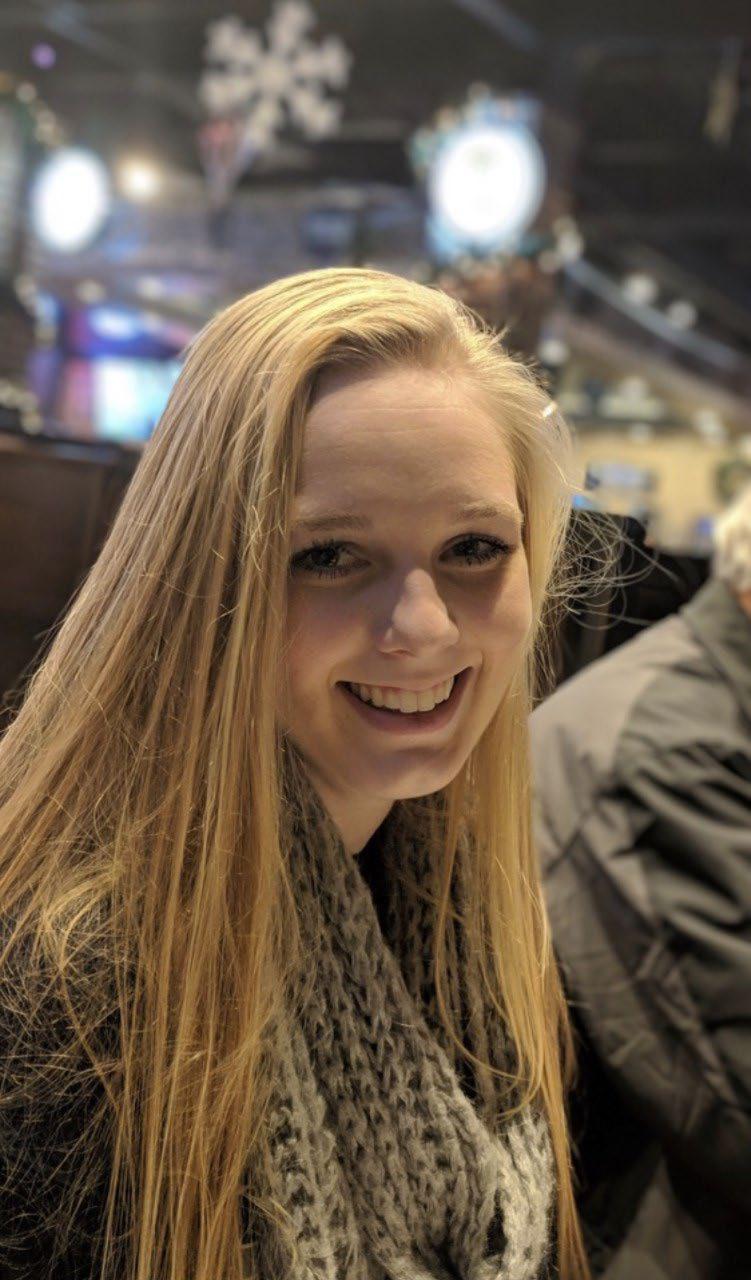
On a sizzling summer day, she went to the movie theater to see Zookeeper and cool down with her grandma. After they got their popcorn and were waiting for the movie to begin, her grandma received a phone call telling them to come to the hospital, immediately. Once at the hospital, Abby’s parents, her aunt and uncle, and grandfather, all greeted her and introduced her to her new oncologist who proceeded to give Abby a stuffed animal he purchased for her.
Within 24 hours and after many medical tests, Abby was diagnosed with Acute Myeloid Leukemia (A.M.L.), the most aggressive form of blood cancer.
Abby faced many challenges while having A.M.L., but what made it even more difficult was that she was only 10 years old. Luckily, Skarbek did not fully comprehend what she was diagnosed with because she was too young to fully understand. She shared that a lot of times, she would wonder why she of all people had to go through this horrible expierence.
When she was diagnosed, all she was really concerned with was if she would be able to go on the planned family vacation the following week and was devastated when she was unable to. It was also incredibly hard for her to watch all her friends live their life, and as an athletic kid, she just wanted to be able to play sports again. Although she was still young and naïve and did not understand the gravity of the situation, she was still greatly impacted by this expierence.
She described, “When the doctor tells you that you have cancer, you tune everything out, you are like stuck in space, and everything is numb. You feel like you are stuck in cement. The world feels like it is crumbling around you and there is nothing you can do to stop it.”
Skarbek was able to fight through the cancer, but she still says it was the hardest expierence she has ever had to go through. We can see how this affected Skarbek and how her life has changed because of it. As someone who has never expierenced something like this, I can’t even imagine what it would be like especially, at the age of 10.
This experience took away a lot from Skarbek’s childhood; this is something she will never get back which is still something she thinks about. She reflects that she took being a kid for granted as she recently celebrated her 21st birthday. The many months she spent in the hospital took a large toll on her as she missed a lot of school and had a large ammount of tests and assignments to catch up on to pass 4th grade. To catch up on the work, her mom who is also a teacher, took a year off from work to homeschool to her.
“I had to grow up a lot earlier than I was supposed to… it was hard because I just wanted to be a kid and I couldn’t.”
Skarbek explained, “I had to grow up a lot earlier than I was supposed to… it was hard because I just wanted to be a kid and I couldn’t.”
Celebrating an 11th birthday in the hospital is a big deal to a kid Having cancer greatly affected Skarbek’s birthday and holiday celebrations. This is not necessarily something we think about when we hear about a child having cancer, but it is a tremendous change from most kids expierences. A lot of kids just want to grow up and act older, but Skarbek just wanted to be a kid, and she did not have a lot of opportunities to do this.
Even after everything she has been through, Skarbek continues to be a positive person; along with the numerous negatives she went through, she always tried to find the positives.
Skarbek became incredibly close with her family who supported her through all her ups and downs. She says there was never a moment when she was alone in the hospital, and she was surrounded by nothing but love. Skarbek created some incredibly strong bonds with many of the nurses and other patients who she still keeps in touch with. She was eligible for Make-a-Wish Foundation and was able to meet Justin Bieber, which she still talks about over 10 years later.
Along with the positives, there were obviously still many negatives, it was incredibly hard to not be able to do the things she loves daily and watch her friends do what they love with their other friends. The chemotherapy was brutal on her body and caused her to have to shave her head. The pain she went through was incomparable and there are still possible side effects. Skarbek tells people her biggest fear in life is fish, but her biggest fear in life is really that her cancer will come back. There is also potential heart issues she may have to deal with and the potential for her to not be able to have children, which is hard, because Skarbek really values family.
She claims, “I took life in general for granted… if you have a difficult day, it seems like the end all be all, but you can always turn your day around.”
Skarbek has delt with so much, but she continues to be positive, she really values family and life in general, which I really look up to. After hearing her say this, I realize that I often let simple things ruin my day, but I have to step back and look at the bigger picture to realize how much more there is to life.
We can all learn from Abby’s story, because she has been through it all, yet she is such a positive and joyous person. I really look up to the person she is today, and how she always puts others before herself. I have learned from her that some things may seem like a big deal in the moment, but when you look at the bigger picture, it is only a small part of life that you will get through. One minute you could be out with your friends and be completely normal and the next day everything could completely change, we should all live our lives to the fullest and stress less about minor things.
A Glimpse to the Past Changes the Future
By Mickey O’Malley
Sitting in my plastic chair, it was 2:00 in the afternoon, the sun shining in my bedroom window, and I just needed to get my interview done. I called Nana, my grandma, and asked to interview her. She gave me details on when WWII started, how old she was, and other basic facts. After that, we began. At first, I thought I could get some quotes, some facts, and then be done. About 10 minutes in I really started to think about her experiences. She was so young when the war started. Being 13 years old myself, I don’t know if I could imagine living in a war.
Even though the war might be hard to talk about and to dig deeper into, educating the younger generation about hard topics will lead them to change the world for the better.
What is WWII like from a teen’s perspective in America? It was 1939, at the start of WWII, and Joan O’Malley was only 9 years old. By the end, in 1945, she was 14. In Illinois at the time, O’Malley lived with her parents and older sister. With the war approaching, her sister joined the air force as a nurse, helping those on the battlefield.
It was a complicated and heavy time, yet was full of uncertainty; being a kid, O’Malley did not know much about what was going on. O’Malley had been living a normal life, but suddenly food was rationed, and people had food stamps because of the war. Life was not that much different at the beginning, except for a lack food accessibility and the war looming over everyone’s heads.
O’Malley didn’t have any friends who talked about the war, and if they were affected, it didn’t show. She reflects on ignoring the events unfold around her. “Being in high school, how your so concerned about yourself, being teenagers, that you are so interested in your friends and what you are doing, you miss out on a lot of stuff that’s going on in the world.” O’Malley did not know exactly what was going on.
None of her friends said anything if their family was affected, because everyone just wanted to fit in. Nobody talked about what was occurring; at school, the topic was forgotten. This is relevant to the times we live in now because of the war going on in Ukraine. However, today we make sure to not forget. We will remember and learn from history.
So many aspects of history were not taught in the past. Only one perspective could be shown, or the topic not even taught at all. During WWII, everyone knew about Hitler and that countries were being taken over.
O’Malley and other young people didn’t really understand why the war was happening. She didn’t understand much about antisemitism, hate towards people of Jewish religion. Later, she realized how much of an impact the war made on the world.
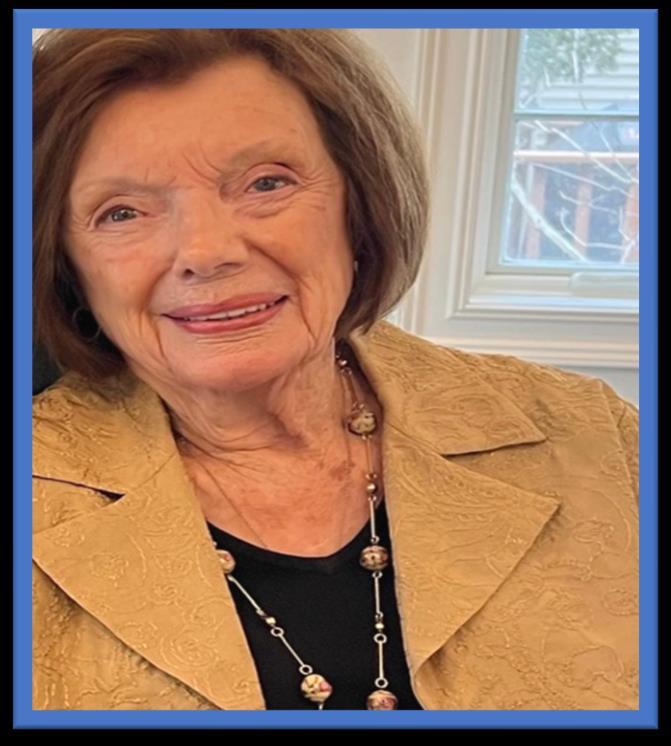
The school O’Malley attended did not give anyone any news about reasons behind the war; they just continued trying not to think about it. She says teaching history at school is one of the most important aspects of learning. “I think it’s a good thing that they talk about historical events like WWII, because it seems like these things are buried. They happen and then no one talks about it anymore.”
O’Malley realizes how important it is to talk about history, especially things that shaped the present day. It is important to
realize mistakes and make sure history never repeats itself. Teaching multiple perspectives, students have a better understanding of history. Schools do not just focus on one perspective because when we understand each other, we will understand how to prevent war and violence. I often reflect upon this because when conflict happens, I will remember and learn from the mistakes that are made.
During WWII everyone was scared. When people are scared, they can do hurtful things. Connecting the past to the future, O’Malley states, that during the war people would do anything to end the bloodshed and the darkness.
When Truman, the president at the time, gave the atomic bomb permission to be dropped, most people were glad the war was over. O’Malley remembers that she didn’t think about the effect the bomb had on Hiroshima and Nagasaki Japan. Looking back, she realizes what a big impact that made on those families and their loved ones. “Nuclear weapons can just wipe out nations. That kind of power is just frightening.” O’Malley now thinks back to the war and sees the effect it had on Japan. She knows how dangerous nuclear weapons can be and hopes that they are never used again. Learning from the past is important so that people realize how much of an impact the nuclear weapons can have. Learning this will change the future.
“History is so powerful, and we have to take the lessons and apply them to the world today.” History is full of lessons, but people must take the time to learn from it. My grandma has shown me many new ways to look at the world. She has seen a lot and experienced many things.
She gave me a new perspective in how I look at the world, developing my sense of awareness. Now I know that you cannot ignore things going on around you. When something is happening, it’s better to be aware than to just ignore and look on the bright side.
Ignoring history means that no one will ever learn from the past and the world will not evolve. When something is happening, get involved the best you can! Even if your deed is small, every little thing counts.
Teaching multiple perspectives, students have a better understanding of history
Informing young people about historical memory can make a big impact today!
Born Through the Heart
through supporting her child the whole way, grabbing any opportunities that would be beneficial to her.
By Edie Park
Jean Scott had wanted to adopt a child for years, ever since she worked in a newspaper collecting stories about families that adopted children. When she married in her early 40s, she and her husband began to seriously consider it. With the decision made, they began to venture into the tedious process. Scott started by attending a class called “The ABCs of Adoption”, in which she explored various adoption agencies, and their rules and qualifications. It also involved talking to counselors about her own “non negotiables”. After extensive consideration, she and her husband settled with an organization in China that would pick the match for them. By May 2004, Jean Scott was on the flight to Fuzhou, China, where her prospective 1 year old daughter was waiting. Although she was nervous when walking into the orphanage, the moment she and her chosen girl Lily met was absolutely magical. Mrs. Scott was “amazed, prepared for it all, [and] instantly connected with the baby.” Although at first baby Lily might have felt confused and upset, she gradually came to beat with the rhythm in her new environment.
adopted. However, that was not the case with Lily and her parents, who always encouraged their only child to explore her roots. This was what drove her to really track down her heritage. “My parents encouraged me to do what I want. I just wanted to go back and see my roots,” she said. So, a few years ago, she and her family traveled to China to do just that. With a few other adopted kids who also went with their parents to trace their ties, Lily visited personally significant places, such as the orphanage she came from and the police station steps where she was found. She admitted the trip was emotional because she was going back to where she came from. All in all, Lily reported having enjoyed the experience. “It was a real eye opener for her,” Mrs. Scott agreed. So much so that when she returned from the trip, she felt a strong urge to continue grasping her heritage. Lily felt she would best achieve this goal by majoring in international studies in college and learning to speak Chinese fluently also as a major. It is impressive how her parents once again encouraged her to just go forth and do what she needed to do, while Lily herself did that and found traces of her origin in China.
Sitting on a hard, white bench in my living room, I cheerfully but nervously greeted Jean Scott as she entered the zoom. As the minutes passed, I began to loosen up, thanks to Mrs. Scott’s openness and relaxed attitude. She drew me like a magnet into her life and intrigued me. By the end of it, I was confident and had all the information I needed. As I thanked Mrs. Scott for her time and closed the computer, my mind was racing with everything I had heard; the adoption process, sharing her experiences of adoption, traveling to China for her child to seek a firm identity. Her story is so admirable because of the way she showed her love
Over the years, Lily had told others of her being adopted so many times that it was not that big of a deal to her now. However, there were some instances where it is easier to talk about her adoption than others.
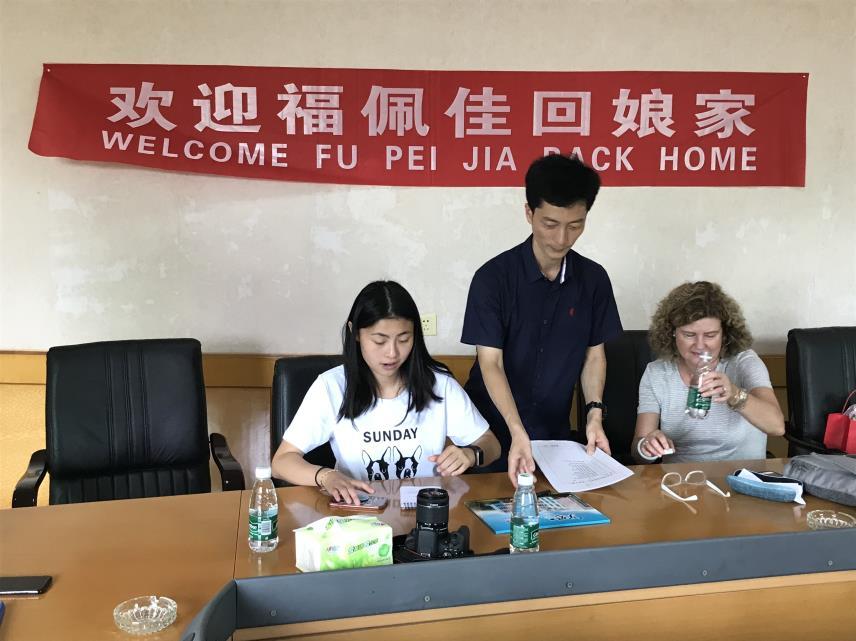
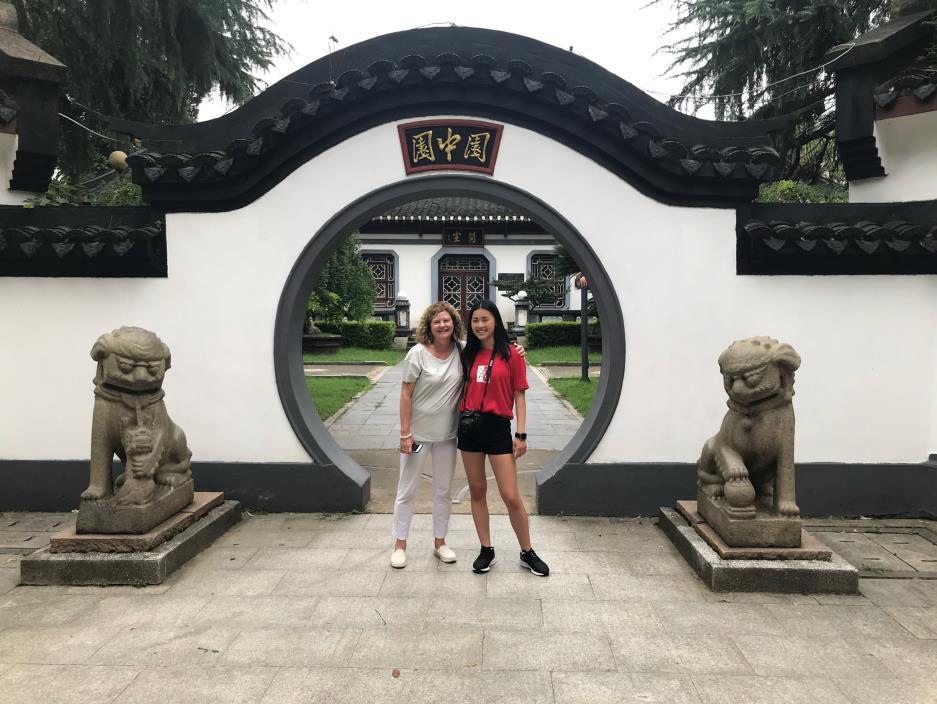
I really appreciated how Lily and her mother were very open about their journey. I have known them for over 6 years, but hearing their full story for the first time illuminated a new perspective of their lives for me, and made me reflect on the countless ways my own mom supports me in my endeavors. Despite the occasional challenges the Scott family faced externally, their strong circulating love prevailed.
In particular, she expressed her appreciation for those that genuinely cared about her story. Most people had been very respectful, but a few asked simply out of curiosity. Although these situations frustrated her, sharing her experiences has been an overall positive account. Another way she interacted with others on the basis of her adoption was through a group of friends of Lily's age that were all adopted from China. Lily easily fit in and sought common ground with other adopted children, without feeling any “different” among her support group. Rather, she connected with them in various ways. That feeling of belonging and acceptance among peers is so important, and thanks to her mother’s efforts, Lily thrived within the support group.
It was through these friends that Lily discovered that not everyone’s parents were open about telling their children they were
The story of an adopted girl grounding herself and her identity.
“My parents encouraged me to do what I want. I just wanted to go back and see my roots,”
Lily Scott and her mother in 2018 going through files about her adoption at the place she was adopted from.
The Life of a Student Athlete
challenge to balance athletics with academics but playing rugby was worth the obstacles he faced a student athlete.
How positively he spoke about his experience, really stuck with me. I found it very valuable to know that he struggled sometimes with the balance but always found the positives in any negative situation.
In college, Gary got into competitive powerlifting.
He did not expect powerlifting to take him anywhere, it was just something he did in his free time to stay in shape. But, because of his great performances, he got noticed by the head of the rugby team. The head of the rugby team encouraged Gary to try out for the team; Gary knew about rugby because of football and tried out.
After learning that he made the team he was very proud of himself. He started that same year as a scrum half. He compares the scrum-half position to the quarterback in football. This was a challenge at first to learn the rules of a totally new sport. For example, he said his hardest challenge was learning how to kick. Unlike American football, all positions can kick at any time in rugby. Overcoming this challenge taught him a lot of life lessons.
Rugby came with a lot of pros and cons as shown here in this quote “Obviously, it was very difficult traveling to away games and missing class.. But some of the best times were traveling as that’s when we bonded as a team.” This represents what rugby was like for Gary. For example, he made many friends, gained travel experiences , had fun, and learned many life lessons. But he also was stressed to miss class and had little free time. Despite the cons Gary views his entire rugby career as a plus.
He had to learn how to balance out academics with sports. Throughout his time in college, he had a tight schedule which was good and bad for him as he says here “Very Stressful some days; you’re tired and do not want to do it, whether it’s going to practice or going to class. This was not always the case, but some weeks were harder than others.” Even though some weeks were tough he views having a tight schedule as an advantage.
He thinks always knowing what you are going to do beforehand helped him make it through the weeks. He found the planning and structure of rugby helpful. I agree with this because I would rather have everything planned out versus having too much downtime to do tasks.
You may think that always missing class due to travel and practicing rugby would hurt your grades but according to Gary, it does the opposite. He says because of his schedule he had a set time for school and studying, sleeping, practicing, etc. Unlike most normal students who do not have a set schedule. He also needed passing grades to be eligible to play.
Also important to his success were his teammates as he says here “kept me focused, plus I had a lot of teammates I studied with and lived with. We kept each other accountable.” Gary believes playing a D1 sport actually gave him an advantage academically over the average student.
In this interview, Gary talked about many of his experiences, good and bad, he encountered throughout college. I thought that many of the effects of rugby would have had a negative effect in relation to his academics, but Gary always found a way to view even the struggles in a positive light. For example, I thought having a tight schedule would be a negative, but he saw it as a positive, knowing what he was going to do in advance. I think we should all view challenges like this: Even though there are challenges when balancing sports and academics, the positives outweigh the negatives.
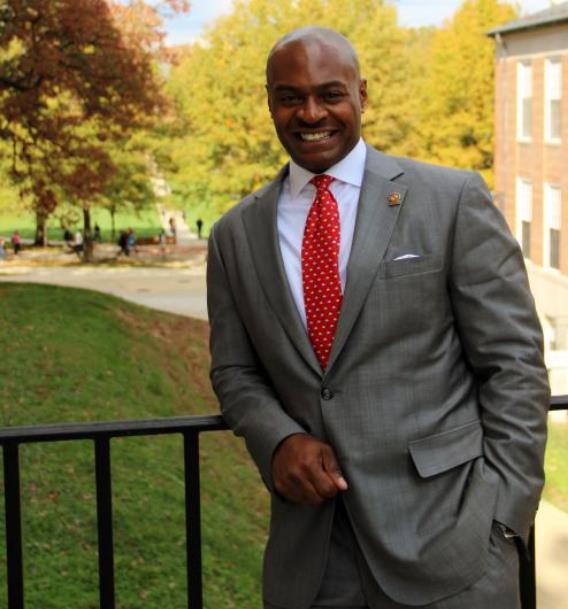 By Dominic
By Dominic
When I asked Gary Rozier, my dad, the first question he responded naturally and calmly, and he said that he joined the rugby team because of his powerlifting hobby. As the interview went on, I noticed that he only had positive things to say about playing rugby. It was a
Gary Rozier was very happy to have made the team and start as a walk on. However, this came with some challenges too. Rugby took a lot of time away from academics and free time.
Gary Rozier
“kept me focused, plus I had a lot of teammates that I studied with and lived with. We kept each other accountable.”
Rozier
Gary Rozier talks about life balancing out academics with sports in college.
The Bigger Picture of Bad Times
Yates of Talking About Her Perspective of 911
By Jaiden Shah
Photograph by Diane Shah
I sat on my desk, prepared to talk to my grandmother, Sue Yates, via Zoom, while she was at her computer.
Yates was born in in Flint, Michigan, November 19, 1949, and now lives in Traverse City, Michigan. At her desk in her house overlooking the lake, sitting up tall with a smile on her face and the sun streaming in the backround, with a perfect clear blue sky in the morning. Then, she began to talk.
Although she hated the topic of 911, Yates had her shoulders back in a relaxed manner. She hated thinking about the horrible time, but she knows that it is important to remember the past and learn from our mistakes. She talked smoothly and confidently about the topic she felt so terrible about. This was because she was empathetic for the people that were affected from 911, learned from the harsh time, and got through a tough time as she kept caring for and helping others. She now applies what she learned in her everyday life.
Yates was living in Alaska, working as a nurse, on September 11th ,
2001. Then suddenly, she heard on the news that a plane was flown into the Twin Towers in New York City. A feeling of shock flew through her body, and she felt like she just took a punch to the stomach.
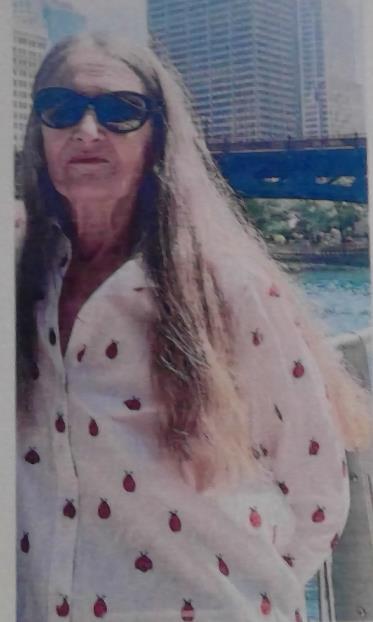
Yates also felt a strike of fear that this would lead to widespread fighting, threatening her son and daughter. Living in Alaska, she was far away from the Midwestern United States where her children were living, so she wanted to fly over and see them, but all flights were grounded. Her palms started to get sweaty.
Yates said, “When it first happened, I had no idea if it was gonna escalate into widespread fighting or war.”
Yates is very caring for her son and daughter and is thoughtful of their threats. For many days, she had to live thinking that her daughter and son were under danger, without being able to see them. Despite of this, she still worked her job and helped other people. This was obviously a struggle, but she was strong and kept living normally while calling her son and daughter frequently. Yates is still caring and helps other people in times of worry.
I always try to use this trait of my grandmother. Whenever I feel under pressure or I am in a tough time, I remember how Yates stayed calm and stayed herself when worried about her children.
When Yates got home from work, the only thing on the news was the tragic event. There were images on the screen that Yates just could not look at, because she felt sick to her stomach when viewing them. For example, there were videos of people jumping out of the building, images of the tower on fire, and there were also images of people screaming with a look of terror on their face.
Seeing this put a look of horror on Yates’ face, because she hates to see people suffer. She put herself in other people’s shoes and thought about how the people massively affected by the attack are feeling.
She said, “I couldn’t really look at the pictures and stuff on the TV. It was just awful.”
Yates did not want to look at the television because she thought of what the people in the buildings and on the plane felt like. This shows that she is empathetic, because even though she was not directly affected by the attack, she still cared and thought for other people.
I also strive to use this trait from Yates because I always try to put myself in other people’s shoes and think about how they are feeling, rather than just how I am feeling.
Yates was sitting down in her chair the night after the attack, with her shoulders slumped, and a sad look on her face. The sky was pitch black, and it felt as if the moon was not in the sky. Yates stared up into this empty sky, thinking about the horrific day.
Thoughts of sorrow shot through her head, while thinking about the families of the people that were lost out of nowhere. The people that were lost that day certainly wanted more time with their families on this planet, but they never will. This made Yates feel like she had the Flu, but she still thought about how she can learn from this and apply that in her own life.
She said, “It matters how you interact with your family and friends, because you never know when you might lose them.”
This was the one thing that Yates took away from this tragic moment. Although she could not fully comprehend the situation, she still learned something.
Yates applied what she learned in her own life because every day she is kind to her family. I know she is because she is my grandmother, and she is always checking in on me when I am sad. She also plays board games with me to make sure I have a good time, so we interact the best we can in the amount of time we are given together on this planet.
This is something that everyone should work on because bad things happen, so we need to enjoy each other during every moment we have. I try to apply what Yates said every day by being kind to my friends and family.
We learned that Yates goes through tough times by still caring and helping others, is very empathetic even when she is not directly affected and learns from horrible times. We must appreciate that even though Yates was not deeply affected by the attack, she stilled cared for other people and thought about the situation. Everybody should learn to be empathetic for other people, continue to live your life when in a tough situation, and learn from terrible situations. Just remember to think about other people’s perspective, because you can learn from them and use the lessons you learned to benefit your own life.
I Couldn’t really look at the pictures and stuff
on the T.V. I was just awful.
Sue Yates is taking a walk in downtown Chicago.
Augustine
As the 41st pick in the second round of the NBA draft, James Augustine was selected by the Orlando Magic. At 6’10’ 235 pound straight out of College, James Augustine, from Midlothian Illinois, drafted at this time, continued a great career throughout the NBA. James Augustine played not only for the NBA, but also overseas.
While interviewing James, James mentioned what it is like in the NBA and how motivation is an excellent key to going far. Being an undersized center in the NBA, Augustine, a 6’10” player, wasn’t to his full capability as there were people in his position who were taller than him. This doesn’t mean he stopped, though, as he played basketball until 35. He loved the game and wanted his parents to feel proud. Augustine was very nervous on the court as he was being compared to Dwight Howard, a center on the Orlando Magic, who was in his prime at this time.
Finding a way to beat the voice in your head that you can't do it, but you can.
Augustine was very nervous and wanted to do the right thing, which caused him a lot of pressure. Augustine made the observation that, “I didn’t feel like I was supposed to be there, and to experience made me feel proud of myself.”
playing more because he couldn’t accept himself as being shorter than he should be. Acceptance that he needed as being compared to a great player when he was just a rookie puts a lot of pressure on a player.
By: Braden Skarbek
Augustine didn’t play that much in his position but being there, and all that work paid off. He overcame the situation that he thought he wasn’t good enough by
Something that brings a player a long way is motivation. You can do anything if you have just the correct basis. Unfortunately, Augustine had trouble finding it. This made it harder for him overall. Being compared his whole life, his only form of motivation was if he passed the following best players that scouts and fans made up. To find this motivation, Augustine says, “Work as hard as you can; sometimes you don’t feel like every day you are accomplishing something but find a routine, find something you love every day, find something that you like to do and work as hard as you can at that goal.” This is the routine that James started doing at it helped him tremendously. He found this out after he moved overseas because the big spotlight over him probably made it hard to think and almost impossible to do. Augustine never believed in himself. His parents were tough on him, which wore him out quickly. His dad was constantly pushing him more challenging to get better, but he sometimes could push Augustine too hard. Augustine said, “I did it for myself to prove that I could do it.” This shows his extraordinary
commitment to the game as he worked his most brutal, which shows that you can do anything. You can do better than anyone if you work harder than them. Augustine had a great mentality that played a fantastic role throughout his career.
In conclusion, James has not just motivated but has helped many athletes overcome personal struggles for many people. Augustine has personally inspired me, and all the advice he has given me has worked. When you are low, work harder to get better and better, and then do anything you think you can achieve.
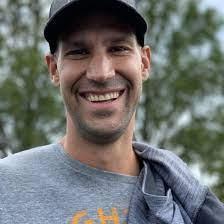 Photo of James Augustine after Fighting Illini’s last championship game run.
Photo of James Augustine after Fighting Illini’s last championship game run.
James
and how he managed to overcome many obstacles
“Who made me want to play was my parents because they worked so hard to get me where I was and now I actually got an opportunity to be in that position”
surviving World War two
I was sitting in a dim dining room at 7:00 in the morning trying to reach my grandfather who was currently living in Genoa Italy. Finally, he answered. His deep voice speaking in Italian, he asked if it was time to do the interview. Mauro Muti, my grandfather, is an 86-year-old man with brown eyes (one of them blind), a bald head, tall, and usually dresses in nice vests and polos, that make him look sophisticated. The way he talks, dresses, and looks reminds me of a normal old man. Even though he might be one, he is an old man with a story. As I sat down talking to Muti through the phone, his voice changed to a serious tone when it came to speaking about the hard parts about being a child during World War 2.
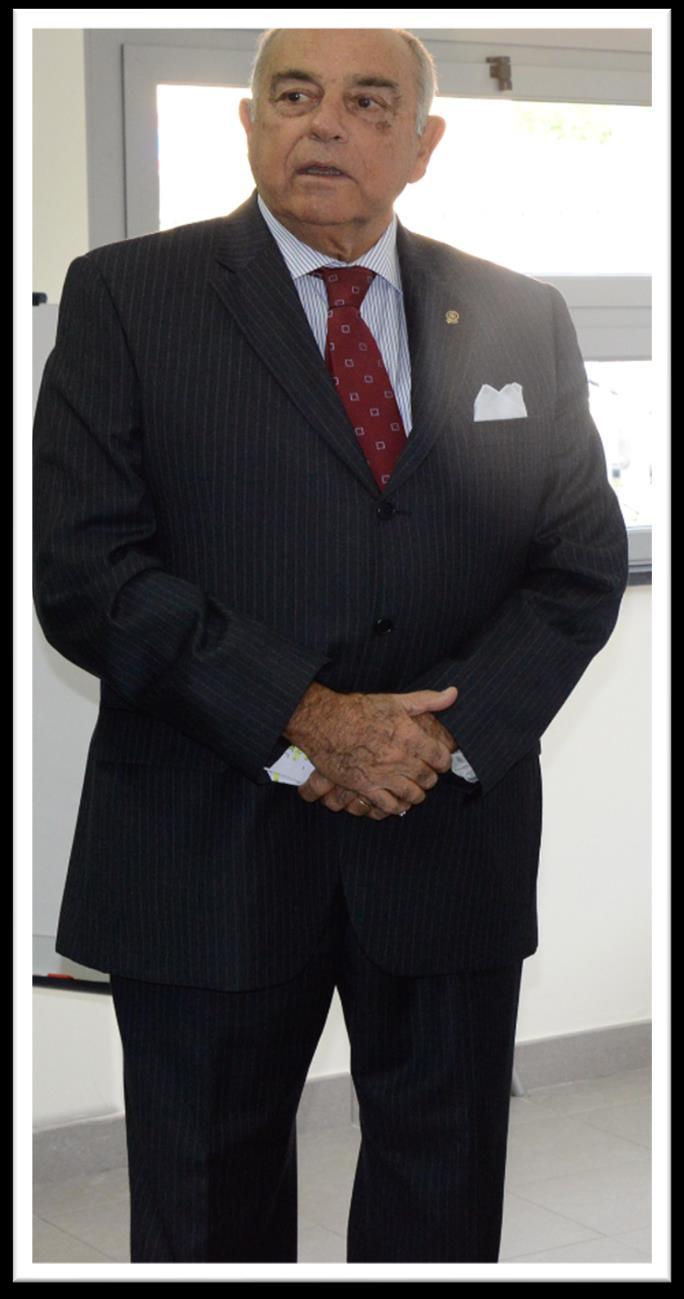
Mauro Muti was a normal 9 year old boy living on an island in Italy, until his so called “normal life,” changed when Italy entered World War 2. Germany and Italy were allied during the war, and unlike the other places in the world, this Island called Ortano was at peace at the time. Unfortunately, this peace did not last, because in 1944 the French started to bring over groups from Africa and other countries they allied with. Even after Germany surrendered in 1945 these troupes still were still making a mess in the more tropical part of Italy, were Muti was. “These groups of people started to cause problems, like stealing, making chaos, and disturbing families, including mine.”
A story of a boy living on an Italian island during World War two
By: Matilde Soldi
groups were looking for women and girls. Therefore, to this day I am thankful this is not happening to anyone I know, but I also know that things like this are still happening in the world even though the war is over. I am very glad that all my family members from this story have survived. But I know that others did not so both my grandfather and I feel very lucky.
Mario Muti, was my grandfather’s dad, he worked a mill on the island during the war. Mario Muti was the director of a mill, and not one of the workers, so he had quite a bit of power. Before the Germans surrendered, in September of 1943 the people of Ortano decided to rebel against the German forces. When the Germans needed more weapons, they asked Mario for explosives which was quite a frighting request. “The Germans just wanted to have explosives from my dad who was the director of the mill, because mines used explosives to get iron. it was a daunting request for my father.” Says Mauro Muti.
Mario was a noble man, and he did not end up giving the explosives to the Germans instead he focused on keeping his family safe. This inspires my grandfather to do the same with his family even though he was not the one making these decisions during the war.
of relief for all of us.”
Mauro’s father was a well-respected man who stopped the chaos on this small island. We need more people like Mario because stuff like this happens every day. Hence, my grandfather wishes to be one of those people.
I do not only look at my grandfather as a survivor of the war, but I look at him as a kind loving and passionate man, who teaches his grandchildren to be grateful for what we have. This experience as shaped Muti to be who he is today, because even though it was a terrible war, it teaches people to never do this again. Even when my grandfather dies, I still hope to keep his story and lessons alive.
These groups that were brought in by the French were disturbing people’s lives and families. Thankfully Muti’s house was high on top of a small mountain on the island, which made his family safer than others, but still, he was affected. Muti was no longer able to attend school and his sisters were also endangered, along with his mother, for these
When he was a little boy, Mauro Muti went through this experience of trauma and cycle of emotions, and sometimes there were little moments of joy or relief. When the war on the island came to an end it was one of those rare moments. As I said before Mario Muti, was Mauro Muti’s dad. He was a director of an iron mill on the island, and therefore had a bit of power. In fact, Mario was one of the people who helped stop the chaos. “My father reached command to bring peace to the island, which was a great sense
“As I sat down talking to Muti through the phone, his voice changed to a serious tone when it came to speaking about the hard parts about being a child during World War 2.”
As a pediatrician at NorthShore University HealthSystem, Shweta manages the health of sick patients

It was a morning in March 2020, and Stuart and many of her coworkers were preparing for a long day of work at the NorthShore University HealthSystem and Hospital. The hospital was busy with patients, and everything was a mess; there was doctor’s equipment, gowns for patients, face masks, and more scattered all around the medical spaces in the hospital. There was an alcoholic odor in the air from areas of the hospital constantly being sanitized once patients were done occupying it.
Almost every room in the hospital was either occupied by sick patients waiting to get treated by a nurse or other family members that were at the patient's side for support. Doctors and nurses were always at work and never had time to take a break because they constantly moved from room to room to help everyone that was sick. This was the everyday setting in the hospital and the reality of the people working there.
Among those workers was my mom named Shweta Stuart, a pediatrician at the NorthShore University Hospital, that worked long and hard shifts. In a time where there was much unknown and confusion, Stuart did not back down from the challenge of defeating the virus and helping save many people.
Though Stuart recognizes that Covid 19 affected many people negatively by forcing shut down their businesses, go into lockdown, and isolate themselves from the rest of the world, if she did not have the job of being a doctor, she would be stuck at home like the majority of the people. There were a lot of challenges along the way in those hard months of constant spread, but with those challenges came opportunities. An opportunity for her to continue work while everyone else was on lockdown. So even though Stuart was forced to do this for her job, she took it as a chance to continue her passion and be thankful for still being able to work.
Despite getting to continue doing what she is passionate about, Stuart had a difficult task at hand. She realized that the hospital would receive many Covid 19 patients and that she would be pushed beyond her limits by doing more work than expected. The hospital changed greatly after Covid 19 protocols came into effect; it quickly became crowded with patients especially during the worst phases of the virus in the earlier months. Realizing the situation, many hospital workers became stressed of the task they had ahead of them and all the confusion that the virus caused.
together to get past these challenges. They were highly dependent on not only by sick patients, but also our society that was shut down and struggling to survive.
After Stuart’s experience at the hospital during the Coronavirus, she reflected on how the harsh times helped her grow as a person. Not everything in the hospital ever went as planned and sometimes there might have been new problems that would arise and things that are more important to take care of. There would be supplies for the hospital on backorder or very sick patients that need to be admitted and treated. If that was the case, then the staff would have to focus on that instead of whatever else they were doing. These things greatly changed up the schedule or format of the day, Stuart expresses, “Covid 19 made me more flexible and more likely to step in and help my team.” From this, I think about the struggle that the doctors and staff had to experience.
It seems as if everyday people have a set schedule on what they want to do on a given day, but my mom knows that not everything will go the way as planned, so she learned how to be open to change. Especially in the days of the pandemic, the hospital was always busy with patients that need to get treated or that were trying to recover, so mom had to pitch in and help her coworkers. From this experience, I have learned how to be more flexible in my life and to not get too caught up with future plans, but instead living in the moment. In order to be flexible, you must not only know that sometimes things may not go as expected, but you also need to remember to cherish what you have in the moment rather than reminiscing on what was planned.
The Doctors’ Impact and Perspective on Covid-19
Shweta Stuart helps Covid 19 patients recover and return to their loved ones
ByNoahStuart
Stuart had expected and faced many challenges while working during Covid-19, but there was a positive of having to work in the hospital. As you may know, Covid 19, a worldwide disease, led to the shutdown of the whole country and many others as well. Luckily for Stuart, not everyone was supposed to be on lockdown; Stuart had to continue to work on the front lines to save sick patients from this virus and make sure that they return to their families safely. She says, “I was grateful to have a place to go to continue to do what I love to do, but of course I was nervous about whether I could bring the disease home.” Even though Covid 19 left a negative effect on many through its spread, Stuart still continued to get to do what she was passionate about.
However, even in the most stressful of times, Stuart and her colleagues had to stay calm and continue to do their job. Stuart describes, “We as doctors would have to pitch in when others were out and help a little more with things that we may not normally do.” Stuart realized that during those stressful times she would have to overcome obstacles because as you know, Covid 19 created a mass spread of disease to multiple people. Some of these people included Stuart’s colleagues and other workers at the hospital, so she had to learn how to treat and perform tasks that she was not familiar with. Learning this put more pressure on her, but she continued to think positively and show help and care to her coworkers when they needed it. The workers at her hospital and at hospitals that were in similar positions had to learn how to work
Imagine having to have to cancel plans, special trips, or special events and gatherings just so that you can help with the work at the hospital. These people had to learn how to be extremely flexible with their schedule. They had to make sacrifices involving their own lives and loved ones to save the lives of others. Despite this, the people on the front lines never gave up and never stopped working to save and protect us. I often reflect on the sacrifices my mom and other front-line workers made; these people had lives and people to get back to makes me feel grateful for all their courage and effort. I truly believe that they are heroes in our society and should be honored and thanked for their hard work.
Throughout the interview, my mom was very insightful as she spoke about her experiences in the hospital and how they affect her today. Now I realize the struggle that she went through and what she had to do in order to keep patients safe. My mom has seen a lot throughout that period of time and has always valued flexibility.
“Covid-19 made me more flexible and more likely to step in and help my team.”
The Hardship of Being on a Plane
During 9/11
Gwendolyn Tedeschi reveals her story on how her plane got diverted on 9/11.
 By Michael Tedeschi Photo by North Central College
By Michael Tedeschi Photo by North Central College
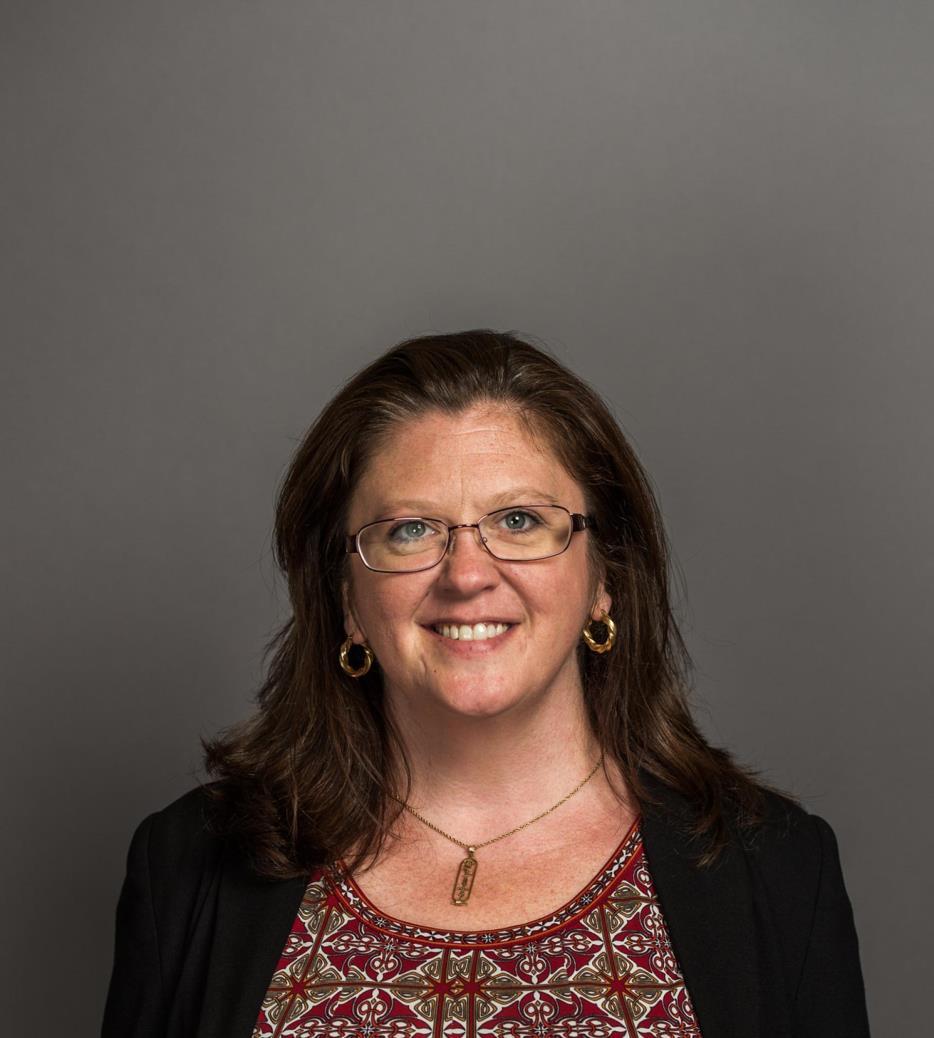
What was it like being on a plane during 9/11? I was sitting there doing my homework, pondering how my mom would answer seemingly simple, yet hard question. I decided that I would go figure that out now. I pushed aside my math homework
and walked downstairs to ask my mom that very question. My mom, Gwendolyn Tedeschi, a college economics teacher, was flying home from a trip to Germany when they were suddenly diverted to Canada.
In 2001 on the morning of September 11, my mother was on a flight that took off in Frankfurt, Germany and was supposed to land in NYC later that day. However, her flight never made it to NYC and ended up landing in Halifax Nova Scotia, Canada. Halfway through the flight, she noticed that on the TV in front of her, the destination was no longer JFK, but YHZ, an airport in Nova Scotia, Canada. At the time, no one on the plane knew that 4 airplanes heading to the US had been hijacked and used as weapons; all they were told was that US Airspace was closed due to a national emergency. She said, “The endpoint [on the map] was always JFK, that’s where we were supposed to land and then it changed to Halifax.” That must have been frightening to her. Usually, when you are on an airplane you know where you are going, but instead, she was going to land in a random place in Canada. There must have been a lot of uncertainty in the minds of the people who were on that flight.
Early that morning my mom landed in Halifax. However, they were not allowed to use cell phones. After what must have felt like years of waiting, but was only a few hours, they were finally allowed to use phones. My mom first called my dad, who was in DC at the time, but did not get through to him, so she called my grandmother, Stevie, who was here in Chicago. When she picked up, she was told that planes had flown into the Twin Towers that morning. My mom said, “they decided we could turn on our phones… I could get through to her [my grandmother] and I [My Mom] said, ‘What the hell happened’ and my mother said ‘The Towers in New York are gone. There were planes that ran into them, and they collapsed’.” She was shocked at what happened and struggled to comprehend how that had happened. People were listening in on the conversation to know what happened, and she had to relay that information to them. There must have been a lot of apparent sadness and confusion among the people in the airport as well. A lot of people on the plane were likely New Yorkers, so they had some sort of connection to people who would be involved.
After five days of waiting for the US to open its borders and airspace, she was finally able to leave. Instead of taking her flight, because it might not stop in New York, she took a ferry to Maine and then rented a car to drive to New York. When getting off the ferry in Maine, security did not let people who had come from out of the US leave. Instead, they made them wait
while they thoroughly searched everyone’s luggage. She said, “When we were waiting to get off the ferry, they said ‘All of the airplane people if you could just come to this side of the boat, we would appreciate that’… They went through everything we had.”
When they asked everyone to go to the side of the boat, she thought they would be allowed to get off earlier. However, she was far from right. This was very frustrating to my mother as they were treating her as a threat and searching everyone who had just happened to be out of the country.
“
of the airplane people if you could just come to this side of the boat, we would appreciate that’… They went through everything we had.”
My mom had many people who helped her get through that tough time; I think that shaped the person she is today. They made a musical, Come from Away about people who were in her exact situation. I remember her crying at vital moments during the play, and now I understand why. It’s because she remembered how open the people who lived in Halifax were. I feel like we can all learn from this that we should all be open to those who need help dealing with a hardship.
‘All
Immigration from place to place
By: Lance Tyson
Six in the morning… Struggling to get out of bed. Walking down the stairs I heard the clattering of the dishes and the sink running. I sat in the kitchen, waiting for Birao to connect to the call.
I called my cousin Diana Jane Birao (friends and family call her Jinky) via Facebook Messenger. Looking through the window the, sky, dark blue with the moon having a little twinkle of light. After a couple minutes, Birao joined the call. It was great seeing my cousin again.
During the call the questions I asked focused on her transition from the Philippines to Ireland. Birao, my cousin, was very calm. I noticed, she felt as if she was very comfortable. Birao was very brave in the process of immigrating to Ireland. Birao has faced adversities but eventually they paid off as shown during this interview.
Birao was very excited for the new opportunity that Ireland provided, but the hardest thing to overcome was leaving her family back in the Philippines.
Birao has one brother named Rio, a sister named Angelique and another named Sandra. Her father, worked at the national statistic office and in the government. Her mother, was a teacher at a local school in Cebu City.
Since Birao was the eldest child in her family, her leaving affected her family both positively and negatively. “My leaving greatly affected the family because I was the first to go and I was the eldest. They were devasted by this but they became used to it and they are happy that I am happy.”
Her leaving put her parents in sorrow because no one in their family left the country of Philippines, except my grandma, Birao’s aunt
Even though her parents were not comfortable with this change, they grew to respect the idea of having their children grow up and leave their home to pursue a better life as a nurse working in Saudi Arabia and then Ireland, or what ever they want to be in order to be happy doing a job.
At first Birao wanted to work in the United States but she found a new job opening for a recruitment of nurses in Ireland. She felt as if it was her destiny to move to Ireland to settle down and make “roots”.
A similarity she found between Ireland and the Philippines is that, “Irish people and Filipino people are in the same way very family oriented; they are very caring for their families and in the Philippines we care for our elders; and here I have observed some Irish people try to live with their elderly parents to take care of them.”
Birao is a Roman Catholic Christian so living in Saud Arabia was a different way of living and she had to adapt to living in a Muslim country. “When I traveled to Ireland I was not scared because I had worked in Saudi Arabia for six years. I was excited to move to Ireland. Muslim culture was very different from my Christian lifestyle. You have to abide the rules of how you dress up. Your hair and your full body has to be covered because we are obliged by the law of their country.”
This evidence shows how by leaving your comfort zone, you can achieve things you did not think you could achieve such as becoming a nurse in three different countries and making a new family and new friends in a new country. Changing to a new environment takes guts not only leaving your home, but starting a new life in a foreign place.
My cousin Birao has faced many hardships by becoming an immigrant from the Philippines to becoming a citizen of Ireland. She adapted to new lifestyles such as a Muslim environment, new foods, and customs. Birao was positive with many of the changes in environments.
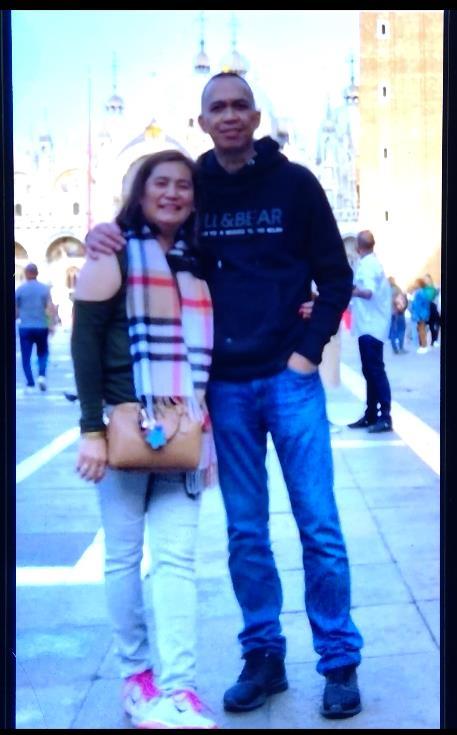
Being an immigrant can have its ups and downs, but in the end you will adapt to the new environment and live a happy life. The fact that I know that my family on my mother’s side has made roots in so many different countries gives me courage and inspiration to travel to as many places in the world as I can.
“The fact that life is so laid back in the sense that I work, I have time for my family, time for myself and how it is not go go go.”
There is a big difference between living in a city where you work very hard and a suburb where you can go at your own pace you can work at your job, but also having the time to do what you feel like.
This shows how her leaving encouraged her to have more free time to do what she wants to do, and live where family is important. “In both the Philippines and Ireland, people care about their families unconditionally.
This is a good thing that the Philippines and Ireland both share so that Birao can feel more comfortable living in Ireland. When she first visited Ireland, she felt she could adapt easily to Ireland. The fact that Birao is now living in a suburb, two hours from Dublin, the capital city of Ireland, she feels that life is so laidback.
To gain better her nursing career, Birao first lived in Saudi Arabia for six years as a nurse. Living in Saudi Arabia meant that she had to wear the hijab, as well as cover her full body with clothes, because as we know Saudi Arabia is a predominantly Muslim country.
“I was born in Cebu City, Philippines and I am currently living in Ireland.”
Brian Umbenhauer’s journey
In this story I will be talking about how Brian Umbenhauer made his way to collage
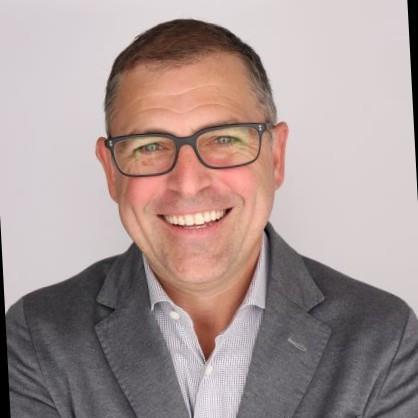 By: Gavin Umbenhauer
By: Gavin Umbenhauer
• It was early in the morning the soccer ball was hitting the wall like a boombox. Umbenhauer walked over the the barn and took a sip out of his water he glazed into the depressing fog trying to look at the highway, but he couldn’t see it just the sound of cars speeding by.
• Umbenhauer knows that today is going to be a long day. Umbenhauer goes home and gets ready for school. Umbenhauer school was not close it took a decent amount of time to get there and when he did, he would go straight to class. Then after school was over, he would go to soccer practice Umbenhauer loved to play soccer it was his favorite thing to do when he was young. Finally, when soccer was over Umbenhauer would get changed and get ready to go to his job this was the first of many jobs that Umbenhauer would have but it wasn’t easy.
• Doing all these things everyday created challenges for Umbenhauer for example the first job he had of taking paint from cars he would give to use acid to get the paint off the cars and in the process of doing this Umbenhauer was also burning himself with the harmful acids. But he had to keep a steady rotation of jobs like these so that he could help supply money for his family.
• When Umbenhauer grotto high school he did not have a choice where he went to high school, he just
had to go to the one in the town he was in he was allowed to go to another high school that was closer because he did not live in that town. So, he would have to go even further to get to school and back.
• Later when Umbenhauer made the soccer team he realized how much he liked the sport and the friends he could make from playing it. So, every day after school when he wasn’t working or at soccer practice, he would be at home kicking his soccer ball against the barn or doing drills so that he could be better.
• Although Umbenhauer had an outstanding career in high school (put average scores here) sadly he did not reactive a scholarship offer. Umbenhauer still wanted to go to collage though despite that his own parents did not think he would get in because they didn’t have the money and the fact that nobody, he knew even thought about going to collage they just stayed in the same small town. Umbenhauer did not want this and then one day Umbenhauer went home to his friends Al’s house and his mom started to help him with his homework. One day after they finished their homework one day Al’s mom asked Umbenhauer where he saw his self in the future, he hadn’t thought about this before but after a couple of days he came up with a goal. Umbenhauer said, “My goal was very simple back then it was to get a
job and make more money than my parents did because I thought that if I did that, I could be successful and do anything I wanted to do in life.”
• Umbenhauer and Al’s mom started working towards his goal and getting him into collage. After the stressful process without the support of his parents he went to Pennate. I asked Umbenhauer if he chose to go to pennate over any other collages for a specific reason and he spoke. “I was just happy that I got to go to any collage, but he said the main reason was because it was close, and it was cheaper than a lot of other collages.” At Penn state he would learn about consulting and that is ewe what he carried on after collage he took a job at deloit and he started working there he loved this job he was traveling all around the world to do something he really enjoyed but Umbenhauer still missed home he was one of the few people who made it out of that small town in Pennsylvania so some f his friend ds were still there in that small town and they would never get out of it because they didn’t think that they could do the things that he did and even if they could nobody believed in them to do it. After graduating to Penn state instead of taking on soccer as his passion Umbenhauer learned to love something else consulting add here what the definition of consulting is. After Umbenhauer got promoted 8 times at the firm he
More Than Just a Race
Abdon Valenciana shares his experience as a 5 time triathlete discussing the pros and cons of the race and how it affected him.
The daunting waves were crashing against him and his competitors, like a wrecking ball hitting a building. He shut all these thoughts out immediately as he heard the announcer start to count down. This was it; this was the moment where all his training would pay off. 3, 2, 1, and they were off, everyone swimming as fast as they could.
He knows that this one is going to be a struggle as he starts just one of three strenuous activities. These activities are swimming, biking, and running. Valenciana knew these activities would test his physical stamina, endurance, and mental strength. This race is called a triathlon and my dad, Abdon Valenciana, is a 5 time triathlete which comes with many ups and downs.
Valenciana faced a lot of challenges during the triathlon with the first one arising before the race even began. That first challenge he faced was training. Motivated to start doing the triathlon, Valenciana joined up with a friend who suffered a knee injury and had to switch from the Chicago Marathon. They motivated each other to keep going and pushed each other in training even with friendly bets.
Despite being motivated by his friend, it was still hard for Valenciana because he had only experienced running races and had never trained for biking or swimming before. The thought of swimming almost a mile and biking 25 miles was scary. Despite this thought, Valenciana, an experienced athlete, was confident he could do it.
Once he committed to doing the triathlon, he started his rigorous training Training multiple times a week, Valenciana practiced two activities at once Valenciana used this method because he claims that people who only train for one activity at a time really suffer during the race, because it is a whole different game when you must do all the activities back to back He also started dieting which he said really helped his training. Valenciana states that his rigorous training was a must for his success inhis five triathlons.
He says, “If you dedicate some time and work hard there’s really not much you can’t do.” You may recognize a quote similair to this as an everyday inspirational quote or a poster in a classroom. This version is especially meaningful because it comes from Valenciana, an everyday person, who really lived by this quote and put his mind to completing the triathlon. He was successful about following this quote and has 100+ hours spent training for his five triathlons.
This is advice I also try to live by when facing challenges. This is especially important because it is not coming from someone like an Olympic athlete but an everyday person who achieved great things by putting in time and effort.
Valenciana faced a lot of challenges during the triathlon; the second challenge he faced was doing the triathlon and the struggles that came with it. Valenciana describes the triathlon as grueling and very strenuous, even more so depending on the distance of the triathlon. He didthe Olympic distance which consists of swimming a mile, biking 25 miles, and running 6 miles in that order.
challenging as well. Valenciana shares that many people overlook how hard the mental aspect of the race is. He explains that you really need to have a strong mindset. At the start line, Valenciana describes he felt all the anxiousness and worry from before melt away as he shifted into his race mindset. Valenciana says while he was racing, he was really focusing on his technique and maintaining his composure to keep going.
Valenciana says that weather is important because if it is bad weather that can really affect the race. On the contrary something that helped motivate him was the fans cheering him on, especiallyhis family.
Valenciana then goes on to rank the events from easiestto hardest. He said the biking was still hard but in terms of ranking it was the easiest. Then he saidthat the second hardest is running because by then you are tired, and it is hard to keep it together. Valenciana expresses that swimming was the hardest event by far. He describes how mentally and physically challenging the swimming is,“Swimming in open water knowing that you can’t stop . . . is mentally more exhausting because there’s that fear that you’re going to stop and sink.” Valenciana’ s words are a powerful testament to just how intense and dangerous the triathlon reallyis. Besides that, it is good to challenge yourself to do things that are hard and even scary.
While Valenciana faced a lot of challenges during the triathlon, the experience proved to be very rewarding. Valenciana elaborates on the impact the triathlon had on him and the experience he got out of it.
Valenciana goes on to describe the physical effects that happen upon completion of the triathlon. When Valenciana finishes the race, he feels different every year. His reactions range from feeling pretty good after ending or immediately feeling muscle pain and jumping into an ice bath. He also says this helps him stay inshape which is a great perk that comes with doing it. Valenciana also says that the effects of the triathlon go further than physical effects. He first describes that you willfeel an immense feeling of pride knowing that you did something that many people could not.
He also says just doing the triathlon has inspired him to do other things like a Half Ironman. The distances for a Half Ironman are a 1.2 mile swim, 56 mile bike, and 13.1 mile run. Valenciana realizes while this is a hard challenge the triathlon has set him up to where he hopes he can do it in the coming years.
Valenciana then wraps up by saying, “something that can sum everything up is that doing this triathlon, individuals can expect to feel accomplished, rewarded, and very challenged.” The triathlon also affects your life to an extent because it is a long commitment, and it can inspire you to do hard things. I am inspired by this quote because it motivates me to do challenging things because the experience willpay off later.
I appreciate that my dad was able to achieve this amazing goal and willing to share his experience today. Through this interview I learned that the triathlon is not only a physical challenge but a mental one as well.His insight on doing the triathlon multiple times has showed me how much of a challenge it really is. The advice Valenciana hinted at is never back down from a daunting challenge and always push yourself. As Valenciana puts it, the triathlon is reallyall about “finding out what you are made of.”
By: Paulo Valenciana
Abdon Valenciana was at the start line. He woke up very early and was wide awake. Dressedin his wet suit and inthe freezing water of Lake Michigan, he gazed into the seemingly never ending lake and realized how scary it really is.
He describesthat the triathlon was not only physically hard but very mentally
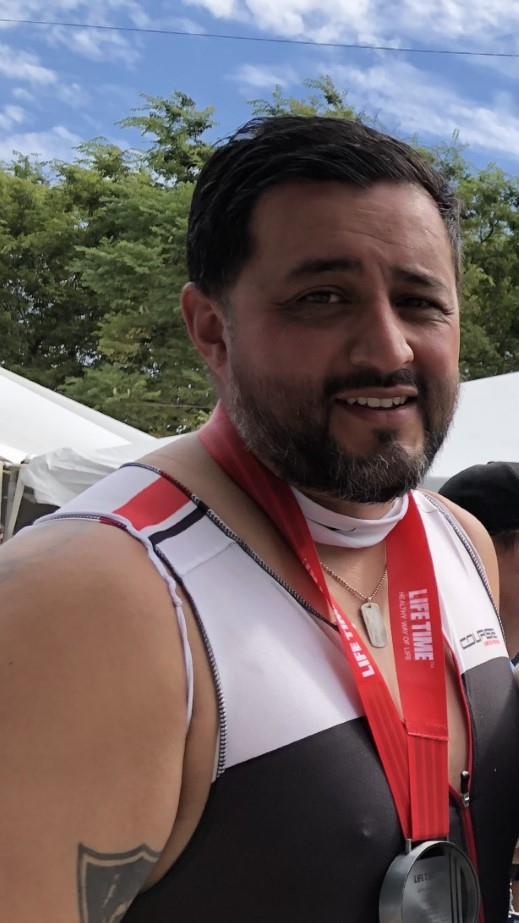
“If you dedicate some time and work hard there’s really not much you can’t do.”
LifeofMichaelArvan
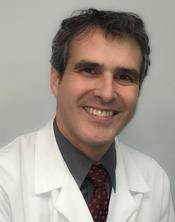
It was late Wednesday night, and I was eager to begin my interview. As Michael Arvan was sitting down in his t shirt and jeans, I gladly thanked him for his time. Even though I was nervous, Arvan's calm attitude relaxed me. Taking out my journal, Arvan asked me: "Where you do want to begin?" Standing at 6ft, Michael Arvan is a kidney doctor, and a father of three, Henry, Nate, and Annabel. Born in Youngstown, Ohio, Michael Arvan's life demonstrated that following passions would lead to a happy life.
ject, then you are never pushing yourself; you do it naturally. You do it naturally because you like it, and you are willing to put time in to get better at what you like." As Arvan explained this feeling he had about working hard, I could better understand how Arvan's thought process worked; he felt that getting better at the things you like takes less work because you are more open to learning new things that will improve your ability to do the thing you like.
ByNateArvan
Arvan always tried his hardest at his school; he would work hard for the subjects he enjoyed, and would work harder for the subjects he had struggled in. As Arvan aged and followed this method of working harder on the things he struggled in, he noticed that working that hard on the subjects he enjoyed did not feel like he was working hard. He always felt that his natural passion for the subject always made him work hard without really knowing it. He explained to me, "If you enjoy a sub-
Finding passion in his subjects, Arvan could naturally work harder; to get better at the things he enjoys. Understanding what Arvan meant, I too have noticed that I will naturally work hard on the subjects that I enjoy simply because I want to get better at them.
“Ifyouenjoyasubject,then youareneverpushing yourself;youdoitnaturally. Youdoitnaturallybecause youlikeit,andyouare willingtogetbetteratwhat youlike.”
As Arvan realized that he wanted to become a doctor at the beginning of his college year at Kenwood, he wanted to take a dual program that would have him be in school for much of the year. Taking the dual program, Arvan would miss experiences that he could have had with his friends at college. He explained to me, "Instead of 4 years at college during fall and spring, I would have 2.5 years of college in fall, spring, and summer. I would not have any summers since I would be going to school all year. I ended up making so many good friends at college that I decided to take an extra year of college to spend time with the friends I did not spend time together with when I was in my 2.5 years of college." Explaining why he took that extra year of college; I began to understand why Arvan chose this.
Not spending time with others was the sacrifice that he made to finish college in 2.5 years, but he realized that he liked the friends he made and wanted to redeem the time he was not spending with his friends by taking an extra year. I
Kidney doctor Michael Arvan’s impactful moments that led him to become the doctor he is today.
learned that the main message from this is that arduous work comes with sacrifices, but it does not mean you cannot make up for what you have sacrificed. I have noticed that I try to talk to my family more after not seeing them for extended periods.
When Arvan was taking a train to meet up with his friends in Europe, he lost his train ticket. He still went on the train and when it was his time to show them his ticket, he told the conductors that he lost it. One of the two conductors was furious and made him nervous; on the contrary, the other conductor was very calm. Arvan reflected on me: "Him walking in with a smile when I was nervous reminded me that I have adopted that as a doctor. To walk in on a patient who is nervous and use a calm influence to put them at ease was a powerful thing to me." In the end, Arvan paid the conductors the cost of his ticket and they let him take the train to his friends. As Arvan reflected, I noticed how powerful this experience was to him.
This experience taught him an important method that would end up being used to help his patients. This story taught me how I can use my influence to passively help others.
During Arvan's college career at Kenwood, he was deciding about becoming a kidney doctor. While he always thought of becoming a kidney doctor, there was something else that impacted him. He told me, "I always thought about becoming a kidney doctor in the back of my mind. Especially when I was in college, I showed special attention to the things about the kidney because of my aunt in Macedonia. I remember learning that she had a kidney problem in my college year. I was very passionate to figure out what kidney problem she had. It felt like detective work to me, learning her symptoms and trying to narrow down what kidney problem it was." This event impacted the de-
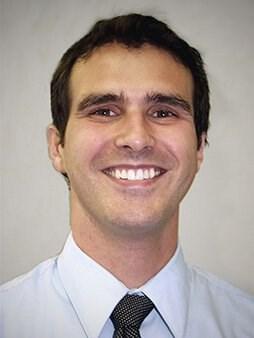
cision of what specific profession of a doctor Arvan wanted to become.
This event further convinced Arvan that this was the type of doctoring he wanted to have and made Arvan lock in the decision to become a kidney doctor. I cannot relate to this experience as I am a child, but I can say that I do believe that the events like this can change your perspective.
Following passions will lead to a happy life. I appreciate that throughout Arvan's life he was always trying his hardest and applied his passions to his future job. Arvan taught me that you can help others without knowing it or even trying to. The same thing with teaching, you could do something that could teach them something that they now apply in their current life. "Choose a job you love, and you will never have to work a day in your life" (Confucius).
AFTON GAURON
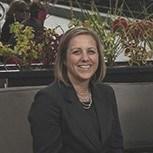
A on Gauron, my mother, was busy taking care of my li le sister who was always crying over something. Her dark blonde hair swishing from side to side as she called over to me, “Ready to do the interview?” “Yes” I replied. the mood was relaxed, it felt like any other day. Gauron was a lawyer and a mother of 3 children and always worked hard. When I asked the first ques on, she was immediately taken back to the day she got her horse. Two yearlings were dropped off in her front yard while she stood there admiring them; they did not have any of the materials to get started. That is how this all started.
My mother had always wanted horses as a young kid. Gauron’s dad, my grandfather, one day surprised her with horses on her birthday. She explains this day here,“I ended up ge ng two horses. I was kind of horse crazy as a li le kid, and had always dreamed of having horses, and one day my dad surprised me and bought 2.” Gauron had always dreamed of having horses; and ge ng them showed how much her dad cared for her and her mom.
Dreaming of having horses, Gauron might not have imagined what she actually got. Her dad got her and her mom yearlings. A yearling is a horse who is only a year old. Gauron couldn’t even ride her horses for the first year or so, and they would always act up. But she wouldn’t have changed it as she says here, “I don’t know that I would have changed it be-
11 3 22
Afton Gauron got two yearling when she was a little kid, and has loved horses since then.
Afton Gauron is shown here. She is now a Lawyer.
cause I really was able to learn so much about them and so much about horses that I wouldn’t have learned if I had had an old pony.” Even though it seemed bad at first it turned into a good thing. This also allowed her to get a be er bond with her horse. If she had had a horse ready to ride, she probably wouldn’t have bonded with it as well that the one she got and was able to wash, sit with, talk to, and train.
When Gauron’s dad first bought the horses, it seemed like any other pet they could buy; they had always had pets and thought he knew what to expect. Her dad did not understand how much money and effort would have to be put into them, because having horses is a lot of work. Even when he realized it would take a lot of work, he didn’t care, he liked doing all the work. Gauron says, “He didn’t really know what he was ge ng into.” He loved her and her mom; he bought 2 horses without knowing what to do with them and it all turned out okay. He paid for the food every week, the stall to keep it in, the equipment for a horse, and cared for them so much to do so.
One day Gauron’s horse Spice suddenly died. Gauron was not expec ng this at all because he died really young, and their other horse died long a er. Gauron shows how this affected her here, “He died one day surprisingly…I was very sad when he died.” When he died, she didn’t expect it at all. He died at a very young age, and they never knew the exact reason. All they knew was that he had some complica ons with his diet but didn’t expect anything bad to happen. Even though this moment was very sad for her she didn't seem to be as sad about it anymore, now that all that me has passed.
I want the readers to know how much this actually affected Gauron; she loved her horse and ge ng him was one of the most memorable parts of her childhood. The lessons I learned in each paragraph are great life lessons, like if you don’t like something at first, it could turn out to be a great thing and all the lessons along the way are most important things. This applies to Gauron and her horse because that exact thing happened to her when she got her horses.
“Hedidn'treally knowwhathewas gettinginto.”
A Doctor’s Perspective
By: Mason Frazier
Jason Frazier’s perspective on the recent events of COVID-19.
On a breezy day in early April, Jason Frazier, my dad, goes to the hospital to do surgery on patients at Munster community hospital in Munster, Indiana. Questioning the safety of the hospital, questioning like Socrates would to people he saw on the street. A few weeks earlier the virus COVID 19 took over the world, putting up numbers people of this time have never seen before skyrocketing to 6.59M deaths in total. The virus made hospitals full, but Jason Frazier still had a job to do.
Jason Frazier is an African American heart and lung surgeon; he grew up in Chicago, IL. Jason is 44 years old with 3 kids and a wife. In a world that makes doctors seem invincible, COVID 19 shows that there are limits to what they are capable of.
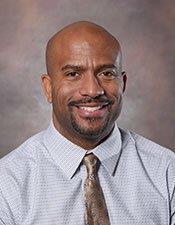
Frazier had expected and faced many challenges during the recent events of COVID 19, but one of the challenges that he had to face was risking himself and his family getting hurt after coming home from the hospital. Luckily, the hospital had extremely good precautions that Frazier followed. However, it was still very hard to do work knowing that you had the chance to get your family sick and that sickness could lead to death.
Everyday Frazier had to take many precautions such as wearing 2 N95 masks. Healthcare workers were fitted for one mask and the other was put on top of the fitted one. Frazier also had to wear a protective suit that covered all the skin on his body, 2 gloves, cover shoes, protective glasses to protect his eyes, and he did not touch many things. Frazier had to put the protective gear on and then when he was done with that surgery he took it off, took a shower, and then put it on again. Frazier spoke on the gear he put on “[COVID 19] is very scary as a doctor with children at home…putting on this equipment that you hoped worked.” Frazier was scared that if he went home and
interacted with his family he might get them sick. Although doctors did not have a lot of knowledge on COVID 19, Frazier did not back down and continued doing his job, even though it seemed like COVID 19 was the unknown and all they knew was that it was killing people.
My dad’s stories made me realize that doctors are not invincible and are human too. Having a dad as a doctor at this time meant you had to take many precautions yourself. I had to wear masks around Frazier and could not interact with him until he took a shower.
Frazier, and other doctors were fearful of COVID 19 because they did not know a lot about it and how to stop it. COVID 19 was very bad to the hospitals, as they were no longer able to do elective procedures because they did not know how COVID 19 would effect their patients.
Frazier talks about COVID 19 as the unknown and says, “We did not know anything about it. I call it a rabbit hole. You don’t know how deep the rabbit hole can go.” Doctors were fearful during this time, as COVID 19 was a very unpredictable virus that could lead to terrible things. Doctors didn’t know how bad COVID 19 could get and that’s why Frazier called it a rabbit hole.
How to stop COVID 19 was a problem for doctors because they did not know how, and Covid was advancing very fast, spreading very fast, and killing very fast. COVID 19 was advancing by mutating into new variants, which was a huge problem because COVID 19 started to become smarter and the things that used to work on it started to become less effective. One variant is the Delta variant, and another variant of COVID 19 is the Omicron variant; which killed over 120,000 people.
The amount of COVID 19 death’s made me scared because doctors did not know how to stop it yet, and it made me feel like COVID 19 was invincible and you have a low chance of surviving if you get it. Frazier still went to work everyday even though the challenges like getting sick were always still at the hospital.
While Frazier was in the hospital, some parts were unavailable due to COVID 19, making it very hard to work because they needed these rooms. They also needed parts of the hospital to move patients in and out of the hospital. Rooms were also taken fast, and it was hard to get patients who needed help in the building. Sometimes they had to move less critical patients out to get more critical patients in.
doctors have learned more about how to treat viruses; it’s given them more experience and made people more cautious and aware of their health.
Finally, be careful with the things that you touch and social distance yourself from people when you are too close, and please get vaccinated because it only helps us defeat COVID 19. Do not shame other people if they do not get vaccinated, just try to politely educate them on the benefits of vaccination. COVID 19 had many negative impacts on healthcare providers, due to its significant physical and emotional toll. People should be careful about what they do because they never know what will come back to them.
While Frazier was working, he had seen some people on ECMO, even his coworkers. EMCO is a heart and lung machine. If you are on ECMO, you are basically on your last string of life and very close to death. You are relying on a machine to save you while the doctors do as much as they can, with a very small chance of surviving. Frazier spoke on COVID 19 in the hospital and explained that COVID was, “scary because you didn’t know when it was going to end.” He also said, “[COVID 19] changed everyone forever…you didn’t know what to be afraid of.” COVID 19 made doctors consider their mortality because people just like them were on machines clinging to life. Some doctors left the medical field because of the fear and stress related to COVID 19.
Throughout the interview process, my dad has been very insightful with everything he has said about being a doctor in COVID 19 times. I appreciate my dad very much for all the hard work that he has done trying to help other people while he is putting himself in harm's way. I have learned new machines and what they do, like the ECMO machine I now know that it is a heart and lung machine.
This has given me a new perspective on COVID 19, and it shows me how powerful it was. Before, I thought no good came from COVID 19, but now I see that
“Scary because you didn’t know when it was going to end”
The Loma prieta earthquake of 1989
By Caden Crudup
Samara Crudup's perspective on the earthquake.
It was a warm afternoon, and the sun was starting the sky was starting to look almost yellowish to set I was dazing off and that is when I remembered that I had to get my interview done.
I went into my parent’s room in my parent’s room and all I was thinking was “I have to get this done with.” I sat down in my parent’s chair and asked my mom to come upstairs. My mom came upstairs, I told her that I needed to make an interview. Also, I asked what she wanted to talk about she said a terrible earthquake that happened to her in college. During the interview I tried to ask my mom lots of important information, like where she was during the earthquake and how it was from her perspective. My mom told me that this was he first time publicly speaking about her perspective of the earthquake. She was a little nervous talking about it at first because she
was traumatized from the experience and still is to this day. Although throughout the interview she eased in and got more comfortable talking about the experience. She was very brave talking about it as you will see throughout the interview.
Samara has experienced many other huge experiences and earthquakes but this one was by far one of the biggest and worst ones yet. It was called the Loma Prieta earthquake and it happened 1989 October 17 in Oakland California. It was 5:04 pm, Samara was in the library studying for a big exam coming up she was in medical school at the time, and she was studying for a huge test for her to become a doctor. Samara had said earlier that her family is 3 generations from the bay area, so she was used to earthquakes. She described that “I have been in many earthquakes before this was by far the biggest and scariest one.” Although she was used to them being quick little shimmers and rattles, they usually went away right after but this one was completely different.
Samara describes, “I was in the library studying and suddenly, I saw the bookshelves start to shake and books were falling rapidly and the whole room started to shake.” Samara like stated earlier said “I am used to earthquakes because they happen all the time in California, although I am not used to them being this bad.” Samara also says this was by far the worst earthquake that she has ever experienced. She also stated, in school growing up since earthquakes happened all the time in California that her school that she went to have many earthquake drills. During those drill they would go to the school’s basement and imitate as if one was happening, they would hide under tables or anything that what help them take cover and protect them so that is exactly what samara did once she realized it was an earthquake.
“terrified because I did not know if I was going to survive this!”
While samara was hiding under the table, she claims “I heard screaming and crying inside

the building, I also heard cars crashing outside I did not know what was going on or what to expect and was terrified because I did not know if I was going to live!”
Samara also described that not only was she worried for herself, but she was also worried about her family her brother her mom and uncle and other cousins. Who also lived in California at the time. She describes it to be almost like the end of the world samara also says that in school I did not take the drills for earthquakes very seriously. She did not think that they were real and did not ever think that an earthquake like this would happen either.
Samara describes that only one earthquake in the history of San Francisco has ever been this bad and that earthquake was called the San Francisco earthquake which happened in 1906. People still said this earthquake was even worse than the one it was a tragedy.
She said that many of her friends died from it and even one of her friends and their mom was driving across the bridge when it happened, and the bridge collapsed, and the car was hanging the mom died and they had to cut her body in half to get to her friend and her friend's brother both survived but were severely injured.
Samara said this earthquake was terrible thousands were killed including many of my mom’s friends and people she knew and one of the main reasons she moved away from the bay area is because she never wanted to experience an earthquake like this again.
SUZETTE’S CHALLENGE
In her car, driving to Elmhurst for me and my friends’ dance class on a Thursday night, the windows were rolled all the way down. Suzette was wearing all black, which was her school uniform. The window was blowing at her face, but not much as we were stuck in traffic. She has just picked up my friend, Maddie, and myself from school. Since we were stopped in traffic, she rolled up the windows because the heat was getting to much for her. The car lights went on and started blinking when we merged over to the next lane. Maddie was in the backseat on her phone while Suzette and I were preparing for the interview.
Suzette Munoz is a 23 year old woman who is in cosmetology school and studying to be a hair colorist and stylist. Working for our family as a caretaker and driver, she picks us up from school almost every day. She also works as a waitress and bartender and is now starting to take clients for hair coloring and styling. She has 4 siblings and lives at home with her family. Munoz discusses how everyone does go through challenges that effect their life. Though all that matters is if they keep pushing through the challenges and keep moving forward.
In the 7th grade Munoz realized that her treatment at home was not normal or safe. She was at school on a normal day and was in gym class when her gym teacher realized she had a scar on her body. She explained that her mom had hit her with a wire and that was why the scar was there. Her expirence was, , “The gym teacher saw a scar on my body and asked me what it was. I then explained to her how my mom hit me with an electrical wire.”
By:MaeveKennedy
She had expirence with trauma and abuse. She did not even realize that the actions were abuse. As she had to go through it at such a young age, she handled it so well. Munoz felt that it was normal how her mom treated her because she
did not know anything other than this treatment. But that was until her principle had to talk to her about it. This is very upsetting and unsettling that she did not know better of how she was treated, and how she was taught from the young age.
Munoz was brought to the principal’s office to talk about what was happening in her life. After her gym teacher asked what the scar was from, she explained: her mom hit her with an electrical wire. Then, the teacher took her to the nurse. The nurse looked at the scar and helped her out. Then the nurse and gym teacher decided to get the principal of the school involved. The principal told her that her life was considered to be in danger and that they had to make a change about the abuse from her mom. So, they told her that they were going to call DCSF: “They got the principle involved ad started explaining to me how because my life was considered to be in danger, they had to call DCSF which is Child Protective Services.”
“Thegymteachersawascaronmybody andaskedmewhatitwas.Ithentoldher thatmymomhadhitmewithandelectrical wire.”
This was Munoz being told in the 7th grade that her life was in danger. The school was going to have to call DCSF being child protective services on her mom. She had to be told from someone that probably did not even know her family or about her life. But still, that person had to tell her that her life was in danger. She got told by her school principal which might have had a good toll in her relationship but could have also a bad toll. She could have stronger relationship with her principle or it could have made the relationship worse. She was only in the 7th grade and barely a teenager. She did not let it stop her
SuzetteMunozsharesthatevenwith obstaclesinyourlife, youhavetokeep ongoing.
whole life though, and taught me that even if things are scary you have to push through.
Although Munoz was being helped, it was hard for her to share her life with someone she did not know. The child protection services got involved with Munoz and her family’s life. Her life and her family’s life were heavily investigated and watched under the child protective services. Even her siblings got spoken to about it. All of her family were involved, but it was mainly her and her mom.
She had to talk, show, and explain her life and trauma with someone she did not even know. It was very hard for her to talk about something very personal with a stranger, as it would be for most people. She explained, “They did a whole evaluation of my life and my mom’s life and yeah we just had to explain our trauma to a random social worker.”
She was uncomfortable with what she has to share with someone she did not know. She had to deal with a lot of stuff in middle school and dint have much privacy. She could have easily made this very negitive and wouldn’t be happy with her life. Except she did not complain about her situation, and she did not pity herself. And she kept trying her best to have fun as a kid and to find friends that will help her through it. Not pitting herself, Suzette kept on going.
Munoz knew she was getting helped, but the attention did not make her feel like it was helping. She was the middle child of 5, so she had 4 other siblings. Since she was the one that the DCSF or child protective services, so she felt like she was unwanted and unwelcome. This made her distance herself from her family more and, she started hanging out with her friends more instead of her family. She still was close with her family, but she felt embarrassed and awkward about the situation when it was happening. But after when they talked about, they got to a better understanding. And as time went on, her
and her family realized each other’s perspectives and when they talked more about the situation. It helped them move on and continue with their lives. She states, “Because I was the middle child of 5 other siblings, it kind of made me feel unwanted and alone most of the time.”
She was feeling unwanted about the situation, but no one else really knew about it. She could have felt distanced from her family and put some of her feelings between her and her mom, but after the situation could share her feelings to her family. It okay to feel negitive about hard stuff and it is okay to express it.
At the end of the day after Suzette expressed her feelings, she feels sometimes it is just better to keep on moving and growing.
“Theydidawholeevaluationofmylifeand mymomslifeandyeah,wejusthadtoexplain ourtraumatoarandomsocialworker.”
Munoz is a very strong person. Pushing through her life challenges, she kept going on with her social life. She had people that had helped her and inspired her in her life. For example, her coach: “Coach reminded me to not give up on whatever I put my mind to.” She has taught me that even if obstacles do happen you cannot let them define your life and that you have to push through. This can help for any situation that you go through; you just have to keep going on with your life and not let those obstacles stop you.
This is Suzette Munoz, age 23. IN this picture she is at work, where she styles and colors hair.
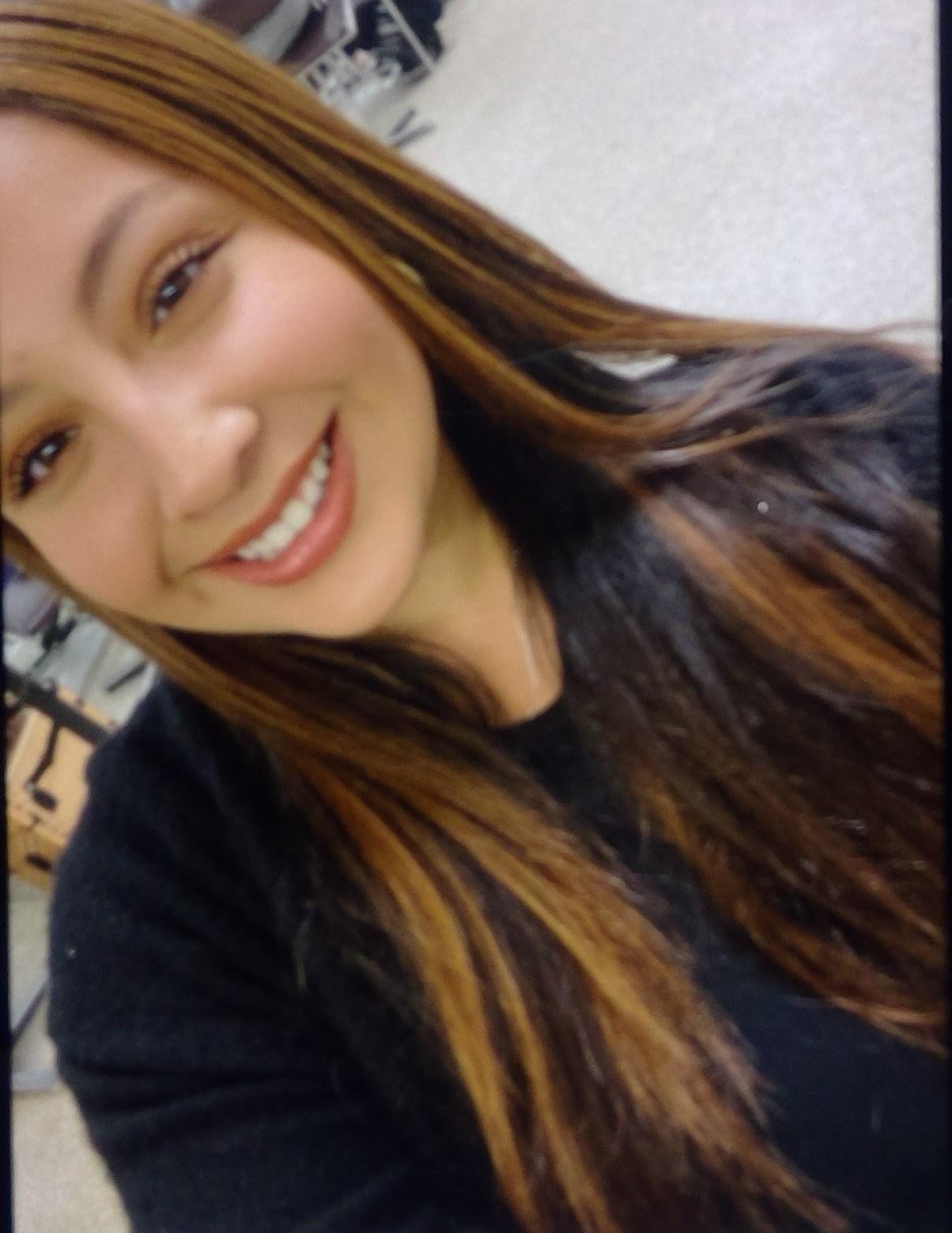
SUZETTE
Tips for Lawyers
Author: Maddox Davis
On a chilly Sunday night my mom, Stefanee Davis and I were ready to get this interview done with before school in the morning. Both of us were excited to do the interview but also a li le red a er a long weekend. I had my notebook ready full of ques ons to ask. We were in my room si ng down on the edge of my bed. In my room there were no distrac on and we were focused and ready.
Davis is a family lawyer who does private prac ce. Davis has a lot of advice from personal experience about how to become a lawyer. She decided to become a lawyer a er college where she graduated from The University of Texas. She then a ended Texas Southern University for law school.

At first, she wanted to become a psychologist, but then decided to be lawyer a er shadowing other lawyers and being in different courtrooms. Davis then decided to do tort li ga on, criminal defense, family law (private prac ce), media on, contract review, and prosecu on. Davis states that “Anyone that is interested in the law should go and shadow other a orneys in different areas of law.” This illustrates good advice for people who want to become a lawyer.
Davis has learned lots of important lessons while being a lawyer. Over me she learned lessons from trial and error. Davis learned new things a er every case. Davis reveals that “One of the most important lessons is not to jump to conclusions.” This explains that you should not ever jump to conclusions, and you should really dig deep into each and every case and do your research. It al-
so shows that everyone has a different side to the story, and you should do your best to inves gate each person’s version of the story.
Davis has great experience in many different fields. Her experience is helpful for anyone who is or is planning on being a lawyer. She has been in 6 different law fields. Davis stated, “I enjoyed private prac ce the most it was very rewarding to work hard for your clients and for yourself.” This will help people that are trying to figure out what field they should consider. Working hard for your clients is good because depending on how you tell their side of the story it could play a big role on the rest of their life.
Davis wanted to become a prosecutor and do her job the right way. In her previous experience she has experienced many unfair prosecutors. Davis claims, “The reason I became a prosecutor is because I encountered so many prosecutors, while a defense a orney. I felt they weren’t doing the right thing and they were so detached from reality.” Her personal experience helped her get a good understanding of what she wanted to do next and why. She wanted to make a change and put herself in others shoes. She wanted to listen to their side of the story and do as much research as she could to make the case fair.
Davis thinks anyone who wants to become a lawyer should go for it and shadow someone involved in law. She also believes that you should not jump to conclusion, and you should always work hard for your clients. Davis wants other lawyers and future lawyers to work hard to research and examine both sides of the cases. Many bad experiences with prosecutors led Davis to want to become one so she could be fair and reasonable unlike other prosecutors she encountered. If you want to become lawyer, you must know what comes with it. Davis’s experiences can help you learn more about the system.
Hard work pays off in the end
BY: LIUBA CLEMENTE
It was Sunday at 5:00 pm, at my kitchen counter in front of each other, seating on wooden stools. At least 3 feet apart from each other, answering all my questions one by one, looking confused but answered in a confident strong voice. Wearing her favorite cheetah knitted sweater with her black tight jeans. Carolina Sofia Sulbaran Isea, a 40 year old Venezuelan Spanish, from Caracas. Adjusting her shoulder length, dirty blonde hair, looking nervous but happy at the same time. Sulbaran is a hard working and strong women who is a mother of 3 girls, a 19 year old, a 13 year old, and an 11 year old. She is a thoughtful and caring mom who works hard for what she really wants.
Sulbaran thinks about how others don’t have a voice, so she speaks for them through her job, this encourages her to keep working hard and shows how caring she is for others. “I really love my job as a news anchor because I can talk for others that don’t have the education, the correct words, the way to talk about what they really want to say to the world, so I’m the voice to others.”
Sulbaran admires her job and has an inspiration everyday when she goes to work. The inspiration of talking and bringing what others want to say to millions of people on TV inspires her to keep going even if sometimes it can be hard to explain what others really want to say and tell the world about other’s problems, or problems in the world.
Many people think that being a news anchor is easy; Sulbaran challenges this misconception by describing what she goes through Monday Friday. People that see the news don’t know all the processes and thought that goes into being a news anchor. Many say it might be easy because they just have to look pretty and have their hair look perfect, and while that might be true there is a lot more than just looking pretty on TV.
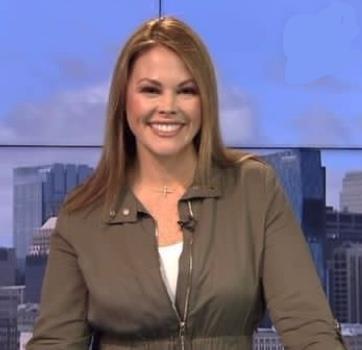
If the TV is going to be live to millions and thousands of people, they have a lot of pressure because they cannot mess up. They have to prepare way before they go live and revise and edit sometimes their script they are reporting on the news. While some people may know that anchors read a script many don’t know how they read the script and can be on Television.
The process can sometimes be hard, in front of the camera they have a small little screen that they read, and also control. In their hand or under their feet they have a small device they press to make the script keep moving so they can keep reading it off. Sulbaran emphasizes that she likes to help others through her job. This gives her a passion because she, “was born with the ability of narrating”, and is helping others.
Univision news anchor is helping others speak their mind by using her voice.
{Carolina Sulbaran is a hard-working women that likes to help others.}
[“I really love my job as a news anchor because I can talk for others that don’t have the education, the correct words, the way to talk about what they really want to say to the world, so I’m the voice to others.”]
She recalls being able to read at the age of four, and not books that, kids at her age would usually read. Sulbaran read books that had probably around 100 to 150 pages, which is not what a four – year - old would read. I can assume that this is how her passion for becoming a news anchor started really growing and becoming a dream for Sulbaran.
In conclusion Sulbaran is a hardworking and strong women, who is also a mother of 3 girls. I appreciate Sulbaran because she is thoughtful and caring. Some advice I would give, is to work hard for what you really love and want until you achieve it.

[“was born with the ability of narrating”]
Sports: How big of an impact can they
on





I sat down as I greeted Brian
O’Meara; as he said hi, he sounded very professional. The lighting was soft, and O’Meara had a warm smile on his face; I knew his answers would be meaningful and thoughtful. As he adjusted in his seat, I hit record. Brian
O’Meara was a lacrosse player for 7 years. While he was a freshman in high school, he felt lost about what sports to play for the next 4 years of his life. From the first time he picked up a lacrosse stick, he knew that this was the sport that he was going to love most. Brian O’Meara happens my dad and is now a lawyer with 3 daughters. He frequently uses his experiences playing lacrosse, to help guide himself and others through life. Brian O’Meara is a great influence on his daughters and others, of how good sports can be for you and why it is important for everyone to have the opportunity to play a sport.
option. Because O’Meara loved sports, he knew that he wanted to play sports, but he just didn’t know how. O’Meara played baseball but he didn’t love it and he wanted to do soemthing he loved. One day, O’Meara was walking in the hallway and saw his friend walking with a lacrosse stick in school; O’Meara asked what it was, and he explained what lacrosse was. O’Meara’s friend, Dan, asked him if he wanted to throw the ball around and he said of course. Brian remembers, “That first time when I went to play catch with Dan, I knew I was hooked.” Brian also says, “I realized what was great about the sport was, you didn’t have to be tall and big to play, you could be small and fast like me.”
often remember this story and I feel that others can touch on this as well because it does not matter how tall you are or what skills you have, there will always be a sport for you. There are so many sports in the world that you need all different talents to do, so I think everyone should have a chance to play a sport especially because of how important they can be.
By: Jane O’Meara
Throughout O’Meara’s childhood, he loved sports. In grade school he played football and baseball and loved it. However, he was also very small, and kids would make jokes about him for being short however, it just drove him to work harder. O’Meara’s height was okay for grade school, but he knew that football would be too tough for him in high school, and it would not be an
O’Meara knew throughout his childhood that he wanted to play sports because he loved how they made him feel but he just didn’t know which one until he finally found it. I
Making Varsity freshman year, O’Meara played lacrosse throughout the rest of high school. After that, he walked on the team at Boston College. It is obvious that college involves extreme hard work, patience, and a strong work ethic; playing a sport just adds so much more stress on to that. Despite this, O’Meara loved sports so much, that he was willing to submit to that. College can also be very fun too, but playing a sport takes some of that away. However, sports for O’Meara made him feel good and it made him feel like himself. O’Meara recalls, “I had to get up early in the morning for practice while my roommates would sleep to noon, but at the end of the day you just felt good and felt like you accomplished something every day.”
“At the end of the day you just felt good and felt like you accomplished something every day.”
have
you?
Brian O’Meara shares his experiences while playing lacrosse throughout high school and Loyola academy and eventually playing at Boston college.
O’Meara felt that the way he felt about sports and the way he felt after he played was better than the fun stuff that college kids did. O’Meara was also extremely hardworking and took it on himself to play a sport as well as get good grades. Sports are extremely important in people’s lives because they make them feel good about themselves and what they do. I can reflect on this because I always love the way sports make me feel and how I feel about myself while I’m playing sports.
O’Meara played lacrosse at Boston college for 3 years, freshman through junior year. O’Meara says, “By senior year I wanted to experience college without a division 1 sport, but what kept me going was I just felt good, and it taught me and provided me with discipline.” O’Meara knew he was not going to go pro with lacrosse but playing in college gave him a lot of discipline that most college kids need. The
discipline and habits have stuck with and helped O’Meara for his whole life and who knows what would have happened, or who he would be without lacrosse. O’Meara’s experience benefits me because sometimes it can be hard to get up and go to practice, or a game when things get stressful and you have other things to do, for example other schoolwork and homework, or you want to do something fun with your friends, but you can’t because you have a game the next morning. However, it is important to remember that the things sports teach you can benefit you for a lifetime.
and going to practice every day before and after school.
O’Meara says, “The years of learning that treating your body well is important, makes me know now that it is important.” Although O’Meara’s lacrosse days are over, he still cherishes and remembers all the things lacrosse taught him and applies it into his own life. Lacrosse benefit and impacted O’Meara’s life and helped shape him to who he is now. This benefits me because I know how good sports can be for you and how much they can impact and shape your life.
important for everyone to have access and have an opportunity to play sports.
While O’Meara was in college playing lacrosse, he developed habits that could also benefit him for a lifetime. An example of this is taking care of his body. Sports can be very beneficial for keeping your body healthy and getting into to good habits. An example of this is getting up
Brian O’Meara’s experiences are a great example of how much sports can impact people’s lives. Everyone should appreciate the hard work of people and understand where determination gets them; also, take advantage of the opportunities you must play a sport because it can be so beneficial for the rest if your lives. I think it is very
Brian O’Meara
After playing lacrosse in college, he went to Loyola law school and became lawyer and still is today.
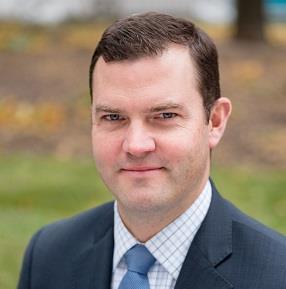
ADREAMBECOMESREALITY


 By:SavannahWoodson
By:SavannahWoodson
smiled at the young cheerleaders tumbling in the back. Calloway was sitting by the schedule board waiting for me. “Hi Savannah!”, she said as we began.
Catherine Calloway was born in Chicago, Illinois at the University of Chicago hospital. She coached a school team and an all star program but eventually stopped doing the all star program. Since it was not her all star program, she just coached it and was not able to make any decisions. Some of the decisions that were made she did not agree with and even made it difficult for her to be able to coach. Because of this, she stopped doing the all-star program and started judging. One day while judging there was a team from Chicago that performed, and they were not that good, so it was embarrassing, but Calloway knew that she could do better.
Consequently, when the kids that she worked with on the all star program wanted to compete, she got the chance; they started doing local competitions as Chicago Park District. Then one day Calloway told them to bring a friend and it turned into 4 5 teams with around 100 kids. It kept going from there to become the amazing team it is now.
successful in sales along with simultaneously managing coaching and practices. Then one fateful day, her manager changed her schedule that was originally laid out to prevent any cheer conflicts. As a result, she was unable to balance one of her evening dinner appointments with practice and nobody was able to cover for her.
This situation made Calloway realize something. She told me, “I didn’t want to do it anymore, so I quit. I started cheerleading and it was a long journey. I did a lot of work in between. But I ended up doing cheerleading full time.” Calloway realized what her real passion is. Although she switched careers, she was still able to become successful and learned from all her experiences.
“I didn’t want to do it anymore, so I quit. I started cheerleading and it was a long journey. I did a lot of work in between. But I ended up doing cheerleading full time.”
On a bright Sunday afternoon, Catherine Elise Calloway sat attentively in her gym, buzzing with affection. She smiled at me as I walked into the cool gym. Sunlight streamed brightly through the square window on the roof of the gym; championship banners fluttered on almost every wall. Inspirational quotes, schedules, and gym mottos lined the walls. I waved and
Catherine Calloway did not only create her own team to represent Chicago; she created her own team because she had a dream and a passion. She continues to use her passion to impact people and change lives.
Calloway always wanted to do cheerleading since she was young, but it was not always that easy. She started off doing sales, such as pharmaceutical sales along with a variety of sales while also doing some coaching on the side. Calloway was
In 2010, Calloway got pregnant; at that point, she had done many different types of sales while working and coaching on the side. Working, and coaching, while raising a kid was a lot to manage, and it was an incredibly challenging change in lifestyle, but it worked out. Although things may not be right at first, experiencing different environments and people will help to develop life skills that will contribute to achieving goals. Sometimes sacrifice and hardships are worth it to achieve

1
Coach, business owner, mother, and entrepreneur Catherine Calloway impacts and influences lives with her cheer gym, Technique Gems.
CatherineEliseCalloway
something that you are passionate about. Cheerleading may not have been Calloway’s first career, but it was her passion.
Calloway created the idea of the gym with her best friend since 14 years old, Brandon. Brandon loved cheerleading as much as Calloway did. After coaching together for a long time, Technique became their dream together. One time while talking together Brandon and Calloway started discussing if they had a program and what it would be. They wanted to create a name that was meaningful to them. Together they started thinking of the type of people they wanted to produce from their coaching and how that could be implemented into the name.
Brandon thought of the name technique because they would have technique: Calloway explains, “That’s what it is; that’s what they have; it’s not a question.” They realized that these kids from around the city of Chicago are all talented, but they do not have good technique. So, they would create a team to represent Chicago with technique.
Hence, technique is what the kids will have, but what will they be? Calloway was thinking of how the kids she coached would be influenced by her and develop good natured habits that would stand out. She explains, “We were talking about what type of people we would like to make, and we ended up talking about the people being gems because diamonds are the hardest rock. So, we would coach them hard but because we would coach them hard and hold everybody to high standards they would be like diamonds.”
Together the name of their gym is Technique Gems. So, although Brandon is unfortunately not with us today, his memory and spirit lives on through Technique Gems and throughout the gym. Although it took some work, they have a unique multi meaningful name. It represents a dream, a beloved companion, and a future. Together Brandon and Cathe-

rine Calloway created a name that enveloped and reflected their dream.
Being the owner of a program comes with its difficulties. For instance, it is almost like Calloway does not get to have feelings. She always must do what is right for the program even though she may not feel that way personally. Calloway describes, “I had a moment where I openly expressed how upset I was about a situation, and it made parents feel like the organization was not okay, but the organization was fine I just was not.” Everybody is allowed to have a moment when they are not well but having those moments publicly may turn into more than expected.
moments and accept that she is simply her emotions and not expressing the state that the program is in.
Catherine Elise Calloway had a dream of what she wanted to do and even though she went through many hardships, she worked hard and achieved her goal. She strived to influence young people to develop a level of dedication, sportsmanship, and kindness, and to be hard workers. Calloway is so dedicated and persistent; she genuinely loves and enjoys what she does. She does not just impact kids; these kids also impact her. She appreciates the people she works with and her influence on these young people’s minds. They help her learn life lessons that she can spread for generations to come. Calloway relays for future generations: “Work for the greater good not just personal satisfaction.”

“It’s really important to have good people around me and to find good people who really do support me as a person not just as a coach or a business owner.”
People believe that the leader reflects on the program directly, so parents look at her and compare the whole program when the program could be fine. Either way even if something is wrong, it is not wrong forever and it does not mean it cannot be made right. People just need a moment to feel whatever emotions they may be feeling.
From this situation Calloway was able to realize an important life lesson that she can carry on throughout life: “It’s really important to have good people around me and to find good people who really do support me as a person not just as a coach or a business owner.” Having staff that allows her to have those
2
“Work for the greater good not just personal satisfaction.”
The Criminal Justice system
Laura Bertucci smith talks about hertime in criminal justice
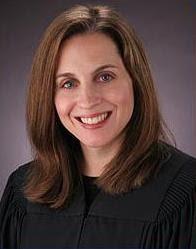 By liamsmith
By liamsmith
The interview is an ultimate form of communication. You can learn so much about a person. my subject was Laura Bertucci smith, a woman who had grown up near Chicago and never left. She was hardworking, no nonsense, and was clear she worked in the criminal justice system. She works as a judge every day. She is also my mother. We will be focusing on her life in the judge field, from college all the way until today. From the start of the interview, she wasn’t nervous or scared, she was ready to go. She shows that you should take a chance or follow your dreams, and something good might follow.
Bertucci was in college, majoring in the arts. She loved theatre and wanted to be a radio host, or even perform in musicals. But one day, she saw that her college was offering classes for law practice. She saw this and took the classes. She instantly loved them, thought they were interesting, and wanted to be a prosecutor. She changed majors and even went to law school because she wanted to be in a courtroom after school. “I was inspired, I knew I wanted to be in a courtroom after graduation, and I chased that.” Bertucci didn’t back down, even though she was qualified to be in the arts and taking classes and majoring in it. She didn’t back down from the challenge, even though it might have been scary and new, she took the first step. Even if you’re not so sure of something, you should step outside of
your comfort zone. Even if it doesn’t work out, you learned something knew, and you tried your best.
Bertucci got an internship at a prosecutor’s office. She worked there and got job experience and what it was really like to work in that field. She said that as she was working as a prosecutor, she saw some people who tried their best and fought for what was right, and people who didn’t. She knew that the people who didn’t still got paid, and yet she fought for what was right. She did the moral thing and helped the good of mankind. When I asked her to talk about that, she says “I saw lots of good people, and lots of not so good people. I wanted to be the good.” She knew she wanted to be good. That might sound normal, but today those people are hard to find. She worked hard to get into a position and didn’t take shortcuts. She wanted to do things right, and in doing that she found success she found success maybe not from outside perspective, but she has led a great life and the intrinsic reward is enough for her.
She has been working for a very long time, and it’s a hard job. She is happy where she is, even if she has had to work night shifts until 2:am, she loves her job and wouldn’t trade it for anything. She says, “it’s a hard job, but I push through.” This quote can apply to many aspects of not only her job and life, but ours as well. She was talking about how she works late judge and worked
2:am shifts, how she pushes through and tries to do her best.
My mother words hard every day, juggling taking care of two children and working a full time job. She really inspires me, from changing career paths on a dime to marrying, she is an inspiration to many people. She took a chance to follow something she was interested in, and it worked out for her. She took the jump and something good followed. Even though she is someone who took a chance and succeeded, so she can't speak for those who failed, she is a good voice in the court system and to this topic, nonetheless.
Doing the right thing
By Helen Urban
It was a Monday night, and I was sitting in my room. I could hear my baby sister’s crying in the next room, and phone dial sound ringing throughout the room. The dialing stops, and I hear my grandma’s voice. “Hello!” I hear her say with a cheerful voice, “I’m ready for the interview,” It is like I can hear her smiling through the screen. I could tell that she was excited for the interview, and so was I. Janice Urban had always been a very happy and optimistic person. She always managed to see the bright side in things when others could not. She was even optimistic when she could not figure out the career path she wanted and had tried many different jobs. Being a very opinionated and independent person, she would stand up for herself and others, leading her to get her master’s in political science. After a while, she decided to become a teacher because she realized how much she had loved teaching. She used her life experience and optimism to make sure that she always got the best out of her students, and that she was a good teacher for all of them.
Urban had always felt some sort of attachment to teaching. The first job she ever had, she was working in a program with children and their parents. She would teach the kids new things, and create fun activities and crafts to keep the children entertained. She felt a connection to the job; and she felt a love for working with young children and teaching them.
It was not just working as a teacher that she had loved; as a child, Urban always admired how much her teachers had cared about her, and the work they put into teaching her things. She used past experiences, and other teachers to inspire her to be a better person. She explains, “I valued what they were teaching, and I valued their personalities. I think that I was attracted to it, and you know, I had so much respect for them.” Urban had felt attached to teaching ever since she was young and was incredibly grateful for everything her teachers had done for her. She had valued the way her teachers taught and the way they treated their students. Because of her past experiences, she was not only able to become a teacher in the first place, but also became the teacher she wanted to be. Thinking back to this, I try to pay closer attention to what I admire in others; and I can use my experiences with other people to make me a better person.
Urban had not always known that she wanted to become a teacher to younger kids. In college, she decided that she wanted to get her master’s in political science, and she wanted to be a college professor, teaching older kids. At that time, she was a very rebellious and opinionated person, she spoke out about her beliefs. Urban went through years and years of college and education to get her master’s in political science, but later decided that she wanted to teach younger kids. Urban explains, “It was during the Vietnam war years and I was, of course marching with people against the wars. It just made me feel like I was, I do not want to say pro government,
but I didn’t really know if I wanted to go on in teaching political science.”
Even after years of working towards being a political science teacher, Urban was able to figure out what she really wanted. She was able to completely start over with her career, and still become successful. This is also another example of how she used her experiences to decide what she wanted to do with her life, and even though she knew it would be hard, she switched her career choice, and built herself back up. This helped me learn that even if things feel like they can not be fixed, I can always build myself back up to be who I want to be.
Urban strongly valued the idea of equal opportunities for everyone regardless of race, gender, or religion. In her time, many women did not work, and if they did, there were very few job opportunities, with most women being forced to become nurses or teachers. One instance she remembers regarding women’s rites was when Geraldine Ferraro was nominated for the position of vice president. This was the first time that a woman had been nominated to be vice president and although Mondale, her running partner, did not get elected for president, it was still a large accomplishment regarding women’s rights and opportunities. Urban explains how she vividly remembers this event, and how it changed the way society viewed women.
Janice Urban is a successful teacher and feminist who used her optimism and experiences to change the lives of her students, and many other people.
“We’re still negotiating for better wages for women, you know, better respect in the working world, but I think that women have
She notes how women have come a long way with now, the first women vice president being in office. She states, “We’re still negotiating for better wages for women, you know, better respect in the working world, but I think that women have come a long, long way.” This reflects Urban’s views and opinions on women’s rights. It demonstrates how she thinks society has changed since she was younger. When she was younger, there were few options for jobs for women, and women were not respected very much in general, so it is very powerful for her that she got to see how life changed, and the opportunities made for women.
As a teacher, Urban explains that the main theme she used to become a good teacher was that she was always trying to get the best out of people. She had many situations where her students would be rude or bully other children, or they would not get very good grades, but most of them ended up being wonderful people. She then went on to explain how she had one student named Maria who would beat up and bully kids in school. She then explained how once she realized that Maria just wanted to feel useful, she gave her the job of helping her organize the chairs in the classroom. Once she had a job and felt that she had a purpose in the classroom, she became a very sweet student. This was a situation where Urban realized that she just had to find out how to get the best out of the children.
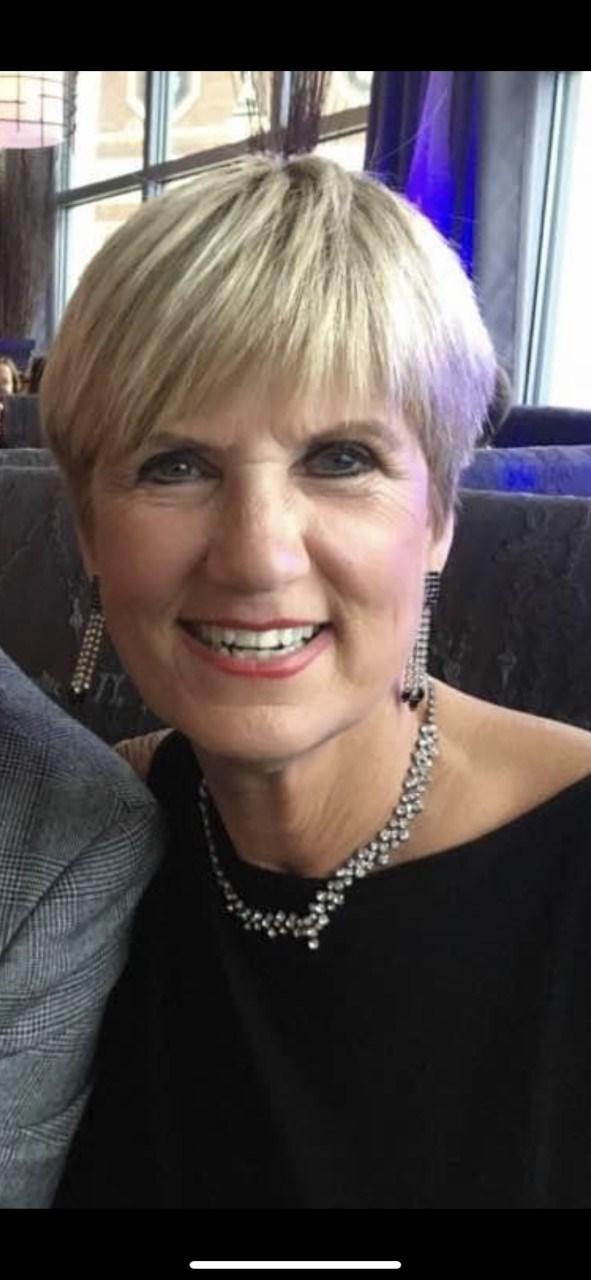
Urban states her opinion that, “Most kids are just good natured and will grow up to be fine adults. We just have to weather the storm of all these little problems that they go through,” Even when students were rude or disrespectful, Urban always made sure to appreciate them and their talents. She tried to get the best out of them, and she always did what she felt helped them the most. This demonstrates how Urban was able to become an amazing teacher for many kids, and how she helped to make students the best they
could be, even if it was not academically. This teaches me how I can learn to make the best out of a situation, regardless of how bad it is.
Urban also explains how she used to have many children with language barriers in her class. Because of this, it was a lot harder to teach them simple things. Many people did not really understand how to help the children, and everyone kind of just gave up. Urban explains how she always tried to get the best out of everyone: and even though the children could not understand her, she always found other ways to teach the children. She then goes on to explain how even the parents of the children were learning new things, and how it felt so rewarding to be able to help others learn more things. Even though it did not affect how much she was being paid, Urban always tried to get the best out of people, regardless of how much more she had to work.
There were many points in her life where Urban had to make hard decisions, but she always stood up for her values and beliefs, and did what she thought was right. She managed to become successful even after switching jobs and getting her master’s in political science. Using other’s and her own experiences to improve herself as a person, she changed the lives of many different people. No matter what, Urban always did what she believed was right, and used her experiences and optimism to be a good teacher. She stood up for women's rights and the rights of her students, even if it meant she had to work extra or give up things that she loved.
Janice Urban is a loving teacher, activist, and family member to everyone around her
David Wieland is someone who has lived the phrase “being a hard worker” his entire life.
As I sat patiently waiting, he was baking waffles with a certain skill only he has, I opened my notes and he gave me breakfast as I began to ask him questions even, I wasn’t so sure about, but he was very kind and encouraging. David John Wieland was born on August 22nd, 1978, he is now 44 years old, he has three kids, me, my brother, and my sister. He is my Dad, I interviewed him with the intent on learning more about his businesses, also and I was successful. He told me how he wanted to be a non-physical kind of businessperson since a very young age despite feeling some pressure as the oldest child to work at his father’s business.
Wieland is a great businessman, specifically a Venture Capitalist, and his entire life he has been working. He has started multiple businesses and has been very successful with all of them. In a very informational interview with him he said, “I really love helping out other people start their



businesses and on the flip side I help other people invest into businesses (his employees who also benefit from his investing) and it’s something I’ve done for a very long time.” He is a very resolute person and really loves the work that he does.
Wieland has been in the Venture Capitalism business for a very long time, but he started out differently with a company that worked with WiFi back when it was new. He would give hotels money and help them start their Wi-fi, and he was the sole member of technical management because before they hired more people the coowners were him and his brother. Wieland is the oldest of his parent’s sons and the brother in question is the 2nd youngest. He states that “It all began when I started that 1st business and lent people
money, and after I sold RIVS (his 2nd company) I knew I wanted to do this permanently.” He is an excellent businessman and has lots of experience in what he does.
Wieland was not always a technological or businessman, he was born and raised in countryland Iowa on a big property, for it was farm like with a small pond, and a couple patches of soil for a very nice garden containing various fruits and vegetables. It was on that same property that Wieland, when he makes it known that “When you live on 20 acres of land you always have some kind of work to do.” It states that even before he became a businessman, Wieland knew the value of hard work.
During quarantine Wieland and his current business, “Motivate Venture Capital” struggled at first adjusting to working at home all the time, but thankfully as best said by Wieland, “We took risks and were successful with them, we also didn’t have much competition because other Venture Capitals were too scared to invest.” Wieland’s determination and ingenuity is very admirable.
By now I belive that you should come to know the Venture Capitalist who is hard-working, smart, very experienced, and I encourage you all to be like Wieland, a successful and smart person.
sold RIVS (his 2nd company)
to do this
A turning point in Wieland’s business career
“It all began when I started that 1st business and lent people money, and after I
I knew I wanted
permanently.”
Wieland’s photograph on the “Motivate Venture Capital” website so people can know him and his team/coworkers when they go to him and his work for investing.
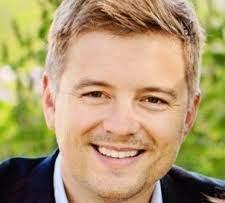
Wieland was not always a technological or businessman, he was born and raised in country-land Iowa on a big property, for it was farm like with a small pond, and a couple patches of soil for a very nice garden containing various fruits and vegetables. It was on that same property that Wieland, when he makes it known that “When you live on 20 acres of land you always have some kind of work to do.” It states that even before he became a businessman, Wieland knew the value of hard work.
During quarantine Wieland and his current business, “Motivate Venture Capital” struggled at first adjusting to working at home all the time, but thankfully as best said by Wieland, “We took risks and were successful with them, we also didn’t
have much competition because other Venture Capitals were too scared to invest.” Wieland’s determination and ingenuity is very admirable. By now I belive that you should come to know the Venture Capitalist who is hard-working, smart, very experienced, and I encourage you all to be like Wieland, a successful and smart person.
Article by Graham Wieland
Becoming a lawyer: the story of Brian Miller
By: Sean Miller
I look up as Brian Miller adjusts the chair and sits down. I turn the page of my notebook and organize my papers on the black wooden desk. I move the pillows on the red couch and realign my phone. Miller moves his glasses, sips his water, and clears his throat. I then press play on the phone. Brian Miller is a 49 year old lawyer who lives in Chicago, Illinois. He has 3 children: Braden Miller, Sean Miller, and Daniel Miller. It was Sean Miller, me, who interviewed him. Miller came prepared to meet all his goals, as he does with everything.
Miller, my father, his life growing up wasn`t easy, as he was constantly forced to move from place to place. He was born in South Bend, Indiana. Because of his father`s job, he constantly moved, after he was born, he moved to Berrington, Illinois. After a while, he moved to Richardson, Texas. He finally settled in Lake Oswego, Oregon where his parents still live. Miller recalled, “My dad, his job moved around a lot.” This illustrates that because of his dad`s job, he couldn`t stay in one place for long, therefore he couldn`t retain contact as easily with the friends that he made in these different cities and towns.
Miller had a great work ethic, seeing as he “did lots of yard work to make money when (he) was young.” When he got older, he got his first job at a grocery store called Safeway, which he related to the grocery store Jewel. “I was the guy who put groceries in the bag, it was called a bagboy, but the actual title was curtesy clerk.” Miller wanted to work and worked hard, attempting to get what he wanted.
Miller was decisive on what he wanted to do when he grew up since a very young age. I posed him the question, “When did you know you wanted to be a lawyer?” He responded with “Your grandfather, your great great-grandfather, and your great grandfather, your uncle, your great uncle, and your grandfather on your mom`s side, we were all
lawyers. So, there were lawyers in the family, it`s also an interesting profession, financially you can do pretty well if you work hard, and it`s very intellectually interesting.” I asked him when he knew he wanted to become a lawyer. His response was “4th grade.” Miller was dedicated to achieving what he desired from a young age.
Miller studied American culture in college at Northwestern University, as someone who desired to be a lawyer, he was advised to take many reading and writing classes in college. In Miller`s American culture class he “Wrote a senior thesis and did a whole lot of studying.” He dedicated his college to help him become a successful lawyer.
Miller`s hardships, such as moving many places as a kid, made him a determined person and developed him into the hardworking person he is today. It helped him shape his career as a lawyer. I appreciate how dedicated he is to making things happen as well as achieving his desires. If someone dreams hard enough and dedicate your time to making something happen, odds are, they can achieve.
Douglas Kruczek's Journey
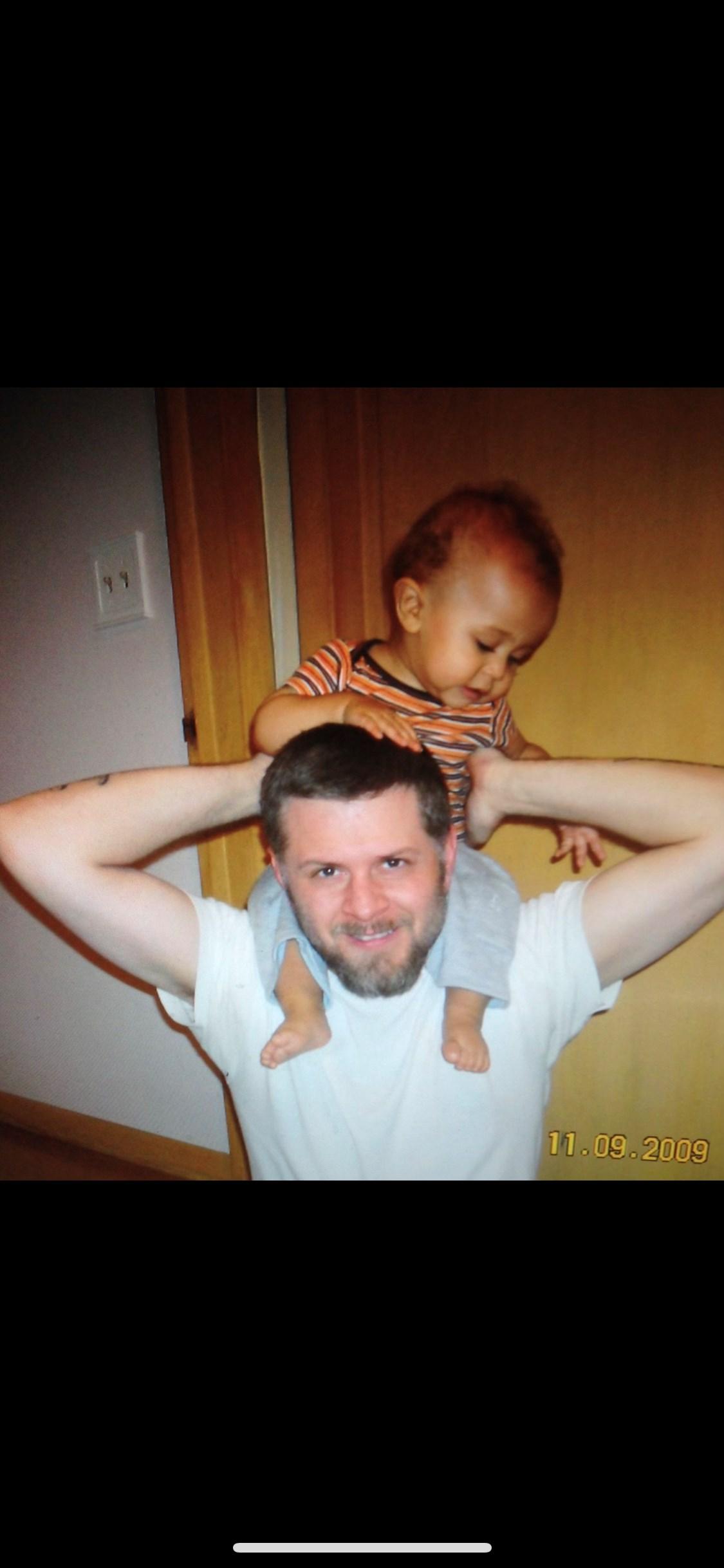 By Jus n Kruczek
By Jus n Kruczek
I walked into the living room; my dad was slouching on the couch. Kruczek was wearing a short sleeve t-shirt and comfortable sweatpants. My dogs were jumping around playing with a toy. It was a warm day outside, but the ceiling fans constant whirring made a slight breeze. My dad from a young age always worked to be er his abili es in engineering and mechanic skills, and all of his work paid off. My dad has always been a diligent worker and always taught the people around him to put 100 percent into everything they do. Because of his journey to becoming the mechanic he is today; he
learned
many life lessons. Kruczek tells the reader a descrip ve story about his long journey as a mechanic and how he learns his most important lessons.
Kruczek loves working on automobiles and engineering. From an early age, he was always spending me together with friends or being outdoors. He played many sports and was par cularly good at them. He learned to work hard and found a huge interest in mechanics. As a teen, he got deeper and deeper into mechanics: “from an early age I grew very fond of mechanics and engineering. I used to rebuild cars from the ground up. Later on,
a er lots of hard work, I was able find a job I love and make a career out of something I love”. This shows me that my father loved mechanics so much he put in lots of hard work and got his dream job.
My dad from a young age always worked to be er his abili es in engineering and mechanic skills, and all of his work paid off. My dad has always been a diligent worker and always taught me to put 100 percent into everything I do. Because of his journey to becoming the mechanic he is today; he learned many life lessons.
Kruczek has always been caring. He goes out of his way to help others by doing small things like giving money and food to the homeless and doing random acts of kindness. He became a teacher a er mastering mechanics: “I wanted to share my knowledge, so I started teaching as an adjunct instructor”. This shows Kruczek has always wanted to help people. He wanted to spread his skills to younger men to help them also succeed with a job they love.
Throught all of Kruczek’s life he used his hardships and accomplishments to learn many different life lessons that he brought with him throughout his life. He taught them to his students and the people around him
“I Used To Build Cars From The Ground Up”
Rosalba supports her family in many ways, here she is at her daughter’s ballet recital.
Rosalba’s Journey to America
In our lovely home, Rosalba readies to begin by adjusting her posture and clearing her throat. I pick up my pencil circling what I think is most important to ask. As we are about to begin, she takes one last drink of water and runs her finger through her hair. Rosalba Diaz is a resident of Lake Forest, IL. She was born in Oaxaca, Mexico, and moved to the United States when she was only 19. She now has two children, a 22 year old son, and a 13 year-old daughter. Diaz is my mother, she loves doing things for her family, always shows up, and supports me through everything. She’s resilient, strong and confident in who she is because of her story. Rosalba has adjusted to life in this country and speaks great English. Ultimately, coming to America is her greatest life decision.
Diaz did not think she would ever step foot in the United States. She would not have but, her grandmother became ill and needed better medical attention than what was available in her town. This was an extremely confusing time for Diaz since she was split between the decision of leaving to accompany her grandmother or, staying with the risk of never getting to see her again. The reason why this was such a difficult choice was that Diaz had her child’s biological father, her friends, and overall, her life there in Mexico. Then again, her grandmother was very close to her, so the risk of not seeing her was heavy on her mind.
She explains, “It was it happened by accident or coincidence.” Diaz did not let the unexpected choice phase her, and she had the bravery and courage to leave her home from the different customs she was used to, and arrive at what she had to find comfort in. This inspired me to think differently about my choice in high school. For example, not going to where most of my friends will be, but to the best fit for me.
Diaz first arrived not knowing any customs or history. Because of this, her arrival was difficult; she would feel secluded from everyone else because she could not communicate. This also made it hard to do simple things like going to a grocery store. Being in California only helped a small amount, although there was a significantly sized Latinx community in the year 2000, Diaz still felt as though she was part of a minority because she lacked English foundation.
“I was a little scared thinking that how am I going to stay here if I don’t know the culture, If I don’t know the language.” Diaz stayed strong by staying in the U.S despite the challenges she was facing with fitting in. Although Diaz did not have a goal to fit in, she admits that it would’ve made her feel more comfortable if she had known some English.
I look up to Diaz for this because despite feeling alone, she pushed through and eventually learned the language. She did not let the negative feelings stop her from growing and becoming an English speaking American citizen. I aspire to push through difficult challenges like she has and still does.
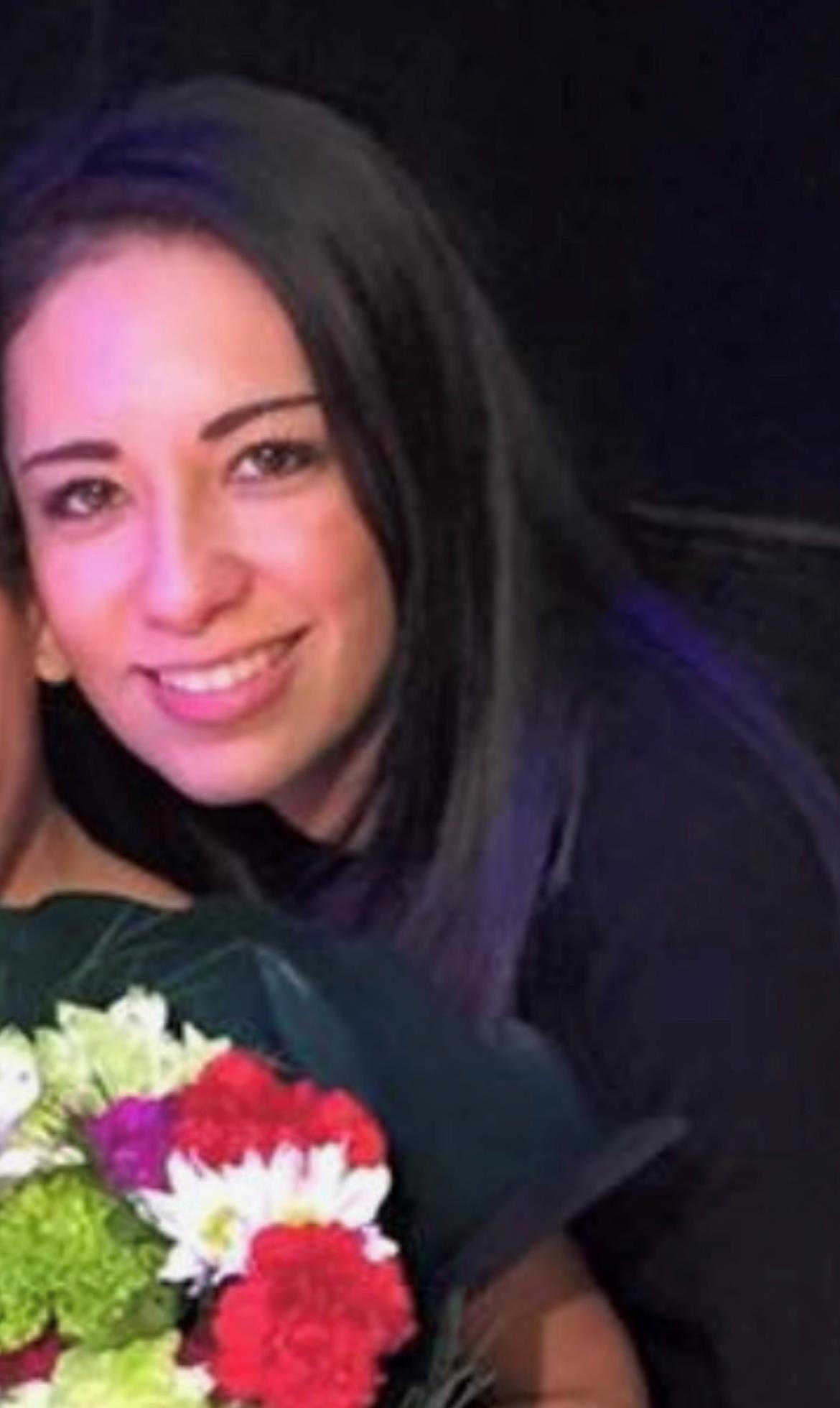
Diaz soon moved to Chicago, Illinois. There she did very well in school, she learned English quickly and started studying. Her mother also moved to Chicago from Mexico. While Diaz studied and went through the GED, her mom helped take care of her baby Cristobal. Because Diaz had the motivation to get an education, and a job to provide for her baby, she went through the process quite quickly. She explains, “I passed the GED in like 3 months, as soon as I earned my certificate then I always wanted to study you know, a career in culinary arts.” Studying this led to Diaz working at the Peninsula Hotel in Chicago. There she wanted to work as a chef but got the position of hostess. Years later,
she left to open a restaurant with a friend of hers from culinary school.
n conclusion, Diaz’s journey marked the start of a new life and new opportunities. She worked hard for herself, her children, and the rest of her family back home in Mexico. She would not be where she is today if it was not for her strength and resilience. Finally, she can say she made the right decision in coming to the United States. Diaz is at peace and is happy with the choices she made along the way. Her story inspired me to push my limits and face every challenge with faith. After all, Diaz wouldn’t have done any of this if she had not trusted that God was always with her.
By:
Rosalba makes her way to America and embarks her biggest learning experience.
Valeria Santiago
“It was- it happened by accident or coincidence.”




 By Aubrey Gowder
By Aubrey Gowder







 By: Simone Honore
By: Simone Honore
 By: Carson Lo
By: Carson Lo



 By:Anna Mikulaninec
By:Anna Mikulaninec
 By:
By:


 From a young age, Metzcus wanted to improve her community by teaching computer skills.
Leanne Metzcus: A successful woman who learned at an early age that the keys to success are working hard and having a good foundation.
From a young age, Metzcus wanted to improve her community by teaching computer skills.
Leanne Metzcus: A successful woman who learned at an early age that the keys to success are working hard and having a good foundation.










 Rami Jumean talks about his childhood and how he didn’t have a lot of money but he didn’t care and studied hard. He also talks about how much his parents did for him and how hard they worked.
Rami Jumean talks about his childhood and how he didn’t have a lot of money but he didn’t care and studied hard. He also talks about how much his parents did for him and how hard they worked.
 Anthony Carey getting a pick on a rainyday against a college rival in 1964.
By:BeauCunningham
Anthony Carey getting a pick on a rainyday against a college rival in 1964.
By:BeauCunningham






 KINZIE CAPITAL PARTNER’S CEO, SUZANNE YOON, IS A ROLE MODEL FOR ALL THE WOMAN OUT THERE THAT WANT TO ACCOMPLISH GREAT THINGS IN THEIR LIFE.
KINZIE CAPITAL PARTNER’S CEO, SUZANNE YOON, IS A ROLE MODEL FOR ALL THE WOMAN OUT THERE THAT WANT TO ACCOMPLISH GREAT THINGS IN THEIR LIFE.


 Lorena Malhaes da Silva puts everyone before herself.
Lorena Malhaes da Silva puts everyone before herself.





















 By: Jack Hiltz
By: Jack Hiltz




 By Kix Keenan
By Kix Keenan









 By Dominic
By Dominic

 Photo of James Augustine after Fighting Illini’s last championship game run.
Photo of James Augustine after Fighting Illini’s last championship game run.


 By Michael Tedeschi Photo by North Central College
By Michael Tedeschi Photo by North Central College


 By: Gavin Umbenhauer
By: Gavin Umbenhauer




















 By liamsmith
By liamsmith





 By Jus n Kruczek
By Jus n Kruczek
